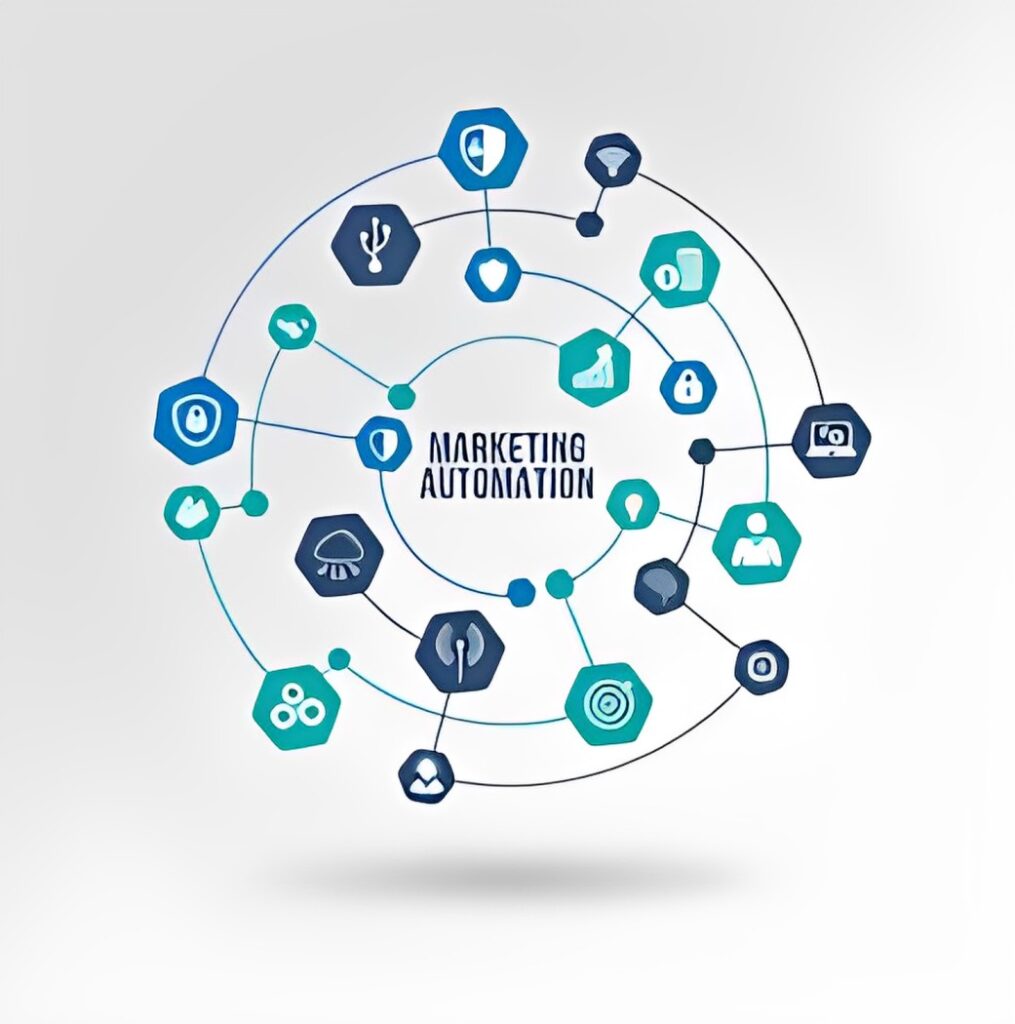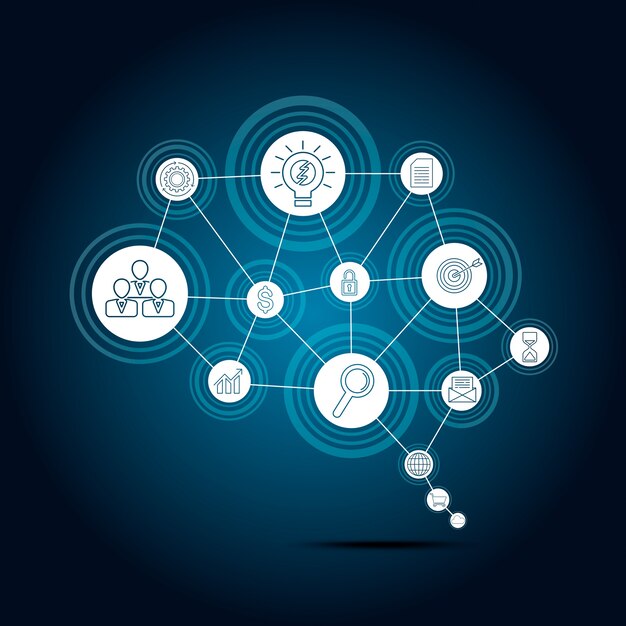
Introduction
The digital marketing landscape is in a state of constant evolution. To succeed in this dynamic environment, businesses must embrace new technologies and strategies. One of the most transformative advancements in recent years is the integration of Artificial Intelligence (AI) into digital marketing practices.
In this comprehensive blog, we will explore the essence of AI, its current applications in the realm of digital marketing, and the exciting possibilities it holds for the future of this industry.
Artificial Intelligence, often abbreviated as AI, is a multidisciplinary field of computer science that revolves around the creation of systems and machines capable of performing tasks that typically require human intelligence. These tasks encompass various aspects of human cognitive functions, such as learning, reasoning, problem-solving, understanding natural language, and recognizing patterns in data. AI systems are designed to simulate these capabilities and, in many cases, to outperform humans in specific tasks.
In the context of digital marketing, AI is harnessed to process and analyze vast volumes of data, extract valuable insights, and make data-driven decisions. This level of automation and cognitive analysis empowers marketers to refine their strategies and achieve more impactful results.

How Can AI Help in Digital Marketing?
AI is a powerful tool that has already demonstrated its value in numerous facets of digital marketing. Here’s how it can revolutionize your marketing efforts:
- Customer Insights and Personalization:
AI can analyze user behavior, preferences, and demographic data to create detailed customer profiles. These profiles enable businesses to deliver highly personalized content, product recommendations, and targeted advertisements. As a result, AI enhances user experiences, increases engagement, and boosts conversion rates.
- Predictive Analytics:
AI algorithms can predict customer behavior and market trends, providing marketers with invaluable insights for informed decision-making. By anticipating shifts in the market and optimizing product offerings, businesses can stay one step ahead of the competition and fine-tune their marketing strategies in real time.
- Chatbots and Virtual Assistants:
Chatbots and virtual assistants powered by AI have become invaluable in digital marketing for customer support and engagement. These AI-driven systems can answer user queries, provide product recommendations, and even facilitate transactions, thereby enhancing user experience, saving time, and reducing operational costs.
- Content Creation and Curation:
AI tools can generate and curate content efficiently. They can write product descriptions, articles, and even design graphics. This not only saves marketers time and resources but also ensures the production of high-quality content.
- Email Marketing Optimization:
AI analyzes subscriber behavior and tailors email content and timing to individual preferences, resulting in increased open and click-through rates.
![{"type":"elementor","siteurl":"https://www.startabove.in/wp-json/","elements":[{"id":"81bd704","elType":"section","isInner":false,"isLocked":false,"settings":{"_title":"","layout":"boxed","content_width":{"unit":"px","size":"","sizes":[]},"content_width_tablet":{"unit":"px","size":"","sizes":[]},"content_width_mobile":{"unit":"px","size":"","sizes":[]},"gap":"default","gap_columns_custom":{"unit":"px","size":"","sizes":[]},"gap_columns_custom_tablet":{"unit":"px","size":"","sizes":[]},"gap_columns_custom_mobile":{"unit":"px","size":"","sizes":[]},"height":"default","custom_height":{"unit":"px","size":400,"sizes":[]},"custom_height_tablet":{"unit":"px","size":"","sizes":[]},"custom_height_mobile":{"unit":"px","size":"","sizes":[]},"column_position":"middle","content_position":"","overflow":"","stretch_section":"","html_tag":"","premium_tooltip_switcher":"","pa_tooltip_target":"","premium_tooltip_type":"text","premium_tooltip_text":"Hi, I'm a global tooltip.","premium_tooltip_icon_switcher":"","premium_tooltip_icon":{"value":"fas fa-star","library":"fa-solid"},"premium_tooltip_lottie_url":"","premium_tooltip_lottie_loop":"true","premium_tooltip_lottie_reverse":"","hide_tooltip_on":[],"premium_tooltip_text_color":"","premium_tooltip_text_typo_typography":"","premium_tooltip_text_typo_font_family":"","premium_tooltip_text_typo_font_size":{"unit":"px","size":"","sizes":[]},"premium_tooltip_text_typo_font_size_tablet":{"unit":"px","size":"","sizes":[]},"premium_tooltip_text_typo_font_size_mobile":{"unit":"px","size":"","sizes":[]},"premium_tooltip_text_typo_font_weight":"","premium_tooltip_text_typo_text_transform":"","premium_tooltip_text_typo_font_style":"","premium_tooltip_text_typo_text_decoration":"","premium_tooltip_text_typo_line_height":{"unit":"px","size":"","sizes":[]},"premium_tooltip_text_typo_line_height_tablet":{"unit":"em","size":"","sizes":[]},"premium_tooltip_text_typo_line_height_mobile":{"unit":"em","size":"","sizes":[]},"premium_tooltip_text_typo_letter_spacing":{"unit":"px","size":"","sizes":[]},"premium_tooltip_text_typo_letter_spacing_tablet":{"unit":"px","size":"","sizes":[]},"premium_tooltip_text_typo_letter_spacing_mobile":{"unit":"px","size":"","sizes":[]},"premium_tooltip_text_typo_word_spacing":{"unit":"px","size":"","sizes":[]},"premium_tooltip_text_typo_word_spacing_tablet":{"unit":"em","size":"","sizes":[]},"premium_tooltip_text_typo_word_spacing_mobile":{"unit":"em","size":"","sizes":[]},"premium_tooltip_text_shadow_text_shadow_type":"","premium_tooltip_text_shadow_text_shadow":{"horizontal":0,"vertical":0,"blur":10,"color":"rgba(0,0,0,0.3)"},"premium_tooltip_icon_color":"","premium_tooltip_icon_size":{"unit":"px","size":"","sizes":[]},"premium_tooltip_icon_size_tablet":{"unit":"px","size":"","sizes":[]},"premium_tooltip_icon_size_mobile":{"unit":"px","size":"","sizes":[]},"premium_tooltip_icon_shadow_text_shadow_type":"","premium_tooltip_icon_shadow_text_shadow":{"horizontal":0,"vertical":0,"blur":10,"color":"rgba(0,0,0,0.3)"},"premium_tooltip_img_size":{"unit":"px","size":100,"sizes":[]},"premium_tooltip_img_size_tablet":{"unit":"px","size":"","sizes":[]},"premium_tooltip_img_size_mobile":{"unit":"px","size":"","sizes":[]},"premium_tooltip_img_fit":"cover","premium_tooltip_img_fit_tablet":"","premium_tooltip_img_fit_mobile":"","premium_tooltip_container_bg_background":"","premium_tooltip_container_bg_color":"","premium_tooltip_container_bg_color_stop":{"unit":"%","size":0,"sizes":[]},"premium_tooltip_container_bg_color_b":"#f2295b","premium_tooltip_container_bg_color_b_stop":{"unit":"%","size":100,"sizes":[]},"premium_tooltip_container_bg_gradient_type":"linear","premium_tooltip_container_bg_gradient_angle":{"unit":"deg","size":180,"sizes":[]},"premium_tooltip_container_bg_gradient_position":"center center","premium_tooltip_container_bg_image":{"url":"","id":"","size":""},"premium_tooltip_container_bg_image_tablet":{"url":"","id":"","size":""},"premium_tooltip_container_bg_image_mobile":{"url":"","id":"","size":""},"premium_tooltip_container_bg_position":"","premium_tooltip_container_bg_position_tablet":"","premium_tooltip_container_bg_position_mobile":"","premium_tooltip_container_bg_xpos":{"unit":"px","size":0,"sizes":[]},"premium_tooltip_container_bg_xpos_tablet":{"unit":"px","size":0,"sizes":[]},"premium_tooltip_container_bg_xpos_mobile":{"unit":"px","size":0,"sizes":[]},"premium_tooltip_container_bg_ypos":{"unit":"px","size":0,"sizes":[]},"premium_tooltip_container_bg_ypos_tablet":{"unit":"px","size":0,"sizes":[]},"premium_tooltip_container_bg_ypos_mobile":{"unit":"px","size":0,"sizes":[]},"premium_tooltip_container_bg_attachment":"","premium_tooltip_container_bg_repeat":"","premium_tooltip_container_bg_repeat_tablet":"","premium_tooltip_container_bg_repeat_mobile":"","premium_tooltip_container_bg_size":"","premium_tooltip_container_bg_size_tablet":"","premium_tooltip_container_bg_size_mobile":"","premium_tooltip_container_bg_bg_width":{"unit":"%","size":100,"sizes":[]},"premium_tooltip_container_bg_bg_width_tablet":{"unit":"px","size":"","sizes":[]},"premium_tooltip_container_bg_bg_width_mobile":{"unit":"px","size":"","sizes":[]},"premium_tooltip_container_bg_video_link":"","premium_tooltip_container_bg_video_start":"","premium_tooltip_container_bg_video_end":"","premium_tooltip_container_bg_play_once":"","premium_tooltip_container_bg_play_on_mobile":"","premium_tooltip_container_bg_privacy_mode":"","premium_tooltip_container_bg_video_fallback":{"url":"","id":"","size":""},"premium_tooltip_container_bg_slideshow_gallery":[],"premium_tooltip_container_bg_slideshow_loop":"yes","premium_tooltip_container_bg_slideshow_slide_duration":5000,"premium_tooltip_container_bg_slideshow_slide_transition":"fade","premium_tooltip_container_bg_slideshow_transition_duration":500,"premium_tooltip_container_bg_slideshow_background_size":"","premium_tooltip_container_bg_slideshow_background_size_tablet":"","premium_tooltip_container_bg_slideshow_background_size_mobile":"","premium_tooltip_container_bg_slideshow_background_position":"","premium_tooltip_container_bg_slideshow_background_position_tablet":"","premium_tooltip_container_bg_slideshow_background_position_mobile":"","premium_tooltip_container_bg_slideshow_lazyload":"","premium_tooltip_container_bg_slideshow_ken_burns":"","premium_tooltip_container_bg_slideshow_ken_burns_zoom_direction":"in","premium_tooltip_container_border_border":"","premium_tooltip_container_border_width":{"unit":"px","top":"","right":"","bottom":"","left":"","isLinked":true},"premium_tooltip_container_border_width_tablet":{"unit":"px","top":"","right":"","bottom":"","left":"","isLinked":true},"premium_tooltip_container_border_width_mobile":{"unit":"px","top":"","right":"","bottom":"","left":"","isLinked":true},"premium_tooltip_container_border_color":"","premium_tooltip_container_border_radius":{"unit":"px","size":"","sizes":[]},"premium_tooltip_container_box_shadow_box_shadow_type":"","premium_tooltip_container_box_shadow_box_shadow":{"horizontal":0,"vertical":0,"blur":10,"spread":0,"color":"rgba(0,0,0,0.5)"},"premium_tooltip_container_box_shadow_box_shadow_position":" ","premium_tooltip_container_padding":{"unit":"px","top":"","right":"","bottom":"","left":"","isLinked":true},"premium_tooltip_container_padding_tablet":{"unit":"px","top":"","right":"","bottom":"","left":"","isLinked":true},"premium_tooltip_container_padding_mobile":{"unit":"px","top":"","right":"","bottom":"","left":"","isLinked":true},"premium_tooltip_arrow_color":"","premium_tooltip_mouse_follow":"","premium_tooltip_interactive":"yes","premium_tooltip_arrow":"","premium_tooltip_trigger":"hover","premium_tooltip_position":"top,bottom","premium_tooltip_distance_position":6,"premium_tooltip_min_width":{"unit":"px","size":"","sizes":[]},"premium_tooltip_min_width_tablet":{"unit":"px","size":"","sizes":[]},"premium_tooltip_min_width_mobile":{"unit":"px","size":"","sizes":[]},"premium_tooltip_max_width":{"unit":"px","size":"","sizes":[]},"premium_tooltip_max_width_tablet":{"unit":"px","size":"","sizes":[]},"premium_tooltip_max_width_mobile":{"unit":"px","size":"","sizes":[]},"premium_tooltip_height":{"unit":"px","size":"","sizes":[]},"premium_tooltip_height_tablet":{"unit":"px","size":"","sizes":[]},"premium_tooltip_height_mobile":{"unit":"px","size":"","sizes":[]},"premium_tooltip_anime":"fade","premium_tooltip_anime_dur":350,"premium_tooltip_delay":10,"pa_tooltip_zindex":"","premium_global_divider_sw":"","premium_shapes_data":{"shape1":{"title":"Shape 1","width":"50%","imagesmallheight":"50px","isDivider":true,"imagesmall":""},"shape2":{"title":"Shape 2","width":"50%","imagesmallheight":"50px","isDivider":true,"imagesmall":""},"shape3":{"title":"Shape 3","width":"50%","imagesmallheight":"50px","isDivider":true,"imagesmall":""},"shape4":{"title":"Shape 4","width":"50%","imagesmallheight":"50px","isDivider":true,"imagesmall":""},"shape5":{"title":"Shape 5","width":"50%","imagesmallheight":"50px","isDivider":true,"imagesmall":""},"shape6":{"title":"Shape 6","width":"50%","imagesmallheight":"50px","isDivider":true,"imagesmall":""},"shape7":{"title":"Shape 7","width":"50%","imagesmallheight":"50px","isDivider":true,"imagesmall":""},"shape8":{"title":"Shape 8","width":"50%","imagesmallheight":"50px","isDivider":true,"imagesmall":""},"shape9":{"title":"Shape 9","width":"50%","imagesmallheight":"50px","isDivider":true,"imagesmall":""},"shape10":{"title":"Shape 10","width":"50%","imagesmallheight":"50px","isDivider":true,"imagesmall":""},"shape11":{"title":"Shape 11","width":"50%","imagesmallheight":"50px","isDivider":true,"imagesmall":""},"shape12":{"title":"Shape 12","width":"50%","imagesmallheight":"50px","isDivider":true,"imagesmall":""},"shape13":{"title":"Shape 13","width":"50%","imagesmallheight":"50px","isDivider":true,"imagesmall":""},"shape14":{"title":"Shape 14","width":"50%","imagesmallheight":"50px","isDivider":true,"imagesmall":""},"shape15":{"title":"Shape 15","width":"50%","imagesmallheight":"50px","isDivider":true,"imagesmall":""},"shape16":{"title":"Shape 16","width":"50%","imagesmallheight":"50px","isDivider":true,"imagesmall":""},"shape17":{"title":"Shape 17","width":"50%","imagesmallheight":"50px","isDivider":true,"imagesmall":""},"shape18":{"title":"Shape 18","width":"50%","imagesmallheight":"50px","isDivider":true,"imagesmall":""},"shape19":{"title":"Shape 19","width":"50%","imagesmallheight":"50px","isDivider":true,"imagesmall":""},"shape20":{"title":"Shape 20","width":"50%","imagesmallheight":"50px","isDivider":true,"imagesmall":""},"shape21":{"title":"Shape 21","width":"50%","imagesmallheight":"50px","isDivider":true,"imagesmall":""},"shape22":{"title":"Shape 22","width":"50%","imagesmallheight":"50px","isDivider":true,"imagesmall":""},"shape23":{"title":"Shape 23","width":"50%","imagesmallheight":"50px","isDivider":true,"imagesmall":""},"shape24":{"title":"Shape 24","width":"50%","imagesmallheight":"50px","isDivider":true,"imagesmall":""},"shape25":{"title":"Shape 25","width":"50%","imagesmallheight":"50px","isDivider":true,"imagesmall":""},"shape26":{"title":"Shape 26","width":"50%","imagesmallheight":"50px","isDivider":true,"imagesmall":""},"shape27":{"title":"Shape 27","width":"50%","imagesmallheight":"50px","isDivider":true,"imagesmall":""},"shape28":{"title":"Shape 28","width":"50%","imagesmallheight":"50px","isDivider":true,"imagesmall":""},"shape29":{"title":"Shape 29","width":"50%","imagesmallheight":"50px","isDivider":true,"imagesmall":""},"shape30":{"title":"Shape 30","width":"50%","imagesmallheight":"50px","isDivider":true,"imagesmall":""},"shape31":{"title":"Shape 31","width":"50%","imagesmallheight":"50px","isDivider":true,"imagesmall":""},"shape32":{"title":"Shape 32","width":"50%","imagesmallheight":"50px","isDivider":true,"imagesmall":""},"shape33":{"title":"Shape 33","width":"50%","imagesmallheight":"50px","isDivider":true,"imagesmall":""},"shape34":{"title":"Shape 34","width":"50%","imagesmallheight":"50px","isDivider":true,"imagesmall":""},"shape35":{"title":"Shape 35","width":"50%","imagesmallheight":"50px","isDivider":true,"imagesmall":""},"shape36":{"title":"Shape 36","width":"50%","imagesmallheight":"50px","isDivider":true,"imagesmall":""},"shape37":{"title":"Shape 37","width":"50%","imagesmallheight":"50px","isDivider":true,"imagesmall":""},"shape38":{"title":"Shape 38","width":"50%","imagesmallheight":"50px","isDivider":true,"imagesmall":""},"shape39":{"title":"Shape 39","width":"50%","imagesmallheight":"50px","isDivider":true,"imagesmall":""},"shape40":{"title":"Shape 40","width":"50%","imagesmallheight":"50px","isDivider":true,"imagesmall":""},"shape41":{"title":"Shape 41","width":"50%","imagesmallheight":"50px","isDivider":true,"imagesmall":""},"shape42":{"title":"Shape 42","width":"50%","imagesmallheight":"50px","isDivider":true,"imagesmall":""},"shape43":{"title":"Shape 43","width":"50%","imagesmallheight":"50px","isDivider":true,"imagesmall":""},"shape44":{"title":"Shape 44","width":"50%","imagesmallheight":"50px","isDivider":true,"imagesmall":""},"shape45":{"title":"Shape 45","width":"50%","imagesmallheight":"50px","isDivider":true,"imagesmall":""},"shape46":{"title":"Shape 46","width":"50%","imagesmallheight":"50px","isDivider":true,"imagesmall":""},"shape47":{"title":"Shape 47","width":"50%","imagesmallheight":"50px","isDivider":true,"imagesmall":""},"shape48":{"title":"Shape 48","width":"50%","imagesmallheight":"50px","isDivider":true,"imagesmall":""},"shape49":{"title":"Shape 49","width":"50%","imagesmallheight":"50px","isDivider":true,"imagesmall":""},"shape50":{"title":"Shape 50","width":"50%","imagesmallheight":"50px","isDivider":true,"imagesmall":""},"shape51":{"title":"Shape 51","width":"50%","imagesmallheight":"50px","isDivider":true,"imagesmall":""}},"premium_gdivider_source":"default","premium_gdivider_defaults":"shape22","premium_gdivider_pos":"bottom","premium_gdivider_height":{"unit":"px","size":150,"sizes":[]},"premium_gdivider_height_tablet":{"unit":"px","size":"","sizes":[]},"premium_gdivider_height_mobile":{"unit":"px","size":"","sizes":[]},"premium_gdivider_width":{"unit":"px","size":100,"sizes":[]},"premium_gdivider_width_tablet":{"unit":"px","size":"","sizes":[]},"premium_gdivider_width_mobile":{"unit":"px","size":"","sizes":[]},"premium_gdivider_scale":{"unit":"px","size":4,"sizes":[]},"premium_gdivider_scale_tablet":{"unit":"px","size":"","sizes":[]},"premium_gdivider_scale_mobile":{"unit":"px","size":"","sizes":[]},"premium_gdivider_offset":{"unit":"px","size":"","sizes":[]},"premium_gdivider_offset_tablet":{"unit":"px","size":"","sizes":[]},"premium_gdivider_offset_mobile":{"unit":"px","size":"","sizes":[]},"premium_gdivider_animate":"yes","premium_gdivider_no_stretch":"yes","premium_gdivider_anime_speed":{"unit":"px","size":10,"sizes":[]},"premium_gdivider_anime_speed_tablet":{"unit":"px","size":"","sizes":[]},"premium_gdivider_anime_speed_mobile":{"unit":"px","size":"","sizes":[]},"premium_gdivider_anime_dir":"alternate","premium_gdivider_flip":"","premium_gdivider_flip_x":"","premium_gdivider_bg_type":"color","premium_gdivider_fill":"#afafaf","premium_gdivider_stroke_width":{"unit":"px","size":"","sizes":[]},"premium_gdivider_stroke_width_tablet":{"unit":"px","size":"","sizes":[]},"premium_gdivider_stroke_width_mobile":{"unit":"px","size":"","sizes":[]},"premium_gdivider_stroke":"","premium_gdivider_opacity":{"unit":"px","size":0.3,"sizes":[]},"premium_gdivider_opacity_tablet":{"unit":"px","size":"","sizes":[]},"premium_gdivider_opacity_mobile":{"unit":"px","size":"","sizes":[]},"premium_gdivider_zindex":"","structure":"33","background_background":"","background_color":"","background_color_stop":{"unit":"%","size":0,"sizes":[]},"background_color_b":"#f2295b","background_color_b_stop":{"unit":"%","size":100,"sizes":[]},"background_gradient_type":"linear","background_gradient_angle":{"unit":"deg","size":180,"sizes":[]},"background_gradient_position":"center center","background_image":{"url":"","id":"","size":""},"background_image_tablet":{"url":"","id":"","size":""},"background_image_mobile":{"url":"","id":"","size":""},"background_position":"","background_position_tablet":"","background_position_mobile":"","background_xpos":{"unit":"px","size":0,"sizes":[]},"background_xpos_tablet":{"unit":"px","size":0,"sizes":[]},"background_xpos_mobile":{"unit":"px","size":0,"sizes":[]},"background_ypos":{"unit":"px","size":0,"sizes":[]},"background_ypos_tablet":{"unit":"px","size":0,"sizes":[]},"background_ypos_mobile":{"unit":"px","size":0,"sizes":[]},"background_attachment":"","background_repeat":"","background_repeat_tablet":"","background_repeat_mobile":"","background_size":"","background_size_tablet":"","background_size_mobile":"","background_bg_width":{"unit":"%","size":100,"sizes":[]},"background_bg_width_tablet":{"unit":"px","size":"","sizes":[]},"background_bg_width_mobile":{"unit":"px","size":"","sizes":[]},"background_video_link":"","background_video_start":"","background_video_end":"","background_play_once":"","background_play_on_mobile":"","background_privacy_mode":"","background_video_fallback":{"url":"","id":"","size":""},"background_slideshow_gallery":[],"background_slideshow_loop":"yes","background_slideshow_slide_duration":5000,"background_slideshow_slide_transition":"fade","background_slideshow_transition_duration":500,"background_slideshow_background_size":"","background_slideshow_background_size_tablet":"","background_slideshow_background_size_mobile":"","background_slideshow_background_position":"","background_slideshow_background_position_tablet":"","background_slideshow_background_position_mobile":"","background_slideshow_lazyload":"","background_slideshow_ken_burns":"","background_slideshow_ken_burns_zoom_direction":"in","background_hover_background":"","background_hover_color":"","background_hover_color_stop":{"unit":"%","size":0,"sizes":[]},"background_hover_color_b":"#f2295b","background_hover_color_b_stop":{"unit":"%","size":100,"sizes":[]},"background_hover_gradient_type":"linear","background_hover_gradient_angle":{"unit":"deg","size":180,"sizes":[]},"background_hover_gradient_position":"center center","background_hover_image":{"url":"","id":"","size":""},"background_hover_image_tablet":{"url":"","id":"","size":""},"background_hover_image_mobile":{"url":"","id":"","size":""},"background_hover_position":"","background_hover_position_tablet":"","background_hover_position_mobile":"","background_hover_xpos":{"unit":"px","size":0,"sizes":[]},"background_hover_xpos_tablet":{"unit":"px","size":0,"sizes":[]},"background_hover_xpos_mobile":{"unit":"px","size":0,"sizes":[]},"background_hover_ypos":{"unit":"px","size":0,"sizes":[]},"background_hover_ypos_tablet":{"unit":"px","size":0,"sizes":[]},"background_hover_ypos_mobile":{"unit":"px","size":0,"sizes":[]},"background_hover_attachment":"","background_hover_repeat":"","background_hover_repeat_tablet":"","background_hover_repeat_mobile":"","background_hover_size":"","background_hover_size_tablet":"","background_hover_size_mobile":"","background_hover_bg_width":{"unit":"%","size":100,"sizes":[]},"background_hover_bg_width_tablet":{"unit":"px","size":"","sizes":[]},"background_hover_bg_width_mobile":{"unit":"px","size":"","sizes":[]},"background_hover_video_link":"","background_hover_video_start":"","background_hover_video_end":"","background_hover_play_once":"","background_hover_play_on_mobile":"","background_hover_privacy_mode":"","background_hover_video_fallback":{"url":"","id":"","size":""},"background_hover_slideshow_gallery":[],"background_hover_slideshow_loop":"yes","background_hover_slideshow_slide_duration":5000,"background_hover_slideshow_slide_transition":"fade","background_hover_slideshow_transition_duration":500,"background_hover_slideshow_background_size":"","background_hover_slideshow_background_size_tablet":"","background_hover_slideshow_background_size_mobile":"","background_hover_slideshow_background_position":"","background_hover_slideshow_background_position_tablet":"","background_hover_slideshow_background_position_mobile":"","background_hover_slideshow_lazyload":"","background_hover_slideshow_ken_burns":"","background_hover_slideshow_ken_burns_zoom_direction":"in","background_hover_transition":{"unit":"px","size":0.3,"sizes":[]},"background_motion_fx_motion_fx_scrolling":"","background_motion_fx_translateY_effect":"","background_motion_fx_translateY_direction":"","background_motion_fx_translateY_speed":{"unit":"px","size":4,"sizes":[]},"background_motion_fx_translateY_affectedRange":{"unit":"%","size":"","sizes":{"start":0,"end":100}},"background_motion_fx_translateX_effect":"","background_motion_fx_translateX_direction":"","background_motion_fx_translateX_speed":{"unit":"px","size":4,"sizes":[]},"background_motion_fx_translateX_affectedRange":{"unit":"%","size":"","sizes":{"start":0,"end":100}},"background_motion_fx_opacity_effect":"","background_motion_fx_opacity_direction":"out-in","background_motion_fx_opacity_level":{"unit":"px","size":10,"sizes":[]},"background_motion_fx_opacity_range":{"unit":"%","size":"","sizes":{"start":20,"end":80}},"background_motion_fx_blur_effect":"","background_motion_fx_blur_direction":"out-in","background_motion_fx_blur_level":{"unit":"px","size":7,"sizes":[]},"background_motion_fx_blur_range":{"unit":"%","size":"","sizes":{"start":20,"end":80}},"background_motion_fx_rotateZ_direction":"","background_motion_fx_rotateZ_speed":{"unit":"px","size":1,"sizes":[]},"background_motion_fx_rotateZ_affectedRange":{"unit":"%","size":"","sizes":{"start":0,"end":100}},"background_motion_fx_scale_effect":"","background_motion_fx_scale_direction":"out-in","background_motion_fx_scale_speed":{"unit":"px","size":4,"sizes":[]},"background_motion_fx_scale_range":{"unit":"%","size":"","sizes":{"start":20,"end":80}},"background_motion_fx_devices":["desktop","tablet","mobile"],"background_motion_fx_range":"","background_motion_fx_motion_fx_mouse":"","background_motion_fx_mouseTrack_effect":"","background_motion_fx_mouseTrack_direction":"","background_motion_fx_mouseTrack_speed":{"unit":"px","size":1,"sizes":[]},"background_motion_fx_tilt_direction":"","background_motion_fx_tilt_speed":{"unit":"px","size":4,"sizes":[]},"element_pack_agbg_show":"","element_pack_agbg_color_list":[{"start_color":"#0591F9","end_color":"#fefefe","_id":"eceda77"},{"start_color":"#567445","end_color":"#1D1BE0","_id":"5368bc7"}],"element_pack_agbg_blending_mode":"hue","element_pack_agbg_direction":"diagonal","element_pack_agbg_transitionSpeed":{"unit":"px","size":"","sizes":[]},"background_overlay_background":"","background_overlay_color":"","background_overlay_color_stop":{"unit":"%","size":0,"sizes":[]},"background_overlay_color_b":"#f2295b","background_overlay_color_b_stop":{"unit":"%","size":100,"sizes":[]},"background_overlay_gradient_type":"linear","background_overlay_gradient_angle":{"unit":"deg","size":180,"sizes":[]},"background_overlay_gradient_position":"center center","background_overlay_image":{"url":"","id":"","size":""},"background_overlay_image_tablet":{"url":"","id":"","size":""},"background_overlay_image_mobile":{"url":"","id":"","size":""},"background_overlay_position":"","background_overlay_position_tablet":"","background_overlay_position_mobile":"","background_overlay_xpos":{"unit":"px","size":0,"sizes":[]},"background_overlay_xpos_tablet":{"unit":"px","size":0,"sizes":[]},"background_overlay_xpos_mobile":{"unit":"px","size":0,"sizes":[]},"background_overlay_ypos":{"unit":"px","size":0,"sizes":[]},"background_overlay_ypos_tablet":{"unit":"px","size":0,"sizes":[]},"background_overlay_ypos_mobile":{"unit":"px","size":0,"sizes":[]},"background_overlay_attachment":"","background_overlay_repeat":"","background_overlay_repeat_tablet":"","background_overlay_repeat_mobile":"","background_overlay_size":"","background_overlay_size_tablet":"","background_overlay_size_mobile":"","background_overlay_bg_width":{"unit":"%","size":100,"sizes":[]},"background_overlay_bg_width_tablet":{"unit":"px","size":"","sizes":[]},"background_overlay_bg_width_mobile":{"unit":"px","size":"","sizes":[]},"background_overlay_video_link":"","background_overlay_video_start":"","background_overlay_video_end":"","background_overlay_play_once":"","background_overlay_play_on_mobile":"","background_overlay_privacy_mode":"","background_overlay_video_fallback":{"url":"","id":"","size":""},"background_overlay_slideshow_gallery":[],"background_overlay_slideshow_loop":"yes","background_overlay_slideshow_slide_duration":5000,"background_overlay_slideshow_slide_transition":"fade","background_overlay_slideshow_transition_duration":500,"background_overlay_slideshow_background_size":"","background_overlay_slideshow_background_size_tablet":"","background_overlay_slideshow_background_size_mobile":"","background_overlay_slideshow_background_position":"","background_overlay_slideshow_background_position_tablet":"","background_overlay_slideshow_background_position_mobile":"","background_overlay_slideshow_lazyload":"","background_overlay_slideshow_ken_burns":"","background_overlay_slideshow_ken_burns_zoom_direction":"in","background_overlay_opacity":{"unit":"px","size":0.5,"sizes":[]},"background_overlay_opacity_tablet":{"unit":"px","size":"","sizes":[]},"background_overlay_opacity_mobile":{"unit":"px","size":"","sizes":[]},"css_filters_css_filter":"","css_filters_blur":{"unit":"px","size":0,"sizes":[]},"css_filters_brightness":{"unit":"px","size":100,"sizes":[]},"css_filters_contrast":{"unit":"px","size":100,"sizes":[]},"css_filters_saturate":{"unit":"px","size":100,"sizes":[]},"css_filters_hue":{"unit":"px","size":0,"sizes":[]},"overlay_blend_mode":"","background_overlay_hover_background":"","background_overlay_hover_color":"","background_overlay_hover_color_stop":{"unit":"%","size":0,"sizes":[]},"background_overlay_hover_color_b":"#f2295b","background_overlay_hover_color_b_stop":{"unit":"%","size":100,"sizes":[]},"background_overlay_hover_gradient_type":"linear","background_overlay_hover_gradient_angle":{"unit":"deg","size":180,"sizes":[]},"background_overlay_hover_gradient_position":"center center","background_overlay_hover_image":{"url":"","id":"","size":""},"background_overlay_hover_image_tablet":{"url":"","id":"","size":""},"background_overlay_hover_image_mobile":{"url":"","id":"","size":""},"background_overlay_hover_position":"","background_overlay_hover_position_tablet":"","background_overlay_hover_position_mobile":"","background_overlay_hover_xpos":{"unit":"px","size":0,"sizes":[]},"background_overlay_hover_xpos_tablet":{"unit":"px","size":0,"sizes":[]},"background_overlay_hover_xpos_mobile":{"unit":"px","size":0,"sizes":[]},"background_overlay_hover_ypos":{"unit":"px","size":0,"sizes":[]},"background_overlay_hover_ypos_tablet":{"unit":"px","size":0,"sizes":[]},"background_overlay_hover_ypos_mobile":{"unit":"px","size":0,"sizes":[]},"background_overlay_hover_attachment":"","background_overlay_hover_repeat":"","background_overlay_hover_repeat_tablet":"","background_overlay_hover_repeat_mobile":"","background_overlay_hover_size":"","background_overlay_hover_size_tablet":"","background_overlay_hover_size_mobile":"","background_overlay_hover_bg_width":{"unit":"%","size":100,"sizes":[]},"background_overlay_hover_bg_width_tablet":{"unit":"px","size":"","sizes":[]},"background_overlay_hover_bg_width_mobile":{"unit":"px","size":"","sizes":[]},"background_overlay_hover_video_link":"","background_overlay_hover_video_start":"","background_overlay_hover_video_end":"","background_overlay_hover_play_once":"","background_overlay_hover_play_on_mobile":"","background_overlay_hover_privacy_mode":"","background_overlay_hover_video_fallback":{"url":"","id":"","size":""},"background_overlay_hover_slideshow_gallery":[],"background_overlay_hover_slideshow_loop":"yes","background_overlay_hover_slideshow_slide_duration":5000,"background_overlay_hover_slideshow_slide_transition":"fade","background_overlay_hover_slideshow_transition_duration":500,"background_overlay_hover_slideshow_background_size":"","background_overlay_hover_slideshow_background_size_tablet":"","background_overlay_hover_slideshow_background_size_mobile":"","background_overlay_hover_slideshow_background_position":"","background_overlay_hover_slideshow_background_position_tablet":"","background_overlay_hover_slideshow_background_position_mobile":"","background_overlay_hover_slideshow_lazyload":"","background_overlay_hover_slideshow_ken_burns":"","background_overlay_hover_slideshow_ken_burns_zoom_direction":"in","background_overlay_hover_opacity":{"unit":"px","size":0.5,"sizes":[]},"background_overlay_hover_opacity_tablet":{"unit":"px","size":"","sizes":[]},"background_overlay_hover_opacity_mobile":{"unit":"px","size":"","sizes":[]},"css_filters_hover_css_filter":"","css_filters_hover_blur":{"unit":"px","size":0,"sizes":[]},"css_filters_hover_brightness":{"unit":"px","size":100,"sizes":[]},"css_filters_hover_contrast":{"unit":"px","size":100,"sizes":[]},"css_filters_hover_saturate":{"unit":"px","size":100,"sizes":[]},"css_filters_hover_hue":{"unit":"px","size":0,"sizes":[]},"background_overlay_hover_transition":{"unit":"px","size":0.3,"sizes":[]},"border_border":"","border_width":{"unit":"px","top":"","right":"","bottom":"","left":"","isLinked":true},"border_width_tablet":{"unit":"px","top":"","right":"","bottom":"","left":"","isLinked":true},"border_width_mobile":{"unit":"px","top":"","right":"","bottom":"","left":"","isLinked":true},"border_color":"","border_radius":{"unit":"px","top":"","right":"","bottom":"","left":"","isLinked":true},"border_radius_tablet":{"unit":"px","top":"","right":"","bottom":"","left":"","isLinked":true},"border_radius_mobile":{"unit":"px","top":"","right":"","bottom":"","left":"","isLinked":true},"box_shadow_box_shadow_type":"","box_shadow_box_shadow":{"horizontal":0,"vertical":0,"blur":10,"spread":0,"color":"rgba(0,0,0,0.5)"},"box_shadow_box_shadow_position":" ","border_hover_border":"","border_hover_width":{"unit":"px","top":"","right":"","bottom":"","left":"","isLinked":true},"border_hover_width_tablet":{"unit":"px","top":"","right":"","bottom":"","left":"","isLinked":true},"border_hover_width_mobile":{"unit":"px","top":"","right":"","bottom":"","left":"","isLinked":true},"border_hover_color":"","border_radius_hover":{"unit":"px","top":"","right":"","bottom":"","left":"","isLinked":true},"border_radius_hover_tablet":{"unit":"px","top":"","right":"","bottom":"","left":"","isLinked":true},"border_radius_hover_mobile":{"unit":"px","top":"","right":"","bottom":"","left":"","isLinked":true},"box_shadow_hover_box_shadow_type":"","box_shadow_hover_box_shadow":{"horizontal":0,"vertical":0,"blur":10,"spread":0,"color":"rgba(0,0,0,0.5)"},"box_shadow_hover_box_shadow_position":" ","border_hover_transition":{"unit":"px","size":0.3,"sizes":[]},"shape_divider_top":"","shape_divider_top_color":"","shape_divider_top_width":{"unit":"%","size":"","sizes":[]},"shape_divider_top_width_tablet":{"unit":"%","size":"","sizes":[]},"shape_divider_top_width_mobile":{"unit":"%","size":"","sizes":[]},"shape_divider_top_height":{"unit":"px","size":"","sizes":[]},"shape_divider_top_height_tablet":{"unit":"px","size":"","sizes":[]},"shape_divider_top_height_mobile":{"unit":"px","size":"","sizes":[]},"shape_divider_top_flip":"","shape_divider_top_negative":"","shape_divider_top_above_content":"","shape_divider_bottom":"","shape_divider_bottom_color":"","shape_divider_bottom_width":{"unit":"%","size":"","sizes":[]},"shape_divider_bottom_width_tablet":{"unit":"%","size":"","sizes":[]},"shape_divider_bottom_width_mobile":{"unit":"%","size":"","sizes":[]},"shape_divider_bottom_height":{"unit":"px","size":"","sizes":[]},"shape_divider_bottom_height_tablet":{"unit":"px","size":"","sizes":[]},"shape_divider_bottom_height_mobile":{"unit":"px","size":"","sizes":[]},"shape_divider_bottom_flip":"","shape_divider_bottom_negative":"","shape_divider_bottom_above_content":"","heading_color":"","color_text":"","color_link":"","color_link_hover":"","text_align":"","text_align_tablet":"","text_align_mobile":"","margin":{"unit":"px","top":"","right":"","bottom":"","left":"","isLinked":true},"margin_tablet":{"unit":"px","top":"","right":"","bottom":"","left":"","isLinked":true},"margin_mobile":{"unit":"px","top":"","right":"","bottom":"","left":"","isLinked":true},"padding":{"unit":"px","top":"","right":"","bottom":"","left":"","isLinked":true},"padding_tablet":{"unit":"px","top":"","right":"","bottom":"","left":"","isLinked":true},"padding_mobile":{"unit":"px","top":"","right":"","bottom":"","left":"","isLinked":true},"z_index":"","z_index_tablet":"","z_index_mobile":"","_element_id":"","css_classes":"","eael_wrapper_link_switch":"","eael_wrapper_link":{"url":"","is_external":"","nofollow":"","custom_attributes":""},"premium_eq_height_switcher":"","premium_eq_height_type":"widget","premium_eq_height_target":"","premium_eq_height_custom_target":"","premium_eq_height_enable_on":["desktop","tablet","mobile"],"pa_display_conditions_switcher":"","pa_display_action":"show","pa_display_when":"any","pa_condition_repeater":[],"section_equal_height_on":"","section_equal_height_selector":"widgets","section_equal_height_custom_selector":"","element_pack_wrapper_link":{"url":"","is_external":"","nofollow":"","custom_attributes":""},"ep_floating_effects_show":"","ep_floating_effects_translate_toggle":"","ep_floating_effects_translate_x":{"unit":"px","size":"","sizes":{"from":0,"to":0}},"ep_floating_effects_translate_y":{"unit":"px","size":"","sizes":{"from":0,"to":30}},"ep_floating_effects_translate_duration":{"unit":"px","size":1000,"sizes":[]},"ep_floating_effects_translate_delay":{"unit":"px","size":"","sizes":[]},"ep_floating_effects_rotate_toggle":"","ep_floating_effects_rotate_x":{"unit":"deg","size":"","sizes":{"from":0,"to":0}},"ep_floating_effects_rotate_y":{"unit":"deg","size":"","sizes":{"from":0,"to":0}},"ep_floating_effects_rotate_z":{"unit":"deg","size":"","sizes":{"from":0,"to":45}},"ep_floating_effects_rotate_infinite":"","ep_floating_effects_rotate_duration":{"unit":"px","size":2000,"sizes":[]},"ep_floating_effects_rotate_delay":{"unit":"px","size":"","sizes":[]},"ep_floating_effects_scale_toggle":"","ep_floating_effects_scale_x":{"unit":"px","size":"","sizes":{"from":1,"to":1.5}},"ep_floating_effects_scale_y":{"unit":"px","size":"","sizes":{"from":1,"to":1.5}},"ep_floating_effects_scale_duration":{"unit":"px","size":1000,"sizes":[]},"ep_floating_effects_scale_delay":{"unit":"px","size":"","sizes":[]},"ep_floating_effects_skew_toggle":"","ep_floating_effects_skew_x":{"unit":"px","size":"","sizes":{"from":1,"to":1.5}},"ep_floating_effects_skew_y":{"unit":"px","size":"","sizes":{"from":1,"to":1.5}},"ep_floating_effects_skew_duration":{"unit":"px","size":1000,"sizes":[]},"ep_floating_effects_skew_delay":{"unit":"px","size":"","sizes":[]},"ep_floating_effects_border_radius_toggle":"","ep_floating_effects_border_radius":{"unit":"px","size":"","sizes":{"from":0,"to":50}},"ep_floating_effects_border_radius_duration":{"unit":"px","size":1000,"sizes":[]},"ep_floating_effects_border_radius_delay":{"unit":"px","size":"","sizes":[]},"ep_floating_effects_opacity_toggle":"","ep_floating_effects_opacity_start":{"unit":"px","size":1,"sizes":[]},"ep_floating_effects_opacity_end":{"unit":"px","size":0,"sizes":[]},"ep_floating_effects_opacity_duration":{"unit":"px","size":1000,"sizes":[]},"ep_floating_effects_easing":"easeInOutQuad","motion_fx_motion_fx_scrolling":"","motion_fx_translateY_effect":"","motion_fx_translateY_direction":"","motion_fx_translateY_speed":{"unit":"px","size":4,"sizes":[]},"motion_fx_translateY_affectedRange":{"unit":"%","size":"","sizes":{"start":0,"end":100}},"motion_fx_translateX_effect":"","motion_fx_translateX_direction":"","motion_fx_translateX_speed":{"unit":"px","size":4,"sizes":[]},"motion_fx_translateX_affectedRange":{"unit":"%","size":"","sizes":{"start":0,"end":100}},"motion_fx_opacity_effect":"","motion_fx_opacity_direction":"out-in","motion_fx_opacity_level":{"unit":"px","size":10,"sizes":[]},"motion_fx_opacity_range":{"unit":"%","size":"","sizes":{"start":20,"end":80}},"motion_fx_blur_effect":"","motion_fx_blur_direction":"out-in","motion_fx_blur_level":{"unit":"px","size":7,"sizes":[]},"motion_fx_blur_range":{"unit":"%","size":"","sizes":{"start":20,"end":80}},"motion_fx_rotateZ_effect":"","motion_fx_rotateZ_direction":"","motion_fx_rotateZ_speed":{"unit":"px","size":1,"sizes":[]},"motion_fx_rotateZ_affectedRange":{"unit":"%","size":"","sizes":{"start":0,"end":100}},"motion_fx_scale_effect":"","motion_fx_scale_direction":"out-in","motion_fx_scale_speed":{"unit":"px","size":4,"sizes":[]},"motion_fx_scale_range":{"unit":"%","size":"","sizes":{"start":20,"end":80}},"motion_fx_transform_origin_x":"center","motion_fx_transform_origin_y":"center","motion_fx_devices":["desktop","tablet","mobile"],"motion_fx_range":"","motion_fx_mouseTrack_effect":"","motion_fx_mouseTrack_direction":"","motion_fx_mouseTrack_speed":{"unit":"px","size":1,"sizes":[]},"motion_fx_tilt_effect":"","motion_fx_tilt_direction":"","motion_fx_tilt_speed":{"unit":"px","size":4,"sizes":[]},"sticky":"","sticky_on":["desktop","tablet","mobile"],"sticky_offset":0,"sticky_offset_tablet":"","sticky_offset_mobile":"","sticky_effects_offset":0,"sticky_effects_offset_tablet":"","sticky_effects_offset_mobile":"","sticky_parent":"","animation":"","animation_tablet":"","animation_mobile":"","animation_duration":"","animation_delay":"","element_pack_section_transform":"","element_pack_section_overflow":"visible","reverse_order_tablet":"","reverse_order_mobile":"","hide_desktop":"","hide_tablet":"","hide_mobile":"","_attributes":"","custom_css":""},"defaultEditSettings":{"defaultEditRoute":"content"},"elements":[{"id":"a01e163","elType":"column","isInner":false,"isLocked":false,"settings":{"_column_size":25,"_title":"","_inline_size":14.057,"_inline_size_tablet":"","_inline_size_mobile":"","content_position":"","content_position_tablet":"","content_position_mobile":"","align":"","align_tablet":"","align_mobile":"","space_between_widgets":"","space_between_widgets_tablet":"","space_between_widgets_mobile":"","html_tag":"","background_background":"","background_color":"","background_color_stop":{"unit":"%","size":0,"sizes":[]},"background_color_b":"#f2295b","background_color_b_stop":{"unit":"%","size":100,"sizes":[]},"background_gradient_type":"linear","background_gradient_angle":{"unit":"deg","size":180,"sizes":[]},"background_gradient_position":"center center","background_image":{"url":"","id":"","size":""},"background_image_tablet":{"url":"","id":"","size":""},"background_image_mobile":{"url":"","id":"","size":""},"background_position":"","background_position_tablet":"","background_position_mobile":"","background_xpos":{"unit":"px","size":0,"sizes":[]},"background_xpos_tablet":{"unit":"px","size":0,"sizes":[]},"background_xpos_mobile":{"unit":"px","size":0,"sizes":[]},"background_ypos":{"unit":"px","size":0,"sizes":[]},"background_ypos_tablet":{"unit":"px","size":0,"sizes":[]},"background_ypos_mobile":{"unit":"px","size":0,"sizes":[]},"background_attachment":"","background_repeat":"","background_repeat_tablet":"","background_repeat_mobile":"","background_size":"","background_size_tablet":"","background_size_mobile":"","background_bg_width":{"unit":"%","size":100,"sizes":[]},"background_bg_width_tablet":{"unit":"px","size":"","sizes":[]},"background_bg_width_mobile":{"unit":"px","size":"","sizes":[]},"background_video_link":"","background_video_start":"","background_video_end":"","background_play_once":"","background_play_on_mobile":"","background_privacy_mode":"","background_video_fallback":{"url":"","id":"","size":""},"background_slideshow_gallery":[],"background_slideshow_loop":"yes","background_slideshow_slide_duration":5000,"background_slideshow_slide_transition":"fade","background_slideshow_transition_duration":500,"background_slideshow_background_size":"","background_slideshow_background_size_tablet":"","background_slideshow_background_size_mobile":"","background_slideshow_background_position":"","background_slideshow_background_position_tablet":"","background_slideshow_background_position_mobile":"","background_slideshow_lazyload":"","background_slideshow_ken_burns":"","background_slideshow_ken_burns_zoom_direction":"in","background_hover_background":"","background_hover_color":"","background_hover_color_stop":{"unit":"%","size":0,"sizes":[]},"background_hover_color_b":"#f2295b","background_hover_color_b_stop":{"unit":"%","size":100,"sizes":[]},"background_hover_gradient_type":"linear","background_hover_gradient_angle":{"unit":"deg","size":180,"sizes":[]},"background_hover_gradient_position":"center center","background_hover_image":{"url":"","id":"","size":""},"background_hover_image_tablet":{"url":"","id":"","size":""},"background_hover_image_mobile":{"url":"","id":"","size":""},"background_hover_position":"","background_hover_position_tablet":"","background_hover_position_mobile":"","background_hover_xpos":{"unit":"px","size":0,"sizes":[]},"background_hover_xpos_tablet":{"unit":"px","size":0,"sizes":[]},"background_hover_xpos_mobile":{"unit":"px","size":0,"sizes":[]},"background_hover_ypos":{"unit":"px","size":0,"sizes":[]},"background_hover_ypos_tablet":{"unit":"px","size":0,"sizes":[]},"background_hover_ypos_mobile":{"unit":"px","size":0,"sizes":[]},"background_hover_attachment":"","background_hover_repeat":"","background_hover_repeat_tablet":"","background_hover_repeat_mobile":"","background_hover_size":"","background_hover_size_tablet":"","background_hover_size_mobile":"","background_hover_bg_width":{"unit":"%","size":100,"sizes":[]},"background_hover_bg_width_tablet":{"unit":"px","size":"","sizes":[]},"background_hover_bg_width_mobile":{"unit":"px","size":"","sizes":[]},"background_hover_video_link":"","background_hover_video_start":"","background_hover_video_end":"","background_hover_play_once":"","background_hover_play_on_mobile":"","background_hover_privacy_mode":"","background_hover_video_fallback":{"url":"","id":"","size":""},"background_hover_slideshow_gallery":[],"background_hover_slideshow_loop":"yes","background_hover_slideshow_slide_duration":5000,"background_hover_slideshow_slide_transition":"fade","background_hover_slideshow_transition_duration":500,"background_hover_slideshow_background_size":"","background_hover_slideshow_background_size_tablet":"","background_hover_slideshow_background_size_mobile":"","background_hover_slideshow_background_position":"","background_hover_slideshow_background_position_tablet":"","background_hover_slideshow_background_position_mobile":"","background_hover_slideshow_lazyload":"","background_hover_slideshow_ken_burns":"","background_hover_slideshow_ken_burns_zoom_direction":"in","background_hover_transition":{"unit":"px","size":0.3,"sizes":[]},"element_pack_backdrop_filter":"","element_pack_bf_blur":{"unit":"px","size":"","sizes":[]},"element_pack_bf_brightness":{"unit":"px","size":"","sizes":[]},"element_pack_bf_contrast":{"unit":"px","size":"","sizes":[]},"element_pack_bf_grayscale":{"unit":"px","size":"","sizes":[]},"element_pack_bf_invert":{"unit":"px","size":"","sizes":[]},"element_pack_bf_opacity":{"unit":"px","size":"","sizes":[]},"element_pack_bf_sepia":{"unit":"px","size":"","sizes":[]},"element_pack_bf_saturate":{"unit":"px","size":"","sizes":[]},"element_pack_bf_hue_rotate":{"unit":"px","size":"","sizes":[]},"background_motion_fx_motion_fx_scrolling":"","background_motion_fx_translateY_effect":"","background_motion_fx_translateY_direction":"","background_motion_fx_translateY_speed":{"unit":"px","size":4,"sizes":[]},"background_motion_fx_translateY_affectedRange":{"unit":"%","size":"","sizes":{"start":0,"end":100}},"background_motion_fx_translateX_effect":"","background_motion_fx_translateX_direction":"","background_motion_fx_translateX_speed":{"unit":"px","size":4,"sizes":[]},"background_motion_fx_translateX_affectedRange":{"unit":"%","size":"","sizes":{"start":0,"end":100}},"background_motion_fx_opacity_effect":"","background_motion_fx_opacity_direction":"out-in","background_motion_fx_opacity_level":{"unit":"px","size":10,"sizes":[]},"background_motion_fx_opacity_range":{"unit":"%","size":"","sizes":{"start":20,"end":80}},"background_motion_fx_blur_effect":"","background_motion_fx_blur_direction":"out-in","background_motion_fx_blur_level":{"unit":"px","size":7,"sizes":[]},"background_motion_fx_blur_range":{"unit":"%","size":"","sizes":{"start":20,"end":80}},"background_motion_fx_rotateZ_direction":"","background_motion_fx_rotateZ_speed":{"unit":"px","size":1,"sizes":[]},"background_motion_fx_rotateZ_affectedRange":{"unit":"%","size":"","sizes":{"start":0,"end":100}},"background_motion_fx_scale_effect":"","background_motion_fx_scale_direction":"out-in","background_motion_fx_scale_speed":{"unit":"px","size":4,"sizes":[]},"background_motion_fx_scale_range":{"unit":"%","size":"","sizes":{"start":20,"end":80}},"background_motion_fx_devices":["desktop","tablet","mobile"],"background_motion_fx_range":"","background_motion_fx_motion_fx_mouse":"","background_motion_fx_mouseTrack_effect":"","background_motion_fx_mouseTrack_direction":"","background_motion_fx_mouseTrack_speed":{"unit":"px","size":1,"sizes":[]},"background_motion_fx_tilt_direction":"","background_motion_fx_tilt_speed":{"unit":"px","size":4,"sizes":[]},"background_overlay_background":"","background_overlay_color":"","background_overlay_color_stop":{"unit":"%","size":0,"sizes":[]},"background_overlay_color_b":"#f2295b","background_overlay_color_b_stop":{"unit":"%","size":100,"sizes":[]},"background_overlay_gradient_type":"linear","background_overlay_gradient_angle":{"unit":"deg","size":180,"sizes":[]},"background_overlay_gradient_position":"center center","background_overlay_image":{"url":"","id":"","size":""},"background_overlay_image_tablet":{"url":"","id":"","size":""},"background_overlay_image_mobile":{"url":"","id":"","size":""},"background_overlay_position":"","background_overlay_position_tablet":"","background_overlay_position_mobile":"","background_overlay_xpos":{"unit":"px","size":0,"sizes":[]},"background_overlay_xpos_tablet":{"unit":"px","size":0,"sizes":[]},"background_overlay_xpos_mobile":{"unit":"px","size":0,"sizes":[]},"background_overlay_ypos":{"unit":"px","size":0,"sizes":[]},"background_overlay_ypos_tablet":{"unit":"px","size":0,"sizes":[]},"background_overlay_ypos_mobile":{"unit":"px","size":0,"sizes":[]},"background_overlay_attachment":"","background_overlay_repeat":"","background_overlay_repeat_tablet":"","background_overlay_repeat_mobile":"","background_overlay_size":"","background_overlay_size_tablet":"","background_overlay_size_mobile":"","background_overlay_bg_width":{"unit":"%","size":100,"sizes":[]},"background_overlay_bg_width_tablet":{"unit":"px","size":"","sizes":[]},"background_overlay_bg_width_mobile":{"unit":"px","size":"","sizes":[]},"background_overlay_video_link":"","background_overlay_video_start":"","background_overlay_video_end":"","background_overlay_play_once":"","background_overlay_play_on_mobile":"","background_overlay_privacy_mode":"","background_overlay_video_fallback":{"url":"","id":"","size":""},"background_overlay_slideshow_gallery":[],"background_overlay_slideshow_loop":"yes","background_overlay_slideshow_slide_duration":5000,"background_overlay_slideshow_slide_transition":"fade","background_overlay_slideshow_transition_duration":500,"background_overlay_slideshow_background_size":"","background_overlay_slideshow_background_size_tablet":"","background_overlay_slideshow_background_size_mobile":"","background_overlay_slideshow_background_position":"","background_overlay_slideshow_background_position_tablet":"","background_overlay_slideshow_background_position_mobile":"","background_overlay_slideshow_lazyload":"","background_overlay_slideshow_ken_burns":"","background_overlay_slideshow_ken_burns_zoom_direction":"in","background_overlay_opacity":{"unit":"px","size":0.5,"sizes":[]},"background_overlay_opacity_tablet":{"unit":"px","size":"","sizes":[]},"background_overlay_opacity_mobile":{"unit":"px","size":"","sizes":[]},"css_filters_css_filter":"","css_filters_blur":{"unit":"px","size":0,"sizes":[]},"css_filters_brightness":{"unit":"px","size":100,"sizes":[]},"css_filters_contrast":{"unit":"px","size":100,"sizes":[]},"css_filters_saturate":{"unit":"px","size":100,"sizes":[]},"css_filters_hue":{"unit":"px","size":0,"sizes":[]},"overlay_blend_mode":"","background_overlay_hover_background":"","background_overlay_hover_color":"","background_overlay_hover_color_stop":{"unit":"%","size":0,"sizes":[]},"background_overlay_hover_color_b":"#f2295b","background_overlay_hover_color_b_stop":{"unit":"%","size":100,"sizes":[]},"background_overlay_hover_gradient_type":"linear","background_overlay_hover_gradient_angle":{"unit":"deg","size":180,"sizes":[]},"background_overlay_hover_gradient_position":"center center","background_overlay_hover_image":{"url":"","id":"","size":""},"background_overlay_hover_image_tablet":{"url":"","id":"","size":""},"background_overlay_hover_image_mobile":{"url":"","id":"","size":""},"background_overlay_hover_position":"","background_overlay_hover_position_tablet":"","background_overlay_hover_position_mobile":"","background_overlay_hover_xpos":{"unit":"px","size":0,"sizes":[]},"background_overlay_hover_xpos_tablet":{"unit":"px","size":0,"sizes":[]},"background_overlay_hover_xpos_mobile":{"unit":"px","size":0,"sizes":[]},"background_overlay_hover_ypos":{"unit":"px","size":0,"sizes":[]},"background_overlay_hover_ypos_tablet":{"unit":"px","size":0,"sizes":[]},"background_overlay_hover_ypos_mobile":{"unit":"px","size":0,"sizes":[]},"background_overlay_hover_attachment":"","background_overlay_hover_repeat":"","background_overlay_hover_repeat_tablet":"","background_overlay_hover_repeat_mobile":"","background_overlay_hover_size":"","background_overlay_hover_size_tablet":"","background_overlay_hover_size_mobile":"","background_overlay_hover_bg_width":{"unit":"%","size":100,"sizes":[]},"background_overlay_hover_bg_width_tablet":{"unit":"px","size":"","sizes":[]},"background_overlay_hover_bg_width_mobile":{"unit":"px","size":"","sizes":[]},"background_overlay_hover_video_link":"","background_overlay_hover_video_start":"","background_overlay_hover_video_end":"","background_overlay_hover_play_once":"","background_overlay_hover_play_on_mobile":"","background_overlay_hover_privacy_mode":"","background_overlay_hover_video_fallback":{"url":"","id":"","size":""},"background_overlay_hover_slideshow_gallery":[],"background_overlay_hover_slideshow_loop":"yes","background_overlay_hover_slideshow_slide_duration":5000,"background_overlay_hover_slideshow_slide_transition":"fade","background_overlay_hover_slideshow_transition_duration":500,"background_overlay_hover_slideshow_background_size":"","background_overlay_hover_slideshow_background_size_tablet":"","background_overlay_hover_slideshow_background_size_mobile":"","background_overlay_hover_slideshow_background_position":"","background_overlay_hover_slideshow_background_position_tablet":"","background_overlay_hover_slideshow_background_position_mobile":"","background_overlay_hover_slideshow_lazyload":"","background_overlay_hover_slideshow_ken_burns":"","background_overlay_hover_slideshow_ken_burns_zoom_direction":"in","background_overlay_hover_opacity":{"unit":"px","size":0.5,"sizes":[]},"background_overlay_hover_opacity_tablet":{"unit":"px","size":"","sizes":[]},"background_overlay_hover_opacity_mobile":{"unit":"px","size":"","sizes":[]},"css_filters_hover_css_filter":"","css_filters_hover_blur":{"unit":"px","size":0,"sizes":[]},"css_filters_hover_brightness":{"unit":"px","size":100,"sizes":[]},"css_filters_hover_contrast":{"unit":"px","size":100,"sizes":[]},"css_filters_hover_saturate":{"unit":"px","size":100,"sizes":[]},"css_filters_hover_hue":{"unit":"px","size":0,"sizes":[]},"background_overlay_hover_transition":{"unit":"px","size":0.3,"sizes":[]},"border_border":"","border_width":{"unit":"px","top":"","right":"","bottom":"","left":"","isLinked":true},"border_width_tablet":{"unit":"px","top":"","right":"","bottom":"","left":"","isLinked":true},"border_width_mobile":{"unit":"px","top":"","right":"","bottom":"","left":"","isLinked":true},"border_color":"","border_radius":{"unit":"px","top":"","right":"","bottom":"","left":"","isLinked":true},"border_radius_tablet":{"unit":"px","top":"","right":"","bottom":"","left":"","isLinked":true},"border_radius_mobile":{"unit":"px","top":"","right":"","bottom":"","left":"","isLinked":true},"box_shadow_box_shadow_type":"","box_shadow_box_shadow":{"horizontal":0,"vertical":0,"blur":10,"spread":0,"color":"rgba(0,0,0,0.5)"},"box_shadow_box_shadow_position":" ","border_hover_border":"","border_hover_width":{"unit":"px","top":"","right":"","bottom":"","left":"","isLinked":true},"border_hover_width_tablet":{"unit":"px","top":"","right":"","bottom":"","left":"","isLinked":true},"border_hover_width_mobile":{"unit":"px","top":"","right":"","bottom":"","left":"","isLinked":true},"border_hover_color":"","border_radius_hover":{"unit":"px","top":"","right":"","bottom":"","left":"","isLinked":true},"border_radius_hover_tablet":{"unit":"px","top":"","right":"","bottom":"","left":"","isLinked":true},"border_radius_hover_mobile":{"unit":"px","top":"","right":"","bottom":"","left":"","isLinked":true},"box_shadow_hover_box_shadow_type":"","box_shadow_hover_box_shadow":{"horizontal":0,"vertical":0,"blur":10,"spread":0,"color":"rgba(0,0,0,0.5)"},"box_shadow_hover_box_shadow_position":" ","border_hover_transition":{"unit":"px","size":0.3,"sizes":[]},"heading_color":"","color_text":"","color_link":"","color_link_hover":"","text_align":"","text_align_tablet":"","text_align_mobile":"","margin":{"unit":"px","top":"","right":"","bottom":"","left":"","isLinked":true},"margin_tablet":{"unit":"px","top":"","right":"","bottom":"","left":"","isLinked":true},"margin_mobile":{"unit":"px","top":"","right":"","bottom":"","left":"","isLinked":true},"padding":{"unit":"px","top":"","right":"","bottom":"","left":"","isLinked":true},"padding_tablet":{"unit":"px","top":"","right":"","bottom":"","left":"","isLinked":true},"padding_mobile":{"unit":"px","top":"","right":"","bottom":"","left":"","isLinked":true},"z_index":"","z_index_tablet":"","z_index_mobile":"","_element_id":"","css_classes":"","screen_sm":"","screen_sm_width":"","eael_wrapper_link_switch":"","eael_wrapper_link":{"url":"","is_external":"","nofollow":"","custom_attributes":""},"pa_display_conditions_switcher":"","pa_display_action":"show","pa_display_when":"any","pa_condition_repeater":[],"premium_tooltip_switcher":"","pa_tooltip_target":"","premium_tooltip_type":"text","premium_tooltip_text":"Hi, I'm a global tooltip.","premium_tooltip_icon_switcher":"","premium_tooltip_icon":{"value":"fas fa-star","library":"fa-solid"},"premium_tooltip_lottie_url":"","premium_tooltip_lottie_loop":"true","premium_tooltip_lottie_reverse":"","hide_tooltip_on":[],"premium_tooltip_text_color":"","premium_tooltip_text_typo_typography":"","premium_tooltip_text_typo_font_family":"","premium_tooltip_text_typo_font_size":{"unit":"px","size":"","sizes":[]},"premium_tooltip_text_typo_font_size_tablet":{"unit":"px","size":"","sizes":[]},"premium_tooltip_text_typo_font_size_mobile":{"unit":"px","size":"","sizes":[]},"premium_tooltip_text_typo_font_weight":"","premium_tooltip_text_typo_text_transform":"","premium_tooltip_text_typo_font_style":"","premium_tooltip_text_typo_text_decoration":"","premium_tooltip_text_typo_line_height":{"unit":"px","size":"","sizes":[]},"premium_tooltip_text_typo_line_height_tablet":{"unit":"em","size":"","sizes":[]},"premium_tooltip_text_typo_line_height_mobile":{"unit":"em","size":"","sizes":[]},"premium_tooltip_text_typo_letter_spacing":{"unit":"px","size":"","sizes":[]},"premium_tooltip_text_typo_letter_spacing_tablet":{"unit":"px","size":"","sizes":[]},"premium_tooltip_text_typo_letter_spacing_mobile":{"unit":"px","size":"","sizes":[]},"premium_tooltip_text_typo_word_spacing":{"unit":"px","size":"","sizes":[]},"premium_tooltip_text_typo_word_spacing_tablet":{"unit":"em","size":"","sizes":[]},"premium_tooltip_text_typo_word_spacing_mobile":{"unit":"em","size":"","sizes":[]},"premium_tooltip_text_shadow_text_shadow_type":"","premium_tooltip_text_shadow_text_shadow":{"horizontal":0,"vertical":0,"blur":10,"color":"rgba(0,0,0,0.3)"},"premium_tooltip_icon_color":"","premium_tooltip_icon_size":{"unit":"px","size":"","sizes":[]},"premium_tooltip_icon_size_tablet":{"unit":"px","size":"","sizes":[]},"premium_tooltip_icon_size_mobile":{"unit":"px","size":"","sizes":[]},"premium_tooltip_icon_shadow_text_shadow_type":"","premium_tooltip_icon_shadow_text_shadow":{"horizontal":0,"vertical":0,"blur":10,"color":"rgba(0,0,0,0.3)"},"premium_tooltip_img_size":{"unit":"px","size":100,"sizes":[]},"premium_tooltip_img_size_tablet":{"unit":"px","size":"","sizes":[]},"premium_tooltip_img_size_mobile":{"unit":"px","size":"","sizes":[]},"premium_tooltip_img_fit":"cover","premium_tooltip_img_fit_tablet":"","premium_tooltip_img_fit_mobile":"","premium_tooltip_container_bg_background":"","premium_tooltip_container_bg_color":"","premium_tooltip_container_bg_color_stop":{"unit":"%","size":0,"sizes":[]},"premium_tooltip_container_bg_color_b":"#f2295b","premium_tooltip_container_bg_color_b_stop":{"unit":"%","size":100,"sizes":[]},"premium_tooltip_container_bg_gradient_type":"linear","premium_tooltip_container_bg_gradient_angle":{"unit":"deg","size":180,"sizes":[]},"premium_tooltip_container_bg_gradient_position":"center center","premium_tooltip_container_bg_image":{"url":"","id":"","size":""},"premium_tooltip_container_bg_image_tablet":{"url":"","id":"","size":""},"premium_tooltip_container_bg_image_mobile":{"url":"","id":"","size":""},"premium_tooltip_container_bg_position":"","premium_tooltip_container_bg_position_tablet":"","premium_tooltip_container_bg_position_mobile":"","premium_tooltip_container_bg_xpos":{"unit":"px","size":0,"sizes":[]},"premium_tooltip_container_bg_xpos_tablet":{"unit":"px","size":0,"sizes":[]},"premium_tooltip_container_bg_xpos_mobile":{"unit":"px","size":0,"sizes":[]},"premium_tooltip_container_bg_ypos":{"unit":"px","size":0,"sizes":[]},"premium_tooltip_container_bg_ypos_tablet":{"unit":"px","size":0,"sizes":[]},"premium_tooltip_container_bg_ypos_mobile":{"unit":"px","size":0,"sizes":[]},"premium_tooltip_container_bg_attachment":"","premium_tooltip_container_bg_repeat":"","premium_tooltip_container_bg_repeat_tablet":"","premium_tooltip_container_bg_repeat_mobile":"","premium_tooltip_container_bg_size":"","premium_tooltip_container_bg_size_tablet":"","premium_tooltip_container_bg_size_mobile":"","premium_tooltip_container_bg_bg_width":{"unit":"%","size":100,"sizes":[]},"premium_tooltip_container_bg_bg_width_tablet":{"unit":"px","size":"","sizes":[]},"premium_tooltip_container_bg_bg_width_mobile":{"unit":"px","size":"","sizes":[]},"premium_tooltip_container_bg_video_link":"","premium_tooltip_container_bg_video_start":"","premium_tooltip_container_bg_video_end":"","premium_tooltip_container_bg_play_once":"","premium_tooltip_container_bg_play_on_mobile":"","premium_tooltip_container_bg_privacy_mode":"","premium_tooltip_container_bg_video_fallback":{"url":"","id":"","size":""},"premium_tooltip_container_bg_slideshow_gallery":[],"premium_tooltip_container_bg_slideshow_loop":"yes","premium_tooltip_container_bg_slideshow_slide_duration":5000,"premium_tooltip_container_bg_slideshow_slide_transition":"fade","premium_tooltip_container_bg_slideshow_transition_duration":500,"premium_tooltip_container_bg_slideshow_background_size":"","premium_tooltip_container_bg_slideshow_background_size_tablet":"","premium_tooltip_container_bg_slideshow_background_size_mobile":"","premium_tooltip_container_bg_slideshow_background_position":"","premium_tooltip_container_bg_slideshow_background_position_tablet":"","premium_tooltip_container_bg_slideshow_background_position_mobile":"","premium_tooltip_container_bg_slideshow_lazyload":"","premium_tooltip_container_bg_slideshow_ken_burns":"","premium_tooltip_container_bg_slideshow_ken_burns_zoom_direction":"in","premium_tooltip_container_border_border":"","premium_tooltip_container_border_width":{"unit":"px","top":"","right":"","bottom":"","left":"","isLinked":true},"premium_tooltip_container_border_width_tablet":{"unit":"px","top":"","right":"","bottom":"","left":"","isLinked":true},"premium_tooltip_container_border_width_mobile":{"unit":"px","top":"","right":"","bottom":"","left":"","isLinked":true},"premium_tooltip_container_border_color":"","premium_tooltip_container_border_radius":{"unit":"px","size":"","sizes":[]},"premium_tooltip_container_box_shadow_box_shadow_type":"","premium_tooltip_container_box_shadow_box_shadow":{"horizontal":0,"vertical":0,"blur":10,"spread":0,"color":"rgba(0,0,0,0.5)"},"premium_tooltip_container_box_shadow_box_shadow_position":" ","premium_tooltip_container_padding":{"unit":"px","top":"","right":"","bottom":"","left":"","isLinked":true},"premium_tooltip_container_padding_tablet":{"unit":"px","top":"","right":"","bottom":"","left":"","isLinked":true},"premium_tooltip_container_padding_mobile":{"unit":"px","top":"","right":"","bottom":"","left":"","isLinked":true},"premium_tooltip_arrow_color":"","premium_tooltip_mouse_follow":"","premium_tooltip_interactive":"yes","premium_tooltip_arrow":"","premium_tooltip_trigger":"hover","premium_tooltip_position":"top,bottom","premium_tooltip_distance_position":6,"premium_tooltip_min_width":{"unit":"px","size":"","sizes":[]},"premium_tooltip_min_width_tablet":{"unit":"px","size":"","sizes":[]},"premium_tooltip_min_width_mobile":{"unit":"px","size":"","sizes":[]},"premium_tooltip_max_width":{"unit":"px","size":"","sizes":[]},"premium_tooltip_max_width_tablet":{"unit":"px","size":"","sizes":[]},"premium_tooltip_max_width_mobile":{"unit":"px","size":"","sizes":[]},"premium_tooltip_height":{"unit":"px","size":"","sizes":[]},"premium_tooltip_height_tablet":{"unit":"px","size":"","sizes":[]},"premium_tooltip_height_mobile":{"unit":"px","size":"","sizes":[]},"premium_tooltip_anime":"fade","premium_tooltip_anime_dur":350,"premium_tooltip_delay":10,"pa_tooltip_zindex":"","premium_global_divider_sw":"","premium_shapes_data":{"shape1":{"title":"Shape 1","width":"50%","imagesmallheight":"50px","isDivider":true,"imagesmall":""},"shape2":{"title":"Shape 2","width":"50%","imagesmallheight":"50px","isDivider":true,"imagesmall":""},"shape3":{"title":"Shape 3","width":"50%","imagesmallheight":"50px","isDivider":true,"imagesmall":""},"shape4":{"title":"Shape 4","width":"50%","imagesmallheight":"50px","isDivider":true,"imagesmall":""},"shape5":{"title":"Shape 5","width":"50%","imagesmallheight":"50px","isDivider":true,"imagesmall":""},"shape6":{"title":"Shape 6","width":"50%","imagesmallheight":"50px","isDivider":true,"imagesmall":""},"shape7":{"title":"Shape 7","width":"50%","imagesmallheight":"50px","isDivider":true,"imagesmall":""},"shape8":{"title":"Shape 8","width":"50%","imagesmallheight":"50px","isDivider":true,"imagesmall":""},"shape9":{"title":"Shape 9","width":"50%","imagesmallheight":"50px","isDivider":true,"imagesmall":""},"shape10":{"title":"Shape 10","width":"50%","imagesmallheight":"50px","isDivider":true,"imagesmall":""},"shape11":{"title":"Shape 11","width":"50%","imagesmallheight":"50px","isDivider":true,"imagesmall":""},"shape12":{"title":"Shape 12","width":"50%","imagesmallheight":"50px","isDivider":true,"imagesmall":""},"shape13":{"title":"Shape 13","width":"50%","imagesmallheight":"50px","isDivider":true,"imagesmall":""},"shape14":{"title":"Shape 14","width":"50%","imagesmallheight":"50px","isDivider":true,"imagesmall":""},"shape15":{"title":"Shape 15","width":"50%","imagesmallheight":"50px","isDivider":true,"imagesmall":""},"shape16":{"title":"Shape 16","width":"50%","imagesmallheight":"50px","isDivider":true,"imagesmall":""},"shape17":{"title":"Shape 17","width":"50%","imagesmallheight":"50px","isDivider":true,"imagesmall":""},"shape18":{"title":"Shape 18","width":"50%","imagesmallheight":"50px","isDivider":true,"imagesmall":""},"shape19":{"title":"Shape 19","width":"50%","imagesmallheight":"50px","isDivider":true,"imagesmall":""},"shape20":{"title":"Shape 20","width":"50%","imagesmallheight":"50px","isDivider":true,"imagesmall":""},"shape21":{"title":"Shape 21","width":"50%","imagesmallheight":"50px","isDivider":true,"imagesmall":""},"shape22":{"title":"Shape 22","width":"50%","imagesmallheight":"50px","isDivider":true,"imagesmall":""},"shape23":{"title":"Shape 23","width":"50%","imagesmallheight":"50px","isDivider":true,"imagesmall":""},"shape24":{"title":"Shape 24","width":"50%","imagesmallheight":"50px","isDivider":true,"imagesmall":""},"shape25":{"title":"Shape 25","width":"50%","imagesmallheight":"50px","isDivider":true,"imagesmall":""},"shape26":{"title":"Shape 26","width":"50%","imagesmallheight":"50px","isDivider":true,"imagesmall":""},"shape27":{"title":"Shape 27","width":"50%","imagesmallheight":"50px","isDivider":true,"imagesmall":""},"shape28":{"title":"Shape 28","width":"50%","imagesmallheight":"50px","isDivider":true,"imagesmall":""},"shape29":{"title":"Shape 29","width":"50%","imagesmallheight":"50px","isDivider":true,"imagesmall":""},"shape30":{"title":"Shape 30","width":"50%","imagesmallheight":"50px","isDivider":true,"imagesmall":""},"shape31":{"title":"Shape 31","width":"50%","imagesmallheight":"50px","isDivider":true,"imagesmall":""},"shape32":{"title":"Shape 32","width":"50%","imagesmallheight":"50px","isDivider":true,"imagesmall":""},"shape33":{"title":"Shape 33","width":"50%","imagesmallheight":"50px","isDivider":true,"imagesmall":""},"shape34":{"title":"Shape 34","width":"50%","imagesmallheight":"50px","isDivider":true,"imagesmall":""},"shape35":{"title":"Shape 35","width":"50%","imagesmallheight":"50px","isDivider":true,"imagesmall":""},"shape36":{"title":"Shape 36","width":"50%","imagesmallheight":"50px","isDivider":true,"imagesmall":""},"shape37":{"title":"Shape 37","width":"50%","imagesmallheight":"50px","isDivider":true,"imagesmall":""},"shape38":{"title":"Shape 38","width":"50%","imagesmallheight":"50px","isDivider":true,"imagesmall":""},"shape39":{"title":"Shape 39","width":"50%","imagesmallheight":"50px","isDivider":true,"imagesmall":""},"shape40":{"title":"Shape 40","width":"50%","imagesmallheight":"50px","isDivider":true,"imagesmall":""},"shape41":{"title":"Shape 41","width":"50%","imagesmallheight":"50px","isDivider":true,"imagesmall":""},"shape42":{"title":"Shape 42","width":"50%","imagesmallheight":"50px","isDivider":true,"imagesmall":""},"shape43":{"title":"Shape 43","width":"50%","imagesmallheight":"50px","isDivider":true,"imagesmall":""},"shape44":{"title":"Shape 44","width":"50%","imagesmallheight":"50px","isDivider":true,"imagesmall":""},"shape45":{"title":"Shape 45","width":"50%","imagesmallheight":"50px","isDivider":true,"imagesmall":""},"shape46":{"title":"Shape 46","width":"50%","imagesmallheight":"50px","isDivider":true,"imagesmall":""},"shape47":{"title":"Shape 47","width":"50%","imagesmallheight":"50px","isDivider":true,"imagesmall":""},"shape48":{"title":"Shape 48","width":"50%","imagesmallheight":"50px","isDivider":true,"imagesmall":""},"shape49":{"title":"Shape 49","width":"50%","imagesmallheight":"50px","isDivider":true,"imagesmall":""},"shape50":{"title":"Shape 50","width":"50%","imagesmallheight":"50px","isDivider":true,"imagesmall":""},"shape51":{"title":"Shape 51","width":"50%","imagesmallheight":"50px","isDivider":true,"imagesmall":""}},"premium_gdivider_source":"default","premium_gdivider_defaults":"shape22","premium_gdivider_pos":"bottom","premium_gdivider_height":{"unit":"px","size":150,"sizes":[]},"premium_gdivider_height_tablet":{"unit":"px","size":"","sizes":[]},"premium_gdivider_height_mobile":{"unit":"px","size":"","sizes":[]},"premium_gdivider_width":{"unit":"px","size":100,"sizes":[]},"premium_gdivider_width_tablet":{"unit":"px","size":"","sizes":[]},"premium_gdivider_width_mobile":{"unit":"px","size":"","sizes":[]},"premium_gdivider_scale":{"unit":"px","size":4,"sizes":[]},"premium_gdivider_scale_tablet":{"unit":"px","size":"","sizes":[]},"premium_gdivider_scale_mobile":{"unit":"px","size":"","sizes":[]},"premium_gdivider_offset":{"unit":"px","size":"","sizes":[]},"premium_gdivider_offset_tablet":{"unit":"px","size":"","sizes":[]},"premium_gdivider_offset_mobile":{"unit":"px","size":"","sizes":[]},"premium_gdivider_animate":"yes","premium_gdivider_no_stretch":"yes","premium_gdivider_anime_speed":{"unit":"px","size":10,"sizes":[]},"premium_gdivider_anime_speed_tablet":{"unit":"px","size":"","sizes":[]},"premium_gdivider_anime_speed_mobile":{"unit":"px","size":"","sizes":[]},"premium_gdivider_anime_dir":"alternate","premium_gdivider_flip":"","premium_gdivider_flip_x":"","premium_gdivider_bg_type":"color","premium_gdivider_fill":"#afafaf","premium_gdivider_stroke_width":{"unit":"px","size":"","sizes":[]},"premium_gdivider_stroke_width_tablet":{"unit":"px","size":"","sizes":[]},"premium_gdivider_stroke_width_mobile":{"unit":"px","size":"","sizes":[]},"premium_gdivider_stroke":"","premium_gdivider_opacity":{"unit":"px","size":0.3,"sizes":[]},"premium_gdivider_opacity_tablet":{"unit":"px","size":"","sizes":[]},"premium_gdivider_opacity_mobile":{"unit":"px","size":"","sizes":[]},"premium_gdivider_zindex":"","element_pack_wrapper_link":{"url":"","is_external":"","nofollow":"","custom_attributes":""},"ep_floating_effects_show":"","ep_floating_effects_translate_toggle":"","ep_floating_effects_translate_x":{"unit":"px","size":"","sizes":{"from":0,"to":0}},"ep_floating_effects_translate_y":{"unit":"px","size":"","sizes":{"from":0,"to":30}},"ep_floating_effects_translate_duration":{"unit":"px","size":1000,"sizes":[]},"ep_floating_effects_translate_delay":{"unit":"px","size":"","sizes":[]},"ep_floating_effects_rotate_toggle":"","ep_floating_effects_rotate_x":{"unit":"deg","size":"","sizes":{"from":0,"to":0}},"ep_floating_effects_rotate_y":{"unit":"deg","size":"","sizes":{"from":0,"to":0}},"ep_floating_effects_rotate_z":{"unit":"deg","size":"","sizes":{"from":0,"to":45}},"ep_floating_effects_rotate_infinite":"","ep_floating_effects_rotate_duration":{"unit":"px","size":2000,"sizes":[]},"ep_floating_effects_rotate_delay":{"unit":"px","size":"","sizes":[]},"ep_floating_effects_scale_toggle":"","ep_floating_effects_scale_x":{"unit":"px","size":"","sizes":{"from":1,"to":1.5}},"ep_floating_effects_scale_y":{"unit":"px","size":"","sizes":{"from":1,"to":1.5}},"ep_floating_effects_scale_duration":{"unit":"px","size":1000,"sizes":[]},"ep_floating_effects_scale_delay":{"unit":"px","size":"","sizes":[]},"ep_floating_effects_skew_toggle":"","ep_floating_effects_skew_x":{"unit":"px","size":"","sizes":{"from":1,"to":1.5}},"ep_floating_effects_skew_y":{"unit":"px","size":"","sizes":{"from":1,"to":1.5}},"ep_floating_effects_skew_duration":{"unit":"px","size":1000,"sizes":[]},"ep_floating_effects_skew_delay":{"unit":"px","size":"","sizes":[]},"ep_floating_effects_border_radius_toggle":"","ep_floating_effects_border_radius":{"unit":"px","size":"","sizes":{"from":0,"to":50}},"ep_floating_effects_border_radius_duration":{"unit":"px","size":1000,"sizes":[]},"ep_floating_effects_border_radius_delay":{"unit":"px","size":"","sizes":[]},"ep_floating_effects_opacity_toggle":"","ep_floating_effects_opacity_start":{"unit":"px","size":1,"sizes":[]},"ep_floating_effects_opacity_end":{"unit":"px","size":0,"sizes":[]},"ep_floating_effects_opacity_duration":{"unit":"px","size":1000,"sizes":[]},"ep_floating_effects_easing":"easeInOutQuad","motion_fx_motion_fx_scrolling":"","motion_fx_translateY_effect":"","motion_fx_translateY_direction":"","motion_fx_translateY_speed":{"unit":"px","size":4,"sizes":[]},"motion_fx_translateY_affectedRange":{"unit":"%","size":"","sizes":{"start":0,"end":100}},"motion_fx_translateX_effect":"","motion_fx_translateX_direction":"","motion_fx_translateX_speed":{"unit":"px","size":4,"sizes":[]},"motion_fx_translateX_affectedRange":{"unit":"%","size":"","sizes":{"start":0,"end":100}},"motion_fx_opacity_effect":"","motion_fx_opacity_direction":"out-in","motion_fx_opacity_level":{"unit":"px","size":10,"sizes":[]},"motion_fx_opacity_range":{"unit":"%","size":"","sizes":{"start":20,"end":80}},"motion_fx_blur_effect":"","motion_fx_blur_direction":"out-in","motion_fx_blur_level":{"unit":"px","size":7,"sizes":[]},"motion_fx_blur_range":{"unit":"%","size":"","sizes":{"start":20,"end":80}},"motion_fx_rotateZ_effect":"","motion_fx_rotateZ_direction":"","motion_fx_rotateZ_speed":{"unit":"px","size":1,"sizes":[]},"motion_fx_rotateZ_affectedRange":{"unit":"%","size":"","sizes":{"start":0,"end":100}},"motion_fx_scale_effect":"","motion_fx_scale_direction":"out-in","motion_fx_scale_speed":{"unit":"px","size":4,"sizes":[]},"motion_fx_scale_range":{"unit":"%","size":"","sizes":{"start":20,"end":80}},"motion_fx_transform_origin_x":"center","motion_fx_transform_origin_y":"center","motion_fx_devices":["desktop","tablet","mobile"],"motion_fx_range":"","motion_fx_motion_fx_mouse":"","motion_fx_mouseTrack_effect":"","motion_fx_mouseTrack_direction":"","motion_fx_mouseTrack_speed":{"unit":"px","size":1,"sizes":[]},"motion_fx_tilt_effect":"","motion_fx_tilt_direction":"","motion_fx_tilt_speed":{"unit":"px","size":4,"sizes":[]},"animation":"","animation_tablet":"","animation_mobile":"","animation_duration":"","animation_delay":"","element_pack_column_transform":"","element_pack_column_overflow":"visible","hide_desktop":"","hide_tablet":"","hide_mobile":"","_attributes":"","custom_css":""},"defaultEditSettings":{"defaultEditRoute":"content"},"elements":[],"editSettings":{"defaultEditRoute":"layout"},"htmlCache":null},{"id":"9add8fb","elType":"column","isInner":false,"isLocked":false,"settings":{"_column_size":50,"_title":"","_inline_size":72.444,"_inline_size_tablet":"","_inline_size_mobile":"","content_position":"","content_position_tablet":"","content_position_mobile":"","align":"","align_tablet":"","align_mobile":"","space_between_widgets":"","space_between_widgets_tablet":"","space_between_widgets_mobile":"","html_tag":"","background_background":"","background_color":"","background_color_stop":{"unit":"%","size":0,"sizes":[]},"background_color_b":"#f2295b","background_color_b_stop":{"unit":"%","size":100,"sizes":[]},"background_gradient_type":"linear","background_gradient_angle":{"unit":"deg","size":180,"sizes":[]},"background_gradient_position":"center center","background_image":{"url":"","id":"","size":""},"background_image_tablet":{"url":"","id":"","size":""},"background_image_mobile":{"url":"","id":"","size":""},"background_position":"","background_position_tablet":"","background_position_mobile":"","background_xpos":{"unit":"px","size":0,"sizes":[]},"background_xpos_tablet":{"unit":"px","size":0,"sizes":[]},"background_xpos_mobile":{"unit":"px","size":0,"sizes":[]},"background_ypos":{"unit":"px","size":0,"sizes":[]},"background_ypos_tablet":{"unit":"px","size":0,"sizes":[]},"background_ypos_mobile":{"unit":"px","size":0,"sizes":[]},"background_attachment":"","background_repeat":"","background_repeat_tablet":"","background_repeat_mobile":"","background_size":"","background_size_tablet":"","background_size_mobile":"","background_bg_width":{"unit":"%","size":100,"sizes":[]},"background_bg_width_tablet":{"unit":"px","size":"","sizes":[]},"background_bg_width_mobile":{"unit":"px","size":"","sizes":[]},"background_video_link":"","background_video_start":"","background_video_end":"","background_play_once":"","background_play_on_mobile":"","background_privacy_mode":"","background_video_fallback":{"url":"","id":"","size":""},"background_slideshow_gallery":[],"background_slideshow_loop":"yes","background_slideshow_slide_duration":5000,"background_slideshow_slide_transition":"fade","background_slideshow_transition_duration":500,"background_slideshow_background_size":"","background_slideshow_background_size_tablet":"","background_slideshow_background_size_mobile":"","background_slideshow_background_position":"","background_slideshow_background_position_tablet":"","background_slideshow_background_position_mobile":"","background_slideshow_lazyload":"","background_slideshow_ken_burns":"","background_slideshow_ken_burns_zoom_direction":"in","background_hover_background":"","background_hover_color":"","background_hover_color_stop":{"unit":"%","size":0,"sizes":[]},"background_hover_color_b":"#f2295b","background_hover_color_b_stop":{"unit":"%","size":100,"sizes":[]},"background_hover_gradient_type":"linear","background_hover_gradient_angle":{"unit":"deg","size":180,"sizes":[]},"background_hover_gradient_position":"center center","background_hover_image":{"url":"","id":"","size":""},"background_hover_image_tablet":{"url":"","id":"","size":""},"background_hover_image_mobile":{"url":"","id":"","size":""},"background_hover_position":"","background_hover_position_tablet":"","background_hover_position_mobile":"","background_hover_xpos":{"unit":"px","size":0,"sizes":[]},"background_hover_xpos_tablet":{"unit":"px","size":0,"sizes":[]},"background_hover_xpos_mobile":{"unit":"px","size":0,"sizes":[]},"background_hover_ypos":{"unit":"px","size":0,"sizes":[]},"background_hover_ypos_tablet":{"unit":"px","size":0,"sizes":[]},"background_hover_ypos_mobile":{"unit":"px","size":0,"sizes":[]},"background_hover_attachment":"","background_hover_repeat":"","background_hover_repeat_tablet":"","background_hover_repeat_mobile":"","background_hover_size":"","background_hover_size_tablet":"","background_hover_size_mobile":"","background_hover_bg_width":{"unit":"%","size":100,"sizes":[]},"background_hover_bg_width_tablet":{"unit":"px","size":"","sizes":[]},"background_hover_bg_width_mobile":{"unit":"px","size":"","sizes":[]},"background_hover_video_link":"","background_hover_video_start":"","background_hover_video_end":"","background_hover_play_once":"","background_hover_play_on_mobile":"","background_hover_privacy_mode":"","background_hover_video_fallback":{"url":"","id":"","size":""},"background_hover_slideshow_gallery":[],"background_hover_slideshow_loop":"yes","background_hover_slideshow_slide_duration":5000,"background_hover_slideshow_slide_transition":"fade","background_hover_slideshow_transition_duration":500,"background_hover_slideshow_background_size":"","background_hover_slideshow_background_size_tablet":"","background_hover_slideshow_background_size_mobile":"","background_hover_slideshow_background_position":"","background_hover_slideshow_background_position_tablet":"","background_hover_slideshow_background_position_mobile":"","background_hover_slideshow_lazyload":"","background_hover_slideshow_ken_burns":"","background_hover_slideshow_ken_burns_zoom_direction":"in","background_hover_transition":{"unit":"px","size":0.3,"sizes":[]},"element_pack_backdrop_filter":"","element_pack_bf_blur":{"unit":"px","size":"","sizes":[]},"element_pack_bf_brightness":{"unit":"px","size":"","sizes":[]},"element_pack_bf_contrast":{"unit":"px","size":"","sizes":[]},"element_pack_bf_grayscale":{"unit":"px","size":"","sizes":[]},"element_pack_bf_invert":{"unit":"px","size":"","sizes":[]},"element_pack_bf_opacity":{"unit":"px","size":"","sizes":[]},"element_pack_bf_sepia":{"unit":"px","size":"","sizes":[]},"element_pack_bf_saturate":{"unit":"px","size":"","sizes":[]},"element_pack_bf_hue_rotate":{"unit":"px","size":"","sizes":[]},"background_motion_fx_motion_fx_scrolling":"","background_motion_fx_translateY_effect":"","background_motion_fx_translateY_direction":"","background_motion_fx_translateY_speed":{"unit":"px","size":4,"sizes":[]},"background_motion_fx_translateY_affectedRange":{"unit":"%","size":"","sizes":{"start":0,"end":100}},"background_motion_fx_translateX_effect":"","background_motion_fx_translateX_direction":"","background_motion_fx_translateX_speed":{"unit":"px","size":4,"sizes":[]},"background_motion_fx_translateX_affectedRange":{"unit":"%","size":"","sizes":{"start":0,"end":100}},"background_motion_fx_opacity_effect":"","background_motion_fx_opacity_direction":"out-in","background_motion_fx_opacity_level":{"unit":"px","size":10,"sizes":[]},"background_motion_fx_opacity_range":{"unit":"%","size":"","sizes":{"start":20,"end":80}},"background_motion_fx_blur_effect":"","background_motion_fx_blur_direction":"out-in","background_motion_fx_blur_level":{"unit":"px","size":7,"sizes":[]},"background_motion_fx_blur_range":{"unit":"%","size":"","sizes":{"start":20,"end":80}},"background_motion_fx_rotateZ_direction":"","background_motion_fx_rotateZ_speed":{"unit":"px","size":1,"sizes":[]},"background_motion_fx_rotateZ_affectedRange":{"unit":"%","size":"","sizes":{"start":0,"end":100}},"background_motion_fx_scale_effect":"","background_motion_fx_scale_direction":"out-in","background_motion_fx_scale_speed":{"unit":"px","size":4,"sizes":[]},"background_motion_fx_scale_range":{"unit":"%","size":"","sizes":{"start":20,"end":80}},"background_motion_fx_devices":["desktop","tablet","mobile"],"background_motion_fx_range":"","background_motion_fx_motion_fx_mouse":"","background_motion_fx_mouseTrack_effect":"","background_motion_fx_mouseTrack_direction":"","background_motion_fx_mouseTrack_speed":{"unit":"px","size":1,"sizes":[]},"background_motion_fx_tilt_direction":"","background_motion_fx_tilt_speed":{"unit":"px","size":4,"sizes":[]},"background_overlay_background":"","background_overlay_color":"","background_overlay_color_stop":{"unit":"%","size":0,"sizes":[]},"background_overlay_color_b":"#f2295b","background_overlay_color_b_stop":{"unit":"%","size":100,"sizes":[]},"background_overlay_gradient_type":"linear","background_overlay_gradient_angle":{"unit":"deg","size":180,"sizes":[]},"background_overlay_gradient_position":"center center","background_overlay_image":{"url":"","id":"","size":""},"background_overlay_image_tablet":{"url":"","id":"","size":""},"background_overlay_image_mobile":{"url":"","id":"","size":""},"background_overlay_position":"","background_overlay_position_tablet":"","background_overlay_position_mobile":"","background_overlay_xpos":{"unit":"px","size":0,"sizes":[]},"background_overlay_xpos_tablet":{"unit":"px","size":0,"sizes":[]},"background_overlay_xpos_mobile":{"unit":"px","size":0,"sizes":[]},"background_overlay_ypos":{"unit":"px","size":0,"sizes":[]},"background_overlay_ypos_tablet":{"unit":"px","size":0,"sizes":[]},"background_overlay_ypos_mobile":{"unit":"px","size":0,"sizes":[]},"background_overlay_attachment":"","background_overlay_repeat":"","background_overlay_repeat_tablet":"","background_overlay_repeat_mobile":"","background_overlay_size":"","background_overlay_size_tablet":"","background_overlay_size_mobile":"","background_overlay_bg_width":{"unit":"%","size":100,"sizes":[]},"background_overlay_bg_width_tablet":{"unit":"px","size":"","sizes":[]},"background_overlay_bg_width_mobile":{"unit":"px","size":"","sizes":[]},"background_overlay_video_link":"","background_overlay_video_start":"","background_overlay_video_end":"","background_overlay_play_once":"","background_overlay_play_on_mobile":"","background_overlay_privacy_mode":"","background_overlay_video_fallback":{"url":"","id":"","size":""},"background_overlay_slideshow_gallery":[],"background_overlay_slideshow_loop":"yes","background_overlay_slideshow_slide_duration":5000,"background_overlay_slideshow_slide_transition":"fade","background_overlay_slideshow_transition_duration":500,"background_overlay_slideshow_background_size":"","background_overlay_slideshow_background_size_tablet":"","background_overlay_slideshow_background_size_mobile":"","background_overlay_slideshow_background_position":"","background_overlay_slideshow_background_position_tablet":"","background_overlay_slideshow_background_position_mobile":"","background_overlay_slideshow_lazyload":"","background_overlay_slideshow_ken_burns":"","background_overlay_slideshow_ken_burns_zoom_direction":"in","background_overlay_opacity":{"unit":"px","size":0.5,"sizes":[]},"background_overlay_opacity_tablet":{"unit":"px","size":"","sizes":[]},"background_overlay_opacity_mobile":{"unit":"px","size":"","sizes":[]},"css_filters_css_filter":"","css_filters_blur":{"unit":"px","size":0,"sizes":[]},"css_filters_brightness":{"unit":"px","size":100,"sizes":[]},"css_filters_contrast":{"unit":"px","size":100,"sizes":[]},"css_filters_saturate":{"unit":"px","size":100,"sizes":[]},"css_filters_hue":{"unit":"px","size":0,"sizes":[]},"overlay_blend_mode":"","background_overlay_hover_background":"","background_overlay_hover_color":"","background_overlay_hover_color_stop":{"unit":"%","size":0,"sizes":[]},"background_overlay_hover_color_b":"#f2295b","background_overlay_hover_color_b_stop":{"unit":"%","size":100,"sizes":[]},"background_overlay_hover_gradient_type":"linear","background_overlay_hover_gradient_angle":{"unit":"deg","size":180,"sizes":[]},"background_overlay_hover_gradient_position":"center center","background_overlay_hover_image":{"url":"","id":"","size":""},"background_overlay_hover_image_tablet":{"url":"","id":"","size":""},"background_overlay_hover_image_mobile":{"url":"","id":"","size":""},"background_overlay_hover_position":"","background_overlay_hover_position_tablet":"","background_overlay_hover_position_mobile":"","background_overlay_hover_xpos":{"unit":"px","size":0,"sizes":[]},"background_overlay_hover_xpos_tablet":{"unit":"px","size":0,"sizes":[]},"background_overlay_hover_xpos_mobile":{"unit":"px","size":0,"sizes":[]},"background_overlay_hover_ypos":{"unit":"px","size":0,"sizes":[]},"background_overlay_hover_ypos_tablet":{"unit":"px","size":0,"sizes":[]},"background_overlay_hover_ypos_mobile":{"unit":"px","size":0,"sizes":[]},"background_overlay_hover_attachment":"","background_overlay_hover_repeat":"","background_overlay_hover_repeat_tablet":"","background_overlay_hover_repeat_mobile":"","background_overlay_hover_size":"","background_overlay_hover_size_tablet":"","background_overlay_hover_size_mobile":"","background_overlay_hover_bg_width":{"unit":"%","size":100,"sizes":[]},"background_overlay_hover_bg_width_tablet":{"unit":"px","size":"","sizes":[]},"background_overlay_hover_bg_width_mobile":{"unit":"px","size":"","sizes":[]},"background_overlay_hover_video_link":"","background_overlay_hover_video_start":"","background_overlay_hover_video_end":"","background_overlay_hover_play_once":"","background_overlay_hover_play_on_mobile":"","background_overlay_hover_privacy_mode":"","background_overlay_hover_video_fallback":{"url":"","id":"","size":""},"background_overlay_hover_slideshow_gallery":[],"background_overlay_hover_slideshow_loop":"yes","background_overlay_hover_slideshow_slide_duration":5000,"background_overlay_hover_slideshow_slide_transition":"fade","background_overlay_hover_slideshow_transition_duration":500,"background_overlay_hover_slideshow_background_size":"","background_overlay_hover_slideshow_background_size_tablet":"","background_overlay_hover_slideshow_background_size_mobile":"","background_overlay_hover_slideshow_background_position":"","background_overlay_hover_slideshow_background_position_tablet":"","background_overlay_hover_slideshow_background_position_mobile":"","background_overlay_hover_slideshow_lazyload":"","background_overlay_hover_slideshow_ken_burns":"","background_overlay_hover_slideshow_ken_burns_zoom_direction":"in","background_overlay_hover_opacity":{"unit":"px","size":0.5,"sizes":[]},"background_overlay_hover_opacity_tablet":{"unit":"px","size":"","sizes":[]},"background_overlay_hover_opacity_mobile":{"unit":"px","size":"","sizes":[]},"css_filters_hover_css_filter":"","css_filters_hover_blur":{"unit":"px","size":0,"sizes":[]},"css_filters_hover_brightness":{"unit":"px","size":100,"sizes":[]},"css_filters_hover_contrast":{"unit":"px","size":100,"sizes":[]},"css_filters_hover_saturate":{"unit":"px","size":100,"sizes":[]},"css_filters_hover_hue":{"unit":"px","size":0,"sizes":[]},"background_overlay_hover_transition":{"unit":"px","size":0.3,"sizes":[]},"border_border":"","border_width":{"unit":"px","top":"","right":"","bottom":"","left":"","isLinked":true},"border_width_tablet":{"unit":"px","top":"","right":"","bottom":"","left":"","isLinked":true},"border_width_mobile":{"unit":"px","top":"","right":"","bottom":"","left":"","isLinked":true},"border_color":"","border_radius":{"unit":"px","top":"","right":"","bottom":"","left":"","isLinked":true},"border_radius_tablet":{"unit":"px","top":"","right":"","bottom":"","left":"","isLinked":true},"border_radius_mobile":{"unit":"px","top":"","right":"","bottom":"","left":"","isLinked":true},"box_shadow_box_shadow_type":"","box_shadow_box_shadow":{"horizontal":0,"vertical":0,"blur":10,"spread":0,"color":"rgba(0,0,0,0.5)"},"box_shadow_box_shadow_position":" ","border_hover_border":"","border_hover_width":{"unit":"px","top":"","right":"","bottom":"","left":"","isLinked":true},"border_hover_width_tablet":{"unit":"px","top":"","right":"","bottom":"","left":"","isLinked":true},"border_hover_width_mobile":{"unit":"px","top":"","right":"","bottom":"","left":"","isLinked":true},"border_hover_color":"","border_radius_hover":{"unit":"px","top":"","right":"","bottom":"","left":"","isLinked":true},"border_radius_hover_tablet":{"unit":"px","top":"","right":"","bottom":"","left":"","isLinked":true},"border_radius_hover_mobile":{"unit":"px","top":"","right":"","bottom":"","left":"","isLinked":true},"box_shadow_hover_box_shadow_type":"","box_shadow_hover_box_shadow":{"horizontal":0,"vertical":0,"blur":10,"spread":0,"color":"rgba(0,0,0,0.5)"},"box_shadow_hover_box_shadow_position":" ","border_hover_transition":{"unit":"px","size":0.3,"sizes":[]},"heading_color":"","color_text":"","color_link":"","color_link_hover":"","text_align":"","text_align_tablet":"","text_align_mobile":"","margin":{"unit":"px","top":"","right":"","bottom":"","left":"","isLinked":true},"margin_tablet":{"unit":"px","top":"","right":"","bottom":"","left":"","isLinked":true},"margin_mobile":{"unit":"px","top":"","right":"","bottom":"","left":"","isLinked":true},"padding":{"unit":"px","top":"","right":"","bottom":"","left":"","isLinked":true},"padding_tablet":{"unit":"px","top":"","right":"","bottom":"","left":"","isLinked":true},"padding_mobile":{"unit":"px","top":"","right":"","bottom":"","left":"","isLinked":true},"z_index":"","z_index_tablet":"","z_index_mobile":"","_element_id":"","css_classes":"","screen_sm":"","screen_sm_width":"","eael_wrapper_link_switch":"","eael_wrapper_link":{"url":"","is_external":"","nofollow":"","custom_attributes":""},"pa_display_conditions_switcher":"","pa_display_action":"show","pa_display_when":"any","pa_condition_repeater":[],"premium_tooltip_switcher":"","pa_tooltip_target":"","premium_tooltip_type":"text","premium_tooltip_text":"Hi, I'm a global tooltip.","premium_tooltip_icon_switcher":"","premium_tooltip_icon":{"value":"fas fa-star","library":"fa-solid"},"premium_tooltip_lottie_url":"","premium_tooltip_lottie_loop":"true","premium_tooltip_lottie_reverse":"","hide_tooltip_on":[],"premium_tooltip_text_color":"","premium_tooltip_text_typo_typography":"","premium_tooltip_text_typo_font_family":"","premium_tooltip_text_typo_font_size":{"unit":"px","size":"","sizes":[]},"premium_tooltip_text_typo_font_size_tablet":{"unit":"px","size":"","sizes":[]},"premium_tooltip_text_typo_font_size_mobile":{"unit":"px","size":"","sizes":[]},"premium_tooltip_text_typo_font_weight":"","premium_tooltip_text_typo_text_transform":"","premium_tooltip_text_typo_font_style":"","premium_tooltip_text_typo_text_decoration":"","premium_tooltip_text_typo_line_height":{"unit":"px","size":"","sizes":[]},"premium_tooltip_text_typo_line_height_tablet":{"unit":"em","size":"","sizes":[]},"premium_tooltip_text_typo_line_height_mobile":{"unit":"em","size":"","sizes":[]},"premium_tooltip_text_typo_letter_spacing":{"unit":"px","size":"","sizes":[]},"premium_tooltip_text_typo_letter_spacing_tablet":{"unit":"px","size":"","sizes":[]},"premium_tooltip_text_typo_letter_spacing_mobile":{"unit":"px","size":"","sizes":[]},"premium_tooltip_text_typo_word_spacing":{"unit":"px","size":"","sizes":[]},"premium_tooltip_text_typo_word_spacing_tablet":{"unit":"em","size":"","sizes":[]},"premium_tooltip_text_typo_word_spacing_mobile":{"unit":"em","size":"","sizes":[]},"premium_tooltip_text_shadow_text_shadow_type":"","premium_tooltip_text_shadow_text_shadow":{"horizontal":0,"vertical":0,"blur":10,"color":"rgba(0,0,0,0.3)"},"premium_tooltip_icon_color":"","premium_tooltip_icon_size":{"unit":"px","size":"","sizes":[]},"premium_tooltip_icon_size_tablet":{"unit":"px","size":"","sizes":[]},"premium_tooltip_icon_size_mobile":{"unit":"px","size":"","sizes":[]},"premium_tooltip_icon_shadow_text_shadow_type":"","premium_tooltip_icon_shadow_text_shadow":{"horizontal":0,"vertical":0,"blur":10,"color":"rgba(0,0,0,0.3)"},"premium_tooltip_img_size":{"unit":"px","size":100,"sizes":[]},"premium_tooltip_img_size_tablet":{"unit":"px","size":"","sizes":[]},"premium_tooltip_img_size_mobile":{"unit":"px","size":"","sizes":[]},"premium_tooltip_img_fit":"cover","premium_tooltip_img_fit_tablet":"","premium_tooltip_img_fit_mobile":"","premium_tooltip_container_bg_background":"","premium_tooltip_container_bg_color":"","premium_tooltip_container_bg_color_stop":{"unit":"%","size":0,"sizes":[]},"premium_tooltip_container_bg_color_b":"#f2295b","premium_tooltip_container_bg_color_b_stop":{"unit":"%","size":100,"sizes":[]},"premium_tooltip_container_bg_gradient_type":"linear","premium_tooltip_container_bg_gradient_angle":{"unit":"deg","size":180,"sizes":[]},"premium_tooltip_container_bg_gradient_position":"center center","premium_tooltip_container_bg_image":{"url":"","id":"","size":""},"premium_tooltip_container_bg_image_tablet":{"url":"","id":"","size":""},"premium_tooltip_container_bg_image_mobile":{"url":"","id":"","size":""},"premium_tooltip_container_bg_position":"","premium_tooltip_container_bg_position_tablet":"","premium_tooltip_container_bg_position_mobile":"","premium_tooltip_container_bg_xpos":{"unit":"px","size":0,"sizes":[]},"premium_tooltip_container_bg_xpos_tablet":{"unit":"px","size":0,"sizes":[]},"premium_tooltip_container_bg_xpos_mobile":{"unit":"px","size":0,"sizes":[]},"premium_tooltip_container_bg_ypos":{"unit":"px","size":0,"sizes":[]},"premium_tooltip_container_bg_ypos_tablet":{"unit":"px","size":0,"sizes":[]},"premium_tooltip_container_bg_ypos_mobile":{"unit":"px","size":0,"sizes":[]},"premium_tooltip_container_bg_attachment":"","premium_tooltip_container_bg_repeat":"","premium_tooltip_container_bg_repeat_tablet":"","premium_tooltip_container_bg_repeat_mobile":"","premium_tooltip_container_bg_size":"","premium_tooltip_container_bg_size_tablet":"","premium_tooltip_container_bg_size_mobile":"","premium_tooltip_container_bg_bg_width":{"unit":"%","size":100,"sizes":[]},"premium_tooltip_container_bg_bg_width_tablet":{"unit":"px","size":"","sizes":[]},"premium_tooltip_container_bg_bg_width_mobile":{"unit":"px","size":"","sizes":[]},"premium_tooltip_container_bg_video_link":"","premium_tooltip_container_bg_video_start":"","premium_tooltip_container_bg_video_end":"","premium_tooltip_container_bg_play_once":"","premium_tooltip_container_bg_play_on_mobile":"","premium_tooltip_container_bg_privacy_mode":"","premium_tooltip_container_bg_video_fallback":{"url":"","id":"","size":""},"premium_tooltip_container_bg_slideshow_gallery":[],"premium_tooltip_container_bg_slideshow_loop":"yes","premium_tooltip_container_bg_slideshow_slide_duration":5000,"premium_tooltip_container_bg_slideshow_slide_transition":"fade","premium_tooltip_container_bg_slideshow_transition_duration":500,"premium_tooltip_container_bg_slideshow_background_size":"","premium_tooltip_container_bg_slideshow_background_size_tablet":"","premium_tooltip_container_bg_slideshow_background_size_mobile":"","premium_tooltip_container_bg_slideshow_background_position":"","premium_tooltip_container_bg_slideshow_background_position_tablet":"","premium_tooltip_container_bg_slideshow_background_position_mobile":"","premium_tooltip_container_bg_slideshow_lazyload":"","premium_tooltip_container_bg_slideshow_ken_burns":"","premium_tooltip_container_bg_slideshow_ken_burns_zoom_direction":"in","premium_tooltip_container_border_border":"","premium_tooltip_container_border_width":{"unit":"px","top":"","right":"","bottom":"","left":"","isLinked":true},"premium_tooltip_container_border_width_tablet":{"unit":"px","top":"","right":"","bottom":"","left":"","isLinked":true},"premium_tooltip_container_border_width_mobile":{"unit":"px","top":"","right":"","bottom":"","left":"","isLinked":true},"premium_tooltip_container_border_color":"","premium_tooltip_container_border_radius":{"unit":"px","size":"","sizes":[]},"premium_tooltip_container_box_shadow_box_shadow_type":"","premium_tooltip_container_box_shadow_box_shadow":{"horizontal":0,"vertical":0,"blur":10,"spread":0,"color":"rgba(0,0,0,0.5)"},"premium_tooltip_container_box_shadow_box_shadow_position":" ","premium_tooltip_container_padding":{"unit":"px","top":"","right":"","bottom":"","left":"","isLinked":true},"premium_tooltip_container_padding_tablet":{"unit":"px","top":"","right":"","bottom":"","left":"","isLinked":true},"premium_tooltip_container_padding_mobile":{"unit":"px","top":"","right":"","bottom":"","left":"","isLinked":true},"premium_tooltip_arrow_color":"","premium_tooltip_mouse_follow":"","premium_tooltip_interactive":"yes","premium_tooltip_arrow":"","premium_tooltip_trigger":"hover","premium_tooltip_position":"top,bottom","premium_tooltip_distance_position":6,"premium_tooltip_min_width":{"unit":"px","size":"","sizes":[]},"premium_tooltip_min_width_tablet":{"unit":"px","size":"","sizes":[]},"premium_tooltip_min_width_mobile":{"unit":"px","size":"","sizes":[]},"premium_tooltip_max_width":{"unit":"px","size":"","sizes":[]},"premium_tooltip_max_width_tablet":{"unit":"px","size":"","sizes":[]},"premium_tooltip_max_width_mobile":{"unit":"px","size":"","sizes":[]},"premium_tooltip_height":{"unit":"px","size":"","sizes":[]},"premium_tooltip_height_tablet":{"unit":"px","size":"","sizes":[]},"premium_tooltip_height_mobile":{"unit":"px","size":"","sizes":[]},"premium_tooltip_anime":"fade","premium_tooltip_anime_dur":350,"premium_tooltip_delay":10,"pa_tooltip_zindex":"","premium_global_divider_sw":"","premium_shapes_data":{"shape1":{"title":"Shape 1","width":"50%","imagesmallheight":"50px","isDivider":true,"imagesmall":""},"shape2":{"title":"Shape 2","width":"50%","imagesmallheight":"50px","isDivider":true,"imagesmall":""},"shape3":{"title":"Shape 3","width":"50%","imagesmallheight":"50px","isDivider":true,"imagesmall":""},"shape4":{"title":"Shape 4","width":"50%","imagesmallheight":"50px","isDivider":true,"imagesmall":""},"shape5":{"title":"Shape 5","width":"50%","imagesmallheight":"50px","isDivider":true,"imagesmall":""},"shape6":{"title":"Shape 6","width":"50%","imagesmallheight":"50px","isDivider":true,"imagesmall":""},"shape7":{"title":"Shape 7","width":"50%","imagesmallheight":"50px","isDivider":true,"imagesmall":""},"shape8":{"title":"Shape 8","width":"50%","imagesmallheight":"50px","isDivider":true,"imagesmall":""},"shape9":{"title":"Shape 9","width":"50%","imagesmallheight":"50px","isDivider":true,"imagesmall":""},"shape10":{"title":"Shape 10","width":"50%","imagesmallheight":"50px","isDivider":true,"imagesmall":""},"shape11":{"title":"Shape 11","width":"50%","imagesmallheight":"50px","isDivider":true,"imagesmall":""},"shape12":{"title":"Shape 12","width":"50%","imagesmallheight":"50px","isDivider":true,"imagesmall":""},"shape13":{"title":"Shape 13","width":"50%","imagesmallheight":"50px","isDivider":true,"imagesmall":""},"shape14":{"title":"Shape 14","width":"50%","imagesmallheight":"50px","isDivider":true,"imagesmall":""},"shape15":{"title":"Shape 15","width":"50%","imagesmallheight":"50px","isDivider":true,"imagesmall":""},"shape16":{"title":"Shape 16","width":"50%","imagesmallheight":"50px","isDivider":true,"imagesmall":""},"shape17":{"title":"Shape 17","width":"50%","imagesmallheight":"50px","isDivider":true,"imagesmall":""},"shape18":{"title":"Shape 18","width":"50%","imagesmallheight":"50px","isDivider":true,"imagesmall":""},"shape19":{"title":"Shape 19","width":"50%","imagesmallheight":"50px","isDivider":true,"imagesmall":""},"shape20":{"title":"Shape 20","width":"50%","imagesmallheight":"50px","isDivider":true,"imagesmall":""},"shape21":{"title":"Shape 21","width":"50%","imagesmallheight":"50px","isDivider":true,"imagesmall":""},"shape22":{"title":"Shape 22","width":"50%","imagesmallheight":"50px","isDivider":true,"imagesmall":""},"shape23":{"title":"Shape 23","width":"50%","imagesmallheight":"50px","isDivider":true,"imagesmall":""},"shape24":{"title":"Shape 24","width":"50%","imagesmallheight":"50px","isDivider":true,"imagesmall":""},"shape25":{"title":"Shape 25","width":"50%","imagesmallheight":"50px","isDivider":true,"imagesmall":""},"shape26":{"title":"Shape 26","width":"50%","imagesmallheight":"50px","isDivider":true,"imagesmall":""},"shape27":{"title":"Shape 27","width":"50%","imagesmallheight":"50px","isDivider":true,"imagesmall":""},"shape28":{"title":"Shape 28","width":"50%","imagesmallheight":"50px","isDivider":true,"imagesmall":""},"shape29":{"title":"Shape 29","width":"50%","imagesmallheight":"50px","isDivider":true,"imagesmall":""},"shape30":{"title":"Shape 30","width":"50%","imagesmallheight":"50px","isDivider":true,"imagesmall":""},"shape31":{"title":"Shape 31","width":"50%","imagesmallheight":"50px","isDivider":true,"imagesmall":""},"shape32":{"title":"Shape 32","width":"50%","imagesmallheight":"50px","isDivider":true,"imagesmall":""},"shape33":{"title":"Shape 33","width":"50%","imagesmallheight":"50px","isDivider":true,"imagesmall":""},"shape34":{"title":"Shape 34","width":"50%","imagesmallheight":"50px","isDivider":true,"imagesmall":""},"shape35":{"title":"Shape 35","width":"50%","imagesmallheight":"50px","isDivider":true,"imagesmall":""},"shape36":{"title":"Shape 36","width":"50%","imagesmallheight":"50px","isDivider":true,"imagesmall":""},"shape37":{"title":"Shape 37","width":"50%","imagesmallheight":"50px","isDivider":true,"imagesmall":""},"shape38":{"title":"Shape 38","width":"50%","imagesmallheight":"50px","isDivider":true,"imagesmall":""},"shape39":{"title":"Shape 39","width":"50%","imagesmallheight":"50px","isDivider":true,"imagesmall":""},"shape40":{"title":"Shape 40","width":"50%","imagesmallheight":"50px","isDivider":true,"imagesmall":""},"shape41":{"title":"Shape 41","width":"50%","imagesmallheight":"50px","isDivider":true,"imagesmall":""},"shape42":{"title":"Shape 42","width":"50%","imagesmallheight":"50px","isDivider":true,"imagesmall":""},"shape43":{"title":"Shape 43","width":"50%","imagesmallheight":"50px","isDivider":true,"imagesmall":""},"shape44":{"title":"Shape 44","width":"50%","imagesmallheight":"50px","isDivider":true,"imagesmall":""},"shape45":{"title":"Shape 45","width":"50%","imagesmallheight":"50px","isDivider":true,"imagesmall":""},"shape46":{"title":"Shape 46","width":"50%","imagesmallheight":"50px","isDivider":true,"imagesmall":""},"shape47":{"title":"Shape 47","width":"50%","imagesmallheight":"50px","isDivider":true,"imagesmall":""},"shape48":{"title":"Shape 48","width":"50%","imagesmallheight":"50px","isDivider":true,"imagesmall":""},"shape49":{"title":"Shape 49","width":"50%","imagesmallheight":"50px","isDivider":true,"imagesmall":""},"shape50":{"title":"Shape 50","width":"50%","imagesmallheight":"50px","isDivider":true,"imagesmall":""},"shape51":{"title":"Shape 51","width":"50%","imagesmallheight":"50px","isDivider":true,"imagesmall":""}},"premium_gdivider_source":"default","premium_gdivider_defaults":"shape22","premium_gdivider_pos":"bottom","premium_gdivider_height":{"unit":"px","size":150,"sizes":[]},"premium_gdivider_height_tablet":{"unit":"px","size":"","sizes":[]},"premium_gdivider_height_mobile":{"unit":"px","size":"","sizes":[]},"premium_gdivider_width":{"unit":"px","size":100,"sizes":[]},"premium_gdivider_width_tablet":{"unit":"px","size":"","sizes":[]},"premium_gdivider_width_mobile":{"unit":"px","size":"","sizes":[]},"premium_gdivider_scale":{"unit":"px","size":4,"sizes":[]},"premium_gdivider_scale_tablet":{"unit":"px","size":"","sizes":[]},"premium_gdivider_scale_mobile":{"unit":"px","size":"","sizes":[]},"premium_gdivider_offset":{"unit":"px","size":"","sizes":[]},"premium_gdivider_offset_tablet":{"unit":"px","size":"","sizes":[]},"premium_gdivider_offset_mobile":{"unit":"px","size":"","sizes":[]},"premium_gdivider_animate":"yes","premium_gdivider_no_stretch":"yes","premium_gdivider_anime_speed":{"unit":"px","size":10,"sizes":[]},"premium_gdivider_anime_speed_tablet":{"unit":"px","size":"","sizes":[]},"premium_gdivider_anime_speed_mobile":{"unit":"px","size":"","sizes":[]},"premium_gdivider_anime_dir":"alternate","premium_gdivider_flip":"","premium_gdivider_flip_x":"","premium_gdivider_bg_type":"color","premium_gdivider_fill":"#afafaf","premium_gdivider_stroke_width":{"unit":"px","size":"","sizes":[]},"premium_gdivider_stroke_width_tablet":{"unit":"px","size":"","sizes":[]},"premium_gdivider_stroke_width_mobile":{"unit":"px","size":"","sizes":[]},"premium_gdivider_stroke":"","premium_gdivider_opacity":{"unit":"px","size":0.3,"sizes":[]},"premium_gdivider_opacity_tablet":{"unit":"px","size":"","sizes":[]},"premium_gdivider_opacity_mobile":{"unit":"px","size":"","sizes":[]},"premium_gdivider_zindex":"","element_pack_wrapper_link":{"url":"","is_external":"","nofollow":"","custom_attributes":""},"ep_floating_effects_show":"","ep_floating_effects_translate_toggle":"","ep_floating_effects_translate_x":{"unit":"px","size":"","sizes":{"from":0,"to":0}},"ep_floating_effects_translate_y":{"unit":"px","size":"","sizes":{"from":0,"to":30}},"ep_floating_effects_translate_duration":{"unit":"px","size":1000,"sizes":[]},"ep_floating_effects_translate_delay":{"unit":"px","size":"","sizes":[]},"ep_floating_effects_rotate_toggle":"","ep_floating_effects_rotate_x":{"unit":"deg","size":"","sizes":{"from":0,"to":0}},"ep_floating_effects_rotate_y":{"unit":"deg","size":"","sizes":{"from":0,"to":0}},"ep_floating_effects_rotate_z":{"unit":"deg","size":"","sizes":{"from":0,"to":45}},"ep_floating_effects_rotate_infinite":"","ep_floating_effects_rotate_duration":{"unit":"px","size":2000,"sizes":[]},"ep_floating_effects_rotate_delay":{"unit":"px","size":"","sizes":[]},"ep_floating_effects_scale_toggle":"","ep_floating_effects_scale_x":{"unit":"px","size":"","sizes":{"from":1,"to":1.5}},"ep_floating_effects_scale_y":{"unit":"px","size":"","sizes":{"from":1,"to":1.5}},"ep_floating_effects_scale_duration":{"unit":"px","size":1000,"sizes":[]},"ep_floating_effects_scale_delay":{"unit":"px","size":"","sizes":[]},"ep_floating_effects_skew_toggle":"","ep_floating_effects_skew_x":{"unit":"px","size":"","sizes":{"from":1,"to":1.5}},"ep_floating_effects_skew_y":{"unit":"px","size":"","sizes":{"from":1,"to":1.5}},"ep_floating_effects_skew_duration":{"unit":"px","size":1000,"sizes":[]},"ep_floating_effects_skew_delay":{"unit":"px","size":"","sizes":[]},"ep_floating_effects_border_radius_toggle":"","ep_floating_effects_border_radius":{"unit":"px","size":"","sizes":{"from":0,"to":50}},"ep_floating_effects_border_radius_duration":{"unit":"px","size":1000,"sizes":[]},"ep_floating_effects_border_radius_delay":{"unit":"px","size":"","sizes":[]},"ep_floating_effects_opacity_toggle":"","ep_floating_effects_opacity_start":{"unit":"px","size":1,"sizes":[]},"ep_floating_effects_opacity_end":{"unit":"px","size":0,"sizes":[]},"ep_floating_effects_opacity_duration":{"unit":"px","size":1000,"sizes":[]},"ep_floating_effects_easing":"easeInOutQuad","motion_fx_motion_fx_scrolling":"","motion_fx_translateY_effect":"","motion_fx_translateY_direction":"","motion_fx_translateY_speed":{"unit":"px","size":4,"sizes":[]},"motion_fx_translateY_affectedRange":{"unit":"%","size":"","sizes":{"start":0,"end":100}},"motion_fx_translateX_effect":"","motion_fx_translateX_direction":"","motion_fx_translateX_speed":{"unit":"px","size":4,"sizes":[]},"motion_fx_translateX_affectedRange":{"unit":"%","size":"","sizes":{"start":0,"end":100}},"motion_fx_opacity_effect":"","motion_fx_opacity_direction":"out-in","motion_fx_opacity_level":{"unit":"px","size":10,"sizes":[]},"motion_fx_opacity_range":{"unit":"%","size":"","sizes":{"start":20,"end":80}},"motion_fx_blur_effect":"","motion_fx_blur_direction":"out-in","motion_fx_blur_level":{"unit":"px","size":7,"sizes":[]},"motion_fx_blur_range":{"unit":"%","size":"","sizes":{"start":20,"end":80}},"motion_fx_rotateZ_effect":"","motion_fx_rotateZ_direction":"","motion_fx_rotateZ_speed":{"unit":"px","size":1,"sizes":[]},"motion_fx_rotateZ_affectedRange":{"unit":"%","size":"","sizes":{"start":0,"end":100}},"motion_fx_scale_effect":"","motion_fx_scale_direction":"out-in","motion_fx_scale_speed":{"unit":"px","size":4,"sizes":[]},"motion_fx_scale_range":{"unit":"%","size":"","sizes":{"start":20,"end":80}},"motion_fx_transform_origin_x":"center","motion_fx_transform_origin_y":"center","motion_fx_devices":["desktop","tablet","mobile"],"motion_fx_range":"","motion_fx_motion_fx_mouse":"","motion_fx_mouseTrack_effect":"","motion_fx_mouseTrack_direction":"","motion_fx_mouseTrack_speed":{"unit":"px","size":1,"sizes":[]},"motion_fx_tilt_effect":"","motion_fx_tilt_direction":"","motion_fx_tilt_speed":{"unit":"px","size":4,"sizes":[]},"animation":"","animation_tablet":"","animation_mobile":"","animation_duration":"","animation_delay":"","element_pack_column_transform":"","element_pack_column_overflow":"visible","hide_desktop":"","hide_tablet":"","hide_mobile":"","_attributes":"","custom_css":""},"defaultEditSettings":{"defaultEditRoute":"content"},"elements":[{"id":"226ca70","elType":"widget","isInner":false,"isLocked":false,"settings":{"image":{"url":"https://www.startabove.in/wp-content/uploads/2023/10/886858-1-1.jpg","id":3555,"size":"","alt":"AI in Digital Marketing","source":"library"},"image_size":"large","image_custom_dimension":{"width":"","height":""},"align":"","align_tablet":"","align_mobile":"","caption_source":"none","caption":"","link_to":"none","link":{"url":"","is_external":"","nofollow":"","custom_attributes":""},"open_lightbox":"default","view":"traditional","width":{"unit":"%","size":"","sizes":[]},"width_tablet":{"unit":"%","size":"","sizes":[]},"width_mobile":{"unit":"%","size":"","sizes":[]},"space":{"unit":"%","size":"","sizes":[]},"space_tablet":{"unit":"%","size":"","sizes":[]},"space_mobile":{"unit":"%","size":"","sizes":[]},"height":{"unit":"px","size":"","sizes":[]},"height_tablet":{"unit":"px","size":"","sizes":[]},"height_mobile":{"unit":"px","size":"","sizes":[]},"object-fit":"","object-fit_tablet":"","object-fit_mobile":"","object-position":"center center","object-position_tablet":"","object-position_mobile":"","opacity":{"unit":"px","size":"","sizes":[]},"css_filters_css_filter":"","css_filters_blur":{"unit":"px","size":0,"sizes":[]},"css_filters_brightness":{"unit":"px","size":100,"sizes":[]},"css_filters_contrast":{"unit":"px","size":100,"sizes":[]},"css_filters_saturate":{"unit":"px","size":100,"sizes":[]},"css_filters_hue":{"unit":"px","size":0,"sizes":[]},"opacity_hover":{"unit":"px","size":"","sizes":[]},"css_filters_hover_css_filter":"","css_filters_hover_blur":{"unit":"px","size":0,"sizes":[]},"css_filters_hover_brightness":{"unit":"px","size":100,"sizes":[]},"css_filters_hover_contrast":{"unit":"px","size":100,"sizes":[]},"css_filters_hover_saturate":{"unit":"px","size":100,"sizes":[]},"css_filters_hover_hue":{"unit":"px","size":0,"sizes":[]},"background_hover_transition":{"unit":"px","size":"","sizes":[]},"hover_animation":"","image_border_border":"","image_border_width":{"unit":"px","top":"","right":"","bottom":"","left":"","isLinked":true},"image_border_width_tablet":{"unit":"px","top":"","right":"","bottom":"","left":"","isLinked":true},"image_border_width_mobile":{"unit":"px","top":"","right":"","bottom":"","left":"","isLinked":true},"image_border_color":"","image_border_radius":{"unit":"px","top":"","right":"","bottom":"","left":"","isLinked":true},"image_border_radius_tablet":{"unit":"px","top":"","right":"","bottom":"","left":"","isLinked":true},"image_border_radius_mobile":{"unit":"px","top":"","right":"","bottom":"","left":"","isLinked":true},"image_box_shadow_box_shadow_type":"","image_box_shadow_box_shadow":{"horizontal":0,"vertical":0,"blur":10,"spread":0,"color":"rgba(0,0,0,0.5)"},"caption_align":"","caption_align_tablet":"","caption_align_mobile":"","text_color":"","caption_background_color":"","caption_typography_typography":"","caption_typography_font_family":"","caption_typography_font_size":{"unit":"px","size":"","sizes":[]},"caption_typography_font_size_tablet":{"unit":"px","size":"","sizes":[]},"caption_typography_font_size_mobile":{"unit":"px","size":"","sizes":[]},"caption_typography_font_weight":"","caption_typography_text_transform":"","caption_typography_font_style":"","caption_typography_text_decoration":"","caption_typography_line_height":{"unit":"px","size":"","sizes":[]},"caption_typography_line_height_tablet":{"unit":"em","size":"","sizes":[]},"caption_typography_line_height_mobile":{"unit":"em","size":"","sizes":[]},"caption_typography_letter_spacing":{"unit":"px","size":"","sizes":[]},"caption_typography_letter_spacing_tablet":{"unit":"px","size":"","sizes":[]},"caption_typography_letter_spacing_mobile":{"unit":"px","size":"","sizes":[]},"caption_typography_word_spacing":{"unit":"px","size":"","sizes":[]},"caption_typography_word_spacing_tablet":{"unit":"em","size":"","sizes":[]},"caption_typography_word_spacing_mobile":{"unit":"em","size":"","sizes":[]},"caption_text_shadow_text_shadow_type":"","caption_text_shadow_text_shadow":{"horizontal":0,"vertical":0,"blur":10,"color":"rgba(0,0,0,0.3)"},"caption_space":{"unit":"px","size":"","sizes":[]},"caption_space_tablet":{"unit":"px","size":"","sizes":[]},"caption_space_mobile":{"unit":"px","size":"","sizes":[]},"_title":"","_margin":{"unit":"px","top":"","right":"","bottom":"","left":"","isLinked":true},"_margin_tablet":{"unit":"px","top":"","right":"","bottom":"","left":"","isLinked":true},"_margin_mobile":{"unit":"px","top":"","right":"","bottom":"","left":"","isLinked":true},"_padding":{"unit":"px","top":"","right":"","bottom":"","left":"","isLinked":true},"_padding_tablet":{"unit":"px","top":"","right":"","bottom":"","left":"","isLinked":true},"_padding_mobile":{"unit":"px","top":"","right":"","bottom":"","left":"","isLinked":true},"_element_width":"","_element_width_tablet":"","_element_width_mobile":"","_element_custom_width":{"unit":"%","size":"","sizes":[]},"_element_custom_width_tablet":{"unit":"px","size":"","sizes":[]},"_element_custom_width_mobile":{"unit":"px","size":"","sizes":[]},"_element_vertical_align":"","_element_vertical_align_tablet":"","_element_vertical_align_mobile":"","_position":"","_offset_orientation_h":"start","_offset_x":{"unit":"px","size":"0","sizes":[]},"_offset_x_tablet":{"unit":"px","size":"","sizes":[]},"_offset_x_mobile":{"unit":"px","size":"","sizes":[]},"_offset_x_end":{"unit":"px","size":"0","sizes":[]},"_offset_x_end_tablet":{"unit":"px","size":"","sizes":[]},"_offset_x_end_mobile":{"unit":"px","size":"","sizes":[]},"_offset_orientation_v":"start","_offset_y":{"unit":"px","size":"0","sizes":[]},"_offset_y_tablet":{"unit":"px","size":"","sizes":[]},"_offset_y_mobile":{"unit":"px","size":"","sizes":[]},"_offset_y_end":{"unit":"px","size":"0","sizes":[]},"_offset_y_end_tablet":{"unit":"px","size":"","sizes":[]},"_offset_y_end_mobile":{"unit":"px","size":"","sizes":[]},"_z_index":"","_z_index_tablet":"","_z_index_mobile":"","_element_id":"","_css_classes":"","eael_wrapper_link_switch":"","eael_wrapper_link":{"url":"","is_external":"","nofollow":"","custom_attributes":""},"pa_display_conditions_switcher":"","pa_display_action":"show","pa_display_when":"any","pa_condition_repeater":[],"premium_fe_switcher":"","premium_fe_target":"","premium_fe_translate_switcher":"","premium_fe_Xtranslate":{"unit":"px","size":"","sizes":{"from":0,"to":5}},"premium_fe_Xtranslate_tablet":{"unit":"px","size":"","sizes":[]},"premium_fe_Xtranslate_mobile":{"unit":"px","size":"","sizes":[]},"premium_fe_Ytranslate":{"unit":"px","size":"","sizes":{"from":0,"to":5}},"premium_fe_Ytranslate_tablet":{"unit":"px","size":"","sizes":[]},"premium_fe_Ytranslate_mobile":{"unit":"px","size":"","sizes":[]},"premium_fe_trans_duration":{"unit":"px","size":1000,"sizes":[]},"premium_fe_trans_delay":{"unit":"px","size":"","sizes":[]},"premium_fe_rotate_switcher":"","premium_fe_Xrotate":{"unit":"deg","size":"","sizes":{"from":0,"to":45}},"premium_fe_Xrotate_tablet":{"unit":"px","size":"","sizes":[]},"premium_fe_Xrotate_mobile":{"unit":"px","size":"","sizes":[]},"premium_fe_Yrotate":{"unit":"deg","size":"","sizes":{"from":0,"to":45}},"premium_fe_Yrotate_tablet":{"unit":"px","size":"","sizes":[]},"premium_fe_Yrotate_mobile":{"unit":"px","size":"","sizes":[]},"premium_fe_Zrotate":{"unit":"deg","size":"","sizes":{"from":0,"to":45}},"premium_fe_Zrotate_tablet":{"unit":"px","size":"","sizes":[]},"premium_fe_Zrotate_mobile":{"unit":"px","size":"","sizes":[]},"premium_fe_rotate_duration":{"unit":"px","size":1000,"sizes":[]},"premium_fe_rotate_delay":{"unit":"px","size":"","sizes":[]},"premium_fe_scale_switcher":"","premium_fe_Xscale":{"unit":"px","size":"","sizes":{"from":1,"to":1.2}},"premium_fe_Xscale_tablet":{"unit":"px","size":"","sizes":[]},"premium_fe_Xscale_mobile":{"unit":"px","size":"","sizes":[]},"premium_fe_Yscale":{"unit":"px","size":"","sizes":{"from":1,"to":1.2}},"premium_fe_Yscale_tablet":{"unit":"px","size":"","sizes":[]},"premium_fe_Yscale_mobile":{"unit":"px","size":"","sizes":[]},"premium_fe_scale_duration":{"unit":"px","size":1000,"sizes":[]},"premium_fe_scale_delay":{"unit":"px","size":"","sizes":[]},"premium_fe_skew_switcher":"","premium_fe_Xskew":{"unit":"deg","size":"","sizes":{"from":0,"to":20}},"premium_fe_Xskew_tablet":{"unit":"px","size":"","sizes":[]},"premium_fe_Xskew_mobile":{"unit":"px","size":"","sizes":[]},"premium_fe_Yskew":{"unit":"deg","size":"","sizes":{"from":0,"to":20}},"premium_fe_Yskew_tablet":{"unit":"px","size":"","sizes":[]},"premium_fe_Yskew_mobile":{"unit":"px","size":"","sizes":[]},"premium_fe_skew_duration":{"unit":"px","size":1000,"sizes":[]},"premium_fe_skew_delay":{"unit":"px","size":"","sizes":[]},"premium_fe_opacity_switcher":"","premium_fe_bg_color_switcher":"","premium_fe_blur_switcher":"","premium_fe_contrast_switcher":"","premium_fe_gScale_switcher":"","premium_fe_hue_switcher":"","premium_fe_brightness_switcher":"","premium_fe_saturate_switcher":"","premium_fe_direction":"alternate","premium_fe_loop":"default","premium_fe_loop_number":3,"premium_fe_easing":"easeInOutSine","premium_fe_ease_step":5,"premium_fe_disable_safari":"","premium_tooltip_switcher":"","pa_tooltip_target":"","premium_tooltip_type":"text","premium_tooltip_text":"Hi, I'm a global tooltip.","premium_tooltip_icon_switcher":"","premium_tooltip_icon":{"value":"fas fa-star","library":"fa-solid"},"premium_tooltip_lottie_url":"","premium_tooltip_lottie_loop":"true","premium_tooltip_lottie_reverse":"","hide_tooltip_on":[],"premium_tooltip_text_color":"","premium_tooltip_text_typo_typography":"","premium_tooltip_text_typo_font_family":"","premium_tooltip_text_typo_font_size":{"unit":"px","size":"","sizes":[]},"premium_tooltip_text_typo_font_size_tablet":{"unit":"px","size":"","sizes":[]},"premium_tooltip_text_typo_font_size_mobile":{"unit":"px","size":"","sizes":[]},"premium_tooltip_text_typo_font_weight":"","premium_tooltip_text_typo_text_transform":"","premium_tooltip_text_typo_font_style":"","premium_tooltip_text_typo_text_decoration":"","premium_tooltip_text_typo_line_height":{"unit":"px","size":"","sizes":[]},"premium_tooltip_text_typo_line_height_tablet":{"unit":"em","size":"","sizes":[]},"premium_tooltip_text_typo_line_height_mobile":{"unit":"em","size":"","sizes":[]},"premium_tooltip_text_typo_letter_spacing":{"unit":"px","size":"","sizes":[]},"premium_tooltip_text_typo_letter_spacing_tablet":{"unit":"px","size":"","sizes":[]},"premium_tooltip_text_typo_letter_spacing_mobile":{"unit":"px","size":"","sizes":[]},"premium_tooltip_text_typo_word_spacing":{"unit":"px","size":"","sizes":[]},"premium_tooltip_text_typo_word_spacing_tablet":{"unit":"em","size":"","sizes":[]},"premium_tooltip_text_typo_word_spacing_mobile":{"unit":"em","size":"","sizes":[]},"premium_tooltip_text_shadow_text_shadow_type":"","premium_tooltip_text_shadow_text_shadow":{"horizontal":0,"vertical":0,"blur":10,"color":"rgba(0,0,0,0.3)"},"premium_tooltip_icon_color":"","premium_tooltip_icon_size":{"unit":"px","size":"","sizes":[]},"premium_tooltip_icon_size_tablet":{"unit":"px","size":"","sizes":[]},"premium_tooltip_icon_size_mobile":{"unit":"px","size":"","sizes":[]},"premium_tooltip_icon_shadow_text_shadow_type":"","premium_tooltip_icon_shadow_text_shadow":{"horizontal":0,"vertical":0,"blur":10,"color":"rgba(0,0,0,0.3)"},"premium_tooltip_img_size":{"unit":"px","size":100,"sizes":[]},"premium_tooltip_img_size_tablet":{"unit":"px","size":"","sizes":[]},"premium_tooltip_img_size_mobile":{"unit":"px","size":"","sizes":[]},"premium_tooltip_img_fit":"cover","premium_tooltip_img_fit_tablet":"","premium_tooltip_img_fit_mobile":"","premium_tooltip_container_bg_background":"","premium_tooltip_container_bg_color":"","premium_tooltip_container_bg_color_stop":{"unit":"%","size":0,"sizes":[]},"premium_tooltip_container_bg_color_b":"#f2295b","premium_tooltip_container_bg_color_b_stop":{"unit":"%","size":100,"sizes":[]},"premium_tooltip_container_bg_gradient_type":"linear","premium_tooltip_container_bg_gradient_angle":{"unit":"deg","size":180,"sizes":[]},"premium_tooltip_container_bg_gradient_position":"center center","premium_tooltip_container_bg_image":{"url":"","id":"","size":""},"premium_tooltip_container_bg_image_tablet":{"url":"","id":"","size":""},"premium_tooltip_container_bg_image_mobile":{"url":"","id":"","size":""},"premium_tooltip_container_bg_position":"","premium_tooltip_container_bg_position_tablet":"","premium_tooltip_container_bg_position_mobile":"","premium_tooltip_container_bg_xpos":{"unit":"px","size":0,"sizes":[]},"premium_tooltip_container_bg_xpos_tablet":{"unit":"px","size":0,"sizes":[]},"premium_tooltip_container_bg_xpos_mobile":{"unit":"px","size":0,"sizes":[]},"premium_tooltip_container_bg_ypos":{"unit":"px","size":0,"sizes":[]},"premium_tooltip_container_bg_ypos_tablet":{"unit":"px","size":0,"sizes":[]},"premium_tooltip_container_bg_ypos_mobile":{"unit":"px","size":0,"sizes":[]},"premium_tooltip_container_bg_attachment":"","premium_tooltip_container_bg_repeat":"","premium_tooltip_container_bg_repeat_tablet":"","premium_tooltip_container_bg_repeat_mobile":"","premium_tooltip_container_bg_size":"","premium_tooltip_container_bg_size_tablet":"","premium_tooltip_container_bg_size_mobile":"","premium_tooltip_container_bg_bg_width":{"unit":"%","size":100,"sizes":[]},"premium_tooltip_container_bg_bg_width_tablet":{"unit":"px","size":"","sizes":[]},"premium_tooltip_container_bg_bg_width_mobile":{"unit":"px","size":"","sizes":[]},"premium_tooltip_container_bg_video_link":"","premium_tooltip_container_bg_video_start":"","premium_tooltip_container_bg_video_end":"","premium_tooltip_container_bg_play_once":"","premium_tooltip_container_bg_play_on_mobile":"","premium_tooltip_container_bg_privacy_mode":"","premium_tooltip_container_bg_video_fallback":{"url":"","id":"","size":""},"premium_tooltip_container_bg_slideshow_gallery":[],"premium_tooltip_container_bg_slideshow_loop":"yes","premium_tooltip_container_bg_slideshow_slide_duration":5000,"premium_tooltip_container_bg_slideshow_slide_transition":"fade","premium_tooltip_container_bg_slideshow_transition_duration":500,"premium_tooltip_container_bg_slideshow_background_size":"","premium_tooltip_container_bg_slideshow_background_size_tablet":"","premium_tooltip_container_bg_slideshow_background_size_mobile":"","premium_tooltip_container_bg_slideshow_background_position":"","premium_tooltip_container_bg_slideshow_background_position_tablet":"","premium_tooltip_container_bg_slideshow_background_position_mobile":"","premium_tooltip_container_bg_slideshow_lazyload":"","premium_tooltip_container_bg_slideshow_ken_burns":"","premium_tooltip_container_bg_slideshow_ken_burns_zoom_direction":"in","premium_tooltip_container_border_border":"","premium_tooltip_container_border_width":{"unit":"px","top":"","right":"","bottom":"","left":"","isLinked":true},"premium_tooltip_container_border_width_tablet":{"unit":"px","top":"","right":"","bottom":"","left":"","isLinked":true},"premium_tooltip_container_border_width_mobile":{"unit":"px","top":"","right":"","bottom":"","left":"","isLinked":true},"premium_tooltip_container_border_color":"","premium_tooltip_container_border_radius":{"unit":"px","size":"","sizes":[]},"premium_tooltip_container_box_shadow_box_shadow_type":"","premium_tooltip_container_box_shadow_box_shadow":{"horizontal":0,"vertical":0,"blur":10,"spread":0,"color":"rgba(0,0,0,0.5)"},"premium_tooltip_container_box_shadow_box_shadow_position":" ","premium_tooltip_container_padding":{"unit":"px","top":"","right":"","bottom":"","left":"","isLinked":true},"premium_tooltip_container_padding_tablet":{"unit":"px","top":"","right":"","bottom":"","left":"","isLinked":true},"premium_tooltip_container_padding_mobile":{"unit":"px","top":"","right":"","bottom":"","left":"","isLinked":true},"premium_tooltip_arrow_color":"","premium_tooltip_mouse_follow":"","premium_tooltip_interactive":"yes","premium_tooltip_arrow":"","premium_tooltip_trigger":"hover","premium_tooltip_position":"top,bottom","premium_tooltip_distance_position":6,"premium_tooltip_min_width":{"unit":"px","size":"","sizes":[]},"premium_tooltip_min_width_tablet":{"unit":"px","size":"","sizes":[]},"premium_tooltip_min_width_mobile":{"unit":"px","size":"","sizes":[]},"premium_tooltip_max_width":{"unit":"px","size":"","sizes":[]},"premium_tooltip_max_width_tablet":{"unit":"px","size":"","sizes":[]},"premium_tooltip_max_width_mobile":{"unit":"px","size":"","sizes":[]},"premium_tooltip_height":{"unit":"px","size":"","sizes":[]},"premium_tooltip_height_tablet":{"unit":"px","size":"","sizes":[]},"premium_tooltip_height_mobile":{"unit":"px","size":"","sizes":[]},"premium_tooltip_anime":"fade","premium_tooltip_anime_dur":350,"premium_tooltip_delay":10,"pa_tooltip_zindex":"","element_pack_widget_tooltip":"","element_pack_widget_tooltip_text":"This is Tooltip","element_pack_widget_tooltip_placement":"","element_pack_widget_tooltip_follow_cursor":"","element_pack_widget_tooltip_animation":"","element_pack_widget_tooltip_trigger":"","element_pack_widget_tooltip_custom_trigger":"","element_pack_widget_tooltip_x_offset":{"unit":"px","size":"","sizes":[]},"element_pack_widget_tooltip_y_offset":{"unit":"px","size":"","sizes":[]},"element_pack_widget_tooltip_arrow":"","element_pack_widget_tooltip_width":{"unit":"px","size":"","sizes":[]},"element_pack_widget_tooltip_width_tablet":{"unit":"px","size":"","sizes":[]},"element_pack_widget_tooltip_width_mobile":{"unit":"px","size":"","sizes":[]},"element_pack_widget_tooltip_color":"","element_pack_widget_tooltip_background_background":"","element_pack_widget_tooltip_background_color":"","element_pack_widget_tooltip_background_color_stop":{"unit":"%","size":0,"sizes":[]},"element_pack_widget_tooltip_background_color_b":"#f2295b","element_pack_widget_tooltip_background_color_b_stop":{"unit":"%","size":100,"sizes":[]},"element_pack_widget_tooltip_background_gradient_type":"linear","element_pack_widget_tooltip_background_gradient_angle":{"unit":"deg","size":180,"sizes":[]},"element_pack_widget_tooltip_background_gradient_position":"center center","element_pack_widget_tooltip_background_image":{"url":"","id":"","size":""},"element_pack_widget_tooltip_background_image_tablet":{"url":"","id":"","size":""},"element_pack_widget_tooltip_background_image_mobile":{"url":"","id":"","size":""},"element_pack_widget_tooltip_background_position":"","element_pack_widget_tooltip_background_position_tablet":"","element_pack_widget_tooltip_background_position_mobile":"","element_pack_widget_tooltip_background_xpos":{"unit":"px","size":0,"sizes":[]},"element_pack_widget_tooltip_background_xpos_tablet":{"unit":"px","size":0,"sizes":[]},"element_pack_widget_tooltip_background_xpos_mobile":{"unit":"px","size":0,"sizes":[]},"element_pack_widget_tooltip_background_ypos":{"unit":"px","size":0,"sizes":[]},"element_pack_widget_tooltip_background_ypos_tablet":{"unit":"px","size":0,"sizes":[]},"element_pack_widget_tooltip_background_ypos_mobile":{"unit":"px","size":0,"sizes":[]},"element_pack_widget_tooltip_background_attachment":"","element_pack_widget_tooltip_background_repeat":"","element_pack_widget_tooltip_background_repeat_tablet":"","element_pack_widget_tooltip_background_repeat_mobile":"","element_pack_widget_tooltip_background_size":"","element_pack_widget_tooltip_background_size_tablet":"","element_pack_widget_tooltip_background_size_mobile":"","element_pack_widget_tooltip_background_bg_width":{"unit":"%","size":100,"sizes":[]},"element_pack_widget_tooltip_background_bg_width_tablet":{"unit":"px","size":"","sizes":[]},"element_pack_widget_tooltip_background_bg_width_mobile":{"unit":"px","size":"","sizes":[]},"element_pack_widget_tooltip_background_video_link":"","element_pack_widget_tooltip_background_video_start":"","element_pack_widget_tooltip_background_video_end":"","element_pack_widget_tooltip_background_play_once":"","element_pack_widget_tooltip_background_play_on_mobile":"","element_pack_widget_tooltip_background_privacy_mode":"","element_pack_widget_tooltip_background_video_fallback":{"url":"","id":"","size":""},"element_pack_widget_tooltip_background_slideshow_gallery":[],"element_pack_widget_tooltip_background_slideshow_loop":"yes","element_pack_widget_tooltip_background_slideshow_slide_duration":5000,"element_pack_widget_tooltip_background_slideshow_slide_transition":"fade","element_pack_widget_tooltip_background_slideshow_transition_duration":500,"element_pack_widget_tooltip_background_slideshow_background_size":"","element_pack_widget_tooltip_background_slideshow_background_size_tablet":"","element_pack_widget_tooltip_background_slideshow_background_size_mobile":"","element_pack_widget_tooltip_background_slideshow_background_position":"","element_pack_widget_tooltip_background_slideshow_background_position_tablet":"","element_pack_widget_tooltip_background_slideshow_background_position_mobile":"","element_pack_widget_tooltip_background_slideshow_lazyload":"","element_pack_widget_tooltip_background_slideshow_ken_burns":"","element_pack_widget_tooltip_background_slideshow_ken_burns_zoom_direction":"in","element_pack_widget_tooltip_arrow_color":"","element_pack_widget_tooltip_padding":{"unit":"px","top":"","right":"","bottom":"","left":"","isLinked":true},"element_pack_widget_tooltip_padding_tablet":{"unit":"px","top":"","right":"","bottom":"","left":"","isLinked":true},"element_pack_widget_tooltip_padding_mobile":{"unit":"px","top":"","right":"","bottom":"","left":"","isLinked":true},"element_pack_widget_tooltip_border_border":"","element_pack_widget_tooltip_border_width":{"unit":"px","top":"","right":"","bottom":"","left":"","isLinked":true},"element_pack_widget_tooltip_border_width_tablet":{"unit":"px","top":"","right":"","bottom":"","left":"","isLinked":true},"element_pack_widget_tooltip_border_width_mobile":{"unit":"px","top":"","right":"","bottom":"","left":"","isLinked":true},"element_pack_widget_tooltip_border_color":"","element_pack_widget_tooltip_border_radius":{"unit":"px","top":"","right":"","bottom":"","left":"","isLinked":true},"element_pack_widget_tooltip_border_radius_tablet":{"unit":"px","top":"","right":"","bottom":"","left":"","isLinked":true},"element_pack_widget_tooltip_border_radius_mobile":{"unit":"px","top":"","right":"","bottom":"","left":"","isLinked":true},"element_pack_widget_tooltip_text_align":"center","element_pack_widget_tooltip_box_shadow_box_shadow_type":"","element_pack_widget_tooltip_box_shadow_box_shadow":{"horizontal":0,"vertical":0,"blur":10,"spread":0,"color":"rgba(0,0,0,0.5)"},"element_pack_widget_tooltip_box_shadow_box_shadow_position":" ","element_pack_widget_tooltip_typography_typography":"","element_pack_widget_tooltip_typography_font_family":"","element_pack_widget_tooltip_typography_font_size":{"unit":"px","size":"","sizes":[]},"element_pack_widget_tooltip_typography_font_size_tablet":{"unit":"px","size":"","sizes":[]},"element_pack_widget_tooltip_typography_font_size_mobile":{"unit":"px","size":"","sizes":[]},"element_pack_widget_tooltip_typography_font_weight":"","element_pack_widget_tooltip_typography_text_transform":"","element_pack_widget_tooltip_typography_font_style":"","element_pack_widget_tooltip_typography_text_decoration":"","element_pack_widget_tooltip_typography_line_height":{"unit":"px","size":"","sizes":[]},"element_pack_widget_tooltip_typography_line_height_tablet":{"unit":"em","size":"","sizes":[]},"element_pack_widget_tooltip_typography_line_height_mobile":{"unit":"em","size":"","sizes":[]},"element_pack_widget_tooltip_typography_letter_spacing":{"unit":"px","size":"","sizes":[]},"element_pack_widget_tooltip_typography_letter_spacing_tablet":{"unit":"px","size":"","sizes":[]},"element_pack_widget_tooltip_typography_letter_spacing_mobile":{"unit":"px","size":"","sizes":[]},"element_pack_widget_tooltip_typography_word_spacing":{"unit":"px","size":"","sizes":[]},"element_pack_widget_tooltip_typography_word_spacing_tablet":{"unit":"em","size":"","sizes":[]},"element_pack_widget_tooltip_typography_word_spacing_mobile":{"unit":"em","size":"","sizes":[]},"element_pack_wrapper_link":{"url":"","is_external":"","nofollow":"","custom_attributes":""},"ep_floating_effects_show":"","ep_floating_effects_translate_toggle":"","ep_floating_effects_translate_x":{"unit":"px","size":"","sizes":{"from":0,"to":0}},"ep_floating_effects_translate_y":{"unit":"px","size":"","sizes":{"from":0,"to":30}},"ep_floating_effects_translate_duration":{"unit":"px","size":1000,"sizes":[]},"ep_floating_effects_translate_delay":{"unit":"px","size":"","sizes":[]},"ep_floating_effects_rotate_toggle":"","ep_floating_effects_rotate_x":{"unit":"deg","size":"","sizes":{"from":0,"to":0}},"ep_floating_effects_rotate_y":{"unit":"deg","size":"","sizes":{"from":0,"to":0}},"ep_floating_effects_rotate_z":{"unit":"deg","size":"","sizes":{"from":0,"to":45}},"ep_floating_effects_rotate_infinite":"","ep_floating_effects_rotate_duration":{"unit":"px","size":2000,"sizes":[]},"ep_floating_effects_rotate_delay":{"unit":"px","size":"","sizes":[]},"ep_floating_effects_scale_toggle":"","ep_floating_effects_scale_x":{"unit":"px","size":"","sizes":{"from":1,"to":1.5}},"ep_floating_effects_scale_y":{"unit":"px","size":"","sizes":{"from":1,"to":1.5}},"ep_floating_effects_scale_duration":{"unit":"px","size":1000,"sizes":[]},"ep_floating_effects_scale_delay":{"unit":"px","size":"","sizes":[]},"ep_floating_effects_skew_toggle":"","ep_floating_effects_skew_x":{"unit":"px","size":"","sizes":{"from":1,"to":1.5}},"ep_floating_effects_skew_y":{"unit":"px","size":"","sizes":{"from":1,"to":1.5}},"ep_floating_effects_skew_duration":{"unit":"px","size":1000,"sizes":[]},"ep_floating_effects_skew_delay":{"unit":"px","size":"","sizes":[]},"ep_floating_effects_border_radius_toggle":"","ep_floating_effects_border_radius":{"unit":"px","size":"","sizes":{"from":0,"to":50}},"ep_floating_effects_border_radius_duration":{"unit":"px","size":1000,"sizes":[]},"ep_floating_effects_border_radius_delay":{"unit":"px","size":"","sizes":[]},"ep_floating_effects_opacity_toggle":"","ep_floating_effects_opacity_start":{"unit":"px","size":1,"sizes":[]},"ep_floating_effects_opacity_end":{"unit":"px","size":0,"sizes":[]},"ep_floating_effects_opacity_duration":{"unit":"px","size":1000,"sizes":[]},"ep_floating_effects_easing":"easeInOutQuad","motion_fx_motion_fx_scrolling":"","motion_fx_translateY_effect":"","motion_fx_translateY_direction":"","motion_fx_translateY_speed":{"unit":"px","size":4,"sizes":[]},"motion_fx_translateY_affectedRange":{"unit":"%","size":"","sizes":{"start":0,"end":100}},"motion_fx_translateX_effect":"","motion_fx_translateX_direction":"","motion_fx_translateX_speed":{"unit":"px","size":4,"sizes":[]},"motion_fx_translateX_affectedRange":{"unit":"%","size":"","sizes":{"start":0,"end":100}},"motion_fx_opacity_effect":"","motion_fx_opacity_direction":"out-in","motion_fx_opacity_level":{"unit":"px","size":10,"sizes":[]},"motion_fx_opacity_range":{"unit":"%","size":"","sizes":{"start":20,"end":80}},"motion_fx_blur_effect":"","motion_fx_blur_direction":"out-in","motion_fx_blur_level":{"unit":"px","size":7,"sizes":[]},"motion_fx_blur_range":{"unit":"%","size":"","sizes":{"start":20,"end":80}},"motion_fx_rotateZ_effect":"","motion_fx_rotateZ_direction":"","motion_fx_rotateZ_speed":{"unit":"px","size":1,"sizes":[]},"motion_fx_rotateZ_affectedRange":{"unit":"%","size":"","sizes":{"start":0,"end":100}},"motion_fx_scale_effect":"","motion_fx_scale_direction":"out-in","motion_fx_scale_speed":{"unit":"px","size":4,"sizes":[]},"motion_fx_scale_range":{"unit":"%","size":"","sizes":{"start":20,"end":80}},"motion_fx_transform_origin_x":"center","motion_fx_transform_origin_y":"center","motion_fx_devices":["desktop","tablet","mobile"],"motion_fx_range":"","motion_fx_motion_fx_mouse":"","motion_fx_mouseTrack_effect":"","motion_fx_mouseTrack_direction":"","motion_fx_mouseTrack_speed":{"unit":"px","size":1,"sizes":[]},"motion_fx_tilt_effect":"","motion_fx_tilt_direction":"","motion_fx_tilt_speed":{"unit":"px","size":4,"sizes":[]},"sticky":"","sticky_on":["desktop","tablet","mobile"],"sticky_offset":0,"sticky_offset_tablet":"","sticky_offset_mobile":"","sticky_effects_offset":0,"sticky_effects_offset_tablet":"","sticky_effects_offset_mobile":"","sticky_parent":"","_animation":"","_animation_tablet":"","_animation_mobile":"","animation_duration":"","_animation_delay":"","element_pack_widget_transform":"","element_pack_translate_toggle_normal":"","element_pack_widget_effect_transx_normal":{"unit":"px","size":"","sizes":[]},"element_pack_widget_effect_transx_normal_tablet":{"unit":"px","size":"","sizes":[]},"element_pack_widget_effect_transx_normal_mobile":{"unit":"px","size":"","sizes":[]},"element_pack_widget_effect_transy_normal":{"unit":"px","size":"","sizes":[]},"element_pack_widget_effect_transy_normal_tablet":{"unit":"px","size":"","sizes":[]},"element_pack_widget_effect_transy_normal_mobile":{"unit":"px","size":"","sizes":[]},"element_pack_rotate_toggle_normal":"","element_pack_widget_effect_rotatex_normal":{"unit":"px","size":"","sizes":[]},"element_pack_widget_effect_rotatex_normal_tablet":{"unit":"px","size":"","sizes":[]},"element_pack_widget_effect_rotatex_normal_mobile":{"unit":"px","size":"","sizes":[]},"element_pack_widget_effect_rotatey_normal":{"unit":"px","size":"","sizes":[]},"element_pack_widget_effect_rotatey_normal_tablet":{"unit":"px","size":"","sizes":[]},"element_pack_widget_effect_rotatey_normal_mobile":{"unit":"px","size":"","sizes":[]},"element_pack_widget_effect_rotatez_normal":{"unit":"px","size":"","sizes":[]},"element_pack_widget_effect_rotatez_normal_tablet":{"unit":"px","size":"","sizes":[]},"element_pack_widget_effect_rotatez_normal_mobile":{"unit":"px","size":"","sizes":[]},"element_pack_scale_normal":"","element_pack_widget_effect_scalex_normal":{"unit":"px","size":"","sizes":[]},"element_pack_widget_effect_scalex_normal_tablet":{"unit":"px","size":"","sizes":[]},"element_pack_widget_effect_scalex_normal_mobile":{"unit":"px","size":"","sizes":[]},"element_pack_widget_effect_scaley_normal":{"unit":"px","size":"","sizes":[]},"element_pack_widget_effect_scaley_normal_tablet":{"unit":"px","size":"","sizes":[]},"element_pack_widget_effect_scaley_normal_mobile":{"unit":"px","size":"","sizes":[]},"element_pack_skew_normal":"","element_pack_widget_effect_skewx_normal":{"unit":"px","size":"","sizes":[]},"element_pack_widget_effect_skewx_normal_tablet":{"unit":"px","size":"","sizes":[]},"element_pack_widget_effect_skewx_normal_mobile":{"unit":"px","size":"","sizes":[]},"element_pack_widget_effect_skewy_normal":{"unit":"px","size":"","sizes":[]},"element_pack_widget_effect_skewy_normal_tablet":{"unit":"px","size":"","sizes":[]},"element_pack_widget_effect_skewy_normal_mobile":{"unit":"px","size":"","sizes":[]},"element_pack_translate_toggle_hover":"","element_pack_widget_effect_transx_hover":{"unit":"px","size":"","sizes":[]},"element_pack_widget_effect_transx_hover_tablet":{"unit":"px","size":"","sizes":[]},"element_pack_widget_effect_transx_hover_mobile":{"unit":"px","size":"","sizes":[]},"element_pack_widget_effect_transy_hover":{"unit":"px","size":"","sizes":[]},"element_pack_widget_effect_transy_hover_tablet":{"unit":"px","size":"","sizes":[]},"element_pack_widget_effect_transy_hover_mobile":{"unit":"px","size":"","sizes":[]},"element_pack_rotate_toggle_hover":"","element_pack_widget_effect_rotatex_hover":{"unit":"px","size":"","sizes":[]},"element_pack_widget_effect_rotatex_hover_tablet":{"unit":"px","size":"","sizes":[]},"element_pack_widget_effect_rotatex_hover_mobile":{"unit":"px","size":"","sizes":[]},"element_pack_widget_effect_rotatey_hover":{"unit":"px","size":"","sizes":[]},"element_pack_widget_effect_rotatey_hover_tablet":{"unit":"px","size":"","sizes":[]},"element_pack_widget_effect_rotatey_hover_mobile":{"unit":"px","size":"","sizes":[]},"element_pack_widget_effect_rotatez_hover":{"unit":"px","size":"","sizes":[]},"element_pack_widget_effect_rotatez_hover_tablet":{"unit":"px","size":"","sizes":[]},"element_pack_widget_effect_rotatez_hover_mobile":{"unit":"px","size":"","sizes":[]},"element_pack_scale_hover":"","element_pack_widget_effect_scalex_hover":{"unit":"px","size":"","sizes":[]},"element_pack_widget_effect_scalex_hover_tablet":{"unit":"px","size":"","sizes":[]},"element_pack_widget_effect_scalex_hover_mobile":{"unit":"px","size":"","sizes":[]},"element_pack_widget_effect_scaley_hover":{"unit":"px","size":"","sizes":[]},"element_pack_widget_effect_scaley_hover_tablet":{"unit":"px","size":"","sizes":[]},"element_pack_widget_effect_scaley_hover_mobile":{"unit":"px","size":"","sizes":[]},"element_pack_skew_hover":"","element_pack_widget_effect_skewx_hover":{"unit":"px","size":"","sizes":[]},"element_pack_widget_effect_skewx_hover_tablet":{"unit":"px","size":"","sizes":[]},"element_pack_widget_effect_skewx_hover_mobile":{"unit":"px","size":"","sizes":[]},"element_pack_widget_effect_skewy_hover":{"unit":"px","size":"","sizes":[]},"element_pack_widget_effect_skewy_hover_tablet":{"unit":"px","size":"","sizes":[]},"element_pack_widget_effect_skewy_hover_mobile":{"unit":"px","size":"","sizes":[]},"element_pack_widget_effect_transition":"","element_pack_widget_effect_transition_duration":"300","element_pack_widget_effect_transition_delay":"","element_pack_widget_effect_transition_easing":"ease-out","_transform_rotate_popover":"","_transform_rotateZ_effect":{"unit":"px","size":"","sizes":[]},"_transform_rotateZ_effect_tablet":{"unit":"deg","size":"","sizes":[]},"_transform_rotateZ_effect_mobile":{"unit":"deg","size":"","sizes":[]},"_transform_rotate_3d":"","_transform_rotateX_effect":{"unit":"px","size":"","sizes":[]},"_transform_rotateX_effect_tablet":{"unit":"deg","size":"","sizes":[]},"_transform_rotateX_effect_mobile":{"unit":"deg","size":"","sizes":[]},"_transform_rotateY_effect":{"unit":"px","size":"","sizes":[]},"_transform_rotateY_effect_tablet":{"unit":"deg","size":"","sizes":[]},"_transform_rotateY_effect_mobile":{"unit":"deg","size":"","sizes":[]},"_transform_perspective_effect":{"unit":"px","size":"","sizes":[]},"_transform_perspective_effect_tablet":{"unit":"px","size":"","sizes":[]},"_transform_perspective_effect_mobile":{"unit":"px","size":"","sizes":[]},"_transform_translate_popover":"","_transform_translateX_effect":{"unit":"px","size":"","sizes":[]},"_transform_translateX_effect_tablet":{"unit":"px","size":"","sizes":[]},"_transform_translateX_effect_mobile":{"unit":"px","size":"","sizes":[]},"_transform_translateY_effect":{"unit":"px","size":"","sizes":[]},"_transform_translateY_effect_tablet":{"unit":"px","size":"","sizes":[]},"_transform_translateY_effect_mobile":{"unit":"px","size":"","sizes":[]},"_transform_scale_popover":"","_transform_keep_proportions":"yes","_transform_scale_effect":{"unit":"px","size":"","sizes":[]},"_transform_scale_effect_tablet":{"unit":"px","size":"","sizes":[]},"_transform_scale_effect_mobile":{"unit":"px","size":"","sizes":[]},"_transform_scaleX_effect":{"unit":"px","size":"","sizes":[]},"_transform_scaleX_effect_tablet":{"unit":"px","size":"","sizes":[]},"_transform_scaleX_effect_mobile":{"unit":"px","size":"","sizes":[]},"_transform_scaleY_effect":{"unit":"px","size":"","sizes":[]},"_transform_scaleY_effect_tablet":{"unit":"px","size":"","sizes":[]},"_transform_scaleY_effect_mobile":{"unit":"px","size":"","sizes":[]},"_transform_skew_popover":"","_transform_skewX_effect":{"unit":"px","size":"","sizes":[]},"_transform_skewX_effect_tablet":{"unit":"deg","size":"","sizes":[]},"_transform_skewX_effect_mobile":{"unit":"deg","size":"","sizes":[]},"_transform_skewY_effect":{"unit":"px","size":"","sizes":[]},"_transform_skewY_effect_tablet":{"unit":"deg","size":"","sizes":[]},"_transform_skewY_effect_mobile":{"unit":"deg","size":"","sizes":[]},"_transform_flipX_effect":"","_transform_flipY_effect":"","_transform_rotate_popover_hover":"","_transform_rotateZ_effect_hover":{"unit":"px","size":"","sizes":[]},"_transform_rotateZ_effect_hover_tablet":{"unit":"deg","size":"","sizes":[]},"_transform_rotateZ_effect_hover_mobile":{"unit":"deg","size":"","sizes":[]},"_transform_rotate_3d_hover":"","_transform_rotateX_effect_hover":{"unit":"px","size":"","sizes":[]},"_transform_rotateX_effect_hover_tablet":{"unit":"deg","size":"","sizes":[]},"_transform_rotateX_effect_hover_mobile":{"unit":"deg","size":"","sizes":[]},"_transform_rotateY_effect_hover":{"unit":"px","size":"","sizes":[]},"_transform_rotateY_effect_hover_tablet":{"unit":"deg","size":"","sizes":[]},"_transform_rotateY_effect_hover_mobile":{"unit":"deg","size":"","sizes":[]},"_transform_perspective_effect_hover":{"unit":"px","size":"","sizes":[]},"_transform_perspective_effect_hover_tablet":{"unit":"px","size":"","sizes":[]},"_transform_perspective_effect_hover_mobile":{"unit":"px","size":"","sizes":[]},"_transform_translate_popover_hover":"","_transform_translateX_effect_hover":{"unit":"px","size":"","sizes":[]},"_transform_translateX_effect_hover_tablet":{"unit":"px","size":"","sizes":[]},"_transform_translateX_effect_hover_mobile":{"unit":"px","size":"","sizes":[]},"_transform_translateY_effect_hover":{"unit":"px","size":"","sizes":[]},"_transform_translateY_effect_hover_tablet":{"unit":"px","size":"","sizes":[]},"_transform_translateY_effect_hover_mobile":{"unit":"px","size":"","sizes":[]},"_transform_scale_popover_hover":"","_transform_keep_proportions_hover":"yes","_transform_scale_effect_hover":{"unit":"px","size":"","sizes":[]},"_transform_scale_effect_hover_tablet":{"unit":"px","size":"","sizes":[]},"_transform_scale_effect_hover_mobile":{"unit":"px","size":"","sizes":[]},"_transform_scaleX_effect_hover":{"unit":"px","size":"","sizes":[]},"_transform_scaleX_effect_hover_tablet":{"unit":"px","size":"","sizes":[]},"_transform_scaleX_effect_hover_mobile":{"unit":"px","size":"","sizes":[]},"_transform_scaleY_effect_hover":{"unit":"px","size":"","sizes":[]},"_transform_scaleY_effect_hover_tablet":{"unit":"px","size":"","sizes":[]},"_transform_scaleY_effect_hover_mobile":{"unit":"px","size":"","sizes":[]},"_transform_skew_popover_hover":"","_transform_skewX_effect_hover":{"unit":"px","size":"","sizes":[]},"_transform_skewX_effect_hover_tablet":{"unit":"deg","size":"","sizes":[]},"_transform_skewX_effect_hover_mobile":{"unit":"deg","size":"","sizes":[]},"_transform_skewY_effect_hover":{"unit":"px","size":"","sizes":[]},"_transform_skewY_effect_hover_tablet":{"unit":"deg","size":"","sizes":[]},"_transform_skewY_effect_hover_mobile":{"unit":"deg","size":"","sizes":[]},"_transform_flipX_effect_hover":"","_transform_flipY_effect_hover":"","_transform_transition_hover":{"unit":"px","size":"","sizes":[]},"motion_fx_transform_x_anchor_point":"","motion_fx_transform_x_anchor_point_tablet":"","motion_fx_transform_x_anchor_point_mobile":"","motion_fx_transform_y_anchor_point":"","motion_fx_transform_y_anchor_point_tablet":"","motion_fx_transform_y_anchor_point_mobile":"","_background_background":"","_background_color":"","_background_color_stop":{"unit":"%","size":0,"sizes":[]},"_background_color_b":"#f2295b","_background_color_b_stop":{"unit":"%","size":100,"sizes":[]},"_background_gradient_type":"linear","_background_gradient_angle":{"unit":"deg","size":180,"sizes":[]},"_background_gradient_position":"center center","_background_image":{"url":"","id":"","size":""},"_background_image_tablet":{"url":"","id":"","size":""},"_background_image_mobile":{"url":"","id":"","size":""},"_background_position":"","_background_position_tablet":"","_background_position_mobile":"","_background_xpos":{"unit":"px","size":0,"sizes":[]},"_background_xpos_tablet":{"unit":"px","size":0,"sizes":[]},"_background_xpos_mobile":{"unit":"px","size":0,"sizes":[]},"_background_ypos":{"unit":"px","size":0,"sizes":[]},"_background_ypos_tablet":{"unit":"px","size":0,"sizes":[]},"_background_ypos_mobile":{"unit":"px","size":0,"sizes":[]},"_background_attachment":"","_background_repeat":"","_background_repeat_tablet":"","_background_repeat_mobile":"","_background_size":"","_background_size_tablet":"","_background_size_mobile":"","_background_bg_width":{"unit":"%","size":100,"sizes":[]},"_background_bg_width_tablet":{"unit":"px","size":"","sizes":[]},"_background_bg_width_mobile":{"unit":"px","size":"","sizes":[]},"_background_video_link":"","_background_video_start":"","_background_video_end":"","_background_play_once":"","_background_play_on_mobile":"","_background_privacy_mode":"","_background_video_fallback":{"url":"","id":"","size":""},"_background_slideshow_gallery":[],"_background_slideshow_loop":"yes","_background_slideshow_slide_duration":5000,"_background_slideshow_slide_transition":"fade","_background_slideshow_transition_duration":500,"_background_slideshow_background_size":"","_background_slideshow_background_size_tablet":"","_background_slideshow_background_size_mobile":"","_background_slideshow_background_position":"","_background_slideshow_background_position_tablet":"","_background_slideshow_background_position_mobile":"","_background_slideshow_lazyload":"","_background_slideshow_ken_burns":"","_background_slideshow_ken_burns_zoom_direction":"in","_background_hover_background":"","_background_hover_color":"","_background_hover_color_stop":{"unit":"%","size":0,"sizes":[]},"_background_hover_color_b":"#f2295b","_background_hover_color_b_stop":{"unit":"%","size":100,"sizes":[]},"_background_hover_gradient_type":"linear","_background_hover_gradient_angle":{"unit":"deg","size":180,"sizes":[]},"_background_hover_gradient_position":"center center","_background_hover_image":{"url":"","id":"","size":""},"_background_hover_image_tablet":{"url":"","id":"","size":""},"_background_hover_image_mobile":{"url":"","id":"","size":""},"_background_hover_position":"","_background_hover_position_tablet":"","_background_hover_position_mobile":"","_background_hover_xpos":{"unit":"px","size":0,"sizes":[]},"_background_hover_xpos_tablet":{"unit":"px","size":0,"sizes":[]},"_background_hover_xpos_mobile":{"unit":"px","size":0,"sizes":[]},"_background_hover_ypos":{"unit":"px","size":0,"sizes":[]},"_background_hover_ypos_tablet":{"unit":"px","size":0,"sizes":[]},"_background_hover_ypos_mobile":{"unit":"px","size":0,"sizes":[]},"_background_hover_attachment":"","_background_hover_repeat":"","_background_hover_repeat_tablet":"","_background_hover_repeat_mobile":"","_background_hover_size":"","_background_hover_size_tablet":"","_background_hover_size_mobile":"","_background_hover_bg_width":{"unit":"%","size":100,"sizes":[]},"_background_hover_bg_width_tablet":{"unit":"px","size":"","sizes":[]},"_background_hover_bg_width_mobile":{"unit":"px","size":"","sizes":[]},"_background_hover_video_link":"","_background_hover_video_start":"","_background_hover_video_end":"","_background_hover_play_once":"","_background_hover_play_on_mobile":"","_background_hover_privacy_mode":"","_background_hover_video_fallback":{"url":"","id":"","size":""},"_background_hover_slideshow_gallery":[],"_background_hover_slideshow_loop":"yes","_background_hover_slideshow_slide_duration":5000,"_background_hover_slideshow_slide_transition":"fade","_background_hover_slideshow_transition_duration":500,"_background_hover_slideshow_background_size":"","_background_hover_slideshow_background_size_tablet":"","_background_hover_slideshow_background_size_mobile":"","_background_hover_slideshow_background_position":"","_background_hover_slideshow_background_position_tablet":"","_background_hover_slideshow_background_position_mobile":"","_background_hover_slideshow_lazyload":"","_background_hover_slideshow_ken_burns":"","_background_hover_slideshow_ken_burns_zoom_direction":"in","_background_hover_transition":{"unit":"px","size":"","sizes":[]},"element_pack_backdrop_filter":"","element_pack_bf_blur":{"unit":"px","size":"","sizes":[]},"element_pack_bf_brightness":{"unit":"px","size":"","sizes":[]},"element_pack_bf_contrast":{"unit":"px","size":"","sizes":[]},"element_pack_bf_grayscale":{"unit":"px","size":"","sizes":[]},"element_pack_bf_invert":{"unit":"px","size":"","sizes":[]},"element_pack_bf_opacity":{"unit":"px","size":"","sizes":[]},"element_pack_bf_sepia":{"unit":"px","size":"","sizes":[]},"element_pack_bf_saturate":{"unit":"px","size":"","sizes":[]},"element_pack_bf_hue_rotate":{"unit":"px","size":"","sizes":[]},"ep_background_overlay_background":"","ep_background_overlay_color":"","ep_background_overlay_color_stop":{"unit":"%","size":0,"sizes":[]},"ep_background_overlay_color_b":"#f2295b","ep_background_overlay_color_b_stop":{"unit":"%","size":100,"sizes":[]},"ep_background_overlay_gradient_type":"linear","ep_background_overlay_gradient_angle":{"unit":"deg","size":180,"sizes":[]},"ep_background_overlay_gradient_position":"center center","ep_background_overlay_image":{"url":"","id":"","size":""},"ep_background_overlay_image_tablet":{"url":"","id":"","size":""},"ep_background_overlay_image_mobile":{"url":"","id":"","size":""},"ep_background_overlay_position":"","ep_background_overlay_position_tablet":"","ep_background_overlay_position_mobile":"","ep_background_overlay_xpos":{"unit":"px","size":0,"sizes":[]},"ep_background_overlay_xpos_tablet":{"unit":"px","size":0,"sizes":[]},"ep_background_overlay_xpos_mobile":{"unit":"px","size":0,"sizes":[]},"ep_background_overlay_ypos":{"unit":"px","size":0,"sizes":[]},"ep_background_overlay_ypos_tablet":{"unit":"px","size":0,"sizes":[]},"ep_background_overlay_ypos_mobile":{"unit":"px","size":0,"sizes":[]},"ep_background_overlay_attachment":"","ep_background_overlay_repeat":"","ep_background_overlay_repeat_tablet":"","ep_background_overlay_repeat_mobile":"","ep_background_overlay_size":"","ep_background_overlay_size_tablet":"","ep_background_overlay_size_mobile":"","ep_background_overlay_bg_width":{"unit":"%","size":100,"sizes":[]},"ep_background_overlay_bg_width_tablet":{"unit":"px","size":"","sizes":[]},"ep_background_overlay_bg_width_mobile":{"unit":"px","size":"","sizes":[]},"ep_background_overlay_video_link":"","ep_background_overlay_video_start":"","ep_background_overlay_video_end":"","ep_background_overlay_play_once":"","ep_background_overlay_play_on_mobile":"","ep_background_overlay_privacy_mode":"","ep_background_overlay_video_fallback":{"url":"","id":"","size":""},"ep_background_overlay_slideshow_gallery":[],"ep_background_overlay_slideshow_loop":"yes","ep_background_overlay_slideshow_slide_duration":5000,"ep_background_overlay_slideshow_slide_transition":"fade","ep_background_overlay_slideshow_transition_duration":500,"ep_background_overlay_slideshow_background_size":"","ep_background_overlay_slideshow_background_size_tablet":"","ep_background_overlay_slideshow_background_size_mobile":"","ep_background_overlay_slideshow_background_position":"","ep_background_overlay_slideshow_background_position_tablet":"","ep_background_overlay_slideshow_background_position_mobile":"","ep_background_overlay_slideshow_lazyload":"","ep_background_overlay_slideshow_ken_burns":"","ep_background_overlay_slideshow_ken_burns_zoom_direction":"in","ep_background_overlay_opacity":{"unit":"px","size":0.5,"sizes":[]},"ep_css_filters_css_filter":"","ep_css_filters_blur":{"unit":"px","size":0,"sizes":[]},"ep_css_filters_brightness":{"unit":"px","size":100,"sizes":[]},"ep_css_filters_contrast":{"unit":"px","size":100,"sizes":[]},"ep_css_filters_saturate":{"unit":"px","size":100,"sizes":[]},"ep_css_filters_hue":{"unit":"px","size":0,"sizes":[]},"ep_overlay_blend_mode":"","ep_background_overlay_radius":{"unit":"px","top":"","right":"","bottom":"","left":"","isLinked":true},"ep_background_overlay_radius_tablet":{"unit":"px","top":"","right":"","bottom":"","left":"","isLinked":true},"ep_background_overlay_radius_mobile":{"unit":"px","top":"","right":"","bottom":"","left":"","isLinked":true},"ep_background_overlay_hover_background":"","ep_background_overlay_hover_color":"","ep_background_overlay_hover_color_stop":{"unit":"%","size":0,"sizes":[]},"ep_background_overlay_hover_color_b":"#f2295b","ep_background_overlay_hover_color_b_stop":{"unit":"%","size":100,"sizes":[]},"ep_background_overlay_hover_gradient_type":"linear","ep_background_overlay_hover_gradient_angle":{"unit":"deg","size":180,"sizes":[]},"ep_background_overlay_hover_gradient_position":"center center","ep_background_overlay_hover_image":{"url":"","id":"","size":""},"ep_background_overlay_hover_image_tablet":{"url":"","id":"","size":""},"ep_background_overlay_hover_image_mobile":{"url":"","id":"","size":""},"ep_background_overlay_hover_position":"","ep_background_overlay_hover_position_tablet":"","ep_background_overlay_hover_position_mobile":"","ep_background_overlay_hover_xpos":{"unit":"px","size":0,"sizes":[]},"ep_background_overlay_hover_xpos_tablet":{"unit":"px","size":0,"sizes":[]},"ep_background_overlay_hover_xpos_mobile":{"unit":"px","size":0,"sizes":[]},"ep_background_overlay_hover_ypos":{"unit":"px","size":0,"sizes":[]},"ep_background_overlay_hover_ypos_tablet":{"unit":"px","size":0,"sizes":[]},"ep_background_overlay_hover_ypos_mobile":{"unit":"px","size":0,"sizes":[]},"ep_background_overlay_hover_attachment":"","ep_background_overlay_hover_repeat":"","ep_background_overlay_hover_repeat_tablet":"","ep_background_overlay_hover_repeat_mobile":"","ep_background_overlay_hover_size":"","ep_background_overlay_hover_size_tablet":"","ep_background_overlay_hover_size_mobile":"","ep_background_overlay_hover_bg_width":{"unit":"%","size":100,"sizes":[]},"ep_background_overlay_hover_bg_width_tablet":{"unit":"px","size":"","sizes":[]},"ep_background_overlay_hover_bg_width_mobile":{"unit":"px","size":"","sizes":[]},"ep_background_overlay_hover_video_link":"","ep_background_overlay_hover_video_start":"","ep_background_overlay_hover_video_end":"","ep_background_overlay_hover_play_once":"","ep_background_overlay_hover_play_on_mobile":"","ep_background_overlay_hover_privacy_mode":"","ep_background_overlay_hover_video_fallback":{"url":"","id":"","size":""},"ep_background_overlay_hover_slideshow_gallery":[],"ep_background_overlay_hover_slideshow_loop":"yes","ep_background_overlay_hover_slideshow_slide_duration":5000,"ep_background_overlay_hover_slideshow_slide_transition":"fade","ep_background_overlay_hover_slideshow_transition_duration":500,"ep_background_overlay_hover_slideshow_background_size":"","ep_background_overlay_hover_slideshow_background_size_tablet":"","ep_background_overlay_hover_slideshow_background_size_mobile":"","ep_background_overlay_hover_slideshow_background_position":"","ep_background_overlay_hover_slideshow_background_position_tablet":"","ep_background_overlay_hover_slideshow_background_position_mobile":"","ep_background_overlay_hover_slideshow_lazyload":"","ep_background_overlay_hover_slideshow_ken_burns":"","ep_background_overlay_hover_slideshow_ken_burns_zoom_direction":"in","ep_background_overlay_hover_opacity":{"unit":"px","size":0.5,"sizes":[]},"ep_css_filters_hover_css_filter":"","ep_css_filters_hover_blur":{"unit":"px","size":0,"sizes":[]},"ep_css_filters_hover_brightness":{"unit":"px","size":100,"sizes":[]},"ep_css_filters_hover_contrast":{"unit":"px","size":100,"sizes":[]},"ep_css_filters_hover_saturate":{"unit":"px","size":100,"sizes":[]},"ep_css_filters_hover_hue":{"unit":"px","size":0,"sizes":[]},"ep_background_overlay_hover_transition_duration":{"unit":"px","size":0.3,"sizes":[]},"ep_background_overlay_hover_radius":{"unit":"px","top":"","right":"","bottom":"","left":"","isLinked":true},"ep_background_overlay_hover_radius_tablet":{"unit":"px","top":"","right":"","bottom":"","left":"","isLinked":true},"ep_background_overlay_hover_radius_mobile":{"unit":"px","top":"","right":"","bottom":"","left":"","isLinked":true},"ep_background_overlay_margin":{"unit":"px","top":"","right":"","bottom":"","left":"","isLinked":true},"ep_background_overlay_margin_tablet":{"unit":"px","top":"","right":"","bottom":"","left":"","isLinked":true},"ep_background_overlay_margin_mobile":{"unit":"px","top":"","right":"","bottom":"","left":"","isLinked":true},"ep_background_overlay_zindex":"","ep_background_overlay_position_relative":"","ep_background_overlay_widget_zindex":"-1","_border_border":"","_border_width":{"unit":"px","top":"","right":"","bottom":"","left":"","isLinked":true},"_border_width_tablet":{"unit":"px","top":"","right":"","bottom":"","left":"","isLinked":true},"_border_width_mobile":{"unit":"px","top":"","right":"","bottom":"","left":"","isLinked":true},"_border_color":"","_border_radius":{"unit":"px","top":"","right":"","bottom":"","left":"","isLinked":true},"_border_radius_tablet":{"unit":"px","top":"","right":"","bottom":"","left":"","isLinked":true},"_border_radius_mobile":{"unit":"px","top":"","right":"","bottom":"","left":"","isLinked":true},"_box_shadow_box_shadow_type":"","_box_shadow_box_shadow":{"horizontal":0,"vertical":0,"blur":10,"spread":0,"color":"rgba(0,0,0,0.5)"},"_box_shadow_box_shadow_position":" ","_border_hover_border":"","_border_hover_width":{"unit":"px","top":"","right":"","bottom":"","left":"","isLinked":true},"_border_hover_width_tablet":{"unit":"px","top":"","right":"","bottom":"","left":"","isLinked":true},"_border_hover_width_mobile":{"unit":"px","top":"","right":"","bottom":"","left":"","isLinked":true},"_border_hover_color":"","_border_radius_hover":{"unit":"px","top":"","right":"","bottom":"","left":"","isLinked":true},"_border_radius_hover_tablet":{"unit":"px","top":"","right":"","bottom":"","left":"","isLinked":true},"_border_radius_hover_mobile":{"unit":"px","top":"","right":"","bottom":"","left":"","isLinked":true},"_box_shadow_hover_box_shadow_type":"","_box_shadow_hover_box_shadow":{"horizontal":0,"vertical":0,"blur":10,"spread":0,"color":"rgba(0,0,0,0.5)"},"_box_shadow_hover_box_shadow_position":" ","_border_hover_transition":{"unit":"px","size":"","sizes":[]},"_mask_switch":"","_mask_shape":"circle","_mask_image":{"url":"","id":"","size":""},"_mask_notice":"","_mask_size":"contain","_mask_size_tablet":"","_mask_size_mobile":"","_mask_size_scale":{"unit":"%","size":100,"sizes":[]},"_mask_size_scale_tablet":{"unit":"px","size":"","sizes":[]},"_mask_size_scale_mobile":{"unit":"px","size":"","sizes":[]},"_mask_position":"center center","_mask_position_tablet":"","_mask_position_mobile":"","_mask_position_x":{"unit":"%","size":0,"sizes":[]},"_mask_position_x_tablet":{"unit":"px","size":"","sizes":[]},"_mask_position_x_mobile":{"unit":"px","size":"","sizes":[]},"_mask_position_y":{"unit":"%","size":0,"sizes":[]},"_mask_position_y_tablet":{"unit":"px","size":"","sizes":[]},"_mask_position_y_mobile":{"unit":"px","size":"","sizes":[]},"_mask_repeat":"no-repeat","_mask_repeat_tablet":"","_mask_repeat_mobile":"","hide_desktop":"","hide_tablet":"","hide_mobile":"","_attributes":"","custom_css":""},"defaultEditSettings":{"defaultEditRoute":"content"},"elements":[],"widgetType":"image","editSettings":{"defaultEditRoute":"content","panel":{"activeTab":"content","activeSection":"section_image"}}}],"editSettings":{"defaultEditRoute":"layout"},"htmlCache":null},{"id":"57d4c8e","elType":"column","isInner":false,"isLocked":false,"settings":{"_column_size":25,"_title":"","_inline_size":13.142,"_inline_size_tablet":"","_inline_size_mobile":"","content_position":"","content_position_tablet":"","content_position_mobile":"","align":"","align_tablet":"","align_mobile":"","space_between_widgets":"","space_between_widgets_tablet":"","space_between_widgets_mobile":"","html_tag":"","background_background":"","background_color":"","background_color_stop":{"unit":"%","size":0,"sizes":[]},"background_color_b":"#f2295b","background_color_b_stop":{"unit":"%","size":100,"sizes":[]},"background_gradient_type":"linear","background_gradient_angle":{"unit":"deg","size":180,"sizes":[]},"background_gradient_position":"center center","background_image":{"url":"","id":"","size":""},"background_image_tablet":{"url":"","id":"","size":""},"background_image_mobile":{"url":"","id":"","size":""},"background_position":"","background_position_tablet":"","background_position_mobile":"","background_xpos":{"unit":"px","size":0,"sizes":[]},"background_xpos_tablet":{"unit":"px","size":0,"sizes":[]},"background_xpos_mobile":{"unit":"px","size":0,"sizes":[]},"background_ypos":{"unit":"px","size":0,"sizes":[]},"background_ypos_tablet":{"unit":"px","size":0,"sizes":[]},"background_ypos_mobile":{"unit":"px","size":0,"sizes":[]},"background_attachment":"","background_repeat":"","background_repeat_tablet":"","background_repeat_mobile":"","background_size":"","background_size_tablet":"","background_size_mobile":"","background_bg_width":{"unit":"%","size":100,"sizes":[]},"background_bg_width_tablet":{"unit":"px","size":"","sizes":[]},"background_bg_width_mobile":{"unit":"px","size":"","sizes":[]},"background_video_link":"","background_video_start":"","background_video_end":"","background_play_once":"","background_play_on_mobile":"","background_privacy_mode":"","background_video_fallback":{"url":"","id":"","size":""},"background_slideshow_gallery":[],"background_slideshow_loop":"yes","background_slideshow_slide_duration":5000,"background_slideshow_slide_transition":"fade","background_slideshow_transition_duration":500,"background_slideshow_background_size":"","background_slideshow_background_size_tablet":"","background_slideshow_background_size_mobile":"","background_slideshow_background_position":"","background_slideshow_background_position_tablet":"","background_slideshow_background_position_mobile":"","background_slideshow_lazyload":"","background_slideshow_ken_burns":"","background_slideshow_ken_burns_zoom_direction":"in","background_hover_background":"","background_hover_color":"","background_hover_color_stop":{"unit":"%","size":0,"sizes":[]},"background_hover_color_b":"#f2295b","background_hover_color_b_stop":{"unit":"%","size":100,"sizes":[]},"background_hover_gradient_type":"linear","background_hover_gradient_angle":{"unit":"deg","size":180,"sizes":[]},"background_hover_gradient_position":"center center","background_hover_image":{"url":"","id":"","size":""},"background_hover_image_tablet":{"url":"","id":"","size":""},"background_hover_image_mobile":{"url":"","id":"","size":""},"background_hover_position":"","background_hover_position_tablet":"","background_hover_position_mobile":"","background_hover_xpos":{"unit":"px","size":0,"sizes":[]},"background_hover_xpos_tablet":{"unit":"px","size":0,"sizes":[]},"background_hover_xpos_mobile":{"unit":"px","size":0,"sizes":[]},"background_hover_ypos":{"unit":"px","size":0,"sizes":[]},"background_hover_ypos_tablet":{"unit":"px","size":0,"sizes":[]},"background_hover_ypos_mobile":{"unit":"px","size":0,"sizes":[]},"background_hover_attachment":"","background_hover_repeat":"","background_hover_repeat_tablet":"","background_hover_repeat_mobile":"","background_hover_size":"","background_hover_size_tablet":"","background_hover_size_mobile":"","background_hover_bg_width":{"unit":"%","size":100,"sizes":[]},"background_hover_bg_width_tablet":{"unit":"px","size":"","sizes":[]},"background_hover_bg_width_mobile":{"unit":"px","size":"","sizes":[]},"background_hover_video_link":"","background_hover_video_start":"","background_hover_video_end":"","background_hover_play_once":"","background_hover_play_on_mobile":"","background_hover_privacy_mode":"","background_hover_video_fallback":{"url":"","id":"","size":""},"background_hover_slideshow_gallery":[],"background_hover_slideshow_loop":"yes","background_hover_slideshow_slide_duration":5000,"background_hover_slideshow_slide_transition":"fade","background_hover_slideshow_transition_duration":500,"background_hover_slideshow_background_size":"","background_hover_slideshow_background_size_tablet":"","background_hover_slideshow_background_size_mobile":"","background_hover_slideshow_background_position":"","background_hover_slideshow_background_position_tablet":"","background_hover_slideshow_background_position_mobile":"","background_hover_slideshow_lazyload":"","background_hover_slideshow_ken_burns":"","background_hover_slideshow_ken_burns_zoom_direction":"in","background_hover_transition":{"unit":"px","size":0.3,"sizes":[]},"element_pack_backdrop_filter":"","element_pack_bf_blur":{"unit":"px","size":"","sizes":[]},"element_pack_bf_brightness":{"unit":"px","size":"","sizes":[]},"element_pack_bf_contrast":{"unit":"px","size":"","sizes":[]},"element_pack_bf_grayscale":{"unit":"px","size":"","sizes":[]},"element_pack_bf_invert":{"unit":"px","size":"","sizes":[]},"element_pack_bf_opacity":{"unit":"px","size":"","sizes":[]},"element_pack_bf_sepia":{"unit":"px","size":"","sizes":[]},"element_pack_bf_saturate":{"unit":"px","size":"","sizes":[]},"element_pack_bf_hue_rotate":{"unit":"px","size":"","sizes":[]},"background_motion_fx_motion_fx_scrolling":"","background_motion_fx_translateY_effect":"","background_motion_fx_translateY_direction":"","background_motion_fx_translateY_speed":{"unit":"px","size":4,"sizes":[]},"background_motion_fx_translateY_affectedRange":{"unit":"%","size":"","sizes":{"start":0,"end":100}},"background_motion_fx_translateX_effect":"","background_motion_fx_translateX_direction":"","background_motion_fx_translateX_speed":{"unit":"px","size":4,"sizes":[]},"background_motion_fx_translateX_affectedRange":{"unit":"%","size":"","sizes":{"start":0,"end":100}},"background_motion_fx_opacity_effect":"","background_motion_fx_opacity_direction":"out-in","background_motion_fx_opacity_level":{"unit":"px","size":10,"sizes":[]},"background_motion_fx_opacity_range":{"unit":"%","size":"","sizes":{"start":20,"end":80}},"background_motion_fx_blur_effect":"","background_motion_fx_blur_direction":"out-in","background_motion_fx_blur_level":{"unit":"px","size":7,"sizes":[]},"background_motion_fx_blur_range":{"unit":"%","size":"","sizes":{"start":20,"end":80}},"background_motion_fx_rotateZ_direction":"","background_motion_fx_rotateZ_speed":{"unit":"px","size":1,"sizes":[]},"background_motion_fx_rotateZ_affectedRange":{"unit":"%","size":"","sizes":{"start":0,"end":100}},"background_motion_fx_scale_effect":"","background_motion_fx_scale_direction":"out-in","background_motion_fx_scale_speed":{"unit":"px","size":4,"sizes":[]},"background_motion_fx_scale_range":{"unit":"%","size":"","sizes":{"start":20,"end":80}},"background_motion_fx_devices":["desktop","tablet","mobile"],"background_motion_fx_range":"","background_motion_fx_motion_fx_mouse":"","background_motion_fx_mouseTrack_effect":"","background_motion_fx_mouseTrack_direction":"","background_motion_fx_mouseTrack_speed":{"unit":"px","size":1,"sizes":[]},"background_motion_fx_tilt_direction":"","background_motion_fx_tilt_speed":{"unit":"px","size":4,"sizes":[]},"background_overlay_background":"","background_overlay_color":"","background_overlay_color_stop":{"unit":"%","size":0,"sizes":[]},"background_overlay_color_b":"#f2295b","background_overlay_color_b_stop":{"unit":"%","size":100,"sizes":[]},"background_overlay_gradient_type":"linear","background_overlay_gradient_angle":{"unit":"deg","size":180,"sizes":[]},"background_overlay_gradient_position":"center center","background_overlay_image":{"url":"","id":"","size":""},"background_overlay_image_tablet":{"url":"","id":"","size":""},"background_overlay_image_mobile":{"url":"","id":"","size":""},"background_overlay_position":"","background_overlay_position_tablet":"","background_overlay_position_mobile":"","background_overlay_xpos":{"unit":"px","size":0,"sizes":[]},"background_overlay_xpos_tablet":{"unit":"px","size":0,"sizes":[]},"background_overlay_xpos_mobile":{"unit":"px","size":0,"sizes":[]},"background_overlay_ypos":{"unit":"px","size":0,"sizes":[]},"background_overlay_ypos_tablet":{"unit":"px","size":0,"sizes":[]},"background_overlay_ypos_mobile":{"unit":"px","size":0,"sizes":[]},"background_overlay_attachment":"","background_overlay_repeat":"","background_overlay_repeat_tablet":"","background_overlay_repeat_mobile":"","background_overlay_size":"","background_overlay_size_tablet":"","background_overlay_size_mobile":"","background_overlay_bg_width":{"unit":"%","size":100,"sizes":[]},"background_overlay_bg_width_tablet":{"unit":"px","size":"","sizes":[]},"background_overlay_bg_width_mobile":{"unit":"px","size":"","sizes":[]},"background_overlay_video_link":"","background_overlay_video_start":"","background_overlay_video_end":"","background_overlay_play_once":"","background_overlay_play_on_mobile":"","background_overlay_privacy_mode":"","background_overlay_video_fallback":{"url":"","id":"","size":""},"background_overlay_slideshow_gallery":[],"background_overlay_slideshow_loop":"yes","background_overlay_slideshow_slide_duration":5000,"background_overlay_slideshow_slide_transition":"fade","background_overlay_slideshow_transition_duration":500,"background_overlay_slideshow_background_size":"","background_overlay_slideshow_background_size_tablet":"","background_overlay_slideshow_background_size_mobile":"","background_overlay_slideshow_background_position":"","background_overlay_slideshow_background_position_tablet":"","background_overlay_slideshow_background_position_mobile":"","background_overlay_slideshow_lazyload":"","background_overlay_slideshow_ken_burns":"","background_overlay_slideshow_ken_burns_zoom_direction":"in","background_overlay_opacity":{"unit":"px","size":0.5,"sizes":[]},"background_overlay_opacity_tablet":{"unit":"px","size":"","sizes":[]},"background_overlay_opacity_mobile":{"unit":"px","size":"","sizes":[]},"css_filters_css_filter":"","css_filters_blur":{"unit":"px","size":0,"sizes":[]},"css_filters_brightness":{"unit":"px","size":100,"sizes":[]},"css_filters_contrast":{"unit":"px","size":100,"sizes":[]},"css_filters_saturate":{"unit":"px","size":100,"sizes":[]},"css_filters_hue":{"unit":"px","size":0,"sizes":[]},"overlay_blend_mode":"","background_overlay_hover_background":"","background_overlay_hover_color":"","background_overlay_hover_color_stop":{"unit":"%","size":0,"sizes":[]},"background_overlay_hover_color_b":"#f2295b","background_overlay_hover_color_b_stop":{"unit":"%","size":100,"sizes":[]},"background_overlay_hover_gradient_type":"linear","background_overlay_hover_gradient_angle":{"unit":"deg","size":180,"sizes":[]},"background_overlay_hover_gradient_position":"center center","background_overlay_hover_image":{"url":"","id":"","size":""},"background_overlay_hover_image_tablet":{"url":"","id":"","size":""},"background_overlay_hover_image_mobile":{"url":"","id":"","size":""},"background_overlay_hover_position":"","background_overlay_hover_position_tablet":"","background_overlay_hover_position_mobile":"","background_overlay_hover_xpos":{"unit":"px","size":0,"sizes":[]},"background_overlay_hover_xpos_tablet":{"unit":"px","size":0,"sizes":[]},"background_overlay_hover_xpos_mobile":{"unit":"px","size":0,"sizes":[]},"background_overlay_hover_ypos":{"unit":"px","size":0,"sizes":[]},"background_overlay_hover_ypos_tablet":{"unit":"px","size":0,"sizes":[]},"background_overlay_hover_ypos_mobile":{"unit":"px","size":0,"sizes":[]},"background_overlay_hover_attachment":"","background_overlay_hover_repeat":"","background_overlay_hover_repeat_tablet":"","background_overlay_hover_repeat_mobile":"","background_overlay_hover_size":"","background_overlay_hover_size_tablet":"","background_overlay_hover_size_mobile":"","background_overlay_hover_bg_width":{"unit":"%","size":100,"sizes":[]},"background_overlay_hover_bg_width_tablet":{"unit":"px","size":"","sizes":[]},"background_overlay_hover_bg_width_mobile":{"unit":"px","size":"","sizes":[]},"background_overlay_hover_video_link":"","background_overlay_hover_video_start":"","background_overlay_hover_video_end":"","background_overlay_hover_play_once":"","background_overlay_hover_play_on_mobile":"","background_overlay_hover_privacy_mode":"","background_overlay_hover_video_fallback":{"url":"","id":"","size":""},"background_overlay_hover_slideshow_gallery":[],"background_overlay_hover_slideshow_loop":"yes","background_overlay_hover_slideshow_slide_duration":5000,"background_overlay_hover_slideshow_slide_transition":"fade","background_overlay_hover_slideshow_transition_duration":500,"background_overlay_hover_slideshow_background_size":"","background_overlay_hover_slideshow_background_size_tablet":"","background_overlay_hover_slideshow_background_size_mobile":"","background_overlay_hover_slideshow_background_position":"","background_overlay_hover_slideshow_background_position_tablet":"","background_overlay_hover_slideshow_background_position_mobile":"","background_overlay_hover_slideshow_lazyload":"","background_overlay_hover_slideshow_ken_burns":"","background_overlay_hover_slideshow_ken_burns_zoom_direction":"in","background_overlay_hover_opacity":{"unit":"px","size":0.5,"sizes":[]},"background_overlay_hover_opacity_tablet":{"unit":"px","size":"","sizes":[]},"background_overlay_hover_opacity_mobile":{"unit":"px","size":"","sizes":[]},"css_filters_hover_css_filter":"","css_filters_hover_blur":{"unit":"px","size":0,"sizes":[]},"css_filters_hover_brightness":{"unit":"px","size":100,"sizes":[]},"css_filters_hover_contrast":{"unit":"px","size":100,"sizes":[]},"css_filters_hover_saturate":{"unit":"px","size":100,"sizes":[]},"css_filters_hover_hue":{"unit":"px","size":0,"sizes":[]},"background_overlay_hover_transition":{"unit":"px","size":0.3,"sizes":[]},"border_border":"","border_width":{"unit":"px","top":"","right":"","bottom":"","left":"","isLinked":true},"border_width_tablet":{"unit":"px","top":"","right":"","bottom":"","left":"","isLinked":true},"border_width_mobile":{"unit":"px","top":"","right":"","bottom":"","left":"","isLinked":true},"border_color":"","border_radius":{"unit":"px","top":"","right":"","bottom":"","left":"","isLinked":true},"border_radius_tablet":{"unit":"px","top":"","right":"","bottom":"","left":"","isLinked":true},"border_radius_mobile":{"unit":"px","top":"","right":"","bottom":"","left":"","isLinked":true},"box_shadow_box_shadow_type":"","box_shadow_box_shadow":{"horizontal":0,"vertical":0,"blur":10,"spread":0,"color":"rgba(0,0,0,0.5)"},"box_shadow_box_shadow_position":" ","border_hover_border":"","border_hover_width":{"unit":"px","top":"","right":"","bottom":"","left":"","isLinked":true},"border_hover_width_tablet":{"unit":"px","top":"","right":"","bottom":"","left":"","isLinked":true},"border_hover_width_mobile":{"unit":"px","top":"","right":"","bottom":"","left":"","isLinked":true},"border_hover_color":"","border_radius_hover":{"unit":"px","top":"","right":"","bottom":"","left":"","isLinked":true},"border_radius_hover_tablet":{"unit":"px","top":"","right":"","bottom":"","left":"","isLinked":true},"border_radius_hover_mobile":{"unit":"px","top":"","right":"","bottom":"","left":"","isLinked":true},"box_shadow_hover_box_shadow_type":"","box_shadow_hover_box_shadow":{"horizontal":0,"vertical":0,"blur":10,"spread":0,"color":"rgba(0,0,0,0.5)"},"box_shadow_hover_box_shadow_position":" ","border_hover_transition":{"unit":"px","size":0.3,"sizes":[]},"heading_color":"","color_text":"","color_link":"","color_link_hover":"","text_align":"","text_align_tablet":"","text_align_mobile":"","margin":{"unit":"px","top":"","right":"","bottom":"","left":"","isLinked":true},"margin_tablet":{"unit":"px","top":"","right":"","bottom":"","left":"","isLinked":true},"margin_mobile":{"unit":"px","top":"","right":"","bottom":"","left":"","isLinked":true},"padding":{"unit":"px","top":"","right":"","bottom":"","left":"","isLinked":true},"padding_tablet":{"unit":"px","top":"","right":"","bottom":"","left":"","isLinked":true},"padding_mobile":{"unit":"px","top":"","right":"","bottom":"","left":"","isLinked":true},"z_index":"","z_index_tablet":"","z_index_mobile":"","_element_id":"","css_classes":"","screen_sm":"","screen_sm_width":"","eael_wrapper_link_switch":"","eael_wrapper_link":{"url":"","is_external":"","nofollow":"","custom_attributes":""},"pa_display_conditions_switcher":"","pa_display_action":"show","pa_display_when":"any","pa_condition_repeater":[],"premium_tooltip_switcher":"","pa_tooltip_target":"","premium_tooltip_type":"text","premium_tooltip_text":"Hi, I'm a global tooltip.","premium_tooltip_icon_switcher":"","premium_tooltip_icon":{"value":"fas fa-star","library":"fa-solid"},"premium_tooltip_lottie_url":"","premium_tooltip_lottie_loop":"true","premium_tooltip_lottie_reverse":"","hide_tooltip_on":[],"premium_tooltip_text_color":"","premium_tooltip_text_typo_typography":"","premium_tooltip_text_typo_font_family":"","premium_tooltip_text_typo_font_size":{"unit":"px","size":"","sizes":[]},"premium_tooltip_text_typo_font_size_tablet":{"unit":"px","size":"","sizes":[]},"premium_tooltip_text_typo_font_size_mobile":{"unit":"px","size":"","sizes":[]},"premium_tooltip_text_typo_font_weight":"","premium_tooltip_text_typo_text_transform":"","premium_tooltip_text_typo_font_style":"","premium_tooltip_text_typo_text_decoration":"","premium_tooltip_text_typo_line_height":{"unit":"px","size":"","sizes":[]},"premium_tooltip_text_typo_line_height_tablet":{"unit":"em","size":"","sizes":[]},"premium_tooltip_text_typo_line_height_mobile":{"unit":"em","size":"","sizes":[]},"premium_tooltip_text_typo_letter_spacing":{"unit":"px","size":"","sizes":[]},"premium_tooltip_text_typo_letter_spacing_tablet":{"unit":"px","size":"","sizes":[]},"premium_tooltip_text_typo_letter_spacing_mobile":{"unit":"px","size":"","sizes":[]},"premium_tooltip_text_typo_word_spacing":{"unit":"px","size":"","sizes":[]},"premium_tooltip_text_typo_word_spacing_tablet":{"unit":"em","size":"","sizes":[]},"premium_tooltip_text_typo_word_spacing_mobile":{"unit":"em","size":"","sizes":[]},"premium_tooltip_text_shadow_text_shadow_type":"","premium_tooltip_text_shadow_text_shadow":{"horizontal":0,"vertical":0,"blur":10,"color":"rgba(0,0,0,0.3)"},"premium_tooltip_icon_color":"","premium_tooltip_icon_size":{"unit":"px","size":"","sizes":[]},"premium_tooltip_icon_size_tablet":{"unit":"px","size":"","sizes":[]},"premium_tooltip_icon_size_mobile":{"unit":"px","size":"","sizes":[]},"premium_tooltip_icon_shadow_text_shadow_type":"","premium_tooltip_icon_shadow_text_shadow":{"horizontal":0,"vertical":0,"blur":10,"color":"rgba(0,0,0,0.3)"},"premium_tooltip_img_size":{"unit":"px","size":100,"sizes":[]},"premium_tooltip_img_size_tablet":{"unit":"px","size":"","sizes":[]},"premium_tooltip_img_size_mobile":{"unit":"px","size":"","sizes":[]},"premium_tooltip_img_fit":"cover","premium_tooltip_img_fit_tablet":"","premium_tooltip_img_fit_mobile":"","premium_tooltip_container_bg_background":"","premium_tooltip_container_bg_color":"","premium_tooltip_container_bg_color_stop":{"unit":"%","size":0,"sizes":[]},"premium_tooltip_container_bg_color_b":"#f2295b","premium_tooltip_container_bg_color_b_stop":{"unit":"%","size":100,"sizes":[]},"premium_tooltip_container_bg_gradient_type":"linear","premium_tooltip_container_bg_gradient_angle":{"unit":"deg","size":180,"sizes":[]},"premium_tooltip_container_bg_gradient_position":"center center","premium_tooltip_container_bg_image":{"url":"","id":"","size":""},"premium_tooltip_container_bg_image_tablet":{"url":"","id":"","size":""},"premium_tooltip_container_bg_image_mobile":{"url":"","id":"","size":""},"premium_tooltip_container_bg_position":"","premium_tooltip_container_bg_position_tablet":"","premium_tooltip_container_bg_position_mobile":"","premium_tooltip_container_bg_xpos":{"unit":"px","size":0,"sizes":[]},"premium_tooltip_container_bg_xpos_tablet":{"unit":"px","size":0,"sizes":[]},"premium_tooltip_container_bg_xpos_mobile":{"unit":"px","size":0,"sizes":[]},"premium_tooltip_container_bg_ypos":{"unit":"px","size":0,"sizes":[]},"premium_tooltip_container_bg_ypos_tablet":{"unit":"px","size":0,"sizes":[]},"premium_tooltip_container_bg_ypos_mobile":{"unit":"px","size":0,"sizes":[]},"premium_tooltip_container_bg_attachment":"","premium_tooltip_container_bg_repeat":"","premium_tooltip_container_bg_repeat_tablet":"","premium_tooltip_container_bg_repeat_mobile":"","premium_tooltip_container_bg_size":"","premium_tooltip_container_bg_size_tablet":"","premium_tooltip_container_bg_size_mobile":"","premium_tooltip_container_bg_bg_width":{"unit":"%","size":100,"sizes":[]},"premium_tooltip_container_bg_bg_width_tablet":{"unit":"px","size":"","sizes":[]},"premium_tooltip_container_bg_bg_width_mobile":{"unit":"px","size":"","sizes":[]},"premium_tooltip_container_bg_video_link":"","premium_tooltip_container_bg_video_start":"","premium_tooltip_container_bg_video_end":"","premium_tooltip_container_bg_play_once":"","premium_tooltip_container_bg_play_on_mobile":"","premium_tooltip_container_bg_privacy_mode":"","premium_tooltip_container_bg_video_fallback":{"url":"","id":"","size":""},"premium_tooltip_container_bg_slideshow_gallery":[],"premium_tooltip_container_bg_slideshow_loop":"yes","premium_tooltip_container_bg_slideshow_slide_duration":5000,"premium_tooltip_container_bg_slideshow_slide_transition":"fade","premium_tooltip_container_bg_slideshow_transition_duration":500,"premium_tooltip_container_bg_slideshow_background_size":"","premium_tooltip_container_bg_slideshow_background_size_tablet":"","premium_tooltip_container_bg_slideshow_background_size_mobile":"","premium_tooltip_container_bg_slideshow_background_position":"","premium_tooltip_container_bg_slideshow_background_position_tablet":"","premium_tooltip_container_bg_slideshow_background_position_mobile":"","premium_tooltip_container_bg_slideshow_lazyload":"","premium_tooltip_container_bg_slideshow_ken_burns":"","premium_tooltip_container_bg_slideshow_ken_burns_zoom_direction":"in","premium_tooltip_container_border_border":"","premium_tooltip_container_border_width":{"unit":"px","top":"","right":"","bottom":"","left":"","isLinked":true},"premium_tooltip_container_border_width_tablet":{"unit":"px","top":"","right":"","bottom":"","left":"","isLinked":true},"premium_tooltip_container_border_width_mobile":{"unit":"px","top":"","right":"","bottom":"","left":"","isLinked":true},"premium_tooltip_container_border_color":"","premium_tooltip_container_border_radius":{"unit":"px","size":"","sizes":[]},"premium_tooltip_container_box_shadow_box_shadow_type":"","premium_tooltip_container_box_shadow_box_shadow":{"horizontal":0,"vertical":0,"blur":10,"spread":0,"color":"rgba(0,0,0,0.5)"},"premium_tooltip_container_box_shadow_box_shadow_position":" ","premium_tooltip_container_padding":{"unit":"px","top":"","right":"","bottom":"","left":"","isLinked":true},"premium_tooltip_container_padding_tablet":{"unit":"px","top":"","right":"","bottom":"","left":"","isLinked":true},"premium_tooltip_container_padding_mobile":{"unit":"px","top":"","right":"","bottom":"","left":"","isLinked":true},"premium_tooltip_arrow_color":"","premium_tooltip_mouse_follow":"","premium_tooltip_interactive":"yes","premium_tooltip_arrow":"","premium_tooltip_trigger":"hover","premium_tooltip_position":"top,bottom","premium_tooltip_distance_position":6,"premium_tooltip_min_width":{"unit":"px","size":"","sizes":[]},"premium_tooltip_min_width_tablet":{"unit":"px","size":"","sizes":[]},"premium_tooltip_min_width_mobile":{"unit":"px","size":"","sizes":[]},"premium_tooltip_max_width":{"unit":"px","size":"","sizes":[]},"premium_tooltip_max_width_tablet":{"unit":"px","size":"","sizes":[]},"premium_tooltip_max_width_mobile":{"unit":"px","size":"","sizes":[]},"premium_tooltip_height":{"unit":"px","size":"","sizes":[]},"premium_tooltip_height_tablet":{"unit":"px","size":"","sizes":[]},"premium_tooltip_height_mobile":{"unit":"px","size":"","sizes":[]},"premium_tooltip_anime":"fade","premium_tooltip_anime_dur":350,"premium_tooltip_delay":10,"pa_tooltip_zindex":"","premium_global_divider_sw":"","premium_shapes_data":{"shape1":{"title":"Shape 1","width":"50%","imagesmallheight":"50px","isDivider":true,"imagesmall":""},"shape2":{"title":"Shape 2","width":"50%","imagesmallheight":"50px","isDivider":true,"imagesmall":""},"shape3":{"title":"Shape 3","width":"50%","imagesmallheight":"50px","isDivider":true,"imagesmall":""},"shape4":{"title":"Shape 4","width":"50%","imagesmallheight":"50px","isDivider":true,"imagesmall":""},"shape5":{"title":"Shape 5","width":"50%","imagesmallheight":"50px","isDivider":true,"imagesmall":""},"shape6":{"title":"Shape 6","width":"50%","imagesmallheight":"50px","isDivider":true,"imagesmall":""},"shape7":{"title":"Shape 7","width":"50%","imagesmallheight":"50px","isDivider":true,"imagesmall":""},"shape8":{"title":"Shape 8","width":"50%","imagesmallheight":"50px","isDivider":true,"imagesmall":""},"shape9":{"title":"Shape 9","width":"50%","imagesmallheight":"50px","isDivider":true,"imagesmall":""},"shape10":{"title":"Shape 10","width":"50%","imagesmallheight":"50px","isDivider":true,"imagesmall":""},"shape11":{"title":"Shape 11","width":"50%","imagesmallheight":"50px","isDivider":true,"imagesmall":""},"shape12":{"title":"Shape 12","width":"50%","imagesmallheight":"50px","isDivider":true,"imagesmall":""},"shape13":{"title":"Shape 13","width":"50%","imagesmallheight":"50px","isDivider":true,"imagesmall":""},"shape14":{"title":"Shape 14","width":"50%","imagesmallheight":"50px","isDivider":true,"imagesmall":""},"shape15":{"title":"Shape 15","width":"50%","imagesmallheight":"50px","isDivider":true,"imagesmall":""},"shape16":{"title":"Shape 16","width":"50%","imagesmallheight":"50px","isDivider":true,"imagesmall":""},"shape17":{"title":"Shape 17","width":"50%","imagesmallheight":"50px","isDivider":true,"imagesmall":""},"shape18":{"title":"Shape 18","width":"50%","imagesmallheight":"50px","isDivider":true,"imagesmall":""},"shape19":{"title":"Shape 19","width":"50%","imagesmallheight":"50px","isDivider":true,"imagesmall":""},"shape20":{"title":"Shape 20","width":"50%","imagesmallheight":"50px","isDivider":true,"imagesmall":""},"shape21":{"title":"Shape 21","width":"50%","imagesmallheight":"50px","isDivider":true,"imagesmall":""},"shape22":{"title":"Shape 22","width":"50%","imagesmallheight":"50px","isDivider":true,"imagesmall":""},"shape23":{"title":"Shape 23","width":"50%","imagesmallheight":"50px","isDivider":true,"imagesmall":""},"shape24":{"title":"Shape 24","width":"50%","imagesmallheight":"50px","isDivider":true,"imagesmall":""},"shape25":{"title":"Shape 25","width":"50%","imagesmallheight":"50px","isDivider":true,"imagesmall":""},"shape26":{"title":"Shape 26","width":"50%","imagesmallheight":"50px","isDivider":true,"imagesmall":""},"shape27":{"title":"Shape 27","width":"50%","imagesmallheight":"50px","isDivider":true,"imagesmall":""},"shape28":{"title":"Shape 28","width":"50%","imagesmallheight":"50px","isDivider":true,"imagesmall":""},"shape29":{"title":"Shape 29","width":"50%","imagesmallheight":"50px","isDivider":true,"imagesmall":""},"shape30":{"title":"Shape 30","width":"50%","imagesmallheight":"50px","isDivider":true,"imagesmall":""},"shape31":{"title":"Shape 31","width":"50%","imagesmallheight":"50px","isDivider":true,"imagesmall":""},"shape32":{"title":"Shape 32","width":"50%","imagesmallheight":"50px","isDivider":true,"imagesmall":""},"shape33":{"title":"Shape 33","width":"50%","imagesmallheight":"50px","isDivider":true,"imagesmall":""},"shape34":{"title":"Shape 34","width":"50%","imagesmallheight":"50px","isDivider":true,"imagesmall":""},"shape35":{"title":"Shape 35","width":"50%","imagesmallheight":"50px","isDivider":true,"imagesmall":""},"shape36":{"title":"Shape 36","width":"50%","imagesmallheight":"50px","isDivider":true,"imagesmall":""},"shape37":{"title":"Shape 37","width":"50%","imagesmallheight":"50px","isDivider":true,"imagesmall":""},"shape38":{"title":"Shape 38","width":"50%","imagesmallheight":"50px","isDivider":true,"imagesmall":""},"shape39":{"title":"Shape 39","width":"50%","imagesmallheight":"50px","isDivider":true,"imagesmall":""},"shape40":{"title":"Shape 40","width":"50%","imagesmallheight":"50px","isDivider":true,"imagesmall":""},"shape41":{"title":"Shape 41","width":"50%","imagesmallheight":"50px","isDivider":true,"imagesmall":""},"shape42":{"title":"Shape 42","width":"50%","imagesmallheight":"50px","isDivider":true,"imagesmall":""},"shape43":{"title":"Shape 43","width":"50%","imagesmallheight":"50px","isDivider":true,"imagesmall":""},"shape44":{"title":"Shape 44","width":"50%","imagesmallheight":"50px","isDivider":true,"imagesmall":""},"shape45":{"title":"Shape 45","width":"50%","imagesmallheight":"50px","isDivider":true,"imagesmall":""},"shape46":{"title":"Shape 46","width":"50%","imagesmallheight":"50px","isDivider":true,"imagesmall":""},"shape47":{"title":"Shape 47","width":"50%","imagesmallheight":"50px","isDivider":true,"imagesmall":""},"shape48":{"title":"Shape 48","width":"50%","imagesmallheight":"50px","isDivider":true,"imagesmall":""},"shape49":{"title":"Shape 49","width":"50%","imagesmallheight":"50px","isDivider":true,"imagesmall":""},"shape50":{"title":"Shape 50","width":"50%","imagesmallheight":"50px","isDivider":true,"imagesmall":""},"shape51":{"title":"Shape 51","width":"50%","imagesmallheight":"50px","isDivider":true,"imagesmall":""}},"premium_gdivider_source":"default","premium_gdivider_defaults":"shape22","premium_gdivider_pos":"bottom","premium_gdivider_height":{"unit":"px","size":150,"sizes":[]},"premium_gdivider_height_tablet":{"unit":"px","size":"","sizes":[]},"premium_gdivider_height_mobile":{"unit":"px","size":"","sizes":[]},"premium_gdivider_width":{"unit":"px","size":100,"sizes":[]},"premium_gdivider_width_tablet":{"unit":"px","size":"","sizes":[]},"premium_gdivider_width_mobile":{"unit":"px","size":"","sizes":[]},"premium_gdivider_scale":{"unit":"px","size":4,"sizes":[]},"premium_gdivider_scale_tablet":{"unit":"px","size":"","sizes":[]},"premium_gdivider_scale_mobile":{"unit":"px","size":"","sizes":[]},"premium_gdivider_offset":{"unit":"px","size":"","sizes":[]},"premium_gdivider_offset_tablet":{"unit":"px","size":"","sizes":[]},"premium_gdivider_offset_mobile":{"unit":"px","size":"","sizes":[]},"premium_gdivider_animate":"yes","premium_gdivider_no_stretch":"yes","premium_gdivider_anime_speed":{"unit":"px","size":10,"sizes":[]},"premium_gdivider_anime_speed_tablet":{"unit":"px","size":"","sizes":[]},"premium_gdivider_anime_speed_mobile":{"unit":"px","size":"","sizes":[]},"premium_gdivider_anime_dir":"alternate","premium_gdivider_flip":"","premium_gdivider_flip_x":"","premium_gdivider_bg_type":"color","premium_gdivider_fill":"#afafaf","premium_gdivider_stroke_width":{"unit":"px","size":"","sizes":[]},"premium_gdivider_stroke_width_tablet":{"unit":"px","size":"","sizes":[]},"premium_gdivider_stroke_width_mobile":{"unit":"px","size":"","sizes":[]},"premium_gdivider_stroke":"","premium_gdivider_opacity":{"unit":"px","size":0.3,"sizes":[]},"premium_gdivider_opacity_tablet":{"unit":"px","size":"","sizes":[]},"premium_gdivider_opacity_mobile":{"unit":"px","size":"","sizes":[]},"premium_gdivider_zindex":"","element_pack_wrapper_link":{"url":"","is_external":"","nofollow":"","custom_attributes":""},"ep_floating_effects_show":"","ep_floating_effects_translate_toggle":"","ep_floating_effects_translate_x":{"unit":"px","size":"","sizes":{"from":0,"to":0}},"ep_floating_effects_translate_y":{"unit":"px","size":"","sizes":{"from":0,"to":30}},"ep_floating_effects_translate_duration":{"unit":"px","size":1000,"sizes":[]},"ep_floating_effects_translate_delay":{"unit":"px","size":"","sizes":[]},"ep_floating_effects_rotate_toggle":"","ep_floating_effects_rotate_x":{"unit":"deg","size":"","sizes":{"from":0,"to":0}},"ep_floating_effects_rotate_y":{"unit":"deg","size":"","sizes":{"from":0,"to":0}},"ep_floating_effects_rotate_z":{"unit":"deg","size":"","sizes":{"from":0,"to":45}},"ep_floating_effects_rotate_infinite":"","ep_floating_effects_rotate_duration":{"unit":"px","size":2000,"sizes":[]},"ep_floating_effects_rotate_delay":{"unit":"px","size":"","sizes":[]},"ep_floating_effects_scale_toggle":"","ep_floating_effects_scale_x":{"unit":"px","size":"","sizes":{"from":1,"to":1.5}},"ep_floating_effects_scale_y":{"unit":"px","size":"","sizes":{"from":1,"to":1.5}},"ep_floating_effects_scale_duration":{"unit":"px","size":1000,"sizes":[]},"ep_floating_effects_scale_delay":{"unit":"px","size":"","sizes":[]},"ep_floating_effects_skew_toggle":"","ep_floating_effects_skew_x":{"unit":"px","size":"","sizes":{"from":1,"to":1.5}},"ep_floating_effects_skew_y":{"unit":"px","size":"","sizes":{"from":1,"to":1.5}},"ep_floating_effects_skew_duration":{"unit":"px","size":1000,"sizes":[]},"ep_floating_effects_skew_delay":{"unit":"px","size":"","sizes":[]},"ep_floating_effects_border_radius_toggle":"","ep_floating_effects_border_radius":{"unit":"px","size":"","sizes":{"from":0,"to":50}},"ep_floating_effects_border_radius_duration":{"unit":"px","size":1000,"sizes":[]},"ep_floating_effects_border_radius_delay":{"unit":"px","size":"","sizes":[]},"ep_floating_effects_opacity_toggle":"","ep_floating_effects_opacity_start":{"unit":"px","size":1,"sizes":[]},"ep_floating_effects_opacity_end":{"unit":"px","size":0,"sizes":[]},"ep_floating_effects_opacity_duration":{"unit":"px","size":1000,"sizes":[]},"ep_floating_effects_easing":"easeInOutQuad","motion_fx_motion_fx_scrolling":"","motion_fx_translateY_effect":"","motion_fx_translateY_direction":"","motion_fx_translateY_speed":{"unit":"px","size":4,"sizes":[]},"motion_fx_translateY_affectedRange":{"unit":"%","size":"","sizes":{"start":0,"end":100}},"motion_fx_translateX_effect":"","motion_fx_translateX_direction":"","motion_fx_translateX_speed":{"unit":"px","size":4,"sizes":[]},"motion_fx_translateX_affectedRange":{"unit":"%","size":"","sizes":{"start":0,"end":100}},"motion_fx_opacity_effect":"","motion_fx_opacity_direction":"out-in","motion_fx_opacity_level":{"unit":"px","size":10,"sizes":[]},"motion_fx_opacity_range":{"unit":"%","size":"","sizes":{"start":20,"end":80}},"motion_fx_blur_effect":"","motion_fx_blur_direction":"out-in","motion_fx_blur_level":{"unit":"px","size":7,"sizes":[]},"motion_fx_blur_range":{"unit":"%","size":"","sizes":{"start":20,"end":80}},"motion_fx_rotateZ_effect":"","motion_fx_rotateZ_direction":"","motion_fx_rotateZ_speed":{"unit":"px","size":1,"sizes":[]},"motion_fx_rotateZ_affectedRange":{"unit":"%","size":"","sizes":{"start":0,"end":100}},"motion_fx_scale_effect":"","motion_fx_scale_direction":"out-in","motion_fx_scale_speed":{"unit":"px","size":4,"sizes":[]},"motion_fx_scale_range":{"unit":"%","size":"","sizes":{"start":20,"end":80}},"motion_fx_transform_origin_x":"center","motion_fx_transform_origin_y":"center","motion_fx_devices":["desktop","tablet","mobile"],"motion_fx_range":"","motion_fx_motion_fx_mouse":"","motion_fx_mouseTrack_effect":"","motion_fx_mouseTrack_direction":"","motion_fx_mouseTrack_speed":{"unit":"px","size":1,"sizes":[]},"motion_fx_tilt_effect":"","motion_fx_tilt_direction":"","motion_fx_tilt_speed":{"unit":"px","size":4,"sizes":[]},"animation":"","animation_tablet":"","animation_mobile":"","animation_duration":"","animation_delay":"","element_pack_column_transform":"","element_pack_column_overflow":"visible","hide_desktop":"","hide_tablet":"","hide_mobile":"","_attributes":"","custom_css":""},"defaultEditSettings":{"defaultEditRoute":"content"},"elements":[],"editSettings":{"defaultEditRoute":"layout"},"htmlCache":null}],"editSettings":{"defaultEditRoute":"layout","panel":{"activeTab":"layout","activeSection":"section_layout"}},"htmlCache":null}]}{"type":"elementor","siteurl":"https://www.startabove.in/wp-json/","elements":[{"id":"81bd704","elType":"section","isInner":false,"isLocked":false,"settings":{"_title":"","layout":"boxed","content_width":{"unit":"px","size":"","sizes":[]},"content_width_tablet":{"unit":"px","size":"","sizes":[]},"content_width_mobile":{"unit":"px","size":"","sizes":[]},"gap":"default","gap_columns_custom":{"unit":"px","size":"","sizes":[]},"gap_columns_custom_tablet":{"unit":"px","size":"","sizes":[]},"gap_columns_custom_mobile":{"unit":"px","size":"","sizes":[]},"height":"default","custom_height":{"unit":"px","size":400,"sizes":[]},"custom_height_tablet":{"unit":"px","size":"","sizes":[]},"custom_height_mobile":{"unit":"px","size":"","sizes":[]},"column_position":"middle","content_position":"","overflow":"","stretch_section":"","html_tag":"","premium_tooltip_switcher":"","pa_tooltip_target":"","premium_tooltip_type":"text","premium_tooltip_text":"Hi, I'm a global tooltip.","premium_tooltip_icon_switcher":"","premium_tooltip_icon":{"value":"fas fa-star","library":"fa-solid"},"premium_tooltip_lottie_url":"","premium_tooltip_lottie_loop":"true","premium_tooltip_lottie_reverse":"","hide_tooltip_on":[],"premium_tooltip_text_color":"","premium_tooltip_text_typo_typography":"","premium_tooltip_text_typo_font_family":"","premium_tooltip_text_typo_font_size":{"unit":"px","size":"","sizes":[]},"premium_tooltip_text_typo_font_size_tablet":{"unit":"px","size":"","sizes":[]},"premium_tooltip_text_typo_font_size_mobile":{"unit":"px","size":"","sizes":[]},"premium_tooltip_text_typo_font_weight":"","premium_tooltip_text_typo_text_transform":"","premium_tooltip_text_typo_font_style":"","premium_tooltip_text_typo_text_decoration":"","premium_tooltip_text_typo_line_height":{"unit":"px","size":"","sizes":[]},"premium_tooltip_text_typo_line_height_tablet":{"unit":"em","size":"","sizes":[]},"premium_tooltip_text_typo_line_height_mobile":{"unit":"em","size":"","sizes":[]},"premium_tooltip_text_typo_letter_spacing":{"unit":"px","size":"","sizes":[]},"premium_tooltip_text_typo_letter_spacing_tablet":{"unit":"px","size":"","sizes":[]},"premium_tooltip_text_typo_letter_spacing_mobile":{"unit":"px","size":"","sizes":[]},"premium_tooltip_text_typo_word_spacing":{"unit":"px","size":"","sizes":[]},"premium_tooltip_text_typo_word_spacing_tablet":{"unit":"em","size":"","sizes":[]},"premium_tooltip_text_typo_word_spacing_mobile":{"unit":"em","size":"","sizes":[]},"premium_tooltip_text_shadow_text_shadow_type":"","premium_tooltip_text_shadow_text_shadow":{"horizontal":0,"vertical":0,"blur":10,"color":"rgba(0,0,0,0.3)"},"premium_tooltip_icon_color":"","premium_tooltip_icon_size":{"unit":"px","size":"","sizes":[]},"premium_tooltip_icon_size_tablet":{"unit":"px","size":"","sizes":[]},"premium_tooltip_icon_size_mobile":{"unit":"px","size":"","sizes":[]},"premium_tooltip_icon_shadow_text_shadow_type":"","premium_tooltip_icon_shadow_text_shadow":{"horizontal":0,"vertical":0,"blur":10,"color":"rgba(0,0,0,0.3)"},"premium_tooltip_img_size":{"unit":"px","size":100,"sizes":[]},"premium_tooltip_img_size_tablet":{"unit":"px","size":"","sizes":[]},"premium_tooltip_img_size_mobile":{"unit":"px","size":"","sizes":[]},"premium_tooltip_img_fit":"cover","premium_tooltip_img_fit_tablet":"","premium_tooltip_img_fit_mobile":"","premium_tooltip_container_bg_background":"","premium_tooltip_container_bg_color":"","premium_tooltip_container_bg_color_stop":{"unit":"%","size":0,"sizes":[]},"premium_tooltip_container_bg_color_b":"#f2295b","premium_tooltip_container_bg_color_b_stop":{"unit":"%","size":100,"sizes":[]},"premium_tooltip_container_bg_gradient_type":"linear","premium_tooltip_container_bg_gradient_angle":{"unit":"deg","size":180,"sizes":[]},"premium_tooltip_container_bg_gradient_position":"center center","premium_tooltip_container_bg_image":{"url":"","id":"","size":""},"premium_tooltip_container_bg_image_tablet":{"url":"","id":"","size":""},"premium_tooltip_container_bg_image_mobile":{"url":"","id":"","size":""},"premium_tooltip_container_bg_position":"","premium_tooltip_container_bg_position_tablet":"","premium_tooltip_container_bg_position_mobile":"","premium_tooltip_container_bg_xpos":{"unit":"px","size":0,"sizes":[]},"premium_tooltip_container_bg_xpos_tablet":{"unit":"px","size":0,"sizes":[]},"premium_tooltip_container_bg_xpos_mobile":{"unit":"px","size":0,"sizes":[]},"premium_tooltip_container_bg_ypos":{"unit":"px","size":0,"sizes":[]},"premium_tooltip_container_bg_ypos_tablet":{"unit":"px","size":0,"sizes":[]},"premium_tooltip_container_bg_ypos_mobile":{"unit":"px","size":0,"sizes":[]},"premium_tooltip_container_bg_attachment":"","premium_tooltip_container_bg_repeat":"","premium_tooltip_container_bg_repeat_tablet":"","premium_tooltip_container_bg_repeat_mobile":"","premium_tooltip_container_bg_size":"","premium_tooltip_container_bg_size_tablet":"","premium_tooltip_container_bg_size_mobile":"","premium_tooltip_container_bg_bg_width":{"unit":"%","size":100,"sizes":[]},"premium_tooltip_container_bg_bg_width_tablet":{"unit":"px","size":"","sizes":[]},"premium_tooltip_container_bg_bg_width_mobile":{"unit":"px","size":"","sizes":[]},"premium_tooltip_container_bg_video_link":"","premium_tooltip_container_bg_video_start":"","premium_tooltip_container_bg_video_end":"","premium_tooltip_container_bg_play_once":"","premium_tooltip_container_bg_play_on_mobile":"","premium_tooltip_container_bg_privacy_mode":"","premium_tooltip_container_bg_video_fallback":{"url":"","id":"","size":""},"premium_tooltip_container_bg_slideshow_gallery":[],"premium_tooltip_container_bg_slideshow_loop":"yes","premium_tooltip_container_bg_slideshow_slide_duration":5000,"premium_tooltip_container_bg_slideshow_slide_transition":"fade","premium_tooltip_container_bg_slideshow_transition_duration":500,"premium_tooltip_container_bg_slideshow_background_size":"","premium_tooltip_container_bg_slideshow_background_size_tablet":"","premium_tooltip_container_bg_slideshow_background_size_mobile":"","premium_tooltip_container_bg_slideshow_background_position":"","premium_tooltip_container_bg_slideshow_background_position_tablet":"","premium_tooltip_container_bg_slideshow_background_position_mobile":"","premium_tooltip_container_bg_slideshow_lazyload":"","premium_tooltip_container_bg_slideshow_ken_burns":"","premium_tooltip_container_bg_slideshow_ken_burns_zoom_direction":"in","premium_tooltip_container_border_border":"","premium_tooltip_container_border_width":{"unit":"px","top":"","right":"","bottom":"","left":"","isLinked":true},"premium_tooltip_container_border_width_tablet":{"unit":"px","top":"","right":"","bottom":"","left":"","isLinked":true},"premium_tooltip_container_border_width_mobile":{"unit":"px","top":"","right":"","bottom":"","left":"","isLinked":true},"premium_tooltip_container_border_color":"","premium_tooltip_container_border_radius":{"unit":"px","size":"","sizes":[]},"premium_tooltip_container_box_shadow_box_shadow_type":"","premium_tooltip_container_box_shadow_box_shadow":{"horizontal":0,"vertical":0,"blur":10,"spread":0,"color":"rgba(0,0,0,0.5)"},"premium_tooltip_container_box_shadow_box_shadow_position":" ","premium_tooltip_container_padding":{"unit":"px","top":"","right":"","bottom":"","left":"","isLinked":true},"premium_tooltip_container_padding_tablet":{"unit":"px","top":"","right":"","bottom":"","left":"","isLinked":true},"premium_tooltip_container_padding_mobile":{"unit":"px","top":"","right":"","bottom":"","left":"","isLinked":true},"premium_tooltip_arrow_color":"","premium_tooltip_mouse_follow":"","premium_tooltip_interactive":"yes","premium_tooltip_arrow":"","premium_tooltip_trigger":"hover","premium_tooltip_position":"top,bottom","premium_tooltip_distance_position":6,"premium_tooltip_min_width":{"unit":"px","size":"","sizes":[]},"premium_tooltip_min_width_tablet":{"unit":"px","size":"","sizes":[]},"premium_tooltip_min_width_mobile":{"unit":"px","size":"","sizes":[]},"premium_tooltip_max_width":{"unit":"px","size":"","sizes":[]},"premium_tooltip_max_width_tablet":{"unit":"px","size":"","sizes":[]},"premium_tooltip_max_width_mobile":{"unit":"px","size":"","sizes":[]},"premium_tooltip_height":{"unit":"px","size":"","sizes":[]},"premium_tooltip_height_tablet":{"unit":"px","size":"","sizes":[]},"premium_tooltip_height_mobile":{"unit":"px","size":"","sizes":[]},"premium_tooltip_anime":"fade","premium_tooltip_anime_dur":350,"premium_tooltip_delay":10,"pa_tooltip_zindex":"","premium_global_divider_sw":"","premium_shapes_data":{"shape1":{"title":"Shape 1","width":"50%","imagesmallheight":"50px","isDivider":true,"imagesmall":""},"shape2":{"title":"Shape 2","width":"50%","imagesmallheight":"50px","isDivider":true,"imagesmall":""},"shape3":{"title":"Shape 3","width":"50%","imagesmallheight":"50px","isDivider":true,"imagesmall":""},"shape4":{"title":"Shape 4","width":"50%","imagesmallheight":"50px","isDivider":true,"imagesmall":""},"shape5":{"title":"Shape 5","width":"50%","imagesmallheight":"50px","isDivider":true,"imagesmall":""},"shape6":{"title":"Shape 6","width":"50%","imagesmallheight":"50px","isDivider":true,"imagesmall":""},"shape7":{"title":"Shape 7","width":"50%","imagesmallheight":"50px","isDivider":true,"imagesmall":""},"shape8":{"title":"Shape 8","width":"50%","imagesmallheight":"50px","isDivider":true,"imagesmall":""},"shape9":{"title":"Shape 9","width":"50%","imagesmallheight":"50px","isDivider":true,"imagesmall":""},"shape10":{"title":"Shape 10","width":"50%","imagesmallheight":"50px","isDivider":true,"imagesmall":""},"shape11":{"title":"Shape 11","width":"50%","imagesmallheight":"50px","isDivider":true,"imagesmall":""},"shape12":{"title":"Shape 12","width":"50%","imagesmallheight":"50px","isDivider":true,"imagesmall":""},"shape13":{"title":"Shape 13","width":"50%","imagesmallheight":"50px","isDivider":true,"imagesmall":""},"shape14":{"title":"Shape 14","width":"50%","imagesmallheight":"50px","isDivider":true,"imagesmall":""},"shape15":{"title":"Shape 15","width":"50%","imagesmallheight":"50px","isDivider":true,"imagesmall":""},"shape16":{"title":"Shape 16","width":"50%","imagesmallheight":"50px","isDivider":true,"imagesmall":""},"shape17":{"title":"Shape 17","width":"50%","imagesmallheight":"50px","isDivider":true,"imagesmall":""},"shape18":{"title":"Shape 18","width":"50%","imagesmallheight":"50px","isDivider":true,"imagesmall":""},"shape19":{"title":"Shape 19","width":"50%","imagesmallheight":"50px","isDivider":true,"imagesmall":""},"shape20":{"title":"Shape 20","width":"50%","imagesmallheight":"50px","isDivider":true,"imagesmall":""},"shape21":{"title":"Shape 21","width":"50%","imagesmallheight":"50px","isDivider":true,"imagesmall":""},"shape22":{"title":"Shape 22","width":"50%","imagesmallheight":"50px","isDivider":true,"imagesmall":""},"shape23":{"title":"Shape 23","width":"50%","imagesmallheight":"50px","isDivider":true,"imagesmall":""},"shape24":{"title":"Shape 24","width":"50%","imagesmallheight":"50px","isDivider":true,"imagesmall":""},"shape25":{"title":"Shape 25","width":"50%","imagesmallheight":"50px","isDivider":true,"imagesmall":""},"shape26":{"title":"Shape 26","width":"50%","imagesmallheight":"50px","isDivider":true,"imagesmall":""},"shape27":{"title":"Shape 27","width":"50%","imagesmallheight":"50px","isDivider":true,"imagesmall":""},"shape28":{"title":"Shape 28","width":"50%","imagesmallheight":"50px","isDivider":true,"imagesmall":""},"shape29":{"title":"Shape 29","width":"50%","imagesmallheight":"50px","isDivider":true,"imagesmall":""},"shape30":{"title":"Shape 30","width":"50%","imagesmallheight":"50px","isDivider":true,"imagesmall":""},"shape31":{"title":"Shape 31","width":"50%","imagesmallheight":"50px","isDivider":true,"imagesmall":""},"shape32":{"title":"Shape 32","width":"50%","imagesmallheight":"50px","isDivider":true,"imagesmall":""},"shape33":{"title":"Shape 33","width":"50%","imagesmallheight":"50px","isDivider":true,"imagesmall":""},"shape34":{"title":"Shape 34","width":"50%","imagesmallheight":"50px","isDivider":true,"imagesmall":""},"shape35":{"title":"Shape 35","width":"50%","imagesmallheight":"50px","isDivider":true,"imagesmall":""},"shape36":{"title":"Shape 36","width":"50%","imagesmallheight":"50px","isDivider":true,"imagesmall":""},"shape37":{"title":"Shape 37","width":"50%","imagesmallheight":"50px","isDivider":true,"imagesmall":""},"shape38":{"title":"Shape 38","width":"50%","imagesmallheight":"50px","isDivider":true,"imagesmall":""},"shape39":{"title":"Shape 39","width":"50%","imagesmallheight":"50px","isDivider":true,"imagesmall":""},"shape40":{"title":"Shape 40","width":"50%","imagesmallheight":"50px","isDivider":true,"imagesmall":""},"shape41":{"title":"Shape 41","width":"50%","imagesmallheight":"50px","isDivider":true,"imagesmall":""},"shape42":{"title":"Shape 42","width":"50%","imagesmallheight":"50px","isDivider":true,"imagesmall":""},"shape43":{"title":"Shape 43","width":"50%","imagesmallheight":"50px","isDivider":true,"imagesmall":""},"shape44":{"title":"Shape 44","width":"50%","imagesmallheight":"50px","isDivider":true,"imagesmall":""},"shape45":{"title":"Shape 45","width":"50%","imagesmallheight":"50px","isDivider":true,"imagesmall":""},"shape46":{"title":"Shape 46","width":"50%","imagesmallheight":"50px","isDivider":true,"imagesmall":""},"shape47":{"title":"Shape 47","width":"50%","imagesmallheight":"50px","isDivider":true,"imagesmall":""},"shape48":{"title":"Shape 48","width":"50%","imagesmallheight":"50px","isDivider":true,"imagesmall":""},"shape49":{"title":"Shape 49","width":"50%","imagesmallheight":"50px","isDivider":true,"imagesmall":""},"shape50":{"title":"Shape 50","width":"50%","imagesmallheight":"50px","isDivider":true,"imagesmall":""},"shape51":{"title":"Shape 51","width":"50%","imagesmallheight":"50px","isDivider":true,"imagesmall":""}},"premium_gdivider_source":"default","premium_gdivider_defaults":"shape22","premium_gdivider_pos":"bottom","premium_gdivider_height":{"unit":"px","size":150,"sizes":[]},"premium_gdivider_height_tablet":{"unit":"px","size":"","sizes":[]},"premium_gdivider_height_mobile":{"unit":"px","size":"","sizes":[]},"premium_gdivider_width":{"unit":"px","size":100,"sizes":[]},"premium_gdivider_width_tablet":{"unit":"px","size":"","sizes":[]},"premium_gdivider_width_mobile":{"unit":"px","size":"","sizes":[]},"premium_gdivider_scale":{"unit":"px","size":4,"sizes":[]},"premium_gdivider_scale_tablet":{"unit":"px","size":"","sizes":[]},"premium_gdivider_scale_mobile":{"unit":"px","size":"","sizes":[]},"premium_gdivider_offset":{"unit":"px","size":"","sizes":[]},"premium_gdivider_offset_tablet":{"unit":"px","size":"","sizes":[]},"premium_gdivider_offset_mobile":{"unit":"px","size":"","sizes":[]},"premium_gdivider_animate":"yes","premium_gdivider_no_stretch":"yes","premium_gdivider_anime_speed":{"unit":"px","size":10,"sizes":[]},"premium_gdivider_anime_speed_tablet":{"unit":"px","size":"","sizes":[]},"premium_gdivider_anime_speed_mobile":{"unit":"px","size":"","sizes":[]},"premium_gdivider_anime_dir":"alternate","premium_gdivider_flip":"","premium_gdivider_flip_x":"","premium_gdivider_bg_type":"color","premium_gdivider_fill":"#afafaf","premium_gdivider_stroke_width":{"unit":"px","size":"","sizes":[]},"premium_gdivider_stroke_width_tablet":{"unit":"px","size":"","sizes":[]},"premium_gdivider_stroke_width_mobile":{"unit":"px","size":"","sizes":[]},"premium_gdivider_stroke":"","premium_gdivider_opacity":{"unit":"px","size":0.3,"sizes":[]},"premium_gdivider_opacity_tablet":{"unit":"px","size":"","sizes":[]},"premium_gdivider_opacity_mobile":{"unit":"px","size":"","sizes":[]},"premium_gdivider_zindex":"","structure":"33","background_background":"","background_color":"","background_color_stop":{"unit":"%","size":0,"sizes":[]},"background_color_b":"#f2295b","background_color_b_stop":{"unit":"%","size":100,"sizes":[]},"background_gradient_type":"linear","background_gradient_angle":{"unit":"deg","size":180,"sizes":[]},"background_gradient_position":"center center","background_image":{"url":"","id":"","size":""},"background_image_tablet":{"url":"","id":"","size":""},"background_image_mobile":{"url":"","id":"","size":""},"background_position":"","background_position_tablet":"","background_position_mobile":"","background_xpos":{"unit":"px","size":0,"sizes":[]},"background_xpos_tablet":{"unit":"px","size":0,"sizes":[]},"background_xpos_mobile":{"unit":"px","size":0,"sizes":[]},"background_ypos":{"unit":"px","size":0,"sizes":[]},"background_ypos_tablet":{"unit":"px","size":0,"sizes":[]},"background_ypos_mobile":{"unit":"px","size":0,"sizes":[]},"background_attachment":"","background_repeat":"","background_repeat_tablet":"","background_repeat_mobile":"","background_size":"","background_size_tablet":"","background_size_mobile":"","background_bg_width":{"unit":"%","size":100,"sizes":[]},"background_bg_width_tablet":{"unit":"px","size":"","sizes":[]},"background_bg_width_mobile":{"unit":"px","size":"","sizes":[]},"background_video_link":"","background_video_start":"","background_video_end":"","background_play_once":"","background_play_on_mobile":"","background_privacy_mode":"","background_video_fallback":{"url":"","id":"","size":""},"background_slideshow_gallery":[],"background_slideshow_loop":"yes","background_slideshow_slide_duration":5000,"background_slideshow_slide_transition":"fade","background_slideshow_transition_duration":500,"background_slideshow_background_size":"","background_slideshow_background_size_tablet":"","background_slideshow_background_size_mobile":"","background_slideshow_background_position":"","background_slideshow_background_position_tablet":"","background_slideshow_background_position_mobile":"","background_slideshow_lazyload":"","background_slideshow_ken_burns":"","background_slideshow_ken_burns_zoom_direction":"in","background_hover_background":"","background_hover_color":"","background_hover_color_stop":{"unit":"%","size":0,"sizes":[]},"background_hover_color_b":"#f2295b","background_hover_color_b_stop":{"unit":"%","size":100,"sizes":[]},"background_hover_gradient_type":"linear","background_hover_gradient_angle":{"unit":"deg","size":180,"sizes":[]},"background_hover_gradient_position":"center center","background_hover_image":{"url":"","id":"","size":""},"background_hover_image_tablet":{"url":"","id":"","size":""},"background_hover_image_mobile":{"url":"","id":"","size":""},"background_hover_position":"","background_hover_position_tablet":"","background_hover_position_mobile":"","background_hover_xpos":{"unit":"px","size":0,"sizes":[]},"background_hover_xpos_tablet":{"unit":"px","size":0,"sizes":[]},"background_hover_xpos_mobile":{"unit":"px","size":0,"sizes":[]},"background_hover_ypos":{"unit":"px","size":0,"sizes":[]},"background_hover_ypos_tablet":{"unit":"px","size":0,"sizes":[]},"background_hover_ypos_mobile":{"unit":"px","size":0,"sizes":[]},"background_hover_attachment":"","background_hover_repeat":"","background_hover_repeat_tablet":"","background_hover_repeat_mobile":"","background_hover_size":"","background_hover_size_tablet":"","background_hover_size_mobile":"","background_hover_bg_width":{"unit":"%","size":100,"sizes":[]},"background_hover_bg_width_tablet":{"unit":"px","size":"","sizes":[]},"background_hover_bg_width_mobile":{"unit":"px","size":"","sizes":[]},"background_hover_video_link":"","background_hover_video_start":"","background_hover_video_end":"","background_hover_play_once":"","background_hover_play_on_mobile":"","background_hover_privacy_mode":"","background_hover_video_fallback":{"url":"","id":"","size":""},"background_hover_slideshow_gallery":[],"background_hover_slideshow_loop":"yes","background_hover_slideshow_slide_duration":5000,"background_hover_slideshow_slide_transition":"fade","background_hover_slideshow_transition_duration":500,"background_hover_slideshow_background_size":"","background_hover_slideshow_background_size_tablet":"","background_hover_slideshow_background_size_mobile":"","background_hover_slideshow_background_position":"","background_hover_slideshow_background_position_tablet":"","background_hover_slideshow_background_position_mobile":"","background_hover_slideshow_lazyload":"","background_hover_slideshow_ken_burns":"","background_hover_slideshow_ken_burns_zoom_direction":"in","background_hover_transition":{"unit":"px","size":0.3,"sizes":[]},"background_motion_fx_motion_fx_scrolling":"","background_motion_fx_translateY_effect":"","background_motion_fx_translateY_direction":"","background_motion_fx_translateY_speed":{"unit":"px","size":4,"sizes":[]},"background_motion_fx_translateY_affectedRange":{"unit":"%","size":"","sizes":{"start":0,"end":100}},"background_motion_fx_translateX_effect":"","background_motion_fx_translateX_direction":"","background_motion_fx_translateX_speed":{"unit":"px","size":4,"sizes":[]},"background_motion_fx_translateX_affectedRange":{"unit":"%","size":"","sizes":{"start":0,"end":100}},"background_motion_fx_opacity_effect":"","background_motion_fx_opacity_direction":"out-in","background_motion_fx_opacity_level":{"unit":"px","size":10,"sizes":[]},"background_motion_fx_opacity_range":{"unit":"%","size":"","sizes":{"start":20,"end":80}},"background_motion_fx_blur_effect":"","background_motion_fx_blur_direction":"out-in","background_motion_fx_blur_level":{"unit":"px","size":7,"sizes":[]},"background_motion_fx_blur_range":{"unit":"%","size":"","sizes":{"start":20,"end":80}},"background_motion_fx_rotateZ_direction":"","background_motion_fx_rotateZ_speed":{"unit":"px","size":1,"sizes":[]},"background_motion_fx_rotateZ_affectedRange":{"unit":"%","size":"","sizes":{"start":0,"end":100}},"background_motion_fx_scale_effect":"","background_motion_fx_scale_direction":"out-in","background_motion_fx_scale_speed":{"unit":"px","size":4,"sizes":[]},"background_motion_fx_scale_range":{"unit":"%","size":"","sizes":{"start":20,"end":80}},"background_motion_fx_devices":["desktop","tablet","mobile"],"background_motion_fx_range":"","background_motion_fx_motion_fx_mouse":"","background_motion_fx_mouseTrack_effect":"","background_motion_fx_mouseTrack_direction":"","background_motion_fx_mouseTrack_speed":{"unit":"px","size":1,"sizes":[]},"background_motion_fx_tilt_direction":"","background_motion_fx_tilt_speed":{"unit":"px","size":4,"sizes":[]},"element_pack_agbg_show":"","element_pack_agbg_color_list":[{"start_color":"#0591F9","end_color":"#fefefe","_id":"eceda77"},{"start_color":"#567445","end_color":"#1D1BE0","_id":"5368bc7"}],"element_pack_agbg_blending_mode":"hue","element_pack_agbg_direction":"diagonal","element_pack_agbg_transitionSpeed":{"unit":"px","size":"","sizes":[]},"background_overlay_background":"","background_overlay_color":"","background_overlay_color_stop":{"unit":"%","size":0,"sizes":[]},"background_overlay_color_b":"#f2295b","background_overlay_color_b_stop":{"unit":"%","size":100,"sizes":[]},"background_overlay_gradient_type":"linear","background_overlay_gradient_angle":{"unit":"deg","size":180,"sizes":[]},"background_overlay_gradient_position":"center center","background_overlay_image":{"url":"","id":"","size":""},"background_overlay_image_tablet":{"url":"","id":"","size":""},"background_overlay_image_mobile":{"url":"","id":"","size":""},"background_overlay_position":"","background_overlay_position_tablet":"","background_overlay_position_mobile":"","background_overlay_xpos":{"unit":"px","size":0,"sizes":[]},"background_overlay_xpos_tablet":{"unit":"px","size":0,"sizes":[]},"background_overlay_xpos_mobile":{"unit":"px","size":0,"sizes":[]},"background_overlay_ypos":{"unit":"px","size":0,"sizes":[]},"background_overlay_ypos_tablet":{"unit":"px","size":0,"sizes":[]},"background_overlay_ypos_mobile":{"unit":"px","size":0,"sizes":[]},"background_overlay_attachment":"","background_overlay_repeat":"","background_overlay_repeat_tablet":"","background_overlay_repeat_mobile":"","background_overlay_size":"","background_overlay_size_tablet":"","background_overlay_size_mobile":"","background_overlay_bg_width":{"unit":"%","size":100,"sizes":[]},"background_overlay_bg_width_tablet":{"unit":"px","size":"","sizes":[]},"background_overlay_bg_width_mobile":{"unit":"px","size":"","sizes":[]},"background_overlay_video_link":"","background_overlay_video_start":"","background_overlay_video_end":"","background_overlay_play_once":"","background_overlay_play_on_mobile":"","background_overlay_privacy_mode":"","background_overlay_video_fallback":{"url":"","id":"","size":""},"background_overlay_slideshow_gallery":[],"background_overlay_slideshow_loop":"yes","background_overlay_slideshow_slide_duration":5000,"background_overlay_slideshow_slide_transition":"fade","background_overlay_slideshow_transition_duration":500,"background_overlay_slideshow_background_size":"","background_overlay_slideshow_background_size_tablet":"","background_overlay_slideshow_background_size_mobile":"","background_overlay_slideshow_background_position":"","background_overlay_slideshow_background_position_tablet":"","background_overlay_slideshow_background_position_mobile":"","background_overlay_slideshow_lazyload":"","background_overlay_slideshow_ken_burns":"","background_overlay_slideshow_ken_burns_zoom_direction":"in","background_overlay_opacity":{"unit":"px","size":0.5,"sizes":[]},"background_overlay_opacity_tablet":{"unit":"px","size":"","sizes":[]},"background_overlay_opacity_mobile":{"unit":"px","size":"","sizes":[]},"css_filters_css_filter":"","css_filters_blur":{"unit":"px","size":0,"sizes":[]},"css_filters_brightness":{"unit":"px","size":100,"sizes":[]},"css_filters_contrast":{"unit":"px","size":100,"sizes":[]},"css_filters_saturate":{"unit":"px","size":100,"sizes":[]},"css_filters_hue":{"unit":"px","size":0,"sizes":[]},"overlay_blend_mode":"","background_overlay_hover_background":"","background_overlay_hover_color":"","background_overlay_hover_color_stop":{"unit":"%","size":0,"sizes":[]},"background_overlay_hover_color_b":"#f2295b","background_overlay_hover_color_b_stop":{"unit":"%","size":100,"sizes":[]},"background_overlay_hover_gradient_type":"linear","background_overlay_hover_gradient_angle":{"unit":"deg","size":180,"sizes":[]},"background_overlay_hover_gradient_position":"center center","background_overlay_hover_image":{"url":"","id":"","size":""},"background_overlay_hover_image_tablet":{"url":"","id":"","size":""},"background_overlay_hover_image_mobile":{"url":"","id":"","size":""},"background_overlay_hover_position":"","background_overlay_hover_position_tablet":"","background_overlay_hover_position_mobile":"","background_overlay_hover_xpos":{"unit":"px","size":0,"sizes":[]},"background_overlay_hover_xpos_tablet":{"unit":"px","size":0,"sizes":[]},"background_overlay_hover_xpos_mobile":{"unit":"px","size":0,"sizes":[]},"background_overlay_hover_ypos":{"unit":"px","size":0,"sizes":[]},"background_overlay_hover_ypos_tablet":{"unit":"px","size":0,"sizes":[]},"background_overlay_hover_ypos_mobile":{"unit":"px","size":0,"sizes":[]},"background_overlay_hover_attachment":"","background_overlay_hover_repeat":"","background_overlay_hover_repeat_tablet":"","background_overlay_hover_repeat_mobile":"","background_overlay_hover_size":"","background_overlay_hover_size_tablet":"","background_overlay_hover_size_mobile":"","background_overlay_hover_bg_width":{"unit":"%","size":100,"sizes":[]},"background_overlay_hover_bg_width_tablet":{"unit":"px","size":"","sizes":[]},"background_overlay_hover_bg_width_mobile":{"unit":"px","size":"","sizes":[]},"background_overlay_hover_video_link":"","background_overlay_hover_video_start":"","background_overlay_hover_video_end":"","background_overlay_hover_play_once":"","background_overlay_hover_play_on_mobile":"","background_overlay_hover_privacy_mode":"","background_overlay_hover_video_fallback":{"url":"","id":"","size":""},"background_overlay_hover_slideshow_gallery":[],"background_overlay_hover_slideshow_loop":"yes","background_overlay_hover_slideshow_slide_duration":5000,"background_overlay_hover_slideshow_slide_transition":"fade","background_overlay_hover_slideshow_transition_duration":500,"background_overlay_hover_slideshow_background_size":"","background_overlay_hover_slideshow_background_size_tablet":"","background_overlay_hover_slideshow_background_size_mobile":"","background_overlay_hover_slideshow_background_position":"","background_overlay_hover_slideshow_background_position_tablet":"","background_overlay_hover_slideshow_background_position_mobile":"","background_overlay_hover_slideshow_lazyload":"","background_overlay_hover_slideshow_ken_burns":"","background_overlay_hover_slideshow_ken_burns_zoom_direction":"in","background_overlay_hover_opacity":{"unit":"px","size":0.5,"sizes":[]},"background_overlay_hover_opacity_tablet":{"unit":"px","size":"","sizes":[]},"background_overlay_hover_opacity_mobile":{"unit":"px","size":"","sizes":[]},"css_filters_hover_css_filter":"","css_filters_hover_blur":{"unit":"px","size":0,"sizes":[]},"css_filters_hover_brightness":{"unit":"px","size":100,"sizes":[]},"css_filters_hover_contrast":{"unit":"px","size":100,"sizes":[]},"css_filters_hover_saturate":{"unit":"px","size":100,"sizes":[]},"css_filters_hover_hue":{"unit":"px","size":0,"sizes":[]},"background_overlay_hover_transition":{"unit":"px","size":0.3,"sizes":[]},"border_border":"","border_width":{"unit":"px","top":"","right":"","bottom":"","left":"","isLinked":true},"border_width_tablet":{"unit":"px","top":"","right":"","bottom":"","left":"","isLinked":true},"border_width_mobile":{"unit":"px","top":"","right":"","bottom":"","left":"","isLinked":true},"border_color":"","border_radius":{"unit":"px","top":"","right":"","bottom":"","left":"","isLinked":true},"border_radius_tablet":{"unit":"px","top":"","right":"","bottom":"","left":"","isLinked":true},"border_radius_mobile":{"unit":"px","top":"","right":"","bottom":"","left":"","isLinked":true},"box_shadow_box_shadow_type":"","box_shadow_box_shadow":{"horizontal":0,"vertical":0,"blur":10,"spread":0,"color":"rgba(0,0,0,0.5)"},"box_shadow_box_shadow_position":" ","border_hover_border":"","border_hover_width":{"unit":"px","top":"","right":"","bottom":"","left":"","isLinked":true},"border_hover_width_tablet":{"unit":"px","top":"","right":"","bottom":"","left":"","isLinked":true},"border_hover_width_mobile":{"unit":"px","top":"","right":"","bottom":"","left":"","isLinked":true},"border_hover_color":"","border_radius_hover":{"unit":"px","top":"","right":"","bottom":"","left":"","isLinked":true},"border_radius_hover_tablet":{"unit":"px","top":"","right":"","bottom":"","left":"","isLinked":true},"border_radius_hover_mobile":{"unit":"px","top":"","right":"","bottom":"","left":"","isLinked":true},"box_shadow_hover_box_shadow_type":"","box_shadow_hover_box_shadow":{"horizontal":0,"vertical":0,"blur":10,"spread":0,"color":"rgba(0,0,0,0.5)"},"box_shadow_hover_box_shadow_position":" ","border_hover_transition":{"unit":"px","size":0.3,"sizes":[]},"shape_divider_top":"","shape_divider_top_color":"","shape_divider_top_width":{"unit":"%","size":"","sizes":[]},"shape_divider_top_width_tablet":{"unit":"%","size":"","sizes":[]},"shape_divider_top_width_mobile":{"unit":"%","size":"","sizes":[]},"shape_divider_top_height":{"unit":"px","size":"","sizes":[]},"shape_divider_top_height_tablet":{"unit":"px","size":"","sizes":[]},"shape_divider_top_height_mobile":{"unit":"px","size":"","sizes":[]},"shape_divider_top_flip":"","shape_divider_top_negative":"","shape_divider_top_above_content":"","shape_divider_bottom":"","shape_divider_bottom_color":"","shape_divider_bottom_width":{"unit":"%","size":"","sizes":[]},"shape_divider_bottom_width_tablet":{"unit":"%","size":"","sizes":[]},"shape_divider_bottom_width_mobile":{"unit":"%","size":"","sizes":[]},"shape_divider_bottom_height":{"unit":"px","size":"","sizes":[]},"shape_divider_bottom_height_tablet":{"unit":"px","size":"","sizes":[]},"shape_divider_bottom_height_mobile":{"unit":"px","size":"","sizes":[]},"shape_divider_bottom_flip":"","shape_divider_bottom_negative":"","shape_divider_bottom_above_content":"","heading_color":"","color_text":"","color_link":"","color_link_hover":"","text_align":"","text_align_tablet":"","text_align_mobile":"","margin":{"unit":"px","top":"","right":"","bottom":"","left":"","isLinked":true},"margin_tablet":{"unit":"px","top":"","right":"","bottom":"","left":"","isLinked":true},"margin_mobile":{"unit":"px","top":"","right":"","bottom":"","left":"","isLinked":true},"padding":{"unit":"px","top":"","right":"","bottom":"","left":"","isLinked":true},"padding_tablet":{"unit":"px","top":"","right":"","bottom":"","left":"","isLinked":true},"padding_mobile":{"unit":"px","top":"","right":"","bottom":"","left":"","isLinked":true},"z_index":"","z_index_tablet":"","z_index_mobile":"","_element_id":"","css_classes":"","eael_wrapper_link_switch":"","eael_wrapper_link":{"url":"","is_external":"","nofollow":"","custom_attributes":""},"premium_eq_height_switcher":"","premium_eq_height_type":"widget","premium_eq_height_target":"","premium_eq_height_custom_target":"","premium_eq_height_enable_on":["desktop","tablet","mobile"],"pa_display_conditions_switcher":"","pa_display_action":"show","pa_display_when":"any","pa_condition_repeater":[],"section_equal_height_on":"","section_equal_height_selector":"widgets","section_equal_height_custom_selector":"","element_pack_wrapper_link":{"url":"","is_external":"","nofollow":"","custom_attributes":""},"ep_floating_effects_show":"","ep_floating_effects_translate_toggle":"","ep_floating_effects_translate_x":{"unit":"px","size":"","sizes":{"from":0,"to":0}},"ep_floating_effects_translate_y":{"unit":"px","size":"","sizes":{"from":0,"to":30}},"ep_floating_effects_translate_duration":{"unit":"px","size":1000,"sizes":[]},"ep_floating_effects_translate_delay":{"unit":"px","size":"","sizes":[]},"ep_floating_effects_rotate_toggle":"","ep_floating_effects_rotate_x":{"unit":"deg","size":"","sizes":{"from":0,"to":0}},"ep_floating_effects_rotate_y":{"unit":"deg","size":"","sizes":{"from":0,"to":0}},"ep_floating_effects_rotate_z":{"unit":"deg","size":"","sizes":{"from":0,"to":45}},"ep_floating_effects_rotate_infinite":"","ep_floating_effects_rotate_duration":{"unit":"px","size":2000,"sizes":[]},"ep_floating_effects_rotate_delay":{"unit":"px","size":"","sizes":[]},"ep_floating_effects_scale_toggle":"","ep_floating_effects_scale_x":{"unit":"px","size":"","sizes":{"from":1,"to":1.5}},"ep_floating_effects_scale_y":{"unit":"px","size":"","sizes":{"from":1,"to":1.5}},"ep_floating_effects_scale_duration":{"unit":"px","size":1000,"sizes":[]},"ep_floating_effects_scale_delay":{"unit":"px","size":"","sizes":[]},"ep_floating_effects_skew_toggle":"","ep_floating_effects_skew_x":{"unit":"px","size":"","sizes":{"from":1,"to":1.5}},"ep_floating_effects_skew_y":{"unit":"px","size":"","sizes":{"from":1,"to":1.5}},"ep_floating_effects_skew_duration":{"unit":"px","size":1000,"sizes":[]},"ep_floating_effects_skew_delay":{"unit":"px","size":"","sizes":[]},"ep_floating_effects_border_radius_toggle":"","ep_floating_effects_border_radius":{"unit":"px","size":"","sizes":{"from":0,"to":50}},"ep_floating_effects_border_radius_duration":{"unit":"px","size":1000,"sizes":[]},"ep_floating_effects_border_radius_delay":{"unit":"px","size":"","sizes":[]},"ep_floating_effects_opacity_toggle":"","ep_floating_effects_opacity_start":{"unit":"px","size":1,"sizes":[]},"ep_floating_effects_opacity_end":{"unit":"px","size":0,"sizes":[]},"ep_floating_effects_opacity_duration":{"unit":"px","size":1000,"sizes":[]},"ep_floating_effects_easing":"easeInOutQuad","motion_fx_motion_fx_scrolling":"","motion_fx_translateY_effect":"","motion_fx_translateY_direction":"","motion_fx_translateY_speed":{"unit":"px","size":4,"sizes":[]},"motion_fx_translateY_affectedRange":{"unit":"%","size":"","sizes":{"start":0,"end":100}},"motion_fx_translateX_effect":"","motion_fx_translateX_direction":"","motion_fx_translateX_speed":{"unit":"px","size":4,"sizes":[]},"motion_fx_translateX_affectedRange":{"unit":"%","size":"","sizes":{"start":0,"end":100}},"motion_fx_opacity_effect":"","motion_fx_opacity_direction":"out-in","motion_fx_opacity_level":{"unit":"px","size":10,"sizes":[]},"motion_fx_opacity_range":{"unit":"%","size":"","sizes":{"start":20,"end":80}},"motion_fx_blur_effect":"","motion_fx_blur_direction":"out-in","motion_fx_blur_level":{"unit":"px","size":7,"sizes":[]},"motion_fx_blur_range":{"unit":"%","size":"","sizes":{"start":20,"end":80}},"motion_fx_rotateZ_effect":"","motion_fx_rotateZ_direction":"","motion_fx_rotateZ_speed":{"unit":"px","size":1,"sizes":[]},"motion_fx_rotateZ_affectedRange":{"unit":"%","size":"","sizes":{"start":0,"end":100}},"motion_fx_scale_effect":"","motion_fx_scale_direction":"out-in","motion_fx_scale_speed":{"unit":"px","size":4,"sizes":[]},"motion_fx_scale_range":{"unit":"%","size":"","sizes":{"start":20,"end":80}},"motion_fx_transform_origin_x":"center","motion_fx_transform_origin_y":"center","motion_fx_devices":["desktop","tablet","mobile"],"motion_fx_range":"","motion_fx_mouseTrack_effect":"","motion_fx_mouseTrack_direction":"","motion_fx_mouseTrack_speed":{"unit":"px","size":1,"sizes":[]},"motion_fx_tilt_effect":"","motion_fx_tilt_direction":"","motion_fx_tilt_speed":{"unit":"px","size":4,"sizes":[]},"sticky":"","sticky_on":["desktop","tablet","mobile"],"sticky_offset":0,"sticky_offset_tablet":"","sticky_offset_mobile":"","sticky_effects_offset":0,"sticky_effects_offset_tablet":"","sticky_effects_offset_mobile":"","sticky_parent":"","animation":"","animation_tablet":"","animation_mobile":"","animation_duration":"","animation_delay":"","element_pack_section_transform":"","element_pack_section_overflow":"visible","reverse_order_tablet":"","reverse_order_mobile":"","hide_desktop":"","hide_tablet":"","hide_mobile":"","_attributes":"","custom_css":""},"defaultEditSettings":{"defaultEditRoute":"content"},"elements":[{"id":"a01e163","elType":"column","isInner":false,"isLocked":false,"settings":{"_column_size":25,"_title":"","_inline_size":14.057,"_inline_size_tablet":"","_inline_size_mobile":"","content_position":"","content_position_tablet":"","content_position_mobile":"","align":"","align_tablet":"","align_mobile":"","space_between_widgets":"","space_between_widgets_tablet":"","space_between_widgets_mobile":"","html_tag":"","background_background":"","background_color":"","background_color_stop":{"unit":"%","size":0,"sizes":[]},"background_color_b":"#f2295b","background_color_b_stop":{"unit":"%","size":100,"sizes":[]},"background_gradient_type":"linear","background_gradient_angle":{"unit":"deg","size":180,"sizes":[]},"background_gradient_position":"center center","background_image":{"url":"","id":"","size":""},"background_image_tablet":{"url":"","id":"","size":""},"background_image_mobile":{"url":"","id":"","size":""},"background_position":"","background_position_tablet":"","background_position_mobile":"","background_xpos":{"unit":"px","size":0,"sizes":[]},"background_xpos_tablet":{"unit":"px","size":0,"sizes":[]},"background_xpos_mobile":{"unit":"px","size":0,"sizes":[]},"background_ypos":{"unit":"px","size":0,"sizes":[]},"background_ypos_tablet":{"unit":"px","size":0,"sizes":[]},"background_ypos_mobile":{"unit":"px","size":0,"sizes":[]},"background_attachment":"","background_repeat":"","background_repeat_tablet":"","background_repeat_mobile":"","background_size":"","background_size_tablet":"","background_size_mobile":"","background_bg_width":{"unit":"%","size":100,"sizes":[]},"background_bg_width_tablet":{"unit":"px","size":"","sizes":[]},"background_bg_width_mobile":{"unit":"px","size":"","sizes":[]},"background_video_link":"","background_video_start":"","background_video_end":"","background_play_once":"","background_play_on_mobile":"","background_privacy_mode":"","background_video_fallback":{"url":"","id":"","size":""},"background_slideshow_gallery":[],"background_slideshow_loop":"yes","background_slideshow_slide_duration":5000,"background_slideshow_slide_transition":"fade","background_slideshow_transition_duration":500,"background_slideshow_background_size":"","background_slideshow_background_size_tablet":"","background_slideshow_background_size_mobile":"","background_slideshow_background_position":"","background_slideshow_background_position_tablet":"","background_slideshow_background_position_mobile":"","background_slideshow_lazyload":"","background_slideshow_ken_burns":"","background_slideshow_ken_burns_zoom_direction":"in","background_hover_background":"","background_hover_color":"","background_hover_color_stop":{"unit":"%","size":0,"sizes":[]},"background_hover_color_b":"#f2295b","background_hover_color_b_stop":{"unit":"%","size":100,"sizes":[]},"background_hover_gradient_type":"linear","background_hover_gradient_angle":{"unit":"deg","size":180,"sizes":[]},"background_hover_gradient_position":"center center","background_hover_image":{"url":"","id":"","size":""},"background_hover_image_tablet":{"url":"","id":"","size":""},"background_hover_image_mobile":{"url":"","id":"","size":""},"background_hover_position":"","background_hover_position_tablet":"","background_hover_position_mobile":"","background_hover_xpos":{"unit":"px","size":0,"sizes":[]},"background_hover_xpos_tablet":{"unit":"px","size":0,"sizes":[]},"background_hover_xpos_mobile":{"unit":"px","size":0,"sizes":[]},"background_hover_ypos":{"unit":"px","size":0,"sizes":[]},"background_hover_ypos_tablet":{"unit":"px","size":0,"sizes":[]},"background_hover_ypos_mobile":{"unit":"px","size":0,"sizes":[]},"background_hover_attachment":"","background_hover_repeat":"","background_hover_repeat_tablet":"","background_hover_repeat_mobile":"","background_hover_size":"","background_hover_size_tablet":"","background_hover_size_mobile":"","background_hover_bg_width":{"unit":"%","size":100,"sizes":[]},"background_hover_bg_width_tablet":{"unit":"px","size":"","sizes":[]},"background_hover_bg_width_mobile":{"unit":"px","size":"","sizes":[]},"background_hover_video_link":"","background_hover_video_start":"","background_hover_video_end":"","background_hover_play_once":"","background_hover_play_on_mobile":"","background_hover_privacy_mode":"","background_hover_video_fallback":{"url":"","id":"","size":""},"background_hover_slideshow_gallery":[],"background_hover_slideshow_loop":"yes","background_hover_slideshow_slide_duration":5000,"background_hover_slideshow_slide_transition":"fade","background_hover_slideshow_transition_duration":500,"background_hover_slideshow_background_size":"","background_hover_slideshow_background_size_tablet":"","background_hover_slideshow_background_size_mobile":"","background_hover_slideshow_background_position":"","background_hover_slideshow_background_position_tablet":"","background_hover_slideshow_background_position_mobile":"","background_hover_slideshow_lazyload":"","background_hover_slideshow_ken_burns":"","background_hover_slideshow_ken_burns_zoom_direction":"in","background_hover_transition":{"unit":"px","size":0.3,"sizes":[]},"element_pack_backdrop_filter":"","element_pack_bf_blur":{"unit":"px","size":"","sizes":[]},"element_pack_bf_brightness":{"unit":"px","size":"","sizes":[]},"element_pack_bf_contrast":{"unit":"px","size":"","sizes":[]},"element_pack_bf_grayscale":{"unit":"px","size":"","sizes":[]},"element_pack_bf_invert":{"unit":"px","size":"","sizes":[]},"element_pack_bf_opacity":{"unit":"px","size":"","sizes":[]},"element_pack_bf_sepia":{"unit":"px","size":"","sizes":[]},"element_pack_bf_saturate":{"unit":"px","size":"","sizes":[]},"element_pack_bf_hue_rotate":{"unit":"px","size":"","sizes":[]},"background_motion_fx_motion_fx_scrolling":"","background_motion_fx_translateY_effect":"","background_motion_fx_translateY_direction":"","background_motion_fx_translateY_speed":{"unit":"px","size":4,"sizes":[]},"background_motion_fx_translateY_affectedRange":{"unit":"%","size":"","sizes":{"start":0,"end":100}},"background_motion_fx_translateX_effect":"","background_motion_fx_translateX_direction":"","background_motion_fx_translateX_speed":{"unit":"px","size":4,"sizes":[]},"background_motion_fx_translateX_affectedRange":{"unit":"%","size":"","sizes":{"start":0,"end":100}},"background_motion_fx_opacity_effect":"","background_motion_fx_opacity_direction":"out-in","background_motion_fx_opacity_level":{"unit":"px","size":10,"sizes":[]},"background_motion_fx_opacity_range":{"unit":"%","size":"","sizes":{"start":20,"end":80}},"background_motion_fx_blur_effect":"","background_motion_fx_blur_direction":"out-in","background_motion_fx_blur_level":{"unit":"px","size":7,"sizes":[]},"background_motion_fx_blur_range":{"unit":"%","size":"","sizes":{"start":20,"end":80}},"background_motion_fx_rotateZ_direction":"","background_motion_fx_rotateZ_speed":{"unit":"px","size":1,"sizes":[]},"background_motion_fx_rotateZ_affectedRange":{"unit":"%","size":"","sizes":{"start":0,"end":100}},"background_motion_fx_scale_effect":"","background_motion_fx_scale_direction":"out-in","background_motion_fx_scale_speed":{"unit":"px","size":4,"sizes":[]},"background_motion_fx_scale_range":{"unit":"%","size":"","sizes":{"start":20,"end":80}},"background_motion_fx_devices":["desktop","tablet","mobile"],"background_motion_fx_range":"","background_motion_fx_motion_fx_mouse":"","background_motion_fx_mouseTrack_effect":"","background_motion_fx_mouseTrack_direction":"","background_motion_fx_mouseTrack_speed":{"unit":"px","size":1,"sizes":[]},"background_motion_fx_tilt_direction":"","background_motion_fx_tilt_speed":{"unit":"px","size":4,"sizes":[]},"background_overlay_background":"","background_overlay_color":"","background_overlay_color_stop":{"unit":"%","size":0,"sizes":[]},"background_overlay_color_b":"#f2295b","background_overlay_color_b_stop":{"unit":"%","size":100,"sizes":[]},"background_overlay_gradient_type":"linear","background_overlay_gradient_angle":{"unit":"deg","size":180,"sizes":[]},"background_overlay_gradient_position":"center center","background_overlay_image":{"url":"","id":"","size":""},"background_overlay_image_tablet":{"url":"","id":"","size":""},"background_overlay_image_mobile":{"url":"","id":"","size":""},"background_overlay_position":"","background_overlay_position_tablet":"","background_overlay_position_mobile":"","background_overlay_xpos":{"unit":"px","size":0,"sizes":[]},"background_overlay_xpos_tablet":{"unit":"px","size":0,"sizes":[]},"background_overlay_xpos_mobile":{"unit":"px","size":0,"sizes":[]},"background_overlay_ypos":{"unit":"px","size":0,"sizes":[]},"background_overlay_ypos_tablet":{"unit":"px","size":0,"sizes":[]},"background_overlay_ypos_mobile":{"unit":"px","size":0,"sizes":[]},"background_overlay_attachment":"","background_overlay_repeat":"","background_overlay_repeat_tablet":"","background_overlay_repeat_mobile":"","background_overlay_size":"","background_overlay_size_tablet":"","background_overlay_size_mobile":"","background_overlay_bg_width":{"unit":"%","size":100,"sizes":[]},"background_overlay_bg_width_tablet":{"unit":"px","size":"","sizes":[]},"background_overlay_bg_width_mobile":{"unit":"px","size":"","sizes":[]},"background_overlay_video_link":"","background_overlay_video_start":"","background_overlay_video_end":"","background_overlay_play_once":"","background_overlay_play_on_mobile":"","background_overlay_privacy_mode":"","background_overlay_video_fallback":{"url":"","id":"","size":""},"background_overlay_slideshow_gallery":[],"background_overlay_slideshow_loop":"yes","background_overlay_slideshow_slide_duration":5000,"background_overlay_slideshow_slide_transition":"fade","background_overlay_slideshow_transition_duration":500,"background_overlay_slideshow_background_size":"","background_overlay_slideshow_background_size_tablet":"","background_overlay_slideshow_background_size_mobile":"","background_overlay_slideshow_background_position":"","background_overlay_slideshow_background_position_tablet":"","background_overlay_slideshow_background_position_mobile":"","background_overlay_slideshow_lazyload":"","background_overlay_slideshow_ken_burns":"","background_overlay_slideshow_ken_burns_zoom_direction":"in","background_overlay_opacity":{"unit":"px","size":0.5,"sizes":[]},"background_overlay_opacity_tablet":{"unit":"px","size":"","sizes":[]},"background_overlay_opacity_mobile":{"unit":"px","size":"","sizes":[]},"css_filters_css_filter":"","css_filters_blur":{"unit":"px","size":0,"sizes":[]},"css_filters_brightness":{"unit":"px","size":100,"sizes":[]},"css_filters_contrast":{"unit":"px","size":100,"sizes":[]},"css_filters_saturate":{"unit":"px","size":100,"sizes":[]},"css_filters_hue":{"unit":"px","size":0,"sizes":[]},"overlay_blend_mode":"","background_overlay_hover_background":"","background_overlay_hover_color":"","background_overlay_hover_color_stop":{"unit":"%","size":0,"sizes":[]},"background_overlay_hover_color_b":"#f2295b","background_overlay_hover_color_b_stop":{"unit":"%","size":100,"sizes":[]},"background_overlay_hover_gradient_type":"linear","background_overlay_hover_gradient_angle":{"unit":"deg","size":180,"sizes":[]},"background_overlay_hover_gradient_position":"center center","background_overlay_hover_image":{"url":"","id":"","size":""},"background_overlay_hover_image_tablet":{"url":"","id":"","size":""},"background_overlay_hover_image_mobile":{"url":"","id":"","size":""},"background_overlay_hover_position":"","background_overlay_hover_position_tablet":"","background_overlay_hover_position_mobile":"","background_overlay_hover_xpos":{"unit":"px","size":0,"sizes":[]},"background_overlay_hover_xpos_tablet":{"unit":"px","size":0,"sizes":[]},"background_overlay_hover_xpos_mobile":{"unit":"px","size":0,"sizes":[]},"background_overlay_hover_ypos":{"unit":"px","size":0,"sizes":[]},"background_overlay_hover_ypos_tablet":{"unit":"px","size":0,"sizes":[]},"background_overlay_hover_ypos_mobile":{"unit":"px","size":0,"sizes":[]},"background_overlay_hover_attachment":"","background_overlay_hover_repeat":"","background_overlay_hover_repeat_tablet":"","background_overlay_hover_repeat_mobile":"","background_overlay_hover_size":"","background_overlay_hover_size_tablet":"","background_overlay_hover_size_mobile":"","background_overlay_hover_bg_width":{"unit":"%","size":100,"sizes":[]},"background_overlay_hover_bg_width_tablet":{"unit":"px","size":"","sizes":[]},"background_overlay_hover_bg_width_mobile":{"unit":"px","size":"","sizes":[]},"background_overlay_hover_video_link":"","background_overlay_hover_video_start":"","background_overlay_hover_video_end":"","background_overlay_hover_play_once":"","background_overlay_hover_play_on_mobile":"","background_overlay_hover_privacy_mode":"","background_overlay_hover_video_fallback":{"url":"","id":"","size":""},"background_overlay_hover_slideshow_gallery":[],"background_overlay_hover_slideshow_loop":"yes","background_overlay_hover_slideshow_slide_duration":5000,"background_overlay_hover_slideshow_slide_transition":"fade","background_overlay_hover_slideshow_transition_duration":500,"background_overlay_hover_slideshow_background_size":"","background_overlay_hover_slideshow_background_size_tablet":"","background_overlay_hover_slideshow_background_size_mobile":"","background_overlay_hover_slideshow_background_position":"","background_overlay_hover_slideshow_background_position_tablet":"","background_overlay_hover_slideshow_background_position_mobile":"","background_overlay_hover_slideshow_lazyload":"","background_overlay_hover_slideshow_ken_burns":"","background_overlay_hover_slideshow_ken_burns_zoom_direction":"in","background_overlay_hover_opacity":{"unit":"px","size":0.5,"sizes":[]},"background_overlay_hover_opacity_tablet":{"unit":"px","size":"","sizes":[]},"background_overlay_hover_opacity_mobile":{"unit":"px","size":"","sizes":[]},"css_filters_hover_css_filter":"","css_filters_hover_blur":{"unit":"px","size":0,"sizes":[]},"css_filters_hover_brightness":{"unit":"px","size":100,"sizes":[]},"css_filters_hover_contrast":{"unit":"px","size":100,"sizes":[]},"css_filters_hover_saturate":{"unit":"px","size":100,"sizes":[]},"css_filters_hover_hue":{"unit":"px","size":0,"sizes":[]},"background_overlay_hover_transition":{"unit":"px","size":0.3,"sizes":[]},"border_border":"","border_width":{"unit":"px","top":"","right":"","bottom":"","left":"","isLinked":true},"border_width_tablet":{"unit":"px","top":"","right":"","bottom":"","left":"","isLinked":true},"border_width_mobile":{"unit":"px","top":"","right":"","bottom":"","left":"","isLinked":true},"border_color":"","border_radius":{"unit":"px","top":"","right":"","bottom":"","left":"","isLinked":true},"border_radius_tablet":{"unit":"px","top":"","right":"","bottom":"","left":"","isLinked":true},"border_radius_mobile":{"unit":"px","top":"","right":"","bottom":"","left":"","isLinked":true},"box_shadow_box_shadow_type":"","box_shadow_box_shadow":{"horizontal":0,"vertical":0,"blur":10,"spread":0,"color":"rgba(0,0,0,0.5)"},"box_shadow_box_shadow_position":" ","border_hover_border":"","border_hover_width":{"unit":"px","top":"","right":"","bottom":"","left":"","isLinked":true},"border_hover_width_tablet":{"unit":"px","top":"","right":"","bottom":"","left":"","isLinked":true},"border_hover_width_mobile":{"unit":"px","top":"","right":"","bottom":"","left":"","isLinked":true},"border_hover_color":"","border_radius_hover":{"unit":"px","top":"","right":"","bottom":"","left":"","isLinked":true},"border_radius_hover_tablet":{"unit":"px","top":"","right":"","bottom":"","left":"","isLinked":true},"border_radius_hover_mobile":{"unit":"px","top":"","right":"","bottom":"","left":"","isLinked":true},"box_shadow_hover_box_shadow_type":"","box_shadow_hover_box_shadow":{"horizontal":0,"vertical":0,"blur":10,"spread":0,"color":"rgba(0,0,0,0.5)"},"box_shadow_hover_box_shadow_position":" ","border_hover_transition":{"unit":"px","size":0.3,"sizes":[]},"heading_color":"","color_text":"","color_link":"","color_link_hover":"","text_align":"","text_align_tablet":"","text_align_mobile":"","margin":{"unit":"px","top":"","right":"","bottom":"","left":"","isLinked":true},"margin_tablet":{"unit":"px","top":"","right":"","bottom":"","left":"","isLinked":true},"margin_mobile":{"unit":"px","top":"","right":"","bottom":"","left":"","isLinked":true},"padding":{"unit":"px","top":"","right":"","bottom":"","left":"","isLinked":true},"padding_tablet":{"unit":"px","top":"","right":"","bottom":"","left":"","isLinked":true},"padding_mobile":{"unit":"px","top":"","right":"","bottom":"","left":"","isLinked":true},"z_index":"","z_index_tablet":"","z_index_mobile":"","_element_id":"","css_classes":"","screen_sm":"","screen_sm_width":"","eael_wrapper_link_switch":"","eael_wrapper_link":{"url":"","is_external":"","nofollow":"","custom_attributes":""},"pa_display_conditions_switcher":"","pa_display_action":"show","pa_display_when":"any","pa_condition_repeater":[],"premium_tooltip_switcher":"","pa_tooltip_target":"","premium_tooltip_type":"text","premium_tooltip_text":"Hi, I'm a global tooltip.","premium_tooltip_icon_switcher":"","premium_tooltip_icon":{"value":"fas fa-star","library":"fa-solid"},"premium_tooltip_lottie_url":"","premium_tooltip_lottie_loop":"true","premium_tooltip_lottie_reverse":"","hide_tooltip_on":[],"premium_tooltip_text_color":"","premium_tooltip_text_typo_typography":"","premium_tooltip_text_typo_font_family":"","premium_tooltip_text_typo_font_size":{"unit":"px","size":"","sizes":[]},"premium_tooltip_text_typo_font_size_tablet":{"unit":"px","size":"","sizes":[]},"premium_tooltip_text_typo_font_size_mobile":{"unit":"px","size":"","sizes":[]},"premium_tooltip_text_typo_font_weight":"","premium_tooltip_text_typo_text_transform":"","premium_tooltip_text_typo_font_style":"","premium_tooltip_text_typo_text_decoration":"","premium_tooltip_text_typo_line_height":{"unit":"px","size":"","sizes":[]},"premium_tooltip_text_typo_line_height_tablet":{"unit":"em","size":"","sizes":[]},"premium_tooltip_text_typo_line_height_mobile":{"unit":"em","size":"","sizes":[]},"premium_tooltip_text_typo_letter_spacing":{"unit":"px","size":"","sizes":[]},"premium_tooltip_text_typo_letter_spacing_tablet":{"unit":"px","size":"","sizes":[]},"premium_tooltip_text_typo_letter_spacing_mobile":{"unit":"px","size":"","sizes":[]},"premium_tooltip_text_typo_word_spacing":{"unit":"px","size":"","sizes":[]},"premium_tooltip_text_typo_word_spacing_tablet":{"unit":"em","size":"","sizes":[]},"premium_tooltip_text_typo_word_spacing_mobile":{"unit":"em","size":"","sizes":[]},"premium_tooltip_text_shadow_text_shadow_type":"","premium_tooltip_text_shadow_text_shadow":{"horizontal":0,"vertical":0,"blur":10,"color":"rgba(0,0,0,0.3)"},"premium_tooltip_icon_color":"","premium_tooltip_icon_size":{"unit":"px","size":"","sizes":[]},"premium_tooltip_icon_size_tablet":{"unit":"px","size":"","sizes":[]},"premium_tooltip_icon_size_mobile":{"unit":"px","size":"","sizes":[]},"premium_tooltip_icon_shadow_text_shadow_type":"","premium_tooltip_icon_shadow_text_shadow":{"horizontal":0,"vertical":0,"blur":10,"color":"rgba(0,0,0,0.3)"},"premium_tooltip_img_size":{"unit":"px","size":100,"sizes":[]},"premium_tooltip_img_size_tablet":{"unit":"px","size":"","sizes":[]},"premium_tooltip_img_size_mobile":{"unit":"px","size":"","sizes":[]},"premium_tooltip_img_fit":"cover","premium_tooltip_img_fit_tablet":"","premium_tooltip_img_fit_mobile":"","premium_tooltip_container_bg_background":"","premium_tooltip_container_bg_color":"","premium_tooltip_container_bg_color_stop":{"unit":"%","size":0,"sizes":[]},"premium_tooltip_container_bg_color_b":"#f2295b","premium_tooltip_container_bg_color_b_stop":{"unit":"%","size":100,"sizes":[]},"premium_tooltip_container_bg_gradient_type":"linear","premium_tooltip_container_bg_gradient_angle":{"unit":"deg","size":180,"sizes":[]},"premium_tooltip_container_bg_gradient_position":"center center","premium_tooltip_container_bg_image":{"url":"","id":"","size":""},"premium_tooltip_container_bg_image_tablet":{"url":"","id":"","size":""},"premium_tooltip_container_bg_image_mobile":{"url":"","id":"","size":""},"premium_tooltip_container_bg_position":"","premium_tooltip_container_bg_position_tablet":"","premium_tooltip_container_bg_position_mobile":"","premium_tooltip_container_bg_xpos":{"unit":"px","size":0,"sizes":[]},"premium_tooltip_container_bg_xpos_tablet":{"unit":"px","size":0,"sizes":[]},"premium_tooltip_container_bg_xpos_mobile":{"unit":"px","size":0,"sizes":[]},"premium_tooltip_container_bg_ypos":{"unit":"px","size":0,"sizes":[]},"premium_tooltip_container_bg_ypos_tablet":{"unit":"px","size":0,"sizes":[]},"premium_tooltip_container_bg_ypos_mobile":{"unit":"px","size":0,"sizes":[]},"premium_tooltip_container_bg_attachment":"","premium_tooltip_container_bg_repeat":"","premium_tooltip_container_bg_repeat_tablet":"","premium_tooltip_container_bg_repeat_mobile":"","premium_tooltip_container_bg_size":"","premium_tooltip_container_bg_size_tablet":"","premium_tooltip_container_bg_size_mobile":"","premium_tooltip_container_bg_bg_width":{"unit":"%","size":100,"sizes":[]},"premium_tooltip_container_bg_bg_width_tablet":{"unit":"px","size":"","sizes":[]},"premium_tooltip_container_bg_bg_width_mobile":{"unit":"px","size":"","sizes":[]},"premium_tooltip_container_bg_video_link":"","premium_tooltip_container_bg_video_start":"","premium_tooltip_container_bg_video_end":"","premium_tooltip_container_bg_play_once":"","premium_tooltip_container_bg_play_on_mobile":"","premium_tooltip_container_bg_privacy_mode":"","premium_tooltip_container_bg_video_fallback":{"url":"","id":"","size":""},"premium_tooltip_container_bg_slideshow_gallery":[],"premium_tooltip_container_bg_slideshow_loop":"yes","premium_tooltip_container_bg_slideshow_slide_duration":5000,"premium_tooltip_container_bg_slideshow_slide_transition":"fade","premium_tooltip_container_bg_slideshow_transition_duration":500,"premium_tooltip_container_bg_slideshow_background_size":"","premium_tooltip_container_bg_slideshow_background_size_tablet":"","premium_tooltip_container_bg_slideshow_background_size_mobile":"","premium_tooltip_container_bg_slideshow_background_position":"","premium_tooltip_container_bg_slideshow_background_position_tablet":"","premium_tooltip_container_bg_slideshow_background_position_mobile":"","premium_tooltip_container_bg_slideshow_lazyload":"","premium_tooltip_container_bg_slideshow_ken_burns":"","premium_tooltip_container_bg_slideshow_ken_burns_zoom_direction":"in","premium_tooltip_container_border_border":"","premium_tooltip_container_border_width":{"unit":"px","top":"","right":"","bottom":"","left":"","isLinked":true},"premium_tooltip_container_border_width_tablet":{"unit":"px","top":"","right":"","bottom":"","left":"","isLinked":true},"premium_tooltip_container_border_width_mobile":{"unit":"px","top":"","right":"","bottom":"","left":"","isLinked":true},"premium_tooltip_container_border_color":"","premium_tooltip_container_border_radius":{"unit":"px","size":"","sizes":[]},"premium_tooltip_container_box_shadow_box_shadow_type":"","premium_tooltip_container_box_shadow_box_shadow":{"horizontal":0,"vertical":0,"blur":10,"spread":0,"color":"rgba(0,0,0,0.5)"},"premium_tooltip_container_box_shadow_box_shadow_position":" ","premium_tooltip_container_padding":{"unit":"px","top":"","right":"","bottom":"","left":"","isLinked":true},"premium_tooltip_container_padding_tablet":{"unit":"px","top":"","right":"","bottom":"","left":"","isLinked":true},"premium_tooltip_container_padding_mobile":{"unit":"px","top":"","right":"","bottom":"","left":"","isLinked":true},"premium_tooltip_arrow_color":"","premium_tooltip_mouse_follow":"","premium_tooltip_interactive":"yes","premium_tooltip_arrow":"","premium_tooltip_trigger":"hover","premium_tooltip_position":"top,bottom","premium_tooltip_distance_position":6,"premium_tooltip_min_width":{"unit":"px","size":"","sizes":[]},"premium_tooltip_min_width_tablet":{"unit":"px","size":"","sizes":[]},"premium_tooltip_min_width_mobile":{"unit":"px","size":"","sizes":[]},"premium_tooltip_max_width":{"unit":"px","size":"","sizes":[]},"premium_tooltip_max_width_tablet":{"unit":"px","size":"","sizes":[]},"premium_tooltip_max_width_mobile":{"unit":"px","size":"","sizes":[]},"premium_tooltip_height":{"unit":"px","size":"","sizes":[]},"premium_tooltip_height_tablet":{"unit":"px","size":"","sizes":[]},"premium_tooltip_height_mobile":{"unit":"px","size":"","sizes":[]},"premium_tooltip_anime":"fade","premium_tooltip_anime_dur":350,"premium_tooltip_delay":10,"pa_tooltip_zindex":"","premium_global_divider_sw":"","premium_shapes_data":{"shape1":{"title":"Shape 1","width":"50%","imagesmallheight":"50px","isDivider":true,"imagesmall":""},"shape2":{"title":"Shape 2","width":"50%","imagesmallheight":"50px","isDivider":true,"imagesmall":""},"shape3":{"title":"Shape 3","width":"50%","imagesmallheight":"50px","isDivider":true,"imagesmall":""},"shape4":{"title":"Shape 4","width":"50%","imagesmallheight":"50px","isDivider":true,"imagesmall":""},"shape5":{"title":"Shape 5","width":"50%","imagesmallheight":"50px","isDivider":true,"imagesmall":""},"shape6":{"title":"Shape 6","width":"50%","imagesmallheight":"50px","isDivider":true,"imagesmall":""},"shape7":{"title":"Shape 7","width":"50%","imagesmallheight":"50px","isDivider":true,"imagesmall":""},"shape8":{"title":"Shape 8","width":"50%","imagesmallheight":"50px","isDivider":true,"imagesmall":""},"shape9":{"title":"Shape 9","width":"50%","imagesmallheight":"50px","isDivider":true,"imagesmall":""},"shape10":{"title":"Shape 10","width":"50%","imagesmallheight":"50px","isDivider":true,"imagesmall":""},"shape11":{"title":"Shape 11","width":"50%","imagesmallheight":"50px","isDivider":true,"imagesmall":""},"shape12":{"title":"Shape 12","width":"50%","imagesmallheight":"50px","isDivider":true,"imagesmall":""},"shape13":{"title":"Shape 13","width":"50%","imagesmallheight":"50px","isDivider":true,"imagesmall":""},"shape14":{"title":"Shape 14","width":"50%","imagesmallheight":"50px","isDivider":true,"imagesmall":""},"shape15":{"title":"Shape 15","width":"50%","imagesmallheight":"50px","isDivider":true,"imagesmall":""},"shape16":{"title":"Shape 16","width":"50%","imagesmallheight":"50px","isDivider":true,"imagesmall":""},"shape17":{"title":"Shape 17","width":"50%","imagesmallheight":"50px","isDivider":true,"imagesmall":""},"shape18":{"title":"Shape 18","width":"50%","imagesmallheight":"50px","isDivider":true,"imagesmall":""},"shape19":{"title":"Shape 19","width":"50%","imagesmallheight":"50px","isDivider":true,"imagesmall":""},"shape20":{"title":"Shape 20","width":"50%","imagesmallheight":"50px","isDivider":true,"imagesmall":""},"shape21":{"title":"Shape 21","width":"50%","imagesmallheight":"50px","isDivider":true,"imagesmall":""},"shape22":{"title":"Shape 22","width":"50%","imagesmallheight":"50px","isDivider":true,"imagesmall":""},"shape23":{"title":"Shape 23","width":"50%","imagesmallheight":"50px","isDivider":true,"imagesmall":""},"shape24":{"title":"Shape 24","width":"50%","imagesmallheight":"50px","isDivider":true,"imagesmall":""},"shape25":{"title":"Shape 25","width":"50%","imagesmallheight":"50px","isDivider":true,"imagesmall":""},"shape26":{"title":"Shape 26","width":"50%","imagesmallheight":"50px","isDivider":true,"imagesmall":""},"shape27":{"title":"Shape 27","width":"50%","imagesmallheight":"50px","isDivider":true,"imagesmall":""},"shape28":{"title":"Shape 28","width":"50%","imagesmallheight":"50px","isDivider":true,"imagesmall":""},"shape29":{"title":"Shape 29","width":"50%","imagesmallheight":"50px","isDivider":true,"imagesmall":""},"shape30":{"title":"Shape 30","width":"50%","imagesmallheight":"50px","isDivider":true,"imagesmall":""},"shape31":{"title":"Shape 31","width":"50%","imagesmallheight":"50px","isDivider":true,"imagesmall":""},"shape32":{"title":"Shape 32","width":"50%","imagesmallheight":"50px","isDivider":true,"imagesmall":""},"shape33":{"title":"Shape 33","width":"50%","imagesmallheight":"50px","isDivider":true,"imagesmall":""},"shape34":{"title":"Shape 34","width":"50%","imagesmallheight":"50px","isDivider":true,"imagesmall":""},"shape35":{"title":"Shape 35","width":"50%","imagesmallheight":"50px","isDivider":true,"imagesmall":""},"shape36":{"title":"Shape 36","width":"50%","imagesmallheight":"50px","isDivider":true,"imagesmall":""},"shape37":{"title":"Shape 37","width":"50%","imagesmallheight":"50px","isDivider":true,"imagesmall":""},"shape38":{"title":"Shape 38","width":"50%","imagesmallheight":"50px","isDivider":true,"imagesmall":""},"shape39":{"title":"Shape 39","width":"50%","imagesmallheight":"50px","isDivider":true,"imagesmall":""},"shape40":{"title":"Shape 40","width":"50%","imagesmallheight":"50px","isDivider":true,"imagesmall":""},"shape41":{"title":"Shape 41","width":"50%","imagesmallheight":"50px","isDivider":true,"imagesmall":""},"shape42":{"title":"Shape 42","width":"50%","imagesmallheight":"50px","isDivider":true,"imagesmall":""},"shape43":{"title":"Shape 43","width":"50%","imagesmallheight":"50px","isDivider":true,"imagesmall":""},"shape44":{"title":"Shape 44","width":"50%","imagesmallheight":"50px","isDivider":true,"imagesmall":""},"shape45":{"title":"Shape 45","width":"50%","imagesmallheight":"50px","isDivider":true,"imagesmall":""},"shape46":{"title":"Shape 46","width":"50%","imagesmallheight":"50px","isDivider":true,"imagesmall":""},"shape47":{"title":"Shape 47","width":"50%","imagesmallheight":"50px","isDivider":true,"imagesmall":""},"shape48":{"title":"Shape 48","width":"50%","imagesmallheight":"50px","isDivider":true,"imagesmall":""},"shape49":{"title":"Shape 49","width":"50%","imagesmallheight":"50px","isDivider":true,"imagesmall":""},"shape50":{"title":"Shape 50","width":"50%","imagesmallheight":"50px","isDivider":true,"imagesmall":""},"shape51":{"title":"Shape 51","width":"50%","imagesmallheight":"50px","isDivider":true,"imagesmall":""}},"premium_gdivider_source":"default","premium_gdivider_defaults":"shape22","premium_gdivider_pos":"bottom","premium_gdivider_height":{"unit":"px","size":150,"sizes":[]},"premium_gdivider_height_tablet":{"unit":"px","size":"","sizes":[]},"premium_gdivider_height_mobile":{"unit":"px","size":"","sizes":[]},"premium_gdivider_width":{"unit":"px","size":100,"sizes":[]},"premium_gdivider_width_tablet":{"unit":"px","size":"","sizes":[]},"premium_gdivider_width_mobile":{"unit":"px","size":"","sizes":[]},"premium_gdivider_scale":{"unit":"px","size":4,"sizes":[]},"premium_gdivider_scale_tablet":{"unit":"px","size":"","sizes":[]},"premium_gdivider_scale_mobile":{"unit":"px","size":"","sizes":[]},"premium_gdivider_offset":{"unit":"px","size":"","sizes":[]},"premium_gdivider_offset_tablet":{"unit":"px","size":"","sizes":[]},"premium_gdivider_offset_mobile":{"unit":"px","size":"","sizes":[]},"premium_gdivider_animate":"yes","premium_gdivider_no_stretch":"yes","premium_gdivider_anime_speed":{"unit":"px","size":10,"sizes":[]},"premium_gdivider_anime_speed_tablet":{"unit":"px","size":"","sizes":[]},"premium_gdivider_anime_speed_mobile":{"unit":"px","size":"","sizes":[]},"premium_gdivider_anime_dir":"alternate","premium_gdivider_flip":"","premium_gdivider_flip_x":"","premium_gdivider_bg_type":"color","premium_gdivider_fill":"#afafaf","premium_gdivider_stroke_width":{"unit":"px","size":"","sizes":[]},"premium_gdivider_stroke_width_tablet":{"unit":"px","size":"","sizes":[]},"premium_gdivider_stroke_width_mobile":{"unit":"px","size":"","sizes":[]},"premium_gdivider_stroke":"","premium_gdivider_opacity":{"unit":"px","size":0.3,"sizes":[]},"premium_gdivider_opacity_tablet":{"unit":"px","size":"","sizes":[]},"premium_gdivider_opacity_mobile":{"unit":"px","size":"","sizes":[]},"premium_gdivider_zindex":"","element_pack_wrapper_link":{"url":"","is_external":"","nofollow":"","custom_attributes":""},"ep_floating_effects_show":"","ep_floating_effects_translate_toggle":"","ep_floating_effects_translate_x":{"unit":"px","size":"","sizes":{"from":0,"to":0}},"ep_floating_effects_translate_y":{"unit":"px","size":"","sizes":{"from":0,"to":30}},"ep_floating_effects_translate_duration":{"unit":"px","size":1000,"sizes":[]},"ep_floating_effects_translate_delay":{"unit":"px","size":"","sizes":[]},"ep_floating_effects_rotate_toggle":"","ep_floating_effects_rotate_x":{"unit":"deg","size":"","sizes":{"from":0,"to":0}},"ep_floating_effects_rotate_y":{"unit":"deg","size":"","sizes":{"from":0,"to":0}},"ep_floating_effects_rotate_z":{"unit":"deg","size":"","sizes":{"from":0,"to":45}},"ep_floating_effects_rotate_infinite":"","ep_floating_effects_rotate_duration":{"unit":"px","size":2000,"sizes":[]},"ep_floating_effects_rotate_delay":{"unit":"px","size":"","sizes":[]},"ep_floating_effects_scale_toggle":"","ep_floating_effects_scale_x":{"unit":"px","size":"","sizes":{"from":1,"to":1.5}},"ep_floating_effects_scale_y":{"unit":"px","size":"","sizes":{"from":1,"to":1.5}},"ep_floating_effects_scale_duration":{"unit":"px","size":1000,"sizes":[]},"ep_floating_effects_scale_delay":{"unit":"px","size":"","sizes":[]},"ep_floating_effects_skew_toggle":"","ep_floating_effects_skew_x":{"unit":"px","size":"","sizes":{"from":1,"to":1.5}},"ep_floating_effects_skew_y":{"unit":"px","size":"","sizes":{"from":1,"to":1.5}},"ep_floating_effects_skew_duration":{"unit":"px","size":1000,"sizes":[]},"ep_floating_effects_skew_delay":{"unit":"px","size":"","sizes":[]},"ep_floating_effects_border_radius_toggle":"","ep_floating_effects_border_radius":{"unit":"px","size":"","sizes":{"from":0,"to":50}},"ep_floating_effects_border_radius_duration":{"unit":"px","size":1000,"sizes":[]},"ep_floating_effects_border_radius_delay":{"unit":"px","size":"","sizes":[]},"ep_floating_effects_opacity_toggle":"","ep_floating_effects_opacity_start":{"unit":"px","size":1,"sizes":[]},"ep_floating_effects_opacity_end":{"unit":"px","size":0,"sizes":[]},"ep_floating_effects_opacity_duration":{"unit":"px","size":1000,"sizes":[]},"ep_floating_effects_easing":"easeInOutQuad","motion_fx_motion_fx_scrolling":"","motion_fx_translateY_effect":"","motion_fx_translateY_direction":"","motion_fx_translateY_speed":{"unit":"px","size":4,"sizes":[]},"motion_fx_translateY_affectedRange":{"unit":"%","size":"","sizes":{"start":0,"end":100}},"motion_fx_translateX_effect":"","motion_fx_translateX_direction":"","motion_fx_translateX_speed":{"unit":"px","size":4,"sizes":[]},"motion_fx_translateX_affectedRange":{"unit":"%","size":"","sizes":{"start":0,"end":100}},"motion_fx_opacity_effect":"","motion_fx_opacity_direction":"out-in","motion_fx_opacity_level":{"unit":"px","size":10,"sizes":[]},"motion_fx_opacity_range":{"unit":"%","size":"","sizes":{"start":20,"end":80}},"motion_fx_blur_effect":"","motion_fx_blur_direction":"out-in","motion_fx_blur_level":{"unit":"px","size":7,"sizes":[]},"motion_fx_blur_range":{"unit":"%","size":"","sizes":{"start":20,"end":80}},"motion_fx_rotateZ_effect":"","motion_fx_rotateZ_direction":"","motion_fx_rotateZ_speed":{"unit":"px","size":1,"sizes":[]},"motion_fx_rotateZ_affectedRange":{"unit":"%","size":"","sizes":{"start":0,"end":100}},"motion_fx_scale_effect":"","motion_fx_scale_direction":"out-in","motion_fx_scale_speed":{"unit":"px","size":4,"sizes":[]},"motion_fx_scale_range":{"unit":"%","size":"","sizes":{"start":20,"end":80}},"motion_fx_transform_origin_x":"center","motion_fx_transform_origin_y":"center","motion_fx_devices":["desktop","tablet","mobile"],"motion_fx_range":"","motion_fx_motion_fx_mouse":"","motion_fx_mouseTrack_effect":"","motion_fx_mouseTrack_direction":"","motion_fx_mouseTrack_speed":{"unit":"px","size":1,"sizes":[]},"motion_fx_tilt_effect":"","motion_fx_tilt_direction":"","motion_fx_tilt_speed":{"unit":"px","size":4,"sizes":[]},"animation":"","animation_tablet":"","animation_mobile":"","animation_duration":"","animation_delay":"","element_pack_column_transform":"","element_pack_column_overflow":"visible","hide_desktop":"","hide_tablet":"","hide_mobile":"","_attributes":"","custom_css":""},"defaultEditSettings":{"defaultEditRoute":"content"},"elements":[],"editSettings":{"defaultEditRoute":"layout"},"htmlCache":null},{"id":"9add8fb","elType":"column","isInner":false,"isLocked":false,"settings":{"_column_size":50,"_title":"","_inline_size":72.444,"_inline_size_tablet":"","_inline_size_mobile":"","content_position":"","content_position_tablet":"","content_position_mobile":"","align":"","align_tablet":"","align_mobile":"","space_between_widgets":"","space_between_widgets_tablet":"","space_between_widgets_mobile":"","html_tag":"","background_background":"","background_color":"","background_color_stop":{"unit":"%","size":0,"sizes":[]},"background_color_b":"#f2295b","background_color_b_stop":{"unit":"%","size":100,"sizes":[]},"background_gradient_type":"linear","background_gradient_angle":{"unit":"deg","size":180,"sizes":[]},"background_gradient_position":"center center","background_image":{"url":"","id":"","size":""},"background_image_tablet":{"url":"","id":"","size":""},"background_image_mobile":{"url":"","id":"","size":""},"background_position":"","background_position_tablet":"","background_position_mobile":"","background_xpos":{"unit":"px","size":0,"sizes":[]},"background_xpos_tablet":{"unit":"px","size":0,"sizes":[]},"background_xpos_mobile":{"unit":"px","size":0,"sizes":[]},"background_ypos":{"unit":"px","size":0,"sizes":[]},"background_ypos_tablet":{"unit":"px","size":0,"sizes":[]},"background_ypos_mobile":{"unit":"px","size":0,"sizes":[]},"background_attachment":"","background_repeat":"","background_repeat_tablet":"","background_repeat_mobile":"","background_size":"","background_size_tablet":"","background_size_mobile":"","background_bg_width":{"unit":"%","size":100,"sizes":[]},"background_bg_width_tablet":{"unit":"px","size":"","sizes":[]},"background_bg_width_mobile":{"unit":"px","size":"","sizes":[]},"background_video_link":"","background_video_start":"","background_video_end":"","background_play_once":"","background_play_on_mobile":"","background_privacy_mode":"","background_video_fallback":{"url":"","id":"","size":""},"background_slideshow_gallery":[],"background_slideshow_loop":"yes","background_slideshow_slide_duration":5000,"background_slideshow_slide_transition":"fade","background_slideshow_transition_duration":500,"background_slideshow_background_size":"","background_slideshow_background_size_tablet":"","background_slideshow_background_size_mobile":"","background_slideshow_background_position":"","background_slideshow_background_position_tablet":"","background_slideshow_background_position_mobile":"","background_slideshow_lazyload":"","background_slideshow_ken_burns":"","background_slideshow_ken_burns_zoom_direction":"in","background_hover_background":"","background_hover_color":"","background_hover_color_stop":{"unit":"%","size":0,"sizes":[]},"background_hover_color_b":"#f2295b","background_hover_color_b_stop":{"unit":"%","size":100,"sizes":[]},"background_hover_gradient_type":"linear","background_hover_gradient_angle":{"unit":"deg","size":180,"sizes":[]},"background_hover_gradient_position":"center center","background_hover_image":{"url":"","id":"","size":""},"background_hover_image_tablet":{"url":"","id":"","size":""},"background_hover_image_mobile":{"url":"","id":"","size":""},"background_hover_position":"","background_hover_position_tablet":"","background_hover_position_mobile":"","background_hover_xpos":{"unit":"px","size":0,"sizes":[]},"background_hover_xpos_tablet":{"unit":"px","size":0,"sizes":[]},"background_hover_xpos_mobile":{"unit":"px","size":0,"sizes":[]},"background_hover_ypos":{"unit":"px","size":0,"sizes":[]},"background_hover_ypos_tablet":{"unit":"px","size":0,"sizes":[]},"background_hover_ypos_mobile":{"unit":"px","size":0,"sizes":[]},"background_hover_attachment":"","background_hover_repeat":"","background_hover_repeat_tablet":"","background_hover_repeat_mobile":"","background_hover_size":"","background_hover_size_tablet":"","background_hover_size_mobile":"","background_hover_bg_width":{"unit":"%","size":100,"sizes":[]},"background_hover_bg_width_tablet":{"unit":"px","size":"","sizes":[]},"background_hover_bg_width_mobile":{"unit":"px","size":"","sizes":[]},"background_hover_video_link":"","background_hover_video_start":"","background_hover_video_end":"","background_hover_play_once":"","background_hover_play_on_mobile":"","background_hover_privacy_mode":"","background_hover_video_fallback":{"url":"","id":"","size":""},"background_hover_slideshow_gallery":[],"background_hover_slideshow_loop":"yes","background_hover_slideshow_slide_duration":5000,"background_hover_slideshow_slide_transition":"fade","background_hover_slideshow_transition_duration":500,"background_hover_slideshow_background_size":"","background_hover_slideshow_background_size_tablet":"","background_hover_slideshow_background_size_mobile":"","background_hover_slideshow_background_position":"","background_hover_slideshow_background_position_tablet":"","background_hover_slideshow_background_position_mobile":"","background_hover_slideshow_lazyload":"","background_hover_slideshow_ken_burns":"","background_hover_slideshow_ken_burns_zoom_direction":"in","background_hover_transition":{"unit":"px","size":0.3,"sizes":[]},"element_pack_backdrop_filter":"","element_pack_bf_blur":{"unit":"px","size":"","sizes":[]},"element_pack_bf_brightness":{"unit":"px","size":"","sizes":[]},"element_pack_bf_contrast":{"unit":"px","size":"","sizes":[]},"element_pack_bf_grayscale":{"unit":"px","size":"","sizes":[]},"element_pack_bf_invert":{"unit":"px","size":"","sizes":[]},"element_pack_bf_opacity":{"unit":"px","size":"","sizes":[]},"element_pack_bf_sepia":{"unit":"px","size":"","sizes":[]},"element_pack_bf_saturate":{"unit":"px","size":"","sizes":[]},"element_pack_bf_hue_rotate":{"unit":"px","size":"","sizes":[]},"background_motion_fx_motion_fx_scrolling":"","background_motion_fx_translateY_effect":"","background_motion_fx_translateY_direction":"","background_motion_fx_translateY_speed":{"unit":"px","size":4,"sizes":[]},"background_motion_fx_translateY_affectedRange":{"unit":"%","size":"","sizes":{"start":0,"end":100}},"background_motion_fx_translateX_effect":"","background_motion_fx_translateX_direction":"","background_motion_fx_translateX_speed":{"unit":"px","size":4,"sizes":[]},"background_motion_fx_translateX_affectedRange":{"unit":"%","size":"","sizes":{"start":0,"end":100}},"background_motion_fx_opacity_effect":"","background_motion_fx_opacity_direction":"out-in","background_motion_fx_opacity_level":{"unit":"px","size":10,"sizes":[]},"background_motion_fx_opacity_range":{"unit":"%","size":"","sizes":{"start":20,"end":80}},"background_motion_fx_blur_effect":"","background_motion_fx_blur_direction":"out-in","background_motion_fx_blur_level":{"unit":"px","size":7,"sizes":[]},"background_motion_fx_blur_range":{"unit":"%","size":"","sizes":{"start":20,"end":80}},"background_motion_fx_rotateZ_direction":"","background_motion_fx_rotateZ_speed":{"unit":"px","size":1,"sizes":[]},"background_motion_fx_rotateZ_affectedRange":{"unit":"%","size":"","sizes":{"start":0,"end":100}},"background_motion_fx_scale_effect":"","background_motion_fx_scale_direction":"out-in","background_motion_fx_scale_speed":{"unit":"px","size":4,"sizes":[]},"background_motion_fx_scale_range":{"unit":"%","size":"","sizes":{"start":20,"end":80}},"background_motion_fx_devices":["desktop","tablet","mobile"],"background_motion_fx_range":"","background_motion_fx_motion_fx_mouse":"","background_motion_fx_mouseTrack_effect":"","background_motion_fx_mouseTrack_direction":"","background_motion_fx_mouseTrack_speed":{"unit":"px","size":1,"sizes":[]},"background_motion_fx_tilt_direction":"","background_motion_fx_tilt_speed":{"unit":"px","size":4,"sizes":[]},"background_overlay_background":"","background_overlay_color":"","background_overlay_color_stop":{"unit":"%","size":0,"sizes":[]},"background_overlay_color_b":"#f2295b","background_overlay_color_b_stop":{"unit":"%","size":100,"sizes":[]},"background_overlay_gradient_type":"linear","background_overlay_gradient_angle":{"unit":"deg","size":180,"sizes":[]},"background_overlay_gradient_position":"center center","background_overlay_image":{"url":"","id":"","size":""},"background_overlay_image_tablet":{"url":"","id":"","size":""},"background_overlay_image_mobile":{"url":"","id":"","size":""},"background_overlay_position":"","background_overlay_position_tablet":"","background_overlay_position_mobile":"","background_overlay_xpos":{"unit":"px","size":0,"sizes":[]},"background_overlay_xpos_tablet":{"unit":"px","size":0,"sizes":[]},"background_overlay_xpos_mobile":{"unit":"px","size":0,"sizes":[]},"background_overlay_ypos":{"unit":"px","size":0,"sizes":[]},"background_overlay_ypos_tablet":{"unit":"px","size":0,"sizes":[]},"background_overlay_ypos_mobile":{"unit":"px","size":0,"sizes":[]},"background_overlay_attachment":"","background_overlay_repeat":"","background_overlay_repeat_tablet":"","background_overlay_repeat_mobile":"","background_overlay_size":"","background_overlay_size_tablet":"","background_overlay_size_mobile":"","background_overlay_bg_width":{"unit":"%","size":100,"sizes":[]},"background_overlay_bg_width_tablet":{"unit":"px","size":"","sizes":[]},"background_overlay_bg_width_mobile":{"unit":"px","size":"","sizes":[]},"background_overlay_video_link":"","background_overlay_video_start":"","background_overlay_video_end":"","background_overlay_play_once":"","background_overlay_play_on_mobile":"","background_overlay_privacy_mode":"","background_overlay_video_fallback":{"url":"","id":"","size":""},"background_overlay_slideshow_gallery":[],"background_overlay_slideshow_loop":"yes","background_overlay_slideshow_slide_duration":5000,"background_overlay_slideshow_slide_transition":"fade","background_overlay_slideshow_transition_duration":500,"background_overlay_slideshow_background_size":"","background_overlay_slideshow_background_size_tablet":"","background_overlay_slideshow_background_size_mobile":"","background_overlay_slideshow_background_position":"","background_overlay_slideshow_background_position_tablet":"","background_overlay_slideshow_background_position_mobile":"","background_overlay_slideshow_lazyload":"","background_overlay_slideshow_ken_burns":"","background_overlay_slideshow_ken_burns_zoom_direction":"in","background_overlay_opacity":{"unit":"px","size":0.5,"sizes":[]},"background_overlay_opacity_tablet":{"unit":"px","size":"","sizes":[]},"background_overlay_opacity_mobile":{"unit":"px","size":"","sizes":[]},"css_filters_css_filter":"","css_filters_blur":{"unit":"px","size":0,"sizes":[]},"css_filters_brightness":{"unit":"px","size":100,"sizes":[]},"css_filters_contrast":{"unit":"px","size":100,"sizes":[]},"css_filters_saturate":{"unit":"px","size":100,"sizes":[]},"css_filters_hue":{"unit":"px","size":0,"sizes":[]},"overlay_blend_mode":"","background_overlay_hover_background":"","background_overlay_hover_color":"","background_overlay_hover_color_stop":{"unit":"%","size":0,"sizes":[]},"background_overlay_hover_color_b":"#f2295b","background_overlay_hover_color_b_stop":{"unit":"%","size":100,"sizes":[]},"background_overlay_hover_gradient_type":"linear","background_overlay_hover_gradient_angle":{"unit":"deg","size":180,"sizes":[]},"background_overlay_hover_gradient_position":"center center","background_overlay_hover_image":{"url":"","id":"","size":""},"background_overlay_hover_image_tablet":{"url":"","id":"","size":""},"background_overlay_hover_image_mobile":{"url":"","id":"","size":""},"background_overlay_hover_position":"","background_overlay_hover_position_tablet":"","background_overlay_hover_position_mobile":"","background_overlay_hover_xpos":{"unit":"px","size":0,"sizes":[]},"background_overlay_hover_xpos_tablet":{"unit":"px","size":0,"sizes":[]},"background_overlay_hover_xpos_mobile":{"unit":"px","size":0,"sizes":[]},"background_overlay_hover_ypos":{"unit":"px","size":0,"sizes":[]},"background_overlay_hover_ypos_tablet":{"unit":"px","size":0,"sizes":[]},"background_overlay_hover_ypos_mobile":{"unit":"px","size":0,"sizes":[]},"background_overlay_hover_attachment":"","background_overlay_hover_repeat":"","background_overlay_hover_repeat_tablet":"","background_overlay_hover_repeat_mobile":"","background_overlay_hover_size":"","background_overlay_hover_size_tablet":"","background_overlay_hover_size_mobile":"","background_overlay_hover_bg_width":{"unit":"%","size":100,"sizes":[]},"background_overlay_hover_bg_width_tablet":{"unit":"px","size":"","sizes":[]},"background_overlay_hover_bg_width_mobile":{"unit":"px","size":"","sizes":[]},"background_overlay_hover_video_link":"","background_overlay_hover_video_start":"","background_overlay_hover_video_end":"","background_overlay_hover_play_once":"","background_overlay_hover_play_on_mobile":"","background_overlay_hover_privacy_mode":"","background_overlay_hover_video_fallback":{"url":"","id":"","size":""},"background_overlay_hover_slideshow_gallery":[],"background_overlay_hover_slideshow_loop":"yes","background_overlay_hover_slideshow_slide_duration":5000,"background_overlay_hover_slideshow_slide_transition":"fade","background_overlay_hover_slideshow_transition_duration":500,"background_overlay_hover_slideshow_background_size":"","background_overlay_hover_slideshow_background_size_tablet":"","background_overlay_hover_slideshow_background_size_mobile":"","background_overlay_hover_slideshow_background_position":"","background_overlay_hover_slideshow_background_position_tablet":"","background_overlay_hover_slideshow_background_position_mobile":"","background_overlay_hover_slideshow_lazyload":"","background_overlay_hover_slideshow_ken_burns":"","background_overlay_hover_slideshow_ken_burns_zoom_direction":"in","background_overlay_hover_opacity":{"unit":"px","size":0.5,"sizes":[]},"background_overlay_hover_opacity_tablet":{"unit":"px","size":"","sizes":[]},"background_overlay_hover_opacity_mobile":{"unit":"px","size":"","sizes":[]},"css_filters_hover_css_filter":"","css_filters_hover_blur":{"unit":"px","size":0,"sizes":[]},"css_filters_hover_brightness":{"unit":"px","size":100,"sizes":[]},"css_filters_hover_contrast":{"unit":"px","size":100,"sizes":[]},"css_filters_hover_saturate":{"unit":"px","size":100,"sizes":[]},"css_filters_hover_hue":{"unit":"px","size":0,"sizes":[]},"background_overlay_hover_transition":{"unit":"px","size":0.3,"sizes":[]},"border_border":"","border_width":{"unit":"px","top":"","right":"","bottom":"","left":"","isLinked":true},"border_width_tablet":{"unit":"px","top":"","right":"","bottom":"","left":"","isLinked":true},"border_width_mobile":{"unit":"px","top":"","right":"","bottom":"","left":"","isLinked":true},"border_color":"","border_radius":{"unit":"px","top":"","right":"","bottom":"","left":"","isLinked":true},"border_radius_tablet":{"unit":"px","top":"","right":"","bottom":"","left":"","isLinked":true},"border_radius_mobile":{"unit":"px","top":"","right":"","bottom":"","left":"","isLinked":true},"box_shadow_box_shadow_type":"","box_shadow_box_shadow":{"horizontal":0,"vertical":0,"blur":10,"spread":0,"color":"rgba(0,0,0,0.5)"},"box_shadow_box_shadow_position":" ","border_hover_border":"","border_hover_width":{"unit":"px","top":"","right":"","bottom":"","left":"","isLinked":true},"border_hover_width_tablet":{"unit":"px","top":"","right":"","bottom":"","left":"","isLinked":true},"border_hover_width_mobile":{"unit":"px","top":"","right":"","bottom":"","left":"","isLinked":true},"border_hover_color":"","border_radius_hover":{"unit":"px","top":"","right":"","bottom":"","left":"","isLinked":true},"border_radius_hover_tablet":{"unit":"px","top":"","right":"","bottom":"","left":"","isLinked":true},"border_radius_hover_mobile":{"unit":"px","top":"","right":"","bottom":"","left":"","isLinked":true},"box_shadow_hover_box_shadow_type":"","box_shadow_hover_box_shadow":{"horizontal":0,"vertical":0,"blur":10,"spread":0,"color":"rgba(0,0,0,0.5)"},"box_shadow_hover_box_shadow_position":" ","border_hover_transition":{"unit":"px","size":0.3,"sizes":[]},"heading_color":"","color_text":"","color_link":"","color_link_hover":"","text_align":"","text_align_tablet":"","text_align_mobile":"","margin":{"unit":"px","top":"","right":"","bottom":"","left":"","isLinked":true},"margin_tablet":{"unit":"px","top":"","right":"","bottom":"","left":"","isLinked":true},"margin_mobile":{"unit":"px","top":"","right":"","bottom":"","left":"","isLinked":true},"padding":{"unit":"px","top":"","right":"","bottom":"","left":"","isLinked":true},"padding_tablet":{"unit":"px","top":"","right":"","bottom":"","left":"","isLinked":true},"padding_mobile":{"unit":"px","top":"","right":"","bottom":"","left":"","isLinked":true},"z_index":"","z_index_tablet":"","z_index_mobile":"","_element_id":"","css_classes":"","screen_sm":"","screen_sm_width":"","eael_wrapper_link_switch":"","eael_wrapper_link":{"url":"","is_external":"","nofollow":"","custom_attributes":""},"pa_display_conditions_switcher":"","pa_display_action":"show","pa_display_when":"any","pa_condition_repeater":[],"premium_tooltip_switcher":"","pa_tooltip_target":"","premium_tooltip_type":"text","premium_tooltip_text":"Hi, I'm a global tooltip.","premium_tooltip_icon_switcher":"","premium_tooltip_icon":{"value":"fas fa-star","library":"fa-solid"},"premium_tooltip_lottie_url":"","premium_tooltip_lottie_loop":"true","premium_tooltip_lottie_reverse":"","hide_tooltip_on":[],"premium_tooltip_text_color":"","premium_tooltip_text_typo_typography":"","premium_tooltip_text_typo_font_family":"","premium_tooltip_text_typo_font_size":{"unit":"px","size":"","sizes":[]},"premium_tooltip_text_typo_font_size_tablet":{"unit":"px","size":"","sizes":[]},"premium_tooltip_text_typo_font_size_mobile":{"unit":"px","size":"","sizes":[]},"premium_tooltip_text_typo_font_weight":"","premium_tooltip_text_typo_text_transform":"","premium_tooltip_text_typo_font_style":"","premium_tooltip_text_typo_text_decoration":"","premium_tooltip_text_typo_line_height":{"unit":"px","size":"","sizes":[]},"premium_tooltip_text_typo_line_height_tablet":{"unit":"em","size":"","sizes":[]},"premium_tooltip_text_typo_line_height_mobile":{"unit":"em","size":"","sizes":[]},"premium_tooltip_text_typo_letter_spacing":{"unit":"px","size":"","sizes":[]},"premium_tooltip_text_typo_letter_spacing_tablet":{"unit":"px","size":"","sizes":[]},"premium_tooltip_text_typo_letter_spacing_mobile":{"unit":"px","size":"","sizes":[]},"premium_tooltip_text_typo_word_spacing":{"unit":"px","size":"","sizes":[]},"premium_tooltip_text_typo_word_spacing_tablet":{"unit":"em","size":"","sizes":[]},"premium_tooltip_text_typo_word_spacing_mobile":{"unit":"em","size":"","sizes":[]},"premium_tooltip_text_shadow_text_shadow_type":"","premium_tooltip_text_shadow_text_shadow":{"horizontal":0,"vertical":0,"blur":10,"color":"rgba(0,0,0,0.3)"},"premium_tooltip_icon_color":"","premium_tooltip_icon_size":{"unit":"px","size":"","sizes":[]},"premium_tooltip_icon_size_tablet":{"unit":"px","size":"","sizes":[]},"premium_tooltip_icon_size_mobile":{"unit":"px","size":"","sizes":[]},"premium_tooltip_icon_shadow_text_shadow_type":"","premium_tooltip_icon_shadow_text_shadow":{"horizontal":0,"vertical":0,"blur":10,"color":"rgba(0,0,0,0.3)"},"premium_tooltip_img_size":{"unit":"px","size":100,"sizes":[]},"premium_tooltip_img_size_tablet":{"unit":"px","size":"","sizes":[]},"premium_tooltip_img_size_mobile":{"unit":"px","size":"","sizes":[]},"premium_tooltip_img_fit":"cover","premium_tooltip_img_fit_tablet":"","premium_tooltip_img_fit_mobile":"","premium_tooltip_container_bg_background":"","premium_tooltip_container_bg_color":"","premium_tooltip_container_bg_color_stop":{"unit":"%","size":0,"sizes":[]},"premium_tooltip_container_bg_color_b":"#f2295b","premium_tooltip_container_bg_color_b_stop":{"unit":"%","size":100,"sizes":[]},"premium_tooltip_container_bg_gradient_type":"linear","premium_tooltip_container_bg_gradient_angle":{"unit":"deg","size":180,"sizes":[]},"premium_tooltip_container_bg_gradient_position":"center center","premium_tooltip_container_bg_image":{"url":"","id":"","size":""},"premium_tooltip_container_bg_image_tablet":{"url":"","id":"","size":""},"premium_tooltip_container_bg_image_mobile":{"url":"","id":"","size":""},"premium_tooltip_container_bg_position":"","premium_tooltip_container_bg_position_tablet":"","premium_tooltip_container_bg_position_mobile":"","premium_tooltip_container_bg_xpos":{"unit":"px","size":0,"sizes":[]},"premium_tooltip_container_bg_xpos_tablet":{"unit":"px","size":0,"sizes":[]},"premium_tooltip_container_bg_xpos_mobile":{"unit":"px","size":0,"sizes":[]},"premium_tooltip_container_bg_ypos":{"unit":"px","size":0,"sizes":[]},"premium_tooltip_container_bg_ypos_tablet":{"unit":"px","size":0,"sizes":[]},"premium_tooltip_container_bg_ypos_mobile":{"unit":"px","size":0,"sizes":[]},"premium_tooltip_container_bg_attachment":"","premium_tooltip_container_bg_repeat":"","premium_tooltip_container_bg_repeat_tablet":"","premium_tooltip_container_bg_repeat_mobile":"","premium_tooltip_container_bg_size":"","premium_tooltip_container_bg_size_tablet":"","premium_tooltip_container_bg_size_mobile":"","premium_tooltip_container_bg_bg_width":{"unit":"%","size":100,"sizes":[]},"premium_tooltip_container_bg_bg_width_tablet":{"unit":"px","size":"","sizes":[]},"premium_tooltip_container_bg_bg_width_mobile":{"unit":"px","size":"","sizes":[]},"premium_tooltip_container_bg_video_link":"","premium_tooltip_container_bg_video_start":"","premium_tooltip_container_bg_video_end":"","premium_tooltip_container_bg_play_once":"","premium_tooltip_container_bg_play_on_mobile":"","premium_tooltip_container_bg_privacy_mode":"","premium_tooltip_container_bg_video_fallback":{"url":"","id":"","size":""},"premium_tooltip_container_bg_slideshow_gallery":[],"premium_tooltip_container_bg_slideshow_loop":"yes","premium_tooltip_container_bg_slideshow_slide_duration":5000,"premium_tooltip_container_bg_slideshow_slide_transition":"fade","premium_tooltip_container_bg_slideshow_transition_duration":500,"premium_tooltip_container_bg_slideshow_background_size":"","premium_tooltip_container_bg_slideshow_background_size_tablet":"","premium_tooltip_container_bg_slideshow_background_size_mobile":"","premium_tooltip_container_bg_slideshow_background_position":"","premium_tooltip_container_bg_slideshow_background_position_tablet":"","premium_tooltip_container_bg_slideshow_background_position_mobile":"","premium_tooltip_container_bg_slideshow_lazyload":"","premium_tooltip_container_bg_slideshow_ken_burns":"","premium_tooltip_container_bg_slideshow_ken_burns_zoom_direction":"in","premium_tooltip_container_border_border":"","premium_tooltip_container_border_width":{"unit":"px","top":"","right":"","bottom":"","left":"","isLinked":true},"premium_tooltip_container_border_width_tablet":{"unit":"px","top":"","right":"","bottom":"","left":"","isLinked":true},"premium_tooltip_container_border_width_mobile":{"unit":"px","top":"","right":"","bottom":"","left":"","isLinked":true},"premium_tooltip_container_border_color":"","premium_tooltip_container_border_radius":{"unit":"px","size":"","sizes":[]},"premium_tooltip_container_box_shadow_box_shadow_type":"","premium_tooltip_container_box_shadow_box_shadow":{"horizontal":0,"vertical":0,"blur":10,"spread":0,"color":"rgba(0,0,0,0.5)"},"premium_tooltip_container_box_shadow_box_shadow_position":" ","premium_tooltip_container_padding":{"unit":"px","top":"","right":"","bottom":"","left":"","isLinked":true},"premium_tooltip_container_padding_tablet":{"unit":"px","top":"","right":"","bottom":"","left":"","isLinked":true},"premium_tooltip_container_padding_mobile":{"unit":"px","top":"","right":"","bottom":"","left":"","isLinked":true},"premium_tooltip_arrow_color":"","premium_tooltip_mouse_follow":"","premium_tooltip_interactive":"yes","premium_tooltip_arrow":"","premium_tooltip_trigger":"hover","premium_tooltip_position":"top,bottom","premium_tooltip_distance_position":6,"premium_tooltip_min_width":{"unit":"px","size":"","sizes":[]},"premium_tooltip_min_width_tablet":{"unit":"px","size":"","sizes":[]},"premium_tooltip_min_width_mobile":{"unit":"px","size":"","sizes":[]},"premium_tooltip_max_width":{"unit":"px","size":"","sizes":[]},"premium_tooltip_max_width_tablet":{"unit":"px","size":"","sizes":[]},"premium_tooltip_max_width_mobile":{"unit":"px","size":"","sizes":[]},"premium_tooltip_height":{"unit":"px","size":"","sizes":[]},"premium_tooltip_height_tablet":{"unit":"px","size":"","sizes":[]},"premium_tooltip_height_mobile":{"unit":"px","size":"","sizes":[]},"premium_tooltip_anime":"fade","premium_tooltip_anime_dur":350,"premium_tooltip_delay":10,"pa_tooltip_zindex":"","premium_global_divider_sw":"","premium_shapes_data":{"shape1":{"title":"Shape 1","width":"50%","imagesmallheight":"50px","isDivider":true,"imagesmall":""},"shape2":{"title":"Shape 2","width":"50%","imagesmallheight":"50px","isDivider":true,"imagesmall":""},"shape3":{"title":"Shape 3","width":"50%","imagesmallheight":"50px","isDivider":true,"imagesmall":""},"shape4":{"title":"Shape 4","width":"50%","imagesmallheight":"50px","isDivider":true,"imagesmall":""},"shape5":{"title":"Shape 5","width":"50%","imagesmallheight":"50px","isDivider":true,"imagesmall":""},"shape6":{"title":"Shape 6","width":"50%","imagesmallheight":"50px","isDivider":true,"imagesmall":""},"shape7":{"title":"Shape 7","width":"50%","imagesmallheight":"50px","isDivider":true,"imagesmall":""},"shape8":{"title":"Shape 8","width":"50%","imagesmallheight":"50px","isDivider":true,"imagesmall":""},"shape9":{"title":"Shape 9","width":"50%","imagesmallheight":"50px","isDivider":true,"imagesmall":""},"shape10":{"title":"Shape 10","width":"50%","imagesmallheight":"50px","isDivider":true,"imagesmall":""},"shape11":{"title":"Shape 11","width":"50%","imagesmallheight":"50px","isDivider":true,"imagesmall":""},"shape12":{"title":"Shape 12","width":"50%","imagesmallheight":"50px","isDivider":true,"imagesmall":""},"shape13":{"title":"Shape 13","width":"50%","imagesmallheight":"50px","isDivider":true,"imagesmall":""},"shape14":{"title":"Shape 14","width":"50%","imagesmallheight":"50px","isDivider":true,"imagesmall":""},"shape15":{"title":"Shape 15","width":"50%","imagesmallheight":"50px","isDivider":true,"imagesmall":""},"shape16":{"title":"Shape 16","width":"50%","imagesmallheight":"50px","isDivider":true,"imagesmall":""},"shape17":{"title":"Shape 17","width":"50%","imagesmallheight":"50px","isDivider":true,"imagesmall":""},"shape18":{"title":"Shape 18","width":"50%","imagesmallheight":"50px","isDivider":true,"imagesmall":""},"shape19":{"title":"Shape 19","width":"50%","imagesmallheight":"50px","isDivider":true,"imagesmall":""},"shape20":{"title":"Shape 20","width":"50%","imagesmallheight":"50px","isDivider":true,"imagesmall":""},"shape21":{"title":"Shape 21","width":"50%","imagesmallheight":"50px","isDivider":true,"imagesmall":""},"shape22":{"title":"Shape 22","width":"50%","imagesmallheight":"50px","isDivider":true,"imagesmall":""},"shape23":{"title":"Shape 23","width":"50%","imagesmallheight":"50px","isDivider":true,"imagesmall":""},"shape24":{"title":"Shape 24","width":"50%","imagesmallheight":"50px","isDivider":true,"imagesmall":""},"shape25":{"title":"Shape 25","width":"50%","imagesmallheight":"50px","isDivider":true,"imagesmall":""},"shape26":{"title":"Shape 26","width":"50%","imagesmallheight":"50px","isDivider":true,"imagesmall":""},"shape27":{"title":"Shape 27","width":"50%","imagesmallheight":"50px","isDivider":true,"imagesmall":""},"shape28":{"title":"Shape 28","width":"50%","imagesmallheight":"50px","isDivider":true,"imagesmall":""},"shape29":{"title":"Shape 29","width":"50%","imagesmallheight":"50px","isDivider":true,"imagesmall":""},"shape30":{"title":"Shape 30","width":"50%","imagesmallheight":"50px","isDivider":true,"imagesmall":""},"shape31":{"title":"Shape 31","width":"50%","imagesmallheight":"50px","isDivider":true,"imagesmall":""},"shape32":{"title":"Shape 32","width":"50%","imagesmallheight":"50px","isDivider":true,"imagesmall":""},"shape33":{"title":"Shape 33","width":"50%","imagesmallheight":"50px","isDivider":true,"imagesmall":""},"shape34":{"title":"Shape 34","width":"50%","imagesmallheight":"50px","isDivider":true,"imagesmall":""},"shape35":{"title":"Shape 35","width":"50%","imagesmallheight":"50px","isDivider":true,"imagesmall":""},"shape36":{"title":"Shape 36","width":"50%","imagesmallheight":"50px","isDivider":true,"imagesmall":""},"shape37":{"title":"Shape 37","width":"50%","imagesmallheight":"50px","isDivider":true,"imagesmall":""},"shape38":{"title":"Shape 38","width":"50%","imagesmallheight":"50px","isDivider":true,"imagesmall":""},"shape39":{"title":"Shape 39","width":"50%","imagesmallheight":"50px","isDivider":true,"imagesmall":""},"shape40":{"title":"Shape 40","width":"50%","imagesmallheight":"50px","isDivider":true,"imagesmall":""},"shape41":{"title":"Shape 41","width":"50%","imagesmallheight":"50px","isDivider":true,"imagesmall":""},"shape42":{"title":"Shape 42","width":"50%","imagesmallheight":"50px","isDivider":true,"imagesmall":""},"shape43":{"title":"Shape 43","width":"50%","imagesmallheight":"50px","isDivider":true,"imagesmall":""},"shape44":{"title":"Shape 44","width":"50%","imagesmallheight":"50px","isDivider":true,"imagesmall":""},"shape45":{"title":"Shape 45","width":"50%","imagesmallheight":"50px","isDivider":true,"imagesmall":""},"shape46":{"title":"Shape 46","width":"50%","imagesmallheight":"50px","isDivider":true,"imagesmall":""},"shape47":{"title":"Shape 47","width":"50%","imagesmallheight":"50px","isDivider":true,"imagesmall":""},"shape48":{"title":"Shape 48","width":"50%","imagesmallheight":"50px","isDivider":true,"imagesmall":""},"shape49":{"title":"Shape 49","width":"50%","imagesmallheight":"50px","isDivider":true,"imagesmall":""},"shape50":{"title":"Shape 50","width":"50%","imagesmallheight":"50px","isDivider":true,"imagesmall":""},"shape51":{"title":"Shape 51","width":"50%","imagesmallheight":"50px","isDivider":true,"imagesmall":""}},"premium_gdivider_source":"default","premium_gdivider_defaults":"shape22","premium_gdivider_pos":"bottom","premium_gdivider_height":{"unit":"px","size":150,"sizes":[]},"premium_gdivider_height_tablet":{"unit":"px","size":"","sizes":[]},"premium_gdivider_height_mobile":{"unit":"px","size":"","sizes":[]},"premium_gdivider_width":{"unit":"px","size":100,"sizes":[]},"premium_gdivider_width_tablet":{"unit":"px","size":"","sizes":[]},"premium_gdivider_width_mobile":{"unit":"px","size":"","sizes":[]},"premium_gdivider_scale":{"unit":"px","size":4,"sizes":[]},"premium_gdivider_scale_tablet":{"unit":"px","size":"","sizes":[]},"premium_gdivider_scale_mobile":{"unit":"px","size":"","sizes":[]},"premium_gdivider_offset":{"unit":"px","size":"","sizes":[]},"premium_gdivider_offset_tablet":{"unit":"px","size":"","sizes":[]},"premium_gdivider_offset_mobile":{"unit":"px","size":"","sizes":[]},"premium_gdivider_animate":"yes","premium_gdivider_no_stretch":"yes","premium_gdivider_anime_speed":{"unit":"px","size":10,"sizes":[]},"premium_gdivider_anime_speed_tablet":{"unit":"px","size":"","sizes":[]},"premium_gdivider_anime_speed_mobile":{"unit":"px","size":"","sizes":[]},"premium_gdivider_anime_dir":"alternate","premium_gdivider_flip":"","premium_gdivider_flip_x":"","premium_gdivider_bg_type":"color","premium_gdivider_fill":"#afafaf","premium_gdivider_stroke_width":{"unit":"px","size":"","sizes":[]},"premium_gdivider_stroke_width_tablet":{"unit":"px","size":"","sizes":[]},"premium_gdivider_stroke_width_mobile":{"unit":"px","size":"","sizes":[]},"premium_gdivider_stroke":"","premium_gdivider_opacity":{"unit":"px","size":0.3,"sizes":[]},"premium_gdivider_opacity_tablet":{"unit":"px","size":"","sizes":[]},"premium_gdivider_opacity_mobile":{"unit":"px","size":"","sizes":[]},"premium_gdivider_zindex":"","element_pack_wrapper_link":{"url":"","is_external":"","nofollow":"","custom_attributes":""},"ep_floating_effects_show":"","ep_floating_effects_translate_toggle":"","ep_floating_effects_translate_x":{"unit":"px","size":"","sizes":{"from":0,"to":0}},"ep_floating_effects_translate_y":{"unit":"px","size":"","sizes":{"from":0,"to":30}},"ep_floating_effects_translate_duration":{"unit":"px","size":1000,"sizes":[]},"ep_floating_effects_translate_delay":{"unit":"px","size":"","sizes":[]},"ep_floating_effects_rotate_toggle":"","ep_floating_effects_rotate_x":{"unit":"deg","size":"","sizes":{"from":0,"to":0}},"ep_floating_effects_rotate_y":{"unit":"deg","size":"","sizes":{"from":0,"to":0}},"ep_floating_effects_rotate_z":{"unit":"deg","size":"","sizes":{"from":0,"to":45}},"ep_floating_effects_rotate_infinite":"","ep_floating_effects_rotate_duration":{"unit":"px","size":2000,"sizes":[]},"ep_floating_effects_rotate_delay":{"unit":"px","size":"","sizes":[]},"ep_floating_effects_scale_toggle":"","ep_floating_effects_scale_x":{"unit":"px","size":"","sizes":{"from":1,"to":1.5}},"ep_floating_effects_scale_y":{"unit":"px","size":"","sizes":{"from":1,"to":1.5}},"ep_floating_effects_scale_duration":{"unit":"px","size":1000,"sizes":[]},"ep_floating_effects_scale_delay":{"unit":"px","size":"","sizes":[]},"ep_floating_effects_skew_toggle":"","ep_floating_effects_skew_x":{"unit":"px","size":"","sizes":{"from":1,"to":1.5}},"ep_floating_effects_skew_y":{"unit":"px","size":"","sizes":{"from":1,"to":1.5}},"ep_floating_effects_skew_duration":{"unit":"px","size":1000,"sizes":[]},"ep_floating_effects_skew_delay":{"unit":"px","size":"","sizes":[]},"ep_floating_effects_border_radius_toggle":"","ep_floating_effects_border_radius":{"unit":"px","size":"","sizes":{"from":0,"to":50}},"ep_floating_effects_border_radius_duration":{"unit":"px","size":1000,"sizes":[]},"ep_floating_effects_border_radius_delay":{"unit":"px","size":"","sizes":[]},"ep_floating_effects_opacity_toggle":"","ep_floating_effects_opacity_start":{"unit":"px","size":1,"sizes":[]},"ep_floating_effects_opacity_end":{"unit":"px","size":0,"sizes":[]},"ep_floating_effects_opacity_duration":{"unit":"px","size":1000,"sizes":[]},"ep_floating_effects_easing":"easeInOutQuad","motion_fx_motion_fx_scrolling":"","motion_fx_translateY_effect":"","motion_fx_translateY_direction":"","motion_fx_translateY_speed":{"unit":"px","size":4,"sizes":[]},"motion_fx_translateY_affectedRange":{"unit":"%","size":"","sizes":{"start":0,"end":100}},"motion_fx_translateX_effect":"","motion_fx_translateX_direction":"","motion_fx_translateX_speed":{"unit":"px","size":4,"sizes":[]},"motion_fx_translateX_affectedRange":{"unit":"%","size":"","sizes":{"start":0,"end":100}},"motion_fx_opacity_effect":"","motion_fx_opacity_direction":"out-in","motion_fx_opacity_level":{"unit":"px","size":10,"sizes":[]},"motion_fx_opacity_range":{"unit":"%","size":"","sizes":{"start":20,"end":80}},"motion_fx_blur_effect":"","motion_fx_blur_direction":"out-in","motion_fx_blur_level":{"unit":"px","size":7,"sizes":[]},"motion_fx_blur_range":{"unit":"%","size":"","sizes":{"start":20,"end":80}},"motion_fx_rotateZ_effect":"","motion_fx_rotateZ_direction":"","motion_fx_rotateZ_speed":{"unit":"px","size":1,"sizes":[]},"motion_fx_rotateZ_affectedRange":{"unit":"%","size":"","sizes":{"start":0,"end":100}},"motion_fx_scale_effect":"","motion_fx_scale_direction":"out-in","motion_fx_scale_speed":{"unit":"px","size":4,"sizes":[]},"motion_fx_scale_range":{"unit":"%","size":"","sizes":{"start":20,"end":80}},"motion_fx_transform_origin_x":"center","motion_fx_transform_origin_y":"center","motion_fx_devices":["desktop","tablet","mobile"],"motion_fx_range":"","motion_fx_motion_fx_mouse":"","motion_fx_mouseTrack_effect":"","motion_fx_mouseTrack_direction":"","motion_fx_mouseTrack_speed":{"unit":"px","size":1,"sizes":[]},"motion_fx_tilt_effect":"","motion_fx_tilt_direction":"","motion_fx_tilt_speed":{"unit":"px","size":4,"sizes":[]},"animation":"","animation_tablet":"","animation_mobile":"","animation_duration":"","animation_delay":"","element_pack_column_transform":"","element_pack_column_overflow":"visible","hide_desktop":"","hide_tablet":"","hide_mobile":"","_attributes":"","custom_css":""},"defaultEditSettings":{"defaultEditRoute":"content"},"elements":[{"id":"226ca70","elType":"widget","isInner":false,"isLocked":false,"settings":{"image":{"url":"https://www.startabove.in/wp-content/uploads/2023/10/886858-1-1.jpg","id":3555,"size":"","alt":"AI in Digital Marketing","source":"library"},"image_size":"large","image_custom_dimension":{"width":"","height":""},"align":"","align_tablet":"","align_mobile":"","caption_source":"none","caption":"","link_to":"none","link":{"url":"","is_external":"","nofollow":"","custom_attributes":""},"open_lightbox":"default","view":"traditional","width":{"unit":"%","size":"","sizes":[]},"width_tablet":{"unit":"%","size":"","sizes":[]},"width_mobile":{"unit":"%","size":"","sizes":[]},"space":{"unit":"%","size":"","sizes":[]},"space_tablet":{"unit":"%","size":"","sizes":[]},"space_mobile":{"unit":"%","size":"","sizes":[]},"height":{"unit":"px","size":"","sizes":[]},"height_tablet":{"unit":"px","size":"","sizes":[]},"height_mobile":{"unit":"px","size":"","sizes":[]},"object-fit":"","object-fit_tablet":"","object-fit_mobile":"","object-position":"center center","object-position_tablet":"","object-position_mobile":"","opacity":{"unit":"px","size":"","sizes":[]},"css_filters_css_filter":"","css_filters_blur":{"unit":"px","size":0,"sizes":[]},"css_filters_brightness":{"unit":"px","size":100,"sizes":[]},"css_filters_contrast":{"unit":"px","size":100,"sizes":[]},"css_filters_saturate":{"unit":"px","size":100,"sizes":[]},"css_filters_hue":{"unit":"px","size":0,"sizes":[]},"opacity_hover":{"unit":"px","size":"","sizes":[]},"css_filters_hover_css_filter":"","css_filters_hover_blur":{"unit":"px","size":0,"sizes":[]},"css_filters_hover_brightness":{"unit":"px","size":100,"sizes":[]},"css_filters_hover_contrast":{"unit":"px","size":100,"sizes":[]},"css_filters_hover_saturate":{"unit":"px","size":100,"sizes":[]},"css_filters_hover_hue":{"unit":"px","size":0,"sizes":[]},"background_hover_transition":{"unit":"px","size":"","sizes":[]},"hover_animation":"","image_border_border":"","image_border_width":{"unit":"px","top":"","right":"","bottom":"","left":"","isLinked":true},"image_border_width_tablet":{"unit":"px","top":"","right":"","bottom":"","left":"","isLinked":true},"image_border_width_mobile":{"unit":"px","top":"","right":"","bottom":"","left":"","isLinked":true},"image_border_color":"","image_border_radius":{"unit":"px","top":"","right":"","bottom":"","left":"","isLinked":true},"image_border_radius_tablet":{"unit":"px","top":"","right":"","bottom":"","left":"","isLinked":true},"image_border_radius_mobile":{"unit":"px","top":"","right":"","bottom":"","left":"","isLinked":true},"image_box_shadow_box_shadow_type":"","image_box_shadow_box_shadow":{"horizontal":0,"vertical":0,"blur":10,"spread":0,"color":"rgba(0,0,0,0.5)"},"caption_align":"","caption_align_tablet":"","caption_align_mobile":"","text_color":"","caption_background_color":"","caption_typography_typography":"","caption_typography_font_family":"","caption_typography_font_size":{"unit":"px","size":"","sizes":[]},"caption_typography_font_size_tablet":{"unit":"px","size":"","sizes":[]},"caption_typography_font_size_mobile":{"unit":"px","size":"","sizes":[]},"caption_typography_font_weight":"","caption_typography_text_transform":"","caption_typography_font_style":"","caption_typography_text_decoration":"","caption_typography_line_height":{"unit":"px","size":"","sizes":[]},"caption_typography_line_height_tablet":{"unit":"em","size":"","sizes":[]},"caption_typography_line_height_mobile":{"unit":"em","size":"","sizes":[]},"caption_typography_letter_spacing":{"unit":"px","size":"","sizes":[]},"caption_typography_letter_spacing_tablet":{"unit":"px","size":"","sizes":[]},"caption_typography_letter_spacing_mobile":{"unit":"px","size":"","sizes":[]},"caption_typography_word_spacing":{"unit":"px","size":"","sizes":[]},"caption_typography_word_spacing_tablet":{"unit":"em","size":"","sizes":[]},"caption_typography_word_spacing_mobile":{"unit":"em","size":"","sizes":[]},"caption_text_shadow_text_shadow_type":"","caption_text_shadow_text_shadow":{"horizontal":0,"vertical":0,"blur":10,"color":"rgba(0,0,0,0.3)"},"caption_space":{"unit":"px","size":"","sizes":[]},"caption_space_tablet":{"unit":"px","size":"","sizes":[]},"caption_space_mobile":{"unit":"px","size":"","sizes":[]},"_title":"","_margin":{"unit":"px","top":"","right":"","bottom":"","left":"","isLinked":true},"_margin_tablet":{"unit":"px","top":"","right":"","bottom":"","left":"","isLinked":true},"_margin_mobile":{"unit":"px","top":"","right":"","bottom":"","left":"","isLinked":true},"_padding":{"unit":"px","top":"","right":"","bottom":"","left":"","isLinked":true},"_padding_tablet":{"unit":"px","top":"","right":"","bottom":"","left":"","isLinked":true},"_padding_mobile":{"unit":"px","top":"","right":"","bottom":"","left":"","isLinked":true},"_element_width":"","_element_width_tablet":"","_element_width_mobile":"","_element_custom_width":{"unit":"%","size":"","sizes":[]},"_element_custom_width_tablet":{"unit":"px","size":"","sizes":[]},"_element_custom_width_mobile":{"unit":"px","size":"","sizes":[]},"_element_vertical_align":"","_element_vertical_align_tablet":"","_element_vertical_align_mobile":"","_position":"","_offset_orientation_h":"start","_offset_x":{"unit":"px","size":"0","sizes":[]},"_offset_x_tablet":{"unit":"px","size":"","sizes":[]},"_offset_x_mobile":{"unit":"px","size":"","sizes":[]},"_offset_x_end":{"unit":"px","size":"0","sizes":[]},"_offset_x_end_tablet":{"unit":"px","size":"","sizes":[]},"_offset_x_end_mobile":{"unit":"px","size":"","sizes":[]},"_offset_orientation_v":"start","_offset_y":{"unit":"px","size":"0","sizes":[]},"_offset_y_tablet":{"unit":"px","size":"","sizes":[]},"_offset_y_mobile":{"unit":"px","size":"","sizes":[]},"_offset_y_end":{"unit":"px","size":"0","sizes":[]},"_offset_y_end_tablet":{"unit":"px","size":"","sizes":[]},"_offset_y_end_mobile":{"unit":"px","size":"","sizes":[]},"_z_index":"","_z_index_tablet":"","_z_index_mobile":"","_element_id":"","_css_classes":"","eael_wrapper_link_switch":"","eael_wrapper_link":{"url":"","is_external":"","nofollow":"","custom_attributes":""},"pa_display_conditions_switcher":"","pa_display_action":"show","pa_display_when":"any","pa_condition_repeater":[],"premium_fe_switcher":"","premium_fe_target":"","premium_fe_translate_switcher":"","premium_fe_Xtranslate":{"unit":"px","size":"","sizes":{"from":0,"to":5}},"premium_fe_Xtranslate_tablet":{"unit":"px","size":"","sizes":[]},"premium_fe_Xtranslate_mobile":{"unit":"px","size":"","sizes":[]},"premium_fe_Ytranslate":{"unit":"px","size":"","sizes":{"from":0,"to":5}},"premium_fe_Ytranslate_tablet":{"unit":"px","size":"","sizes":[]},"premium_fe_Ytranslate_mobile":{"unit":"px","size":"","sizes":[]},"premium_fe_trans_duration":{"unit":"px","size":1000,"sizes":[]},"premium_fe_trans_delay":{"unit":"px","size":"","sizes":[]},"premium_fe_rotate_switcher":"","premium_fe_Xrotate":{"unit":"deg","size":"","sizes":{"from":0,"to":45}},"premium_fe_Xrotate_tablet":{"unit":"px","size":"","sizes":[]},"premium_fe_Xrotate_mobile":{"unit":"px","size":"","sizes":[]},"premium_fe_Yrotate":{"unit":"deg","size":"","sizes":{"from":0,"to":45}},"premium_fe_Yrotate_tablet":{"unit":"px","size":"","sizes":[]},"premium_fe_Yrotate_mobile":{"unit":"px","size":"","sizes":[]},"premium_fe_Zrotate":{"unit":"deg","size":"","sizes":{"from":0,"to":45}},"premium_fe_Zrotate_tablet":{"unit":"px","size":"","sizes":[]},"premium_fe_Zrotate_mobile":{"unit":"px","size":"","sizes":[]},"premium_fe_rotate_duration":{"unit":"px","size":1000,"sizes":[]},"premium_fe_rotate_delay":{"unit":"px","size":"","sizes":[]},"premium_fe_scale_switcher":"","premium_fe_Xscale":{"unit":"px","size":"","sizes":{"from":1,"to":1.2}},"premium_fe_Xscale_tablet":{"unit":"px","size":"","sizes":[]},"premium_fe_Xscale_mobile":{"unit":"px","size":"","sizes":[]},"premium_fe_Yscale":{"unit":"px","size":"","sizes":{"from":1,"to":1.2}},"premium_fe_Yscale_tablet":{"unit":"px","size":"","sizes":[]},"premium_fe_Yscale_mobile":{"unit":"px","size":"","sizes":[]},"premium_fe_scale_duration":{"unit":"px","size":1000,"sizes":[]},"premium_fe_scale_delay":{"unit":"px","size":"","sizes":[]},"premium_fe_skew_switcher":"","premium_fe_Xskew":{"unit":"deg","size":"","sizes":{"from":0,"to":20}},"premium_fe_Xskew_tablet":{"unit":"px","size":"","sizes":[]},"premium_fe_Xskew_mobile":{"unit":"px","size":"","sizes":[]},"premium_fe_Yskew":{"unit":"deg","size":"","sizes":{"from":0,"to":20}},"premium_fe_Yskew_tablet":{"unit":"px","size":"","sizes":[]},"premium_fe_Yskew_mobile":{"unit":"px","size":"","sizes":[]},"premium_fe_skew_duration":{"unit":"px","size":1000,"sizes":[]},"premium_fe_skew_delay":{"unit":"px","size":"","sizes":[]},"premium_fe_opacity_switcher":"","premium_fe_bg_color_switcher":"","premium_fe_blur_switcher":"","premium_fe_contrast_switcher":"","premium_fe_gScale_switcher":"","premium_fe_hue_switcher":"","premium_fe_brightness_switcher":"","premium_fe_saturate_switcher":"","premium_fe_direction":"alternate","premium_fe_loop":"default","premium_fe_loop_number":3,"premium_fe_easing":"easeInOutSine","premium_fe_ease_step":5,"premium_fe_disable_safari":"","premium_tooltip_switcher":"","pa_tooltip_target":"","premium_tooltip_type":"text","premium_tooltip_text":"Hi, I'm a global tooltip.","premium_tooltip_icon_switcher":"","premium_tooltip_icon":{"value":"fas fa-star","library":"fa-solid"},"premium_tooltip_lottie_url":"","premium_tooltip_lottie_loop":"true","premium_tooltip_lottie_reverse":"","hide_tooltip_on":[],"premium_tooltip_text_color":"","premium_tooltip_text_typo_typography":"","premium_tooltip_text_typo_font_family":"","premium_tooltip_text_typo_font_size":{"unit":"px","size":"","sizes":[]},"premium_tooltip_text_typo_font_size_tablet":{"unit":"px","size":"","sizes":[]},"premium_tooltip_text_typo_font_size_mobile":{"unit":"px","size":"","sizes":[]},"premium_tooltip_text_typo_font_weight":"","premium_tooltip_text_typo_text_transform":"","premium_tooltip_text_typo_font_style":"","premium_tooltip_text_typo_text_decoration":"","premium_tooltip_text_typo_line_height":{"unit":"px","size":"","sizes":[]},"premium_tooltip_text_typo_line_height_tablet":{"unit":"em","size":"","sizes":[]},"premium_tooltip_text_typo_line_height_mobile":{"unit":"em","size":"","sizes":[]},"premium_tooltip_text_typo_letter_spacing":{"unit":"px","size":"","sizes":[]},"premium_tooltip_text_typo_letter_spacing_tablet":{"unit":"px","size":"","sizes":[]},"premium_tooltip_text_typo_letter_spacing_mobile":{"unit":"px","size":"","sizes":[]},"premium_tooltip_text_typo_word_spacing":{"unit":"px","size":"","sizes":[]},"premium_tooltip_text_typo_word_spacing_tablet":{"unit":"em","size":"","sizes":[]},"premium_tooltip_text_typo_word_spacing_mobile":{"unit":"em","size":"","sizes":[]},"premium_tooltip_text_shadow_text_shadow_type":"","premium_tooltip_text_shadow_text_shadow":{"horizontal":0,"vertical":0,"blur":10,"color":"rgba(0,0,0,0.3)"},"premium_tooltip_icon_color":"","premium_tooltip_icon_size":{"unit":"px","size":"","sizes":[]},"premium_tooltip_icon_size_tablet":{"unit":"px","size":"","sizes":[]},"premium_tooltip_icon_size_mobile":{"unit":"px","size":"","sizes":[]},"premium_tooltip_icon_shadow_text_shadow_type":"","premium_tooltip_icon_shadow_text_shadow":{"horizontal":0,"vertical":0,"blur":10,"color":"rgba(0,0,0,0.3)"},"premium_tooltip_img_size":{"unit":"px","size":100,"sizes":[]},"premium_tooltip_img_size_tablet":{"unit":"px","size":"","sizes":[]},"premium_tooltip_img_size_mobile":{"unit":"px","size":"","sizes":[]},"premium_tooltip_img_fit":"cover","premium_tooltip_img_fit_tablet":"","premium_tooltip_img_fit_mobile":"","premium_tooltip_container_bg_background":"","premium_tooltip_container_bg_color":"","premium_tooltip_container_bg_color_stop":{"unit":"%","size":0,"sizes":[]},"premium_tooltip_container_bg_color_b":"#f2295b","premium_tooltip_container_bg_color_b_stop":{"unit":"%","size":100,"sizes":[]},"premium_tooltip_container_bg_gradient_type":"linear","premium_tooltip_container_bg_gradient_angle":{"unit":"deg","size":180,"sizes":[]},"premium_tooltip_container_bg_gradient_position":"center center","premium_tooltip_container_bg_image":{"url":"","id":"","size":""},"premium_tooltip_container_bg_image_tablet":{"url":"","id":"","size":""},"premium_tooltip_container_bg_image_mobile":{"url":"","id":"","size":""},"premium_tooltip_container_bg_position":"","premium_tooltip_container_bg_position_tablet":"","premium_tooltip_container_bg_position_mobile":"","premium_tooltip_container_bg_xpos":{"unit":"px","size":0,"sizes":[]},"premium_tooltip_container_bg_xpos_tablet":{"unit":"px","size":0,"sizes":[]},"premium_tooltip_container_bg_xpos_mobile":{"unit":"px","size":0,"sizes":[]},"premium_tooltip_container_bg_ypos":{"unit":"px","size":0,"sizes":[]},"premium_tooltip_container_bg_ypos_tablet":{"unit":"px","size":0,"sizes":[]},"premium_tooltip_container_bg_ypos_mobile":{"unit":"px","size":0,"sizes":[]},"premium_tooltip_container_bg_attachment":"","premium_tooltip_container_bg_repeat":"","premium_tooltip_container_bg_repeat_tablet":"","premium_tooltip_container_bg_repeat_mobile":"","premium_tooltip_container_bg_size":"","premium_tooltip_container_bg_size_tablet":"","premium_tooltip_container_bg_size_mobile":"","premium_tooltip_container_bg_bg_width":{"unit":"%","size":100,"sizes":[]},"premium_tooltip_container_bg_bg_width_tablet":{"unit":"px","size":"","sizes":[]},"premium_tooltip_container_bg_bg_width_mobile":{"unit":"px","size":"","sizes":[]},"premium_tooltip_container_bg_video_link":"","premium_tooltip_container_bg_video_start":"","premium_tooltip_container_bg_video_end":"","premium_tooltip_container_bg_play_once":"","premium_tooltip_container_bg_play_on_mobile":"","premium_tooltip_container_bg_privacy_mode":"","premium_tooltip_container_bg_video_fallback":{"url":"","id":"","size":""},"premium_tooltip_container_bg_slideshow_gallery":[],"premium_tooltip_container_bg_slideshow_loop":"yes","premium_tooltip_container_bg_slideshow_slide_duration":5000,"premium_tooltip_container_bg_slideshow_slide_transition":"fade","premium_tooltip_container_bg_slideshow_transition_duration":500,"premium_tooltip_container_bg_slideshow_background_size":"","premium_tooltip_container_bg_slideshow_background_size_tablet":"","premium_tooltip_container_bg_slideshow_background_size_mobile":"","premium_tooltip_container_bg_slideshow_background_position":"","premium_tooltip_container_bg_slideshow_background_position_tablet":"","premium_tooltip_container_bg_slideshow_background_position_mobile":"","premium_tooltip_container_bg_slideshow_lazyload":"","premium_tooltip_container_bg_slideshow_ken_burns":"","premium_tooltip_container_bg_slideshow_ken_burns_zoom_direction":"in","premium_tooltip_container_border_border":"","premium_tooltip_container_border_width":{"unit":"px","top":"","right":"","bottom":"","left":"","isLinked":true},"premium_tooltip_container_border_width_tablet":{"unit":"px","top":"","right":"","bottom":"","left":"","isLinked":true},"premium_tooltip_container_border_width_mobile":{"unit":"px","top":"","right":"","bottom":"","left":"","isLinked":true},"premium_tooltip_container_border_color":"","premium_tooltip_container_border_radius":{"unit":"px","size":"","sizes":[]},"premium_tooltip_container_box_shadow_box_shadow_type":"","premium_tooltip_container_box_shadow_box_shadow":{"horizontal":0,"vertical":0,"blur":10,"spread":0,"color":"rgba(0,0,0,0.5)"},"premium_tooltip_container_box_shadow_box_shadow_position":" ","premium_tooltip_container_padding":{"unit":"px","top":"","right":"","bottom":"","left":"","isLinked":true},"premium_tooltip_container_padding_tablet":{"unit":"px","top":"","right":"","bottom":"","left":"","isLinked":true},"premium_tooltip_container_padding_mobile":{"unit":"px","top":"","right":"","bottom":"","left":"","isLinked":true},"premium_tooltip_arrow_color":"","premium_tooltip_mouse_follow":"","premium_tooltip_interactive":"yes","premium_tooltip_arrow":"","premium_tooltip_trigger":"hover","premium_tooltip_position":"top,bottom","premium_tooltip_distance_position":6,"premium_tooltip_min_width":{"unit":"px","size":"","sizes":[]},"premium_tooltip_min_width_tablet":{"unit":"px","size":"","sizes":[]},"premium_tooltip_min_width_mobile":{"unit":"px","size":"","sizes":[]},"premium_tooltip_max_width":{"unit":"px","size":"","sizes":[]},"premium_tooltip_max_width_tablet":{"unit":"px","size":"","sizes":[]},"premium_tooltip_max_width_mobile":{"unit":"px","size":"","sizes":[]},"premium_tooltip_height":{"unit":"px","size":"","sizes":[]},"premium_tooltip_height_tablet":{"unit":"px","size":"","sizes":[]},"premium_tooltip_height_mobile":{"unit":"px","size":"","sizes":[]},"premium_tooltip_anime":"fade","premium_tooltip_anime_dur":350,"premium_tooltip_delay":10,"pa_tooltip_zindex":"","element_pack_widget_tooltip":"","element_pack_widget_tooltip_text":"This is Tooltip","element_pack_widget_tooltip_placement":"","element_pack_widget_tooltip_follow_cursor":"","element_pack_widget_tooltip_animation":"","element_pack_widget_tooltip_trigger":"","element_pack_widget_tooltip_custom_trigger":"","element_pack_widget_tooltip_x_offset":{"unit":"px","size":"","sizes":[]},"element_pack_widget_tooltip_y_offset":{"unit":"px","size":"","sizes":[]},"element_pack_widget_tooltip_arrow":"","element_pack_widget_tooltip_width":{"unit":"px","size":"","sizes":[]},"element_pack_widget_tooltip_width_tablet":{"unit":"px","size":"","sizes":[]},"element_pack_widget_tooltip_width_mobile":{"unit":"px","size":"","sizes":[]},"element_pack_widget_tooltip_color":"","element_pack_widget_tooltip_background_background":"","element_pack_widget_tooltip_background_color":"","element_pack_widget_tooltip_background_color_stop":{"unit":"%","size":0,"sizes":[]},"element_pack_widget_tooltip_background_color_b":"#f2295b","element_pack_widget_tooltip_background_color_b_stop":{"unit":"%","size":100,"sizes":[]},"element_pack_widget_tooltip_background_gradient_type":"linear","element_pack_widget_tooltip_background_gradient_angle":{"unit":"deg","size":180,"sizes":[]},"element_pack_widget_tooltip_background_gradient_position":"center center","element_pack_widget_tooltip_background_image":{"url":"","id":"","size":""},"element_pack_widget_tooltip_background_image_tablet":{"url":"","id":"","size":""},"element_pack_widget_tooltip_background_image_mobile":{"url":"","id":"","size":""},"element_pack_widget_tooltip_background_position":"","element_pack_widget_tooltip_background_position_tablet":"","element_pack_widget_tooltip_background_position_mobile":"","element_pack_widget_tooltip_background_xpos":{"unit":"px","size":0,"sizes":[]},"element_pack_widget_tooltip_background_xpos_tablet":{"unit":"px","size":0,"sizes":[]},"element_pack_widget_tooltip_background_xpos_mobile":{"unit":"px","size":0,"sizes":[]},"element_pack_widget_tooltip_background_ypos":{"unit":"px","size":0,"sizes":[]},"element_pack_widget_tooltip_background_ypos_tablet":{"unit":"px","size":0,"sizes":[]},"element_pack_widget_tooltip_background_ypos_mobile":{"unit":"px","size":0,"sizes":[]},"element_pack_widget_tooltip_background_attachment":"","element_pack_widget_tooltip_background_repeat":"","element_pack_widget_tooltip_background_repeat_tablet":"","element_pack_widget_tooltip_background_repeat_mobile":"","element_pack_widget_tooltip_background_size":"","element_pack_widget_tooltip_background_size_tablet":"","element_pack_widget_tooltip_background_size_mobile":"","element_pack_widget_tooltip_background_bg_width":{"unit":"%","size":100,"sizes":[]},"element_pack_widget_tooltip_background_bg_width_tablet":{"unit":"px","size":"","sizes":[]},"element_pack_widget_tooltip_background_bg_width_mobile":{"unit":"px","size":"","sizes":[]},"element_pack_widget_tooltip_background_video_link":"","element_pack_widget_tooltip_background_video_start":"","element_pack_widget_tooltip_background_video_end":"","element_pack_widget_tooltip_background_play_once":"","element_pack_widget_tooltip_background_play_on_mobile":"","element_pack_widget_tooltip_background_privacy_mode":"","element_pack_widget_tooltip_background_video_fallback":{"url":"","id":"","size":""},"element_pack_widget_tooltip_background_slideshow_gallery":[],"element_pack_widget_tooltip_background_slideshow_loop":"yes","element_pack_widget_tooltip_background_slideshow_slide_duration":5000,"element_pack_widget_tooltip_background_slideshow_slide_transition":"fade","element_pack_widget_tooltip_background_slideshow_transition_duration":500,"element_pack_widget_tooltip_background_slideshow_background_size":"","element_pack_widget_tooltip_background_slideshow_background_size_tablet":"","element_pack_widget_tooltip_background_slideshow_background_size_mobile":"","element_pack_widget_tooltip_background_slideshow_background_position":"","element_pack_widget_tooltip_background_slideshow_background_position_tablet":"","element_pack_widget_tooltip_background_slideshow_background_position_mobile":"","element_pack_widget_tooltip_background_slideshow_lazyload":"","element_pack_widget_tooltip_background_slideshow_ken_burns":"","element_pack_widget_tooltip_background_slideshow_ken_burns_zoom_direction":"in","element_pack_widget_tooltip_arrow_color":"","element_pack_widget_tooltip_padding":{"unit":"px","top":"","right":"","bottom":"","left":"","isLinked":true},"element_pack_widget_tooltip_padding_tablet":{"unit":"px","top":"","right":"","bottom":"","left":"","isLinked":true},"element_pack_widget_tooltip_padding_mobile":{"unit":"px","top":"","right":"","bottom":"","left":"","isLinked":true},"element_pack_widget_tooltip_border_border":"","element_pack_widget_tooltip_border_width":{"unit":"px","top":"","right":"","bottom":"","left":"","isLinked":true},"element_pack_widget_tooltip_border_width_tablet":{"unit":"px","top":"","right":"","bottom":"","left":"","isLinked":true},"element_pack_widget_tooltip_border_width_mobile":{"unit":"px","top":"","right":"","bottom":"","left":"","isLinked":true},"element_pack_widget_tooltip_border_color":"","element_pack_widget_tooltip_border_radius":{"unit":"px","top":"","right":"","bottom":"","left":"","isLinked":true},"element_pack_widget_tooltip_border_radius_tablet":{"unit":"px","top":"","right":"","bottom":"","left":"","isLinked":true},"element_pack_widget_tooltip_border_radius_mobile":{"unit":"px","top":"","right":"","bottom":"","left":"","isLinked":true},"element_pack_widget_tooltip_text_align":"center","element_pack_widget_tooltip_box_shadow_box_shadow_type":"","element_pack_widget_tooltip_box_shadow_box_shadow":{"horizontal":0,"vertical":0,"blur":10,"spread":0,"color":"rgba(0,0,0,0.5)"},"element_pack_widget_tooltip_box_shadow_box_shadow_position":" ","element_pack_widget_tooltip_typography_typography":"","element_pack_widget_tooltip_typography_font_family":"","element_pack_widget_tooltip_typography_font_size":{"unit":"px","size":"","sizes":[]},"element_pack_widget_tooltip_typography_font_size_tablet":{"unit":"px","size":"","sizes":[]},"element_pack_widget_tooltip_typography_font_size_mobile":{"unit":"px","size":"","sizes":[]},"element_pack_widget_tooltip_typography_font_weight":"","element_pack_widget_tooltip_typography_text_transform":"","element_pack_widget_tooltip_typography_font_style":"","element_pack_widget_tooltip_typography_text_decoration":"","element_pack_widget_tooltip_typography_line_height":{"unit":"px","size":"","sizes":[]},"element_pack_widget_tooltip_typography_line_height_tablet":{"unit":"em","size":"","sizes":[]},"element_pack_widget_tooltip_typography_line_height_mobile":{"unit":"em","size":"","sizes":[]},"element_pack_widget_tooltip_typography_letter_spacing":{"unit":"px","size":"","sizes":[]},"element_pack_widget_tooltip_typography_letter_spacing_tablet":{"unit":"px","size":"","sizes":[]},"element_pack_widget_tooltip_typography_letter_spacing_mobile":{"unit":"px","size":"","sizes":[]},"element_pack_widget_tooltip_typography_word_spacing":{"unit":"px","size":"","sizes":[]},"element_pack_widget_tooltip_typography_word_spacing_tablet":{"unit":"em","size":"","sizes":[]},"element_pack_widget_tooltip_typography_word_spacing_mobile":{"unit":"em","size":"","sizes":[]},"element_pack_wrapper_link":{"url":"","is_external":"","nofollow":"","custom_attributes":""},"ep_floating_effects_show":"","ep_floating_effects_translate_toggle":"","ep_floating_effects_translate_x":{"unit":"px","size":"","sizes":{"from":0,"to":0}},"ep_floating_effects_translate_y":{"unit":"px","size":"","sizes":{"from":0,"to":30}},"ep_floating_effects_translate_duration":{"unit":"px","size":1000,"sizes":[]},"ep_floating_effects_translate_delay":{"unit":"px","size":"","sizes":[]},"ep_floating_effects_rotate_toggle":"","ep_floating_effects_rotate_x":{"unit":"deg","size":"","sizes":{"from":0,"to":0}},"ep_floating_effects_rotate_y":{"unit":"deg","size":"","sizes":{"from":0,"to":0}},"ep_floating_effects_rotate_z":{"unit":"deg","size":"","sizes":{"from":0,"to":45}},"ep_floating_effects_rotate_infinite":"","ep_floating_effects_rotate_duration":{"unit":"px","size":2000,"sizes":[]},"ep_floating_effects_rotate_delay":{"unit":"px","size":"","sizes":[]},"ep_floating_effects_scale_toggle":"","ep_floating_effects_scale_x":{"unit":"px","size":"","sizes":{"from":1,"to":1.5}},"ep_floating_effects_scale_y":{"unit":"px","size":"","sizes":{"from":1,"to":1.5}},"ep_floating_effects_scale_duration":{"unit":"px","size":1000,"sizes":[]},"ep_floating_effects_scale_delay":{"unit":"px","size":"","sizes":[]},"ep_floating_effects_skew_toggle":"","ep_floating_effects_skew_x":{"unit":"px","size":"","sizes":{"from":1,"to":1.5}},"ep_floating_effects_skew_y":{"unit":"px","size":"","sizes":{"from":1,"to":1.5}},"ep_floating_effects_skew_duration":{"unit":"px","size":1000,"sizes":[]},"ep_floating_effects_skew_delay":{"unit":"px","size":"","sizes":[]},"ep_floating_effects_border_radius_toggle":"","ep_floating_effects_border_radius":{"unit":"px","size":"","sizes":{"from":0,"to":50}},"ep_floating_effects_border_radius_duration":{"unit":"px","size":1000,"sizes":[]},"ep_floating_effects_border_radius_delay":{"unit":"px","size":"","sizes":[]},"ep_floating_effects_opacity_toggle":"","ep_floating_effects_opacity_start":{"unit":"px","size":1,"sizes":[]},"ep_floating_effects_opacity_end":{"unit":"px","size":0,"sizes":[]},"ep_floating_effects_opacity_duration":{"unit":"px","size":1000,"sizes":[]},"ep_floating_effects_easing":"easeInOutQuad","motion_fx_motion_fx_scrolling":"","motion_fx_translateY_effect":"","motion_fx_translateY_direction":"","motion_fx_translateY_speed":{"unit":"px","size":4,"sizes":[]},"motion_fx_translateY_affectedRange":{"unit":"%","size":"","sizes":{"start":0,"end":100}},"motion_fx_translateX_effect":"","motion_fx_translateX_direction":"","motion_fx_translateX_speed":{"unit":"px","size":4,"sizes":[]},"motion_fx_translateX_affectedRange":{"unit":"%","size":"","sizes":{"start":0,"end":100}},"motion_fx_opacity_effect":"","motion_fx_opacity_direction":"out-in","motion_fx_opacity_level":{"unit":"px","size":10,"sizes":[]},"motion_fx_opacity_range":{"unit":"%","size":"","sizes":{"start":20,"end":80}},"motion_fx_blur_effect":"","motion_fx_blur_direction":"out-in","motion_fx_blur_level":{"unit":"px","size":7,"sizes":[]},"motion_fx_blur_range":{"unit":"%","size":"","sizes":{"start":20,"end":80}},"motion_fx_rotateZ_effect":"","motion_fx_rotateZ_direction":"","motion_fx_rotateZ_speed":{"unit":"px","size":1,"sizes":[]},"motion_fx_rotateZ_affectedRange":{"unit":"%","size":"","sizes":{"start":0,"end":100}},"motion_fx_scale_effect":"","motion_fx_scale_direction":"out-in","motion_fx_scale_speed":{"unit":"px","size":4,"sizes":[]},"motion_fx_scale_range":{"unit":"%","size":"","sizes":{"start":20,"end":80}},"motion_fx_transform_origin_x":"center","motion_fx_transform_origin_y":"center","motion_fx_devices":["desktop","tablet","mobile"],"motion_fx_range":"","motion_fx_motion_fx_mouse":"","motion_fx_mouseTrack_effect":"","motion_fx_mouseTrack_direction":"","motion_fx_mouseTrack_speed":{"unit":"px","size":1,"sizes":[]},"motion_fx_tilt_effect":"","motion_fx_tilt_direction":"","motion_fx_tilt_speed":{"unit":"px","size":4,"sizes":[]},"sticky":"","sticky_on":["desktop","tablet","mobile"],"sticky_offset":0,"sticky_offset_tablet":"","sticky_offset_mobile":"","sticky_effects_offset":0,"sticky_effects_offset_tablet":"","sticky_effects_offset_mobile":"","sticky_parent":"","_animation":"","_animation_tablet":"","_animation_mobile":"","animation_duration":"","_animation_delay":"","element_pack_widget_transform":"","element_pack_translate_toggle_normal":"","element_pack_widget_effect_transx_normal":{"unit":"px","size":"","sizes":[]},"element_pack_widget_effect_transx_normal_tablet":{"unit":"px","size":"","sizes":[]},"element_pack_widget_effect_transx_normal_mobile":{"unit":"px","size":"","sizes":[]},"element_pack_widget_effect_transy_normal":{"unit":"px","size":"","sizes":[]},"element_pack_widget_effect_transy_normal_tablet":{"unit":"px","size":"","sizes":[]},"element_pack_widget_effect_transy_normal_mobile":{"unit":"px","size":"","sizes":[]},"element_pack_rotate_toggle_normal":"","element_pack_widget_effect_rotatex_normal":{"unit":"px","size":"","sizes":[]},"element_pack_widget_effect_rotatex_normal_tablet":{"unit":"px","size":"","sizes":[]},"element_pack_widget_effect_rotatex_normal_mobile":{"unit":"px","size":"","sizes":[]},"element_pack_widget_effect_rotatey_normal":{"unit":"px","size":"","sizes":[]},"element_pack_widget_effect_rotatey_normal_tablet":{"unit":"px","size":"","sizes":[]},"element_pack_widget_effect_rotatey_normal_mobile":{"unit":"px","size":"","sizes":[]},"element_pack_widget_effect_rotatez_normal":{"unit":"px","size":"","sizes":[]},"element_pack_widget_effect_rotatez_normal_tablet":{"unit":"px","size":"","sizes":[]},"element_pack_widget_effect_rotatez_normal_mobile":{"unit":"px","size":"","sizes":[]},"element_pack_scale_normal":"","element_pack_widget_effect_scalex_normal":{"unit":"px","size":"","sizes":[]},"element_pack_widget_effect_scalex_normal_tablet":{"unit":"px","size":"","sizes":[]},"element_pack_widget_effect_scalex_normal_mobile":{"unit":"px","size":"","sizes":[]},"element_pack_widget_effect_scaley_normal":{"unit":"px","size":"","sizes":[]},"element_pack_widget_effect_scaley_normal_tablet":{"unit":"px","size":"","sizes":[]},"element_pack_widget_effect_scaley_normal_mobile":{"unit":"px","size":"","sizes":[]},"element_pack_skew_normal":"","element_pack_widget_effect_skewx_normal":{"unit":"px","size":"","sizes":[]},"element_pack_widget_effect_skewx_normal_tablet":{"unit":"px","size":"","sizes":[]},"element_pack_widget_effect_skewx_normal_mobile":{"unit":"px","size":"","sizes":[]},"element_pack_widget_effect_skewy_normal":{"unit":"px","size":"","sizes":[]},"element_pack_widget_effect_skewy_normal_tablet":{"unit":"px","size":"","sizes":[]},"element_pack_widget_effect_skewy_normal_mobile":{"unit":"px","size":"","sizes":[]},"element_pack_translate_toggle_hover":"","element_pack_widget_effect_transx_hover":{"unit":"px","size":"","sizes":[]},"element_pack_widget_effect_transx_hover_tablet":{"unit":"px","size":"","sizes":[]},"element_pack_widget_effect_transx_hover_mobile":{"unit":"px","size":"","sizes":[]},"element_pack_widget_effect_transy_hover":{"unit":"px","size":"","sizes":[]},"element_pack_widget_effect_transy_hover_tablet":{"unit":"px","size":"","sizes":[]},"element_pack_widget_effect_transy_hover_mobile":{"unit":"px","size":"","sizes":[]},"element_pack_rotate_toggle_hover":"","element_pack_widget_effect_rotatex_hover":{"unit":"px","size":"","sizes":[]},"element_pack_widget_effect_rotatex_hover_tablet":{"unit":"px","size":"","sizes":[]},"element_pack_widget_effect_rotatex_hover_mobile":{"unit":"px","size":"","sizes":[]},"element_pack_widget_effect_rotatey_hover":{"unit":"px","size":"","sizes":[]},"element_pack_widget_effect_rotatey_hover_tablet":{"unit":"px","size":"","sizes":[]},"element_pack_widget_effect_rotatey_hover_mobile":{"unit":"px","size":"","sizes":[]},"element_pack_widget_effect_rotatez_hover":{"unit":"px","size":"","sizes":[]},"element_pack_widget_effect_rotatez_hover_tablet":{"unit":"px","size":"","sizes":[]},"element_pack_widget_effect_rotatez_hover_mobile":{"unit":"px","size":"","sizes":[]},"element_pack_scale_hover":"","element_pack_widget_effect_scalex_hover":{"unit":"px","size":"","sizes":[]},"element_pack_widget_effect_scalex_hover_tablet":{"unit":"px","size":"","sizes":[]},"element_pack_widget_effect_scalex_hover_mobile":{"unit":"px","size":"","sizes":[]},"element_pack_widget_effect_scaley_hover":{"unit":"px","size":"","sizes":[]},"element_pack_widget_effect_scaley_hover_tablet":{"unit":"px","size":"","sizes":[]},"element_pack_widget_effect_scaley_hover_mobile":{"unit":"px","size":"","sizes":[]},"element_pack_skew_hover":"","element_pack_widget_effect_skewx_hover":{"unit":"px","size":"","sizes":[]},"element_pack_widget_effect_skewx_hover_tablet":{"unit":"px","size":"","sizes":[]},"element_pack_widget_effect_skewx_hover_mobile":{"unit":"px","size":"","sizes":[]},"element_pack_widget_effect_skewy_hover":{"unit":"px","size":"","sizes":[]},"element_pack_widget_effect_skewy_hover_tablet":{"unit":"px","size":"","sizes":[]},"element_pack_widget_effect_skewy_hover_mobile":{"unit":"px","size":"","sizes":[]},"element_pack_widget_effect_transition":"","element_pack_widget_effect_transition_duration":"300","element_pack_widget_effect_transition_delay":"","element_pack_widget_effect_transition_easing":"ease-out","_transform_rotate_popover":"","_transform_rotateZ_effect":{"unit":"px","size":"","sizes":[]},"_transform_rotateZ_effect_tablet":{"unit":"deg","size":"","sizes":[]},"_transform_rotateZ_effect_mobile":{"unit":"deg","size":"","sizes":[]},"_transform_rotate_3d":"","_transform_rotateX_effect":{"unit":"px","size":"","sizes":[]},"_transform_rotateX_effect_tablet":{"unit":"deg","size":"","sizes":[]},"_transform_rotateX_effect_mobile":{"unit":"deg","size":"","sizes":[]},"_transform_rotateY_effect":{"unit":"px","size":"","sizes":[]},"_transform_rotateY_effect_tablet":{"unit":"deg","size":"","sizes":[]},"_transform_rotateY_effect_mobile":{"unit":"deg","size":"","sizes":[]},"_transform_perspective_effect":{"unit":"px","size":"","sizes":[]},"_transform_perspective_effect_tablet":{"unit":"px","size":"","sizes":[]},"_transform_perspective_effect_mobile":{"unit":"px","size":"","sizes":[]},"_transform_translate_popover":"","_transform_translateX_effect":{"unit":"px","size":"","sizes":[]},"_transform_translateX_effect_tablet":{"unit":"px","size":"","sizes":[]},"_transform_translateX_effect_mobile":{"unit":"px","size":"","sizes":[]},"_transform_translateY_effect":{"unit":"px","size":"","sizes":[]},"_transform_translateY_effect_tablet":{"unit":"px","size":"","sizes":[]},"_transform_translateY_effect_mobile":{"unit":"px","size":"","sizes":[]},"_transform_scale_popover":"","_transform_keep_proportions":"yes","_transform_scale_effect":{"unit":"px","size":"","sizes":[]},"_transform_scale_effect_tablet":{"unit":"px","size":"","sizes":[]},"_transform_scale_effect_mobile":{"unit":"px","size":"","sizes":[]},"_transform_scaleX_effect":{"unit":"px","size":"","sizes":[]},"_transform_scaleX_effect_tablet":{"unit":"px","size":"","sizes":[]},"_transform_scaleX_effect_mobile":{"unit":"px","size":"","sizes":[]},"_transform_scaleY_effect":{"unit":"px","size":"","sizes":[]},"_transform_scaleY_effect_tablet":{"unit":"px","size":"","sizes":[]},"_transform_scaleY_effect_mobile":{"unit":"px","size":"","sizes":[]},"_transform_skew_popover":"","_transform_skewX_effect":{"unit":"px","size":"","sizes":[]},"_transform_skewX_effect_tablet":{"unit":"deg","size":"","sizes":[]},"_transform_skewX_effect_mobile":{"unit":"deg","size":"","sizes":[]},"_transform_skewY_effect":{"unit":"px","size":"","sizes":[]},"_transform_skewY_effect_tablet":{"unit":"deg","size":"","sizes":[]},"_transform_skewY_effect_mobile":{"unit":"deg","size":"","sizes":[]},"_transform_flipX_effect":"","_transform_flipY_effect":"","_transform_rotate_popover_hover":"","_transform_rotateZ_effect_hover":{"unit":"px","size":"","sizes":[]},"_transform_rotateZ_effect_hover_tablet":{"unit":"deg","size":"","sizes":[]},"_transform_rotateZ_effect_hover_mobile":{"unit":"deg","size":"","sizes":[]},"_transform_rotate_3d_hover":"","_transform_rotateX_effect_hover":{"unit":"px","size":"","sizes":[]},"_transform_rotateX_effect_hover_tablet":{"unit":"deg","size":"","sizes":[]},"_transform_rotateX_effect_hover_mobile":{"unit":"deg","size":"","sizes":[]},"_transform_rotateY_effect_hover":{"unit":"px","size":"","sizes":[]},"_transform_rotateY_effect_hover_tablet":{"unit":"deg","size":"","sizes":[]},"_transform_rotateY_effect_hover_mobile":{"unit":"deg","size":"","sizes":[]},"_transform_perspective_effect_hover":{"unit":"px","size":"","sizes":[]},"_transform_perspective_effect_hover_tablet":{"unit":"px","size":"","sizes":[]},"_transform_perspective_effect_hover_mobile":{"unit":"px","size":"","sizes":[]},"_transform_translate_popover_hover":"","_transform_translateX_effect_hover":{"unit":"px","size":"","sizes":[]},"_transform_translateX_effect_hover_tablet":{"unit":"px","size":"","sizes":[]},"_transform_translateX_effect_hover_mobile":{"unit":"px","size":"","sizes":[]},"_transform_translateY_effect_hover":{"unit":"px","size":"","sizes":[]},"_transform_translateY_effect_hover_tablet":{"unit":"px","size":"","sizes":[]},"_transform_translateY_effect_hover_mobile":{"unit":"px","size":"","sizes":[]},"_transform_scale_popover_hover":"","_transform_keep_proportions_hover":"yes","_transform_scale_effect_hover":{"unit":"px","size":"","sizes":[]},"_transform_scale_effect_hover_tablet":{"unit":"px","size":"","sizes":[]},"_transform_scale_effect_hover_mobile":{"unit":"px","size":"","sizes":[]},"_transform_scaleX_effect_hover":{"unit":"px","size":"","sizes":[]},"_transform_scaleX_effect_hover_tablet":{"unit":"px","size":"","sizes":[]},"_transform_scaleX_effect_hover_mobile":{"unit":"px","size":"","sizes":[]},"_transform_scaleY_effect_hover":{"unit":"px","size":"","sizes":[]},"_transform_scaleY_effect_hover_tablet":{"unit":"px","size":"","sizes":[]},"_transform_scaleY_effect_hover_mobile":{"unit":"px","size":"","sizes":[]},"_transform_skew_popover_hover":"","_transform_skewX_effect_hover":{"unit":"px","size":"","sizes":[]},"_transform_skewX_effect_hover_tablet":{"unit":"deg","size":"","sizes":[]},"_transform_skewX_effect_hover_mobile":{"unit":"deg","size":"","sizes":[]},"_transform_skewY_effect_hover":{"unit":"px","size":"","sizes":[]},"_transform_skewY_effect_hover_tablet":{"unit":"deg","size":"","sizes":[]},"_transform_skewY_effect_hover_mobile":{"unit":"deg","size":"","sizes":[]},"_transform_flipX_effect_hover":"","_transform_flipY_effect_hover":"","_transform_transition_hover":{"unit":"px","size":"","sizes":[]},"motion_fx_transform_x_anchor_point":"","motion_fx_transform_x_anchor_point_tablet":"","motion_fx_transform_x_anchor_point_mobile":"","motion_fx_transform_y_anchor_point":"","motion_fx_transform_y_anchor_point_tablet":"","motion_fx_transform_y_anchor_point_mobile":"","_background_background":"","_background_color":"","_background_color_stop":{"unit":"%","size":0,"sizes":[]},"_background_color_b":"#f2295b","_background_color_b_stop":{"unit":"%","size":100,"sizes":[]},"_background_gradient_type":"linear","_background_gradient_angle":{"unit":"deg","size":180,"sizes":[]},"_background_gradient_position":"center center","_background_image":{"url":"","id":"","size":""},"_background_image_tablet":{"url":"","id":"","size":""},"_background_image_mobile":{"url":"","id":"","size":""},"_background_position":"","_background_position_tablet":"","_background_position_mobile":"","_background_xpos":{"unit":"px","size":0,"sizes":[]},"_background_xpos_tablet":{"unit":"px","size":0,"sizes":[]},"_background_xpos_mobile":{"unit":"px","size":0,"sizes":[]},"_background_ypos":{"unit":"px","size":0,"sizes":[]},"_background_ypos_tablet":{"unit":"px","size":0,"sizes":[]},"_background_ypos_mobile":{"unit":"px","size":0,"sizes":[]},"_background_attachment":"","_background_repeat":"","_background_repeat_tablet":"","_background_repeat_mobile":"","_background_size":"","_background_size_tablet":"","_background_size_mobile":"","_background_bg_width":{"unit":"%","size":100,"sizes":[]},"_background_bg_width_tablet":{"unit":"px","size":"","sizes":[]},"_background_bg_width_mobile":{"unit":"px","size":"","sizes":[]},"_background_video_link":"","_background_video_start":"","_background_video_end":"","_background_play_once":"","_background_play_on_mobile":"","_background_privacy_mode":"","_background_video_fallback":{"url":"","id":"","size":""},"_background_slideshow_gallery":[],"_background_slideshow_loop":"yes","_background_slideshow_slide_duration":5000,"_background_slideshow_slide_transition":"fade","_background_slideshow_transition_duration":500,"_background_slideshow_background_size":"","_background_slideshow_background_size_tablet":"","_background_slideshow_background_size_mobile":"","_background_slideshow_background_position":"","_background_slideshow_background_position_tablet":"","_background_slideshow_background_position_mobile":"","_background_slideshow_lazyload":"","_background_slideshow_ken_burns":"","_background_slideshow_ken_burns_zoom_direction":"in","_background_hover_background":"","_background_hover_color":"","_background_hover_color_stop":{"unit":"%","size":0,"sizes":[]},"_background_hover_color_b":"#f2295b","_background_hover_color_b_stop":{"unit":"%","size":100,"sizes":[]},"_background_hover_gradient_type":"linear","_background_hover_gradient_angle":{"unit":"deg","size":180,"sizes":[]},"_background_hover_gradient_position":"center center","_background_hover_image":{"url":"","id":"","size":""},"_background_hover_image_tablet":{"url":"","id":"","size":""},"_background_hover_image_mobile":{"url":"","id":"","size":""},"_background_hover_position":"","_background_hover_position_tablet":"","_background_hover_position_mobile":"","_background_hover_xpos":{"unit":"px","size":0,"sizes":[]},"_background_hover_xpos_tablet":{"unit":"px","size":0,"sizes":[]},"_background_hover_xpos_mobile":{"unit":"px","size":0,"sizes":[]},"_background_hover_ypos":{"unit":"px","size":0,"sizes":[]},"_background_hover_ypos_tablet":{"unit":"px","size":0,"sizes":[]},"_background_hover_ypos_mobile":{"unit":"px","size":0,"sizes":[]},"_background_hover_attachment":"","_background_hover_repeat":"","_background_hover_repeat_tablet":"","_background_hover_repeat_mobile":"","_background_hover_size":"","_background_hover_size_tablet":"","_background_hover_size_mobile":"","_background_hover_bg_width":{"unit":"%","size":100,"sizes":[]},"_background_hover_bg_width_tablet":{"unit":"px","size":"","sizes":[]},"_background_hover_bg_width_mobile":{"unit":"px","size":"","sizes":[]},"_background_hover_video_link":"","_background_hover_video_start":"","_background_hover_video_end":"","_background_hover_play_once":"","_background_hover_play_on_mobile":"","_background_hover_privacy_mode":"","_background_hover_video_fallback":{"url":"","id":"","size":""},"_background_hover_slideshow_gallery":[],"_background_hover_slideshow_loop":"yes","_background_hover_slideshow_slide_duration":5000,"_background_hover_slideshow_slide_transition":"fade","_background_hover_slideshow_transition_duration":500,"_background_hover_slideshow_background_size":"","_background_hover_slideshow_background_size_tablet":"","_background_hover_slideshow_background_size_mobile":"","_background_hover_slideshow_background_position":"","_background_hover_slideshow_background_position_tablet":"","_background_hover_slideshow_background_position_mobile":"","_background_hover_slideshow_lazyload":"","_background_hover_slideshow_ken_burns":"","_background_hover_slideshow_ken_burns_zoom_direction":"in","_background_hover_transition":{"unit":"px","size":"","sizes":[]},"element_pack_backdrop_filter":"","element_pack_bf_blur":{"unit":"px","size":"","sizes":[]},"element_pack_bf_brightness":{"unit":"px","size":"","sizes":[]},"element_pack_bf_contrast":{"unit":"px","size":"","sizes":[]},"element_pack_bf_grayscale":{"unit":"px","size":"","sizes":[]},"element_pack_bf_invert":{"unit":"px","size":"","sizes":[]},"element_pack_bf_opacity":{"unit":"px","size":"","sizes":[]},"element_pack_bf_sepia":{"unit":"px","size":"","sizes":[]},"element_pack_bf_saturate":{"unit":"px","size":"","sizes":[]},"element_pack_bf_hue_rotate":{"unit":"px","size":"","sizes":[]},"ep_background_overlay_background":"","ep_background_overlay_color":"","ep_background_overlay_color_stop":{"unit":"%","size":0,"sizes":[]},"ep_background_overlay_color_b":"#f2295b","ep_background_overlay_color_b_stop":{"unit":"%","size":100,"sizes":[]},"ep_background_overlay_gradient_type":"linear","ep_background_overlay_gradient_angle":{"unit":"deg","size":180,"sizes":[]},"ep_background_overlay_gradient_position":"center center","ep_background_overlay_image":{"url":"","id":"","size":""},"ep_background_overlay_image_tablet":{"url":"","id":"","size":""},"ep_background_overlay_image_mobile":{"url":"","id":"","size":""},"ep_background_overlay_position":"","ep_background_overlay_position_tablet":"","ep_background_overlay_position_mobile":"","ep_background_overlay_xpos":{"unit":"px","size":0,"sizes":[]},"ep_background_overlay_xpos_tablet":{"unit":"px","size":0,"sizes":[]},"ep_background_overlay_xpos_mobile":{"unit":"px","size":0,"sizes":[]},"ep_background_overlay_ypos":{"unit":"px","size":0,"sizes":[]},"ep_background_overlay_ypos_tablet":{"unit":"px","size":0,"sizes":[]},"ep_background_overlay_ypos_mobile":{"unit":"px","size":0,"sizes":[]},"ep_background_overlay_attachment":"","ep_background_overlay_repeat":"","ep_background_overlay_repeat_tablet":"","ep_background_overlay_repeat_mobile":"","ep_background_overlay_size":"","ep_background_overlay_size_tablet":"","ep_background_overlay_size_mobile":"","ep_background_overlay_bg_width":{"unit":"%","size":100,"sizes":[]},"ep_background_overlay_bg_width_tablet":{"unit":"px","size":"","sizes":[]},"ep_background_overlay_bg_width_mobile":{"unit":"px","size":"","sizes":[]},"ep_background_overlay_video_link":"","ep_background_overlay_video_start":"","ep_background_overlay_video_end":"","ep_background_overlay_play_once":"","ep_background_overlay_play_on_mobile":"","ep_background_overlay_privacy_mode":"","ep_background_overlay_video_fallback":{"url":"","id":"","size":""},"ep_background_overlay_slideshow_gallery":[],"ep_background_overlay_slideshow_loop":"yes","ep_background_overlay_slideshow_slide_duration":5000,"ep_background_overlay_slideshow_slide_transition":"fade","ep_background_overlay_slideshow_transition_duration":500,"ep_background_overlay_slideshow_background_size":"","ep_background_overlay_slideshow_background_size_tablet":"","ep_background_overlay_slideshow_background_size_mobile":"","ep_background_overlay_slideshow_background_position":"","ep_background_overlay_slideshow_background_position_tablet":"","ep_background_overlay_slideshow_background_position_mobile":"","ep_background_overlay_slideshow_lazyload":"","ep_background_overlay_slideshow_ken_burns":"","ep_background_overlay_slideshow_ken_burns_zoom_direction":"in","ep_background_overlay_opacity":{"unit":"px","size":0.5,"sizes":[]},"ep_css_filters_css_filter":"","ep_css_filters_blur":{"unit":"px","size":0,"sizes":[]},"ep_css_filters_brightness":{"unit":"px","size":100,"sizes":[]},"ep_css_filters_contrast":{"unit":"px","size":100,"sizes":[]},"ep_css_filters_saturate":{"unit":"px","size":100,"sizes":[]},"ep_css_filters_hue":{"unit":"px","size":0,"sizes":[]},"ep_overlay_blend_mode":"","ep_background_overlay_radius":{"unit":"px","top":"","right":"","bottom":"","left":"","isLinked":true},"ep_background_overlay_radius_tablet":{"unit":"px","top":"","right":"","bottom":"","left":"","isLinked":true},"ep_background_overlay_radius_mobile":{"unit":"px","top":"","right":"","bottom":"","left":"","isLinked":true},"ep_background_overlay_hover_background":"","ep_background_overlay_hover_color":"","ep_background_overlay_hover_color_stop":{"unit":"%","size":0,"sizes":[]},"ep_background_overlay_hover_color_b":"#f2295b","ep_background_overlay_hover_color_b_stop":{"unit":"%","size":100,"sizes":[]},"ep_background_overlay_hover_gradient_type":"linear","ep_background_overlay_hover_gradient_angle":{"unit":"deg","size":180,"sizes":[]},"ep_background_overlay_hover_gradient_position":"center center","ep_background_overlay_hover_image":{"url":"","id":"","size":""},"ep_background_overlay_hover_image_tablet":{"url":"","id":"","size":""},"ep_background_overlay_hover_image_mobile":{"url":"","id":"","size":""},"ep_background_overlay_hover_position":"","ep_background_overlay_hover_position_tablet":"","ep_background_overlay_hover_position_mobile":"","ep_background_overlay_hover_xpos":{"unit":"px","size":0,"sizes":[]},"ep_background_overlay_hover_xpos_tablet":{"unit":"px","size":0,"sizes":[]},"ep_background_overlay_hover_xpos_mobile":{"unit":"px","size":0,"sizes":[]},"ep_background_overlay_hover_ypos":{"unit":"px","size":0,"sizes":[]},"ep_background_overlay_hover_ypos_tablet":{"unit":"px","size":0,"sizes":[]},"ep_background_overlay_hover_ypos_mobile":{"unit":"px","size":0,"sizes":[]},"ep_background_overlay_hover_attachment":"","ep_background_overlay_hover_repeat":"","ep_background_overlay_hover_repeat_tablet":"","ep_background_overlay_hover_repeat_mobile":"","ep_background_overlay_hover_size":"","ep_background_overlay_hover_size_tablet":"","ep_background_overlay_hover_size_mobile":"","ep_background_overlay_hover_bg_width":{"unit":"%","size":100,"sizes":[]},"ep_background_overlay_hover_bg_width_tablet":{"unit":"px","size":"","sizes":[]},"ep_background_overlay_hover_bg_width_mobile":{"unit":"px","size":"","sizes":[]},"ep_background_overlay_hover_video_link":"","ep_background_overlay_hover_video_start":"","ep_background_overlay_hover_video_end":"","ep_background_overlay_hover_play_once":"","ep_background_overlay_hover_play_on_mobile":"","ep_background_overlay_hover_privacy_mode":"","ep_background_overlay_hover_video_fallback":{"url":"","id":"","size":""},"ep_background_overlay_hover_slideshow_gallery":[],"ep_background_overlay_hover_slideshow_loop":"yes","ep_background_overlay_hover_slideshow_slide_duration":5000,"ep_background_overlay_hover_slideshow_slide_transition":"fade","ep_background_overlay_hover_slideshow_transition_duration":500,"ep_background_overlay_hover_slideshow_background_size":"","ep_background_overlay_hover_slideshow_background_size_tablet":"","ep_background_overlay_hover_slideshow_background_size_mobile":"","ep_background_overlay_hover_slideshow_background_position":"","ep_background_overlay_hover_slideshow_background_position_tablet":"","ep_background_overlay_hover_slideshow_background_position_mobile":"","ep_background_overlay_hover_slideshow_lazyload":"","ep_background_overlay_hover_slideshow_ken_burns":"","ep_background_overlay_hover_slideshow_ken_burns_zoom_direction":"in","ep_background_overlay_hover_opacity":{"unit":"px","size":0.5,"sizes":[]},"ep_css_filters_hover_css_filter":"","ep_css_filters_hover_blur":{"unit":"px","size":0,"sizes":[]},"ep_css_filters_hover_brightness":{"unit":"px","size":100,"sizes":[]},"ep_css_filters_hover_contrast":{"unit":"px","size":100,"sizes":[]},"ep_css_filters_hover_saturate":{"unit":"px","size":100,"sizes":[]},"ep_css_filters_hover_hue":{"unit":"px","size":0,"sizes":[]},"ep_background_overlay_hover_transition_duration":{"unit":"px","size":0.3,"sizes":[]},"ep_background_overlay_hover_radius":{"unit":"px","top":"","right":"","bottom":"","left":"","isLinked":true},"ep_background_overlay_hover_radius_tablet":{"unit":"px","top":"","right":"","bottom":"","left":"","isLinked":true},"ep_background_overlay_hover_radius_mobile":{"unit":"px","top":"","right":"","bottom":"","left":"","isLinked":true},"ep_background_overlay_margin":{"unit":"px","top":"","right":"","bottom":"","left":"","isLinked":true},"ep_background_overlay_margin_tablet":{"unit":"px","top":"","right":"","bottom":"","left":"","isLinked":true},"ep_background_overlay_margin_mobile":{"unit":"px","top":"","right":"","bottom":"","left":"","isLinked":true},"ep_background_overlay_zindex":"","ep_background_overlay_position_relative":"","ep_background_overlay_widget_zindex":"-1","_border_border":"","_border_width":{"unit":"px","top":"","right":"","bottom":"","left":"","isLinked":true},"_border_width_tablet":{"unit":"px","top":"","right":"","bottom":"","left":"","isLinked":true},"_border_width_mobile":{"unit":"px","top":"","right":"","bottom":"","left":"","isLinked":true},"_border_color":"","_border_radius":{"unit":"px","top":"","right":"","bottom":"","left":"","isLinked":true},"_border_radius_tablet":{"unit":"px","top":"","right":"","bottom":"","left":"","isLinked":true},"_border_radius_mobile":{"unit":"px","top":"","right":"","bottom":"","left":"","isLinked":true},"_box_shadow_box_shadow_type":"","_box_shadow_box_shadow":{"horizontal":0,"vertical":0,"blur":10,"spread":0,"color":"rgba(0,0,0,0.5)"},"_box_shadow_box_shadow_position":" ","_border_hover_border":"","_border_hover_width":{"unit":"px","top":"","right":"","bottom":"","left":"","isLinked":true},"_border_hover_width_tablet":{"unit":"px","top":"","right":"","bottom":"","left":"","isLinked":true},"_border_hover_width_mobile":{"unit":"px","top":"","right":"","bottom":"","left":"","isLinked":true},"_border_hover_color":"","_border_radius_hover":{"unit":"px","top":"","right":"","bottom":"","left":"","isLinked":true},"_border_radius_hover_tablet":{"unit":"px","top":"","right":"","bottom":"","left":"","isLinked":true},"_border_radius_hover_mobile":{"unit":"px","top":"","right":"","bottom":"","left":"","isLinked":true},"_box_shadow_hover_box_shadow_type":"","_box_shadow_hover_box_shadow":{"horizontal":0,"vertical":0,"blur":10,"spread":0,"color":"rgba(0,0,0,0.5)"},"_box_shadow_hover_box_shadow_position":" ","_border_hover_transition":{"unit":"px","size":"","sizes":[]},"_mask_switch":"","_mask_shape":"circle","_mask_image":{"url":"","id":"","size":""},"_mask_notice":"","_mask_size":"contain","_mask_size_tablet":"","_mask_size_mobile":"","_mask_size_scale":{"unit":"%","size":100,"sizes":[]},"_mask_size_scale_tablet":{"unit":"px","size":"","sizes":[]},"_mask_size_scale_mobile":{"unit":"px","size":"","sizes":[]},"_mask_position":"center center","_mask_position_tablet":"","_mask_position_mobile":"","_mask_position_x":{"unit":"%","size":0,"sizes":[]},"_mask_position_x_tablet":{"unit":"px","size":"","sizes":[]},"_mask_position_x_mobile":{"unit":"px","size":"","sizes":[]},"_mask_position_y":{"unit":"%","size":0,"sizes":[]},"_mask_position_y_tablet":{"unit":"px","size":"","sizes":[]},"_mask_position_y_mobile":{"unit":"px","size":"","sizes":[]},"_mask_repeat":"no-repeat","_mask_repeat_tablet":"","_mask_repeat_mobile":"","hide_desktop":"","hide_tablet":"","hide_mobile":"","_attributes":"","custom_css":""},"defaultEditSettings":{"defaultEditRoute":"content"},"elements":[],"widgetType":"image","editSettings":{"defaultEditRoute":"content","panel":{"activeTab":"content","activeSection":"section_image"}}}],"editSettings":{"defaultEditRoute":"layout"},"htmlCache":null},{"id":"57d4c8e","elType":"column","isInner":false,"isLocked":false,"settings":{"_column_size":25,"_title":"","_inline_size":13.142,"_inline_size_tablet":"","_inline_size_mobile":"","content_position":"","content_position_tablet":"","content_position_mobile":"","align":"","align_tablet":"","align_mobile":"","space_between_widgets":"","space_between_widgets_tablet":"","space_between_widgets_mobile":"","html_tag":"","background_background":"","background_color":"","background_color_stop":{"unit":"%","size":0,"sizes":[]},"background_color_b":"#f2295b","background_color_b_stop":{"unit":"%","size":100,"sizes":[]},"background_gradient_type":"linear","background_gradient_angle":{"unit":"deg","size":180,"sizes":[]},"background_gradient_position":"center center","background_image":{"url":"","id":"","size":""},"background_image_tablet":{"url":"","id":"","size":""},"background_image_mobile":{"url":"","id":"","size":""},"background_position":"","background_position_tablet":"","background_position_mobile":"","background_xpos":{"unit":"px","size":0,"sizes":[]},"background_xpos_tablet":{"unit":"px","size":0,"sizes":[]},"background_xpos_mobile":{"unit":"px","size":0,"sizes":[]},"background_ypos":{"unit":"px","size":0,"sizes":[]},"background_ypos_tablet":{"unit":"px","size":0,"sizes":[]},"background_ypos_mobile":{"unit":"px","size":0,"sizes":[]},"background_attachment":"","background_repeat":"","background_repeat_tablet":"","background_repeat_mobile":"","background_size":"","background_size_tablet":"","background_size_mobile":"","background_bg_width":{"unit":"%","size":100,"sizes":[]},"background_bg_width_tablet":{"unit":"px","size":"","sizes":[]},"background_bg_width_mobile":{"unit":"px","size":"","sizes":[]},"background_video_link":"","background_video_start":"","background_video_end":"","background_play_once":"","background_play_on_mobile":"","background_privacy_mode":"","background_video_fallback":{"url":"","id":"","size":""},"background_slideshow_gallery":[],"background_slideshow_loop":"yes","background_slideshow_slide_duration":5000,"background_slideshow_slide_transition":"fade","background_slideshow_transition_duration":500,"background_slideshow_background_size":"","background_slideshow_background_size_tablet":"","background_slideshow_background_size_mobile":"","background_slideshow_background_position":"","background_slideshow_background_position_tablet":"","background_slideshow_background_position_mobile":"","background_slideshow_lazyload":"","background_slideshow_ken_burns":"","background_slideshow_ken_burns_zoom_direction":"in","background_hover_background":"","background_hover_color":"","background_hover_color_stop":{"unit":"%","size":0,"sizes":[]},"background_hover_color_b":"#f2295b","background_hover_color_b_stop":{"unit":"%","size":100,"sizes":[]},"background_hover_gradient_type":"linear","background_hover_gradient_angle":{"unit":"deg","size":180,"sizes":[]},"background_hover_gradient_position":"center center","background_hover_image":{"url":"","id":"","size":""},"background_hover_image_tablet":{"url":"","id":"","size":""},"background_hover_image_mobile":{"url":"","id":"","size":""},"background_hover_position":"","background_hover_position_tablet":"","background_hover_position_mobile":"","background_hover_xpos":{"unit":"px","size":0,"sizes":[]},"background_hover_xpos_tablet":{"unit":"px","size":0,"sizes":[]},"background_hover_xpos_mobile":{"unit":"px","size":0,"sizes":[]},"background_hover_ypos":{"unit":"px","size":0,"sizes":[]},"background_hover_ypos_tablet":{"unit":"px","size":0,"sizes":[]},"background_hover_ypos_mobile":{"unit":"px","size":0,"sizes":[]},"background_hover_attachment":"","background_hover_repeat":"","background_hover_repeat_tablet":"","background_hover_repeat_mobile":"","background_hover_size":"","background_hover_size_tablet":"","background_hover_size_mobile":"","background_hover_bg_width":{"unit":"%","size":100,"sizes":[]},"background_hover_bg_width_tablet":{"unit":"px","size":"","sizes":[]},"background_hover_bg_width_mobile":{"unit":"px","size":"","sizes":[]},"background_hover_video_link":"","background_hover_video_start":"","background_hover_video_end":"","background_hover_play_once":"","background_hover_play_on_mobile":"","background_hover_privacy_mode":"","background_hover_video_fallback":{"url":"","id":"","size":""},"background_hover_slideshow_gallery":[],"background_hover_slideshow_loop":"yes","background_hover_slideshow_slide_duration":5000,"background_hover_slideshow_slide_transition":"fade","background_hover_slideshow_transition_duration":500,"background_hover_slideshow_background_size":"","background_hover_slideshow_background_size_tablet":"","background_hover_slideshow_background_size_mobile":"","background_hover_slideshow_background_position":"","background_hover_slideshow_background_position_tablet":"","background_hover_slideshow_background_position_mobile":"","background_hover_slideshow_lazyload":"","background_hover_slideshow_ken_burns":"","background_hover_slideshow_ken_burns_zoom_direction":"in","background_hover_transition":{"unit":"px","size":0.3,"sizes":[]},"element_pack_backdrop_filter":"","element_pack_bf_blur":{"unit":"px","size":"","sizes":[]},"element_pack_bf_brightness":{"unit":"px","size":"","sizes":[]},"element_pack_bf_contrast":{"unit":"px","size":"","sizes":[]},"element_pack_bf_grayscale":{"unit":"px","size":"","sizes":[]},"element_pack_bf_invert":{"unit":"px","size":"","sizes":[]},"element_pack_bf_opacity":{"unit":"px","size":"","sizes":[]},"element_pack_bf_sepia":{"unit":"px","size":"","sizes":[]},"element_pack_bf_saturate":{"unit":"px","size":"","sizes":[]},"element_pack_bf_hue_rotate":{"unit":"px","size":"","sizes":[]},"background_motion_fx_motion_fx_scrolling":"","background_motion_fx_translateY_effect":"","background_motion_fx_translateY_direction":"","background_motion_fx_translateY_speed":{"unit":"px","size":4,"sizes":[]},"background_motion_fx_translateY_affectedRange":{"unit":"%","size":"","sizes":{"start":0,"end":100}},"background_motion_fx_translateX_effect":"","background_motion_fx_translateX_direction":"","background_motion_fx_translateX_speed":{"unit":"px","size":4,"sizes":[]},"background_motion_fx_translateX_affectedRange":{"unit":"%","size":"","sizes":{"start":0,"end":100}},"background_motion_fx_opacity_effect":"","background_motion_fx_opacity_direction":"out-in","background_motion_fx_opacity_level":{"unit":"px","size":10,"sizes":[]},"background_motion_fx_opacity_range":{"unit":"%","size":"","sizes":{"start":20,"end":80}},"background_motion_fx_blur_effect":"","background_motion_fx_blur_direction":"out-in","background_motion_fx_blur_level":{"unit":"px","size":7,"sizes":[]},"background_motion_fx_blur_range":{"unit":"%","size":"","sizes":{"start":20,"end":80}},"background_motion_fx_rotateZ_direction":"","background_motion_fx_rotateZ_speed":{"unit":"px","size":1,"sizes":[]},"background_motion_fx_rotateZ_affectedRange":{"unit":"%","size":"","sizes":{"start":0,"end":100}},"background_motion_fx_scale_effect":"","background_motion_fx_scale_direction":"out-in","background_motion_fx_scale_speed":{"unit":"px","size":4,"sizes":[]},"background_motion_fx_scale_range":{"unit":"%","size":"","sizes":{"start":20,"end":80}},"background_motion_fx_devices":["desktop","tablet","mobile"],"background_motion_fx_range":"","background_motion_fx_motion_fx_mouse":"","background_motion_fx_mouseTrack_effect":"","background_motion_fx_mouseTrack_direction":"","background_motion_fx_mouseTrack_speed":{"unit":"px","size":1,"sizes":[]},"background_motion_fx_tilt_direction":"","background_motion_fx_tilt_speed":{"unit":"px","size":4,"sizes":[]},"background_overlay_background":"","background_overlay_color":"","background_overlay_color_stop":{"unit":"%","size":0,"sizes":[]},"background_overlay_color_b":"#f2295b","background_overlay_color_b_stop":{"unit":"%","size":100,"sizes":[]},"background_overlay_gradient_type":"linear","background_overlay_gradient_angle":{"unit":"deg","size":180,"sizes":[]},"background_overlay_gradient_position":"center center","background_overlay_image":{"url":"","id":"","size":""},"background_overlay_image_tablet":{"url":"","id":"","size":""},"background_overlay_image_mobile":{"url":"","id":"","size":""},"background_overlay_position":"","background_overlay_position_tablet":"","background_overlay_position_mobile":"","background_overlay_xpos":{"unit":"px","size":0,"sizes":[]},"background_overlay_xpos_tablet":{"unit":"px","size":0,"sizes":[]},"background_overlay_xpos_mobile":{"unit":"px","size":0,"sizes":[]},"background_overlay_ypos":{"unit":"px","size":0,"sizes":[]},"background_overlay_ypos_tablet":{"unit":"px","size":0,"sizes":[]},"background_overlay_ypos_mobile":{"unit":"px","size":0,"sizes":[]},"background_overlay_attachment":"","background_overlay_repeat":"","background_overlay_repeat_tablet":"","background_overlay_repeat_mobile":"","background_overlay_size":"","background_overlay_size_tablet":"","background_overlay_size_mobile":"","background_overlay_bg_width":{"unit":"%","size":100,"sizes":[]},"background_overlay_bg_width_tablet":{"unit":"px","size":"","sizes":[]},"background_overlay_bg_width_mobile":{"unit":"px","size":"","sizes":[]},"background_overlay_video_link":"","background_overlay_video_start":"","background_overlay_video_end":"","background_overlay_play_once":"","background_overlay_play_on_mobile":"","background_overlay_privacy_mode":"","background_overlay_video_fallback":{"url":"","id":"","size":""},"background_overlay_slideshow_gallery":[],"background_overlay_slideshow_loop":"yes","background_overlay_slideshow_slide_duration":5000,"background_overlay_slideshow_slide_transition":"fade","background_overlay_slideshow_transition_duration":500,"background_overlay_slideshow_background_size":"","background_overlay_slideshow_background_size_tablet":"","background_overlay_slideshow_background_size_mobile":"","background_overlay_slideshow_background_position":"","background_overlay_slideshow_background_position_tablet":"","background_overlay_slideshow_background_position_mobile":"","background_overlay_slideshow_lazyload":"","background_overlay_slideshow_ken_burns":"","background_overlay_slideshow_ken_burns_zoom_direction":"in","background_overlay_opacity":{"unit":"px","size":0.5,"sizes":[]},"background_overlay_opacity_tablet":{"unit":"px","size":"","sizes":[]},"background_overlay_opacity_mobile":{"unit":"px","size":"","sizes":[]},"css_filters_css_filter":"","css_filters_blur":{"unit":"px","size":0,"sizes":[]},"css_filters_brightness":{"unit":"px","size":100,"sizes":[]},"css_filters_contrast":{"unit":"px","size":100,"sizes":[]},"css_filters_saturate":{"unit":"px","size":100,"sizes":[]},"css_filters_hue":{"unit":"px","size":0,"sizes":[]},"overlay_blend_mode":"","background_overlay_hover_background":"","background_overlay_hover_color":"","background_overlay_hover_color_stop":{"unit":"%","size":0,"sizes":[]},"background_overlay_hover_color_b":"#f2295b","background_overlay_hover_color_b_stop":{"unit":"%","size":100,"sizes":[]},"background_overlay_hover_gradient_type":"linear","background_overlay_hover_gradient_angle":{"unit":"deg","size":180,"sizes":[]},"background_overlay_hover_gradient_position":"center center","background_overlay_hover_image":{"url":"","id":"","size":""},"background_overlay_hover_image_tablet":{"url":"","id":"","size":""},"background_overlay_hover_image_mobile":{"url":"","id":"","size":""},"background_overlay_hover_position":"","background_overlay_hover_position_tablet":"","background_overlay_hover_position_mobile":"","background_overlay_hover_xpos":{"unit":"px","size":0,"sizes":[]},"background_overlay_hover_xpos_tablet":{"unit":"px","size":0,"sizes":[]},"background_overlay_hover_xpos_mobile":{"unit":"px","size":0,"sizes":[]},"background_overlay_hover_ypos":{"unit":"px","size":0,"sizes":[]},"background_overlay_hover_ypos_tablet":{"unit":"px","size":0,"sizes":[]},"background_overlay_hover_ypos_mobile":{"unit":"px","size":0,"sizes":[]},"background_overlay_hover_attachment":"","background_overlay_hover_repeat":"","background_overlay_hover_repeat_tablet":"","background_overlay_hover_repeat_mobile":"","background_overlay_hover_size":"","background_overlay_hover_size_tablet":"","background_overlay_hover_size_mobile":"","background_overlay_hover_bg_width":{"unit":"%","size":100,"sizes":[]},"background_overlay_hover_bg_width_tablet":{"unit":"px","size":"","sizes":[]},"background_overlay_hover_bg_width_mobile":{"unit":"px","size":"","sizes":[]},"background_overlay_hover_video_link":"","background_overlay_hover_video_start":"","background_overlay_hover_video_end":"","background_overlay_hover_play_once":"","background_overlay_hover_play_on_mobile":"","background_overlay_hover_privacy_mode":"","background_overlay_hover_video_fallback":{"url":"","id":"","size":""},"background_overlay_hover_slideshow_gallery":[],"background_overlay_hover_slideshow_loop":"yes","background_overlay_hover_slideshow_slide_duration":5000,"background_overlay_hover_slideshow_slide_transition":"fade","background_overlay_hover_slideshow_transition_duration":500,"background_overlay_hover_slideshow_background_size":"","background_overlay_hover_slideshow_background_size_tablet":"","background_overlay_hover_slideshow_background_size_mobile":"","background_overlay_hover_slideshow_background_position":"","background_overlay_hover_slideshow_background_position_tablet":"","background_overlay_hover_slideshow_background_position_mobile":"","background_overlay_hover_slideshow_lazyload":"","background_overlay_hover_slideshow_ken_burns":"","background_overlay_hover_slideshow_ken_burns_zoom_direction":"in","background_overlay_hover_opacity":{"unit":"px","size":0.5,"sizes":[]},"background_overlay_hover_opacity_tablet":{"unit":"px","size":"","sizes":[]},"background_overlay_hover_opacity_mobile":{"unit":"px","size":"","sizes":[]},"css_filters_hover_css_filter":"","css_filters_hover_blur":{"unit":"px","size":0,"sizes":[]},"css_filters_hover_brightness":{"unit":"px","size":100,"sizes":[]},"css_filters_hover_contrast":{"unit":"px","size":100,"sizes":[]},"css_filters_hover_saturate":{"unit":"px","size":100,"sizes":[]},"css_filters_hover_hue":{"unit":"px","size":0,"sizes":[]},"background_overlay_hover_transition":{"unit":"px","size":0.3,"sizes":[]},"border_border":"","border_width":{"unit":"px","top":"","right":"","bottom":"","left":"","isLinked":true},"border_width_tablet":{"unit":"px","top":"","right":"","bottom":"","left":"","isLinked":true},"border_width_mobile":{"unit":"px","top":"","right":"","bottom":"","left":"","isLinked":true},"border_color":"","border_radius":{"unit":"px","top":"","right":"","bottom":"","left":"","isLinked":true},"border_radius_tablet":{"unit":"px","top":"","right":"","bottom":"","left":"","isLinked":true},"border_radius_mobile":{"unit":"px","top":"","right":"","bottom":"","left":"","isLinked":true},"box_shadow_box_shadow_type":"","box_shadow_box_shadow":{"horizontal":0,"vertical":0,"blur":10,"spread":0,"color":"rgba(0,0,0,0.5)"},"box_shadow_box_shadow_position":" ","border_hover_border":"","border_hover_width":{"unit":"px","top":"","right":"","bottom":"","left":"","isLinked":true},"border_hover_width_tablet":{"unit":"px","top":"","right":"","bottom":"","left":"","isLinked":true},"border_hover_width_mobile":{"unit":"px","top":"","right":"","bottom":"","left":"","isLinked":true},"border_hover_color":"","border_radius_hover":{"unit":"px","top":"","right":"","bottom":"","left":"","isLinked":true},"border_radius_hover_tablet":{"unit":"px","top":"","right":"","bottom":"","left":"","isLinked":true},"border_radius_hover_mobile":{"unit":"px","top":"","right":"","bottom":"","left":"","isLinked":true},"box_shadow_hover_box_shadow_type":"","box_shadow_hover_box_shadow":{"horizontal":0,"vertical":0,"blur":10,"spread":0,"color":"rgba(0,0,0,0.5)"},"box_shadow_hover_box_shadow_position":" ","border_hover_transition":{"unit":"px","size":0.3,"sizes":[]},"heading_color":"","color_text":"","color_link":"","color_link_hover":"","text_align":"","text_align_tablet":"","text_align_mobile":"","margin":{"unit":"px","top":"","right":"","bottom":"","left":"","isLinked":true},"margin_tablet":{"unit":"px","top":"","right":"","bottom":"","left":"","isLinked":true},"margin_mobile":{"unit":"px","top":"","right":"","bottom":"","left":"","isLinked":true},"padding":{"unit":"px","top":"","right":"","bottom":"","left":"","isLinked":true},"padding_tablet":{"unit":"px","top":"","right":"","bottom":"","left":"","isLinked":true},"padding_mobile":{"unit":"px","top":"","right":"","bottom":"","left":"","isLinked":true},"z_index":"","z_index_tablet":"","z_index_mobile":"","_element_id":"","css_classes":"","screen_sm":"","screen_sm_width":"","eael_wrapper_link_switch":"","eael_wrapper_link":{"url":"","is_external":"","nofollow":"","custom_attributes":""},"pa_display_conditions_switcher":"","pa_display_action":"show","pa_display_when":"any","pa_condition_repeater":[],"premium_tooltip_switcher":"","pa_tooltip_target":"","premium_tooltip_type":"text","premium_tooltip_text":"Hi, I'm a global tooltip.","premium_tooltip_icon_switcher":"","premium_tooltip_icon":{"value":"fas fa-star","library":"fa-solid"},"premium_tooltip_lottie_url":"","premium_tooltip_lottie_loop":"true","premium_tooltip_lottie_reverse":"","hide_tooltip_on":[],"premium_tooltip_text_color":"","premium_tooltip_text_typo_typography":"","premium_tooltip_text_typo_font_family":"","premium_tooltip_text_typo_font_size":{"unit":"px","size":"","sizes":[]},"premium_tooltip_text_typo_font_size_tablet":{"unit":"px","size":"","sizes":[]},"premium_tooltip_text_typo_font_size_mobile":{"unit":"px","size":"","sizes":[]},"premium_tooltip_text_typo_font_weight":"","premium_tooltip_text_typo_text_transform":"","premium_tooltip_text_typo_font_style":"","premium_tooltip_text_typo_text_decoration":"","premium_tooltip_text_typo_line_height":{"unit":"px","size":"","sizes":[]},"premium_tooltip_text_typo_line_height_tablet":{"unit":"em","size":"","sizes":[]},"premium_tooltip_text_typo_line_height_mobile":{"unit":"em","size":"","sizes":[]},"premium_tooltip_text_typo_letter_spacing":{"unit":"px","size":"","sizes":[]},"premium_tooltip_text_typo_letter_spacing_tablet":{"unit":"px","size":"","sizes":[]},"premium_tooltip_text_typo_letter_spacing_mobile":{"unit":"px","size":"","sizes":[]},"premium_tooltip_text_typo_word_spacing":{"unit":"px","size":"","sizes":[]},"premium_tooltip_text_typo_word_spacing_tablet":{"unit":"em","size":"","sizes":[]},"premium_tooltip_text_typo_word_spacing_mobile":{"unit":"em","size":"","sizes":[]},"premium_tooltip_text_shadow_text_shadow_type":"","premium_tooltip_text_shadow_text_shadow":{"horizontal":0,"vertical":0,"blur":10,"color":"rgba(0,0,0,0.3)"},"premium_tooltip_icon_color":"","premium_tooltip_icon_size":{"unit":"px","size":"","sizes":[]},"premium_tooltip_icon_size_tablet":{"unit":"px","size":"","sizes":[]},"premium_tooltip_icon_size_mobile":{"unit":"px","size":"","sizes":[]},"premium_tooltip_icon_shadow_text_shadow_type":"","premium_tooltip_icon_shadow_text_shadow":{"horizontal":0,"vertical":0,"blur":10,"color":"rgba(0,0,0,0.3)"},"premium_tooltip_img_size":{"unit":"px","size":100,"sizes":[]},"premium_tooltip_img_size_tablet":{"unit":"px","size":"","sizes":[]},"premium_tooltip_img_size_mobile":{"unit":"px","size":"","sizes":[]},"premium_tooltip_img_fit":"cover","premium_tooltip_img_fit_tablet":"","premium_tooltip_img_fit_mobile":"","premium_tooltip_container_bg_background":"","premium_tooltip_container_bg_color":"","premium_tooltip_container_bg_color_stop":{"unit":"%","size":0,"sizes":[]},"premium_tooltip_container_bg_color_b":"#f2295b","premium_tooltip_container_bg_color_b_stop":{"unit":"%","size":100,"sizes":[]},"premium_tooltip_container_bg_gradient_type":"linear","premium_tooltip_container_bg_gradient_angle":{"unit":"deg","size":180,"sizes":[]},"premium_tooltip_container_bg_gradient_position":"center center","premium_tooltip_container_bg_image":{"url":"","id":"","size":""},"premium_tooltip_container_bg_image_tablet":{"url":"","id":"","size":""},"premium_tooltip_container_bg_image_mobile":{"url":"","id":"","size":""},"premium_tooltip_container_bg_position":"","premium_tooltip_container_bg_position_tablet":"","premium_tooltip_container_bg_position_mobile":"","premium_tooltip_container_bg_xpos":{"unit":"px","size":0,"sizes":[]},"premium_tooltip_container_bg_xpos_tablet":{"unit":"px","size":0,"sizes":[]},"premium_tooltip_container_bg_xpos_mobile":{"unit":"px","size":0,"sizes":[]},"premium_tooltip_container_bg_ypos":{"unit":"px","size":0,"sizes":[]},"premium_tooltip_container_bg_ypos_tablet":{"unit":"px","size":0,"sizes":[]},"premium_tooltip_container_bg_ypos_mobile":{"unit":"px","size":0,"sizes":[]},"premium_tooltip_container_bg_attachment":"","premium_tooltip_container_bg_repeat":"","premium_tooltip_container_bg_repeat_tablet":"","premium_tooltip_container_bg_repeat_mobile":"","premium_tooltip_container_bg_size":"","premium_tooltip_container_bg_size_tablet":"","premium_tooltip_container_bg_size_mobile":"","premium_tooltip_container_bg_bg_width":{"unit":"%","size":100,"sizes":[]},"premium_tooltip_container_bg_bg_width_tablet":{"unit":"px","size":"","sizes":[]},"premium_tooltip_container_bg_bg_width_mobile":{"unit":"px","size":"","sizes":[]},"premium_tooltip_container_bg_video_link":"","premium_tooltip_container_bg_video_start":"","premium_tooltip_container_bg_video_end":"","premium_tooltip_container_bg_play_once":"","premium_tooltip_container_bg_play_on_mobile":"","premium_tooltip_container_bg_privacy_mode":"","premium_tooltip_container_bg_video_fallback":{"url":"","id":"","size":""},"premium_tooltip_container_bg_slideshow_gallery":[],"premium_tooltip_container_bg_slideshow_loop":"yes","premium_tooltip_container_bg_slideshow_slide_duration":5000,"premium_tooltip_container_bg_slideshow_slide_transition":"fade","premium_tooltip_container_bg_slideshow_transition_duration":500,"premium_tooltip_container_bg_slideshow_background_size":"","premium_tooltip_container_bg_slideshow_background_size_tablet":"","premium_tooltip_container_bg_slideshow_background_size_mobile":"","premium_tooltip_container_bg_slideshow_background_position":"","premium_tooltip_container_bg_slideshow_background_position_tablet":"","premium_tooltip_container_bg_slideshow_background_position_mobile":"","premium_tooltip_container_bg_slideshow_lazyload":"","premium_tooltip_container_bg_slideshow_ken_burns":"","premium_tooltip_container_bg_slideshow_ken_burns_zoom_direction":"in","premium_tooltip_container_border_border":"","premium_tooltip_container_border_width":{"unit":"px","top":"","right":"","bottom":"","left":"","isLinked":true},"premium_tooltip_container_border_width_tablet":{"unit":"px","top":"","right":"","bottom":"","left":"","isLinked":true},"premium_tooltip_container_border_width_mobile":{"unit":"px","top":"","right":"","bottom":"","left":"","isLinked":true},"premium_tooltip_container_border_color":"","premium_tooltip_container_border_radius":{"unit":"px","size":"","sizes":[]},"premium_tooltip_container_box_shadow_box_shadow_type":"","premium_tooltip_container_box_shadow_box_shadow":{"horizontal":0,"vertical":0,"blur":10,"spread":0,"color":"rgba(0,0,0,0.5)"},"premium_tooltip_container_box_shadow_box_shadow_position":" ","premium_tooltip_container_padding":{"unit":"px","top":"","right":"","bottom":"","left":"","isLinked":true},"premium_tooltip_container_padding_tablet":{"unit":"px","top":"","right":"","bottom":"","left":"","isLinked":true},"premium_tooltip_container_padding_mobile":{"unit":"px","top":"","right":"","bottom":"","left":"","isLinked":true},"premium_tooltip_arrow_color":"","premium_tooltip_mouse_follow":"","premium_tooltip_interactive":"yes","premium_tooltip_arrow":"","premium_tooltip_trigger":"hover","premium_tooltip_position":"top,bottom","premium_tooltip_distance_position":6,"premium_tooltip_min_width":{"unit":"px","size":"","sizes":[]},"premium_tooltip_min_width_tablet":{"unit":"px","size":"","sizes":[]},"premium_tooltip_min_width_mobile":{"unit":"px","size":"","sizes":[]},"premium_tooltip_max_width":{"unit":"px","size":"","sizes":[]},"premium_tooltip_max_width_tablet":{"unit":"px","size":"","sizes":[]},"premium_tooltip_max_width_mobile":{"unit":"px","size":"","sizes":[]},"premium_tooltip_height":{"unit":"px","size":"","sizes":[]},"premium_tooltip_height_tablet":{"unit":"px","size":"","sizes":[]},"premium_tooltip_height_mobile":{"unit":"px","size":"","sizes":[]},"premium_tooltip_anime":"fade","premium_tooltip_anime_dur":350,"premium_tooltip_delay":10,"pa_tooltip_zindex":"","premium_global_divider_sw":"","premium_shapes_data":{"shape1":{"title":"Shape 1","width":"50%","imagesmallheight":"50px","isDivider":true,"imagesmall":""},"shape2":{"title":"Shape 2","width":"50%","imagesmallheight":"50px","isDivider":true,"imagesmall":""},"shape3":{"title":"Shape 3","width":"50%","imagesmallheight":"50px","isDivider":true,"imagesmall":""},"shape4":{"title":"Shape 4","width":"50%","imagesmallheight":"50px","isDivider":true,"imagesmall":""},"shape5":{"title":"Shape 5","width":"50%","imagesmallheight":"50px","isDivider":true,"imagesmall":""},"shape6":{"title":"Shape 6","width":"50%","imagesmallheight":"50px","isDivider":true,"imagesmall":""},"shape7":{"title":"Shape 7","width":"50%","imagesmallheight":"50px","isDivider":true,"imagesmall":""},"shape8":{"title":"Shape 8","width":"50%","imagesmallheight":"50px","isDivider":true,"imagesmall":""},"shape9":{"title":"Shape 9","width":"50%","imagesmallheight":"50px","isDivider":true,"imagesmall":""},"shape10":{"title":"Shape 10","width":"50%","imagesmallheight":"50px","isDivider":true,"imagesmall":""},"shape11":{"title":"Shape 11","width":"50%","imagesmallheight":"50px","isDivider":true,"imagesmall":""},"shape12":{"title":"Shape 12","width":"50%","imagesmallheight":"50px","isDivider":true,"imagesmall":""},"shape13":{"title":"Shape 13","width":"50%","imagesmallheight":"50px","isDivider":true,"imagesmall":""},"shape14":{"title":"Shape 14","width":"50%","imagesmallheight":"50px","isDivider":true,"imagesmall":""},"shape15":{"title":"Shape 15","width":"50%","imagesmallheight":"50px","isDivider":true,"imagesmall":""},"shape16":{"title":"Shape 16","width":"50%","imagesmallheight":"50px","isDivider":true,"imagesmall":""},"shape17":{"title":"Shape 17","width":"50%","imagesmallheight":"50px","isDivider":true,"imagesmall":""},"shape18":{"title":"Shape 18","width":"50%","imagesmallheight":"50px","isDivider":true,"imagesmall":""},"shape19":{"title":"Shape 19","width":"50%","imagesmallheight":"50px","isDivider":true,"imagesmall":""},"shape20":{"title":"Shape 20","width":"50%","imagesmallheight":"50px","isDivider":true,"imagesmall":""},"shape21":{"title":"Shape 21","width":"50%","imagesmallheight":"50px","isDivider":true,"imagesmall":""},"shape22":{"title":"Shape 22","width":"50%","imagesmallheight":"50px","isDivider":true,"imagesmall":""},"shape23":{"title":"Shape 23","width":"50%","imagesmallheight":"50px","isDivider":true,"imagesmall":""},"shape24":{"title":"Shape 24","width":"50%","imagesmallheight":"50px","isDivider":true,"imagesmall":""},"shape25":{"title":"Shape 25","width":"50%","imagesmallheight":"50px","isDivider":true,"imagesmall":""},"shape26":{"title":"Shape 26","width":"50%","imagesmallheight":"50px","isDivider":true,"imagesmall":""},"shape27":{"title":"Shape 27","width":"50%","imagesmallheight":"50px","isDivider":true,"imagesmall":""},"shape28":{"title":"Shape 28","width":"50%","imagesmallheight":"50px","isDivider":true,"imagesmall":""},"shape29":{"title":"Shape 29","width":"50%","imagesmallheight":"50px","isDivider":true,"imagesmall":""},"shape30":{"title":"Shape 30","width":"50%","imagesmallheight":"50px","isDivider":true,"imagesmall":""},"shape31":{"title":"Shape 31","width":"50%","imagesmallheight":"50px","isDivider":true,"imagesmall":""},"shape32":{"title":"Shape 32","width":"50%","imagesmallheight":"50px","isDivider":true,"imagesmall":""},"shape33":{"title":"Shape 33","width":"50%","imagesmallheight":"50px","isDivider":true,"imagesmall":""},"shape34":{"title":"Shape 34","width":"50%","imagesmallheight":"50px","isDivider":true,"imagesmall":""},"shape35":{"title":"Shape 35","width":"50%","imagesmallheight":"50px","isDivider":true,"imagesmall":""},"shape36":{"title":"Shape 36","width":"50%","imagesmallheight":"50px","isDivider":true,"imagesmall":""},"shape37":{"title":"Shape 37","width":"50%","imagesmallheight":"50px","isDivider":true,"imagesmall":""},"shape38":{"title":"Shape 38","width":"50%","imagesmallheight":"50px","isDivider":true,"imagesmall":""},"shape39":{"title":"Shape 39","width":"50%","imagesmallheight":"50px","isDivider":true,"imagesmall":""},"shape40":{"title":"Shape 40","width":"50%","imagesmallheight":"50px","isDivider":true,"imagesmall":""},"shape41":{"title":"Shape 41","width":"50%","imagesmallheight":"50px","isDivider":true,"imagesmall":""},"shape42":{"title":"Shape 42","width":"50%","imagesmallheight":"50px","isDivider":true,"imagesmall":""},"shape43":{"title":"Shape 43","width":"50%","imagesmallheight":"50px","isDivider":true,"imagesmall":""},"shape44":{"title":"Shape 44","width":"50%","imagesmallheight":"50px","isDivider":true,"imagesmall":""},"shape45":{"title":"Shape 45","width":"50%","imagesmallheight":"50px","isDivider":true,"imagesmall":""},"shape46":{"title":"Shape 46","width":"50%","imagesmallheight":"50px","isDivider":true,"imagesmall":""},"shape47":{"title":"Shape 47","width":"50%","imagesmallheight":"50px","isDivider":true,"imagesmall":""},"shape48":{"title":"Shape 48","width":"50%","imagesmallheight":"50px","isDivider":true,"imagesmall":""},"shape49":{"title":"Shape 49","width":"50%","imagesmallheight":"50px","isDivider":true,"imagesmall":""},"shape50":{"title":"Shape 50","width":"50%","imagesmallheight":"50px","isDivider":true,"imagesmall":""},"shape51":{"title":"Shape 51","width":"50%","imagesmallheight":"50px","isDivider":true,"imagesmall":""}},"premium_gdivider_source":"default","premium_gdivider_defaults":"shape22","premium_gdivider_pos":"bottom","premium_gdivider_height":{"unit":"px","size":150,"sizes":[]},"premium_gdivider_height_tablet":{"unit":"px","size":"","sizes":[]},"premium_gdivider_height_mobile":{"unit":"px","size":"","sizes":[]},"premium_gdivider_width":{"unit":"px","size":100,"sizes":[]},"premium_gdivider_width_tablet":{"unit":"px","size":"","sizes":[]},"premium_gdivider_width_mobile":{"unit":"px","size":"","sizes":[]},"premium_gdivider_scale":{"unit":"px","size":4,"sizes":[]},"premium_gdivider_scale_tablet":{"unit":"px","size":"","sizes":[]},"premium_gdivider_scale_mobile":{"unit":"px","size":"","sizes":[]},"premium_gdivider_offset":{"unit":"px","size":"","sizes":[]},"premium_gdivider_offset_tablet":{"unit":"px","size":"","sizes":[]},"premium_gdivider_offset_mobile":{"unit":"px","size":"","sizes":[]},"premium_gdivider_animate":"yes","premium_gdivider_no_stretch":"yes","premium_gdivider_anime_speed":{"unit":"px","size":10,"sizes":[]},"premium_gdivider_anime_speed_tablet":{"unit":"px","size":"","sizes":[]},"premium_gdivider_anime_speed_mobile":{"unit":"px","size":"","sizes":[]},"premium_gdivider_anime_dir":"alternate","premium_gdivider_flip":"","premium_gdivider_flip_x":"","premium_gdivider_bg_type":"color","premium_gdivider_fill":"#afafaf","premium_gdivider_stroke_width":{"unit":"px","size":"","sizes":[]},"premium_gdivider_stroke_width_tablet":{"unit":"px","size":"","sizes":[]},"premium_gdivider_stroke_width_mobile":{"unit":"px","size":"","sizes":[]},"premium_gdivider_stroke":"","premium_gdivider_opacity":{"unit":"px","size":0.3,"sizes":[]},"premium_gdivider_opacity_tablet":{"unit":"px","size":"","sizes":[]},"premium_gdivider_opacity_mobile":{"unit":"px","size":"","sizes":[]},"premium_gdivider_zindex":"","element_pack_wrapper_link":{"url":"","is_external":"","nofollow":"","custom_attributes":""},"ep_floating_effects_show":"","ep_floating_effects_translate_toggle":"","ep_floating_effects_translate_x":{"unit":"px","size":"","sizes":{"from":0,"to":0}},"ep_floating_effects_translate_y":{"unit":"px","size":"","sizes":{"from":0,"to":30}},"ep_floating_effects_translate_duration":{"unit":"px","size":1000,"sizes":[]},"ep_floating_effects_translate_delay":{"unit":"px","size":"","sizes":[]},"ep_floating_effects_rotate_toggle":"","ep_floating_effects_rotate_x":{"unit":"deg","size":"","sizes":{"from":0,"to":0}},"ep_floating_effects_rotate_y":{"unit":"deg","size":"","sizes":{"from":0,"to":0}},"ep_floating_effects_rotate_z":{"unit":"deg","size":"","sizes":{"from":0,"to":45}},"ep_floating_effects_rotate_infinite":"","ep_floating_effects_rotate_duration":{"unit":"px","size":2000,"sizes":[]},"ep_floating_effects_rotate_delay":{"unit":"px","size":"","sizes":[]},"ep_floating_effects_scale_toggle":"","ep_floating_effects_scale_x":{"unit":"px","size":"","sizes":{"from":1,"to":1.5}},"ep_floating_effects_scale_y":{"unit":"px","size":"","sizes":{"from":1,"to":1.5}},"ep_floating_effects_scale_duration":{"unit":"px","size":1000,"sizes":[]},"ep_floating_effects_scale_delay":{"unit":"px","size":"","sizes":[]},"ep_floating_effects_skew_toggle":"","ep_floating_effects_skew_x":{"unit":"px","size":"","sizes":{"from":1,"to":1.5}},"ep_floating_effects_skew_y":{"unit":"px","size":"","sizes":{"from":1,"to":1.5}},"ep_floating_effects_skew_duration":{"unit":"px","size":1000,"sizes":[]},"ep_floating_effects_skew_delay":{"unit":"px","size":"","sizes":[]},"ep_floating_effects_border_radius_toggle":"","ep_floating_effects_border_radius":{"unit":"px","size":"","sizes":{"from":0,"to":50}},"ep_floating_effects_border_radius_duration":{"unit":"px","size":1000,"sizes":[]},"ep_floating_effects_border_radius_delay":{"unit":"px","size":"","sizes":[]},"ep_floating_effects_opacity_toggle":"","ep_floating_effects_opacity_start":{"unit":"px","size":1,"sizes":[]},"ep_floating_effects_opacity_end":{"unit":"px","size":0,"sizes":[]},"ep_floating_effects_opacity_duration":{"unit":"px","size":1000,"sizes":[]},"ep_floating_effects_easing":"easeInOutQuad","motion_fx_motion_fx_scrolling":"","motion_fx_translateY_effect":"","motion_fx_translateY_direction":"","motion_fx_translateY_speed":{"unit":"px","size":4,"sizes":[]},"motion_fx_translateY_affectedRange":{"unit":"%","size":"","sizes":{"start":0,"end":100}},"motion_fx_translateX_effect":"","motion_fx_translateX_direction":"","motion_fx_translateX_speed":{"unit":"px","size":4,"sizes":[]},"motion_fx_translateX_affectedRange":{"unit":"%","size":"","sizes":{"start":0,"end":100}},"motion_fx_opacity_effect":"","motion_fx_opacity_direction":"out-in","motion_fx_opacity_level":{"unit":"px","size":10,"sizes":[]},"motion_fx_opacity_range":{"unit":"%","size":"","sizes":{"start":20,"end":80}},"motion_fx_blur_effect":"","motion_fx_blur_direction":"out-in","motion_fx_blur_level":{"unit":"px","size":7,"sizes":[]},"motion_fx_blur_range":{"unit":"%","size":"","sizes":{"start":20,"end":80}},"motion_fx_rotateZ_effect":"","motion_fx_rotateZ_direction":"","motion_fx_rotateZ_speed":{"unit":"px","size":1,"sizes":[]},"motion_fx_rotateZ_affectedRange":{"unit":"%","size":"","sizes":{"start":0,"end":100}},"motion_fx_scale_effect":"","motion_fx_scale_direction":"out-in","motion_fx_scale_speed":{"unit":"px","size":4,"sizes":[]},"motion_fx_scale_range":{"unit":"%","size":"","sizes":{"start":20,"end":80}},"motion_fx_transform_origin_x":"center","motion_fx_transform_origin_y":"center","motion_fx_devices":["desktop","tablet","mobile"],"motion_fx_range":"","motion_fx_motion_fx_mouse":"","motion_fx_mouseTrack_effect":"","motion_fx_mouseTrack_direction":"","motion_fx_mouseTrack_speed":{"unit":"px","size":1,"sizes":[]},"motion_fx_tilt_effect":"","motion_fx_tilt_direction":"","motion_fx_tilt_speed":{"unit":"px","size":4,"sizes":[]},"animation":"","animation_tablet":"","animation_mobile":"","animation_duration":"","animation_delay":"","element_pack_column_transform":"","element_pack_column_overflow":"visible","hide_desktop":"","hide_tablet":"","hide_mobile":"","_attributes":"","custom_css":""},"defaultEditSettings":{"defaultEditRoute":"content"},"elements":[],"editSettings":{"defaultEditRoute":"layout"},"htmlCache":null}],"editSettings":{"defaultEditRoute":"layout","panel":{"activeTab":"layout","activeSection":"section_layout"}},"htmlCache":null}]}](https://www.startabove.in/wp-content/uploads/2023/10/972576-1-1024x585.jpg)
- Search Engine Optimization (SEO):
AI aids in optimizing website content for search engines. AI-driven tools assist in keyword research, content recommendations, and performance monitoring, helping websites rank higher in search results.
- Programmatic Advertising:
AI-powered advertising platforms offer real-time bidding and ad placement based on user data. This ensures that ads are displayed to the right audience at the right time, ultimately leading to improved ad efficiency.
- A/B Testing and Conversion Rate Optimization:
AI continuously analyzes and optimizes website elements and marketing campaigns through A/B testing. This helps identify which variations perform best and allows for real-time adjustments to boost conversion rates.
- Social Media Management:
AI tools analyze social media conversations to understand sentiment and trends. They can schedule and post content, engage with users, and provide insights for more effective social media strategies.
- Fraud Detection and Prevention:
AI identifies fraudulent activities such as click fraud, ad fraud, and payment fraud. This ensures that marketing budgets are spent effectively and reduces the risk of wasting resources on non-genuine interactions.
- Data Analytics and Reporting:
AI simplifies the process of collecting and analyzing data from various sources. It provides comprehensive insights and reports, helping marketers make informed decisions and track the performance of their campaigns.
What AI Can Do in the Future in Digital Marketing
The potential of AI in digital marketing is limitless, and the future holds several exciting developments:
- Hyper-Personalization:
AI will continue to advance in its ability to understand and predict individual user preferences, enabling hyper-personalized marketing campaigns that resonate more deeply with consumers.
- Voice Search and Conversational Marketing:
With the rise of voice-activated devices and voice search, AI will play a crucial role in optimizing content for voice search and creating conversational marketing experiences.
- Visual Search:
AI-driven visual search capabilities will become more sophisticated, allowing users to search for products or information using images, making e-commerce and content discovery more convenient.
- AI-Generated Video Content:
AI will evolve to create video content, including advertisements and product demonstrations, further enhancing the visual appeal and engagement of digital marketing efforts.
- AI-Enhanced Marketing Analytics:
Advanced AI tools will provide even deeper insights and predictive analytics, helping marketers make more accurate forecasts and better allocate their resources.

- Marketing Automation:
AI-driven marketing automation will become increasingly streamlined, making it easier for businesses to manage and optimize their marketing campaigns with minimal manual intervention.
- Real-Time Personalization:
AI will enable real-time personalization not only in content but also in pricing, product recommendations, and discounts, making user experiences seamless and tailored to individual preferences.
- Ethical AI and Data Privacy:
As AI becomes more prominent, ethical considerations and data privacy will become more critical. The industry will need to navigate these challenges with transparency and user consent in mind.
- AI in Content Strategy:
AI will take a more significant role in content strategy by assisting in content ideation, SEO optimization, and even emotional analysis to fine-tune content for specific audience emotions and preferences.
- Emergence of AI-First Businesses:
Companies that place AI at the core of their operations will emerge as industry leaders, using AI to drive innovation in products, services, and marketing.
Conclusion
Artificial Intelligence has already made a profound impact on digital marketing, revolutionizing the way businesses engage with their audience and optimize their marketing efforts. As we look to the future, the potential of AI in digital marketing is vast, promising even more personalized, efficient, and effective strategies. To thrive in this ever-evolving landscape, businesses must continue to embrace AI and leverage its power to stay competitive and engage with their audience in innovative and meaningful ways. The journey has just begun, and the possibilities are boundless.
Are you looking to dive into the exciting world of Digital marketing ? Look no further! StartAbove is the perfect platform to kick-start your journey and take your skills to new heights.
